(or how to seriously impress your guests)

Hockney: the biography by Christopher
Simon SykesThe vegetables that saved the world by Rebecca
Rudd
(or how to seriously impress your guests)

Hockney: the biography by Christopher
Simon SykesThe vegetables that saved the world by Rebecca
RuddTom Hollander reveals why vicars can't get enough of his Rev
JOHN CLEESE on Obama, the Dalai Lama and dim lemurs (and quite a few other things besides p100)
HOW TO not get ill VOri boost birdlife
What a stellar line-up. The rich, intense notes of our celebrated Blanc de Blancs Champagne combine perfectly with our Taste the Difference salmon, smoked over oak whisky casks for a deeper flavour.
Sainsbury's Blanc de Blancs Brut NV Champagne, 75cl Save 1/3€24319, £13.99
Taste the Difference Speyside whisky smoked Scottish salmon,120g,
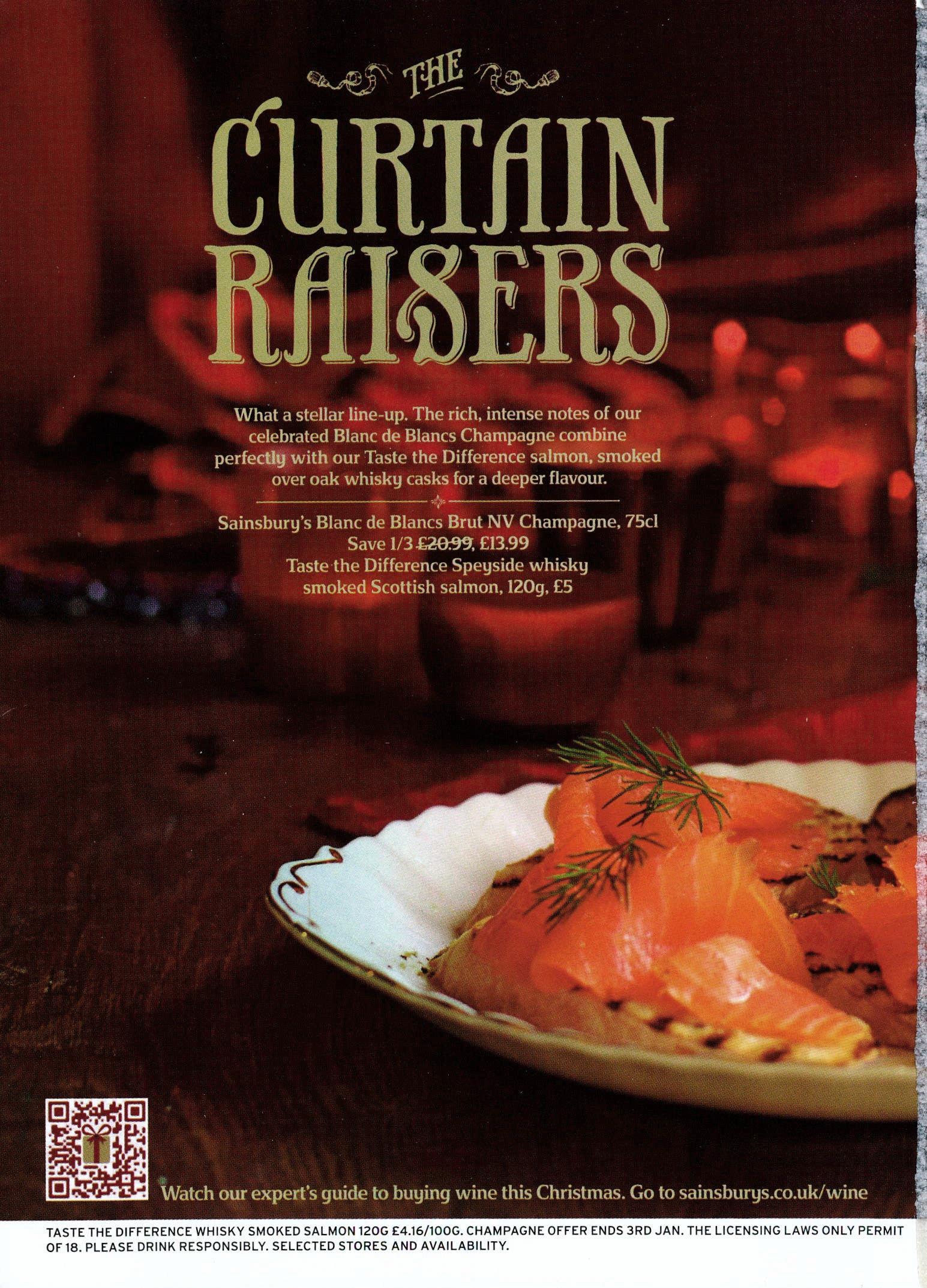
Watch our expert's guide to buying wine this Christmas. Go to sainsburys.co.uk/wine

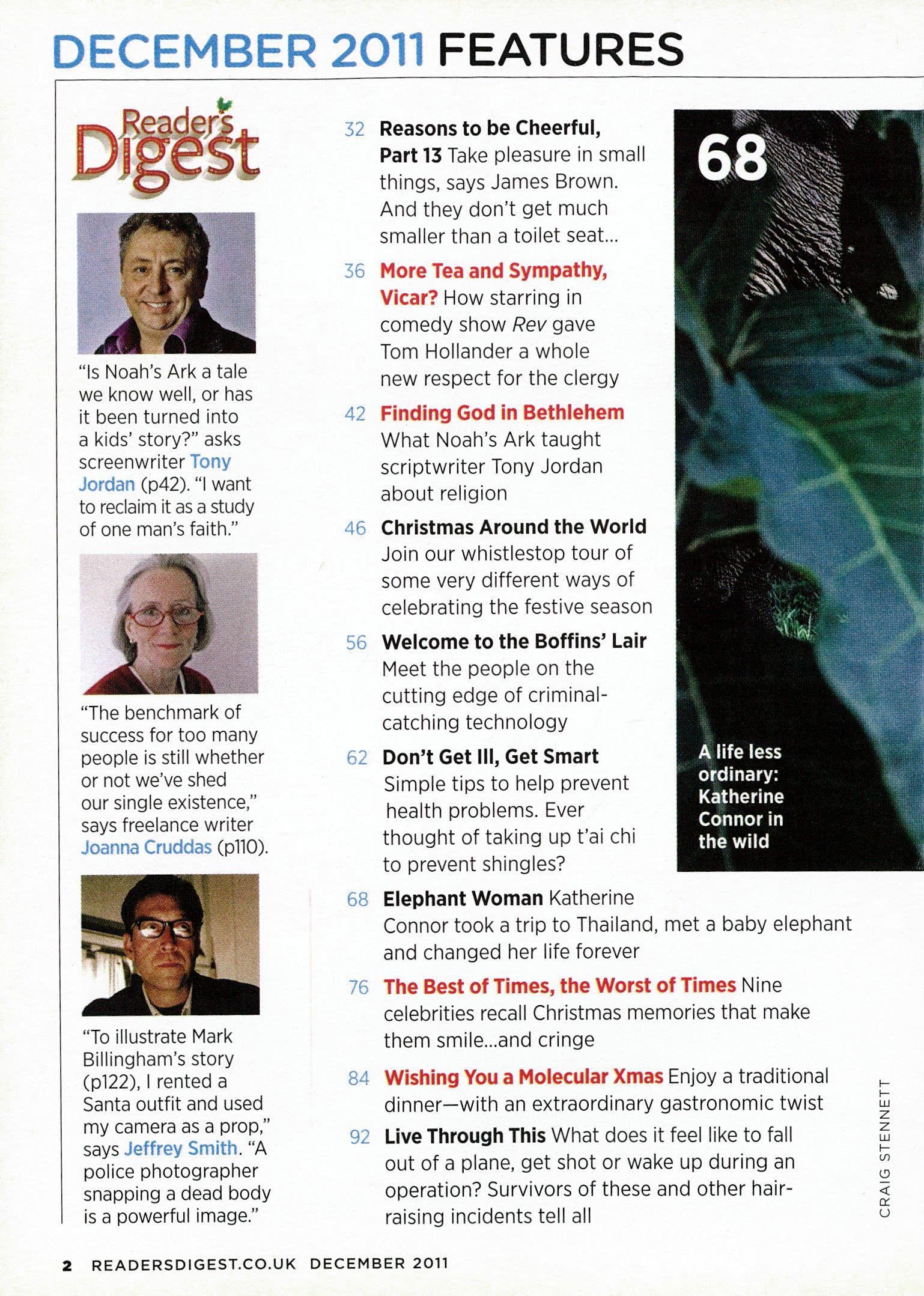
"Is Noah's Ark a tale we know well, or has it been turned into a kids' story?" asks screenwriter Tony Jordan (p42). "I want to reclaim it as a study of one man's faith."
"The benchmark of success for too many people is still whether or not we've shed our single existence," says freelance writer Joanna Cruddas (p110).
32 Reasons to be Cheerful, Part 13 Take pleasure in small things, says James Brown. And they don't get much smaller than a toilet seat...
36 More Tea and Sympathy, Vicar? How starring in comedy show Rev gave Tom Hollander a whole new respect for the clergy
42 Finding God in Bethlehem What Noah's Ark taught scriptwriter Tony Jordan about religion
46 Christmas Around the World Join our whistlestop tour of some very different ways of celebrating the festive season
56 Welcome to the Boffins' Lair Meet the people on the cutting edge of criminalcatching technology
62 Don't Get Ill, Get Smart Simple tips to help prevent health problems. Ever thought of taking up t'ai chi to prevent shingles?
A life less ordinary: Katherine Connor in the wild
68 Elephant Woman Katherine Connor took a trip to Thailand, met a baby elephant and changed her life forever
"To illustrate Mark Billingham's story (p122), I rented a Santa outfit and used my camera as a prop," says Jeffrey Smith. "A police photographer snapping a dead body is a powerful image."
76 The Best of Times, the Worst of Times Nine celebrities recall Christmas memories that make them smile...and cringe
84 Wishing You a Molecular Xmas Enjoy a traditional dinner—with an extraordinary gastronomic twist
92 Live Through This What does it feel like to fall out of a plane, get shot or wake up during an operation? Survivors of these and other hairraising incidents tell all
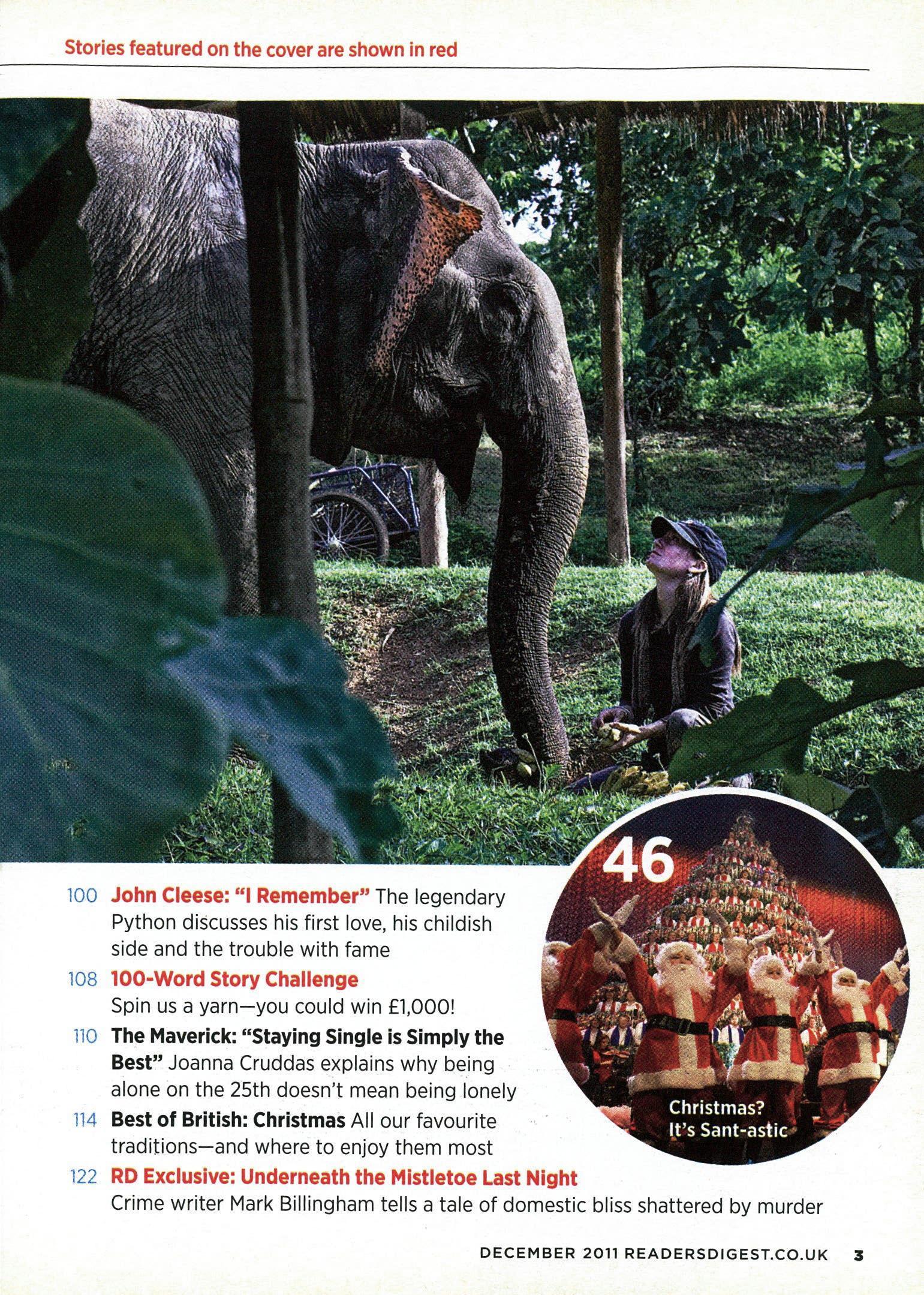
100 John Cleese: "I Remember"The legendary Python discusses his first love, his childish side and the trouble with fame
108 100-Word Story Challenge Spin us a yarn—you could win £1,000!
110 The Maverick: "Staying Single is Simply the Best"Joanna Cruddas explains why being alone on the 25th doesn't mean being lonely
114 Best of British: Christmas All our favourite traditions—and where to enjoy them most
122 RD Exclusive: Underneath the Mistletoe Last Night Crime writer Mark Billingham tells a tale of domestic bliss shattered by murder
9 Over to You...
13 Radar: Your Guide to December
20 You Couldn't Make It Up...
23 Word Power
26 In the Future...
28 Instant Expert
30 If I Ruled the World: Clarissa Baldwin
134 1,001 Things Everyone Should Know
140 Medicine: Max Pemberton
142 Health: Susannah Hickling
146 Beauty: Jan Masters
148 Consumer: Donal Maclntyre
150 Money: Jasmine Birtles
154 Food: Marco Pierre White
156 Drink: Nigel Barden
158 Gardening: Bob Flowerdew
160 Wildlife: Martin Hughes-Games
162 Digital: Martha Lane Fox
164 Motoring: Conor McNicholas
166 Travel: Kate. Pettifer
169 The Reader's Digest—our recommended reads of the month
180 Books That Changed My Life: Patricia Cornwell (pictured)
184 Beat the Puzzleman!
186 Laugh! With Alun Cochrane
192 Beat the Cartoonist

On our cover: Tom Hollander photographed by Philip Fisk at Coconut Studios. Hair and makeup by Karen Alder. Christmas logo designed by Steven Bonner Reader's Digest the World's Biggest Magazine published in 50 editions in 21 languages
The amount of time and effort spent preparing for Christmas always feels wildly disproportionate to the amount of time and effort spent enjoying the day itself. (That's because it is wildly disproportionate—Ed.)
But at least that's not true of our Christmas issue, which is packed with so many goodies it should last you well into the New Year. Don't miss the moving story of the British woman who's helping save Thailand's elephants, Mark Billingham's Christmas murder mystery, an extraordinary "molecular" Christmas dinner, John Cleese's formative influences, Jeffrey Archer's 100-word story, and a revealing insight into how his role in BBC2's Rev has affected Tom Hollander, our cover star. And more!
Merry Christmas from all of us at Reader's Digest!
Gill Hudsontheeditor@readersdigest.co.uk infacebook.comfreadersdigestuk twitter.com/rdigest readersdigest.co.uk/blogl/ rdmagazine

Send us your stories, jokes and letters— if they're published, we'll pay
WE PAY £50 for the star letter, £30 for normal letters and £15 for short extracts. Email readers letters@readersdigest. co.uk or write to Readers' Letters, Reader's Digest, 157 Edgware Road, London W2 2HR.
WE ALSO PAY £70 for the true stories, anecdotes, jokes in Laugh! and You Couldn't Make It Up..., and contributions to endof-article fillers, Travel and Gardening. Email excerpts@ readersdigest.co.uk or write to Excerpts, Reader's Digest, 157 Edgware Road, London W2 2HR
Ensure submissions are not previously published. Include your name, email, address and daytime phone number with all correspondence. We may edit letters and use them in all print and electronic media. Contributions used become world copyright of Vivat Direct Ltd (t/a Reader's Digest).
SORRY! We cannot acknowledge or return unpublished items or unsolicited articlelength manuscripts. Do not send SAEs. Article-length stories, poetry and cartoons are not requested.
Go online at readersdigest. co.uk or write to Reader's Digest, Freepost, NAT3782, Leicester LE55 8BA. UK: £42 a year. Republic of Ireland: €74.39 a year. Europe: £50 a year. Rest of the world: £60 a year. Prices include delivery.
GIFT SUBSCRIPTION? CHANGE OF ADDRESS?
Contact Customer Services for renewals, gifts, address changes, payments, account information and all other enquiries. Phone:08713511000' Email:cust_service @readersdigest.co.uk Minicom: 0870 6001153 *Ca lls from a BT
See RD art at the National Portrait Gallery!
Reader's Digest works with some of the best photographers in the business. And now there's a chance to see work by one of our favourites close up. A new exhibition at London's National Portrait Gallery, Comedians: From the 1940s to Now, features photos of Jimmy Carr and comedy duo David Mitchell and Robert Webb taken by our very own Barry Marsden (see his photos of the MoD testing lab on p56). The exhibition runs until January 8, and it's free!

For more information about Malaysia Healthcare, visit www.myhealthcare.gov.my
Over the years, more than a million people from around the world have come to seek quality healthcare in Malaysia. Here are some of their key reasons:
• World-class treatment • Cutting-edge facilities • Highly qualified specialists
• Multiple fields of expertise • Competitive prices • Shorter waiting times • Caring, friendly and multilingual staff • Many private hospitals are accredited by MSQH and/or JCI
• Malaysia provides a superb tourist--friendly environment in which to recuperate
• ANAESTHESIOLOGY • CANCER TREATMENT & PAIN MANAGEMENT
• CARDIOLOGY & CARDIOTHORACIC SURGERY • COSMETIC & RECONSTRUCTIVE
SURGERY • CYTOGENETIC STUDIES • CRANIOFACIAL SURGERY • DENTISTRY/ ORTHODONTICS • DERMATOLOGY • EAR, NOSE & THROAT SURGERY
• ENDOCRINOLOGY • FERTILITY TREATMENT • GASTROENTEROLOGY
• GENERAL SURGERY • GENERAL SCREENING & WELLNESS CENTRE
• HAEMATOLOGY • HAND & MICROSURGERY • IMAGING & INTERVENTIONAL RADIOLOGY • INTERNAL MEDICINE • NEPHROLOGY • NEUROLOGY & NEUROSURGERY • OBSTETRICS & GYNAECOLOGY • OPHTHALMOLOGY
• ORTHOPAEDIC & REHABILITATION MEDICINE • PAEDIATRIC MEDICINE & SURGERY • PSYCHIATRY • RHEUMATOLOGY • STEREOTACTIC RADIOSURGERY & RADIOTHERAPY • UROLOGY

MINISTRY OF HEALTH MALAYSIA
The Big Twissue!
April's issue of RD will be inspired by your tweets. Maybe you've got a great idea for a feature, want to know more about one of your favourite celebrities, or have a question you'd really like to ask one of our regular writers— in which case, now's your chance!
If you're already a Twitter fan, then follow us @rdigest—and send your ideas by December 31, with the tag #RDTwissue in the message. Don't have an account yet? Then this is your excuse to set one up!
And keep an eye on our contributors, who'll be conducting Twitter idea brainstorms throughout the month: @jamesbrown, @StuartMaconie, @Marthalanefox.
We think it's the first time that a magazine "Twissue" has been tried, so get online and help us make history by sending your ideas...but in no more than 140 characters!

AMAZING WALKS
DON'T FORGET to check out our fabulous apps! Go to the iTunes music store to download our iPad app and our new walking app.
WE'RE ALSO... ON FACEBOOK.COM/READERSDIGESTUK ON TWITTER.COM/RDIGEST
Visit our online shop, where we
DEDITORIAL
Editor-in-Chief
GILL HUDSON
Managing Editor
CATHERINE HAUGHNEY
Design Director
MARTIN COLYER
Features Editor
SIMON HEMELRYK
Deputy Production Editor
TOM BROWNE
Assistant Features Editor
ELLIE ROSE
Editorial Assistant
RACHEL SMITH
Art Editor
HUGH KYLE
Picture Researcher
ROBERTA MITCHELL
Contributing Editors
CAROLINE HUTTON
HARRY MOUNT
JAMES WALTON
Health Editor
SUSANNAH HICKLING
Website Assistant
JASMINE BEGOM
ADVERTISING
Head of Advertising Sales
ADRIAN MILNER
Account Directors
DOMINIC EDDON
SIMON FULTON
Magazine Executive
MARINA JOANNOU
Publishing Director
ERIC FULLER
CHIEF EXECUTIVE OFFICER
THIERRY BOUZAC
THE READER'S DIGEST ASSOCIATION INC
President and Chief
Executive Officer
ROBERT E GUTH
President, International DAWN ZIER
International Editor-at-Large PEGGY NORTHROP
£30 FOR EACH PUBLISHED LETTER,
£15 FOR SHORTER EXTRACTS,
£50 FOR THE LETTER OF THE MONTH! SEE P5 FOR MORE DETAILS

To add to the artists in your "Best of British" feature, I'd like to propose Walter Langley. I've always loved "Never Morning Wore to Evening But Some Heart Did Break" (pictured above), which can be found in the Birmingham Art Gallery. Langley, who painted this in 1894, was a good artist—a Birmingham lithographer who studied in London and moved to Newlyn, Cornwall, to head a group of artists.
It's a rotten title, but the picture seems very honest (in my view, the young widow is seeking comfort from the now destitute mother-in-law). Critics can be patronising about Victorian sentimentality, but I don't find this at all sentimental—in fact, it's better than many other Newlyn offerings of the period. R Hunt, Birmingham
I'm surprised Lola Borg left David Hockney's "Mr and Mrs Clark and Percy" off her list of great British paintings. Of all the artists of his generation, Hockney is the best known and most versatile—this particular portrait, for example, is more traditional and representative than his earlier Pop Art style. Valerie Richards, by email
Lola Borg writes: "This painting is, of course, a fantastic work. But we had some problems getting permission to use a reproduction, which is why we couldn't include it. A littleknown fact is that the cat in the painting was not called Percy but Blanche—Percy, Hockney felt, made a better title."
You can see the painting at tate.org.uk.
Antony Gormley's "If I Ruled the World" was an enjoyable read—until I got to the bit about banning cars in cities in favour of bicycles. This would stop disabled people enjoying city centres, especially if their wheelchairs are too large or cumbersome for park-and-ride schemes. Policies such as this are made by younger, fitter ►
"Perhaps you could tell us how you know if we've been bad or good?"
people, ignoring those less fortunate than themselves.
Hilary Woodjetts, Oxfordshire
The effectiveness of placebos as described in "The Healing Power of Nothing" was proved to me a number of years ago.
I was suffering from a really bad headache while playing snooker with a friend. His wife offered me a yellow-coloured pill, saying it was brilliant for headaches. Half an hour later, the pain had abated—I was then told the "pill" was, in fact, a yellow Smartie!
John Samuel, Gwent
I was amazed to see Nigel Barden encouraging readers to "drop a Jagerbomb" in his
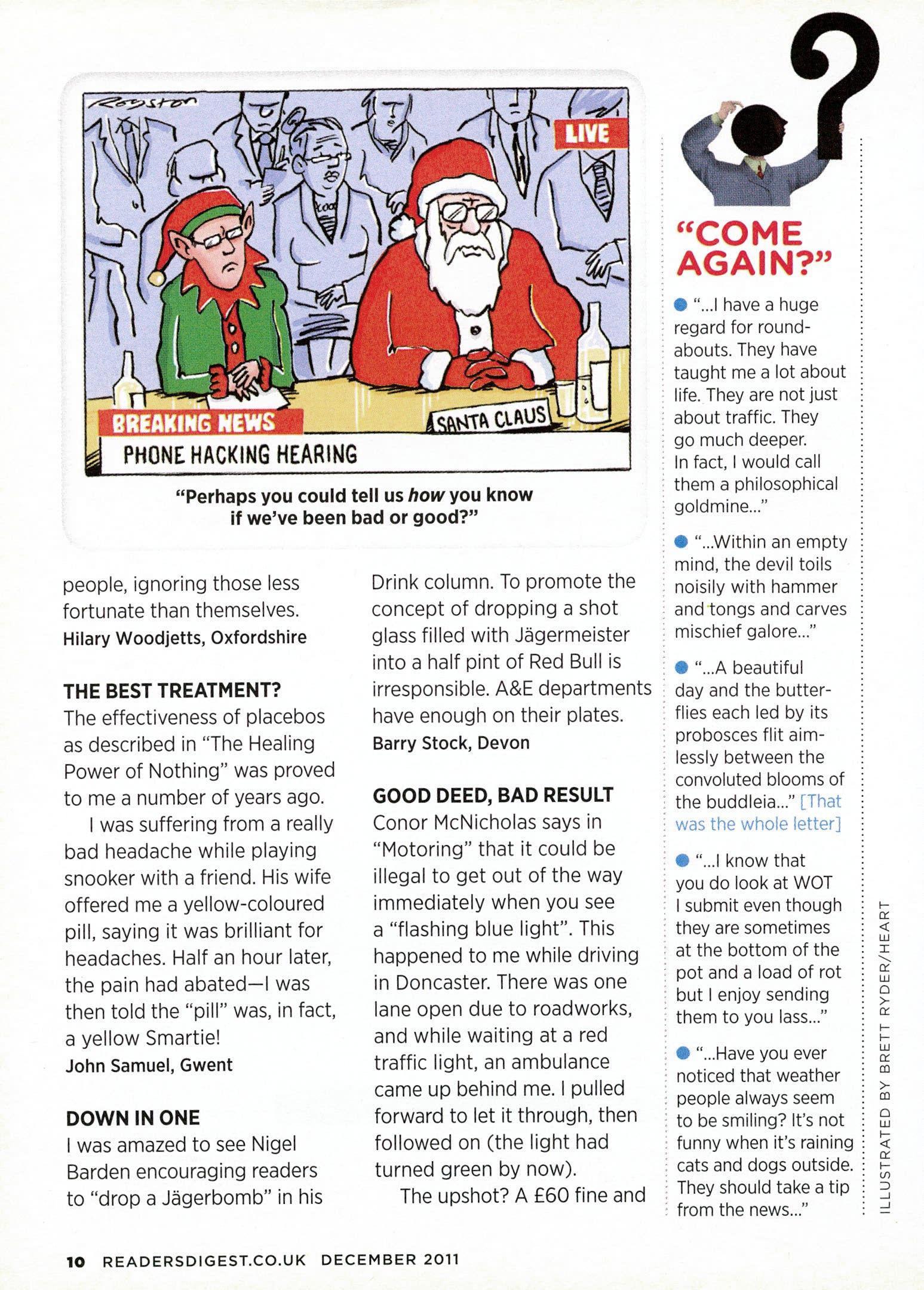
Drink column. To promote the concept of dropping a shot glass filled with Jagermeister into a half pint of Red Bull is irresponsible. A&E departments have enough on their plates. Barry Stock, Devon
Conor McNicholas says in "Motoring" that it could be illegal to get out of the way immediately when you see a "flashing blue light". This happened to me while driving in Doncaster. There was one lane open due to roadworks, and while waiting at a red traffic light, an ambulance came up behind me. I pulled forward to let it through, then followed on (the light had turned green by now).
The upshot? A £60 fine and
• "...I have a huge regard for roundabouts. They have taught me a lot about life. They are not just about traffic. They go much deeper. In fact, I would call them a philosophical goldmine..."
• "..Within an empty mind, the devil toils noisily with hammer and tongs and carves mischief galore..."
• "...A beautiful day and the butterflies each led by its probosces flit aimlessly between the convoluted blooms of the buddleia..." [That was the whole letter]
• "...I know that you do look at WOT I submit even though they are sometimes at the bottom of the pot and a load of rot but I enjoy sending them to you lass..."
• "...Have you ever noticed that weather people always seem to be smiling? It's not funny when it's raining cats and dogs outside. They should take a tip from the news..."
three points off my licence. I tried appealing, but to no avail. And all for getting out of the path of an ambulance!
By email

Like Bob Thorne, who supplies props for films ("The Scrap King of Hollywood"), I've collected all kinds of junk as a member of my local Amdram society. My favourites are a papier-mâché moose head for a production of Fawlty Towers, and a Lewis Gun for our version of Dad's Army.
These don't have to be as perfect as props for films, of course, as they're only viewed from a distance. But I think Bob has my dream job!
John Edlington, Rotherham
How refreshing it was to read "The World's Craziest Commutes". People always moan about having to stand on a train for 20 minutes, or an accident on the motorway adding an hour to their journey—I wonder how they'd cope with going to work on a zip wire?
As for me, I never moan... well, I do work from home.
Esther Newton, Berkshire
My dearest friend introduced me to your magazine—"I read it all, from cover to cover," he would tell me. My thoughts go back to the day in hospital when he read his last issue, before giving it to another patient to brighten up his day. He passed away shortly afterwards. I'm now doing the crosswords alone, and trying to smile at the jokes we would have laughed at together. I intend to keep his subscription going in his memory.
Franca James, Swindon
keithculkin Keith Culk:n
I take Reader's Digest very seriously: I refuse to read a copy unless I've had a large meal directly beforehand.
YOU'RE STILL TALKING ABOUT...
"Your Home in 2030" by Nicole Swengley—a peek at our future accommodation
• All we'll have to do is press a switch and everything is done for us? Sounds rather boring to me. Jon Bryan, Liverpool
• Nicole's proposal for open-plan living horrified me. We all like our privacy. Just imagine three generations living under one roof!
Derrick Courage, Porthmadog
• Could we all have a small incinerator in every kitchen, so there's only a small amount of ash to empty every week?
Katie Nelson, Monmouthshire
• Thanks to modern e-readers, we won't need bookshelves? You'll never replace books! I'm shocked that you can print such heresy!
Christine Ordish, Salford ■

THE UK'S MOST TRUSTED HAIRSPRAY . FOR HOLD YOU CAN RELY ON.
A R
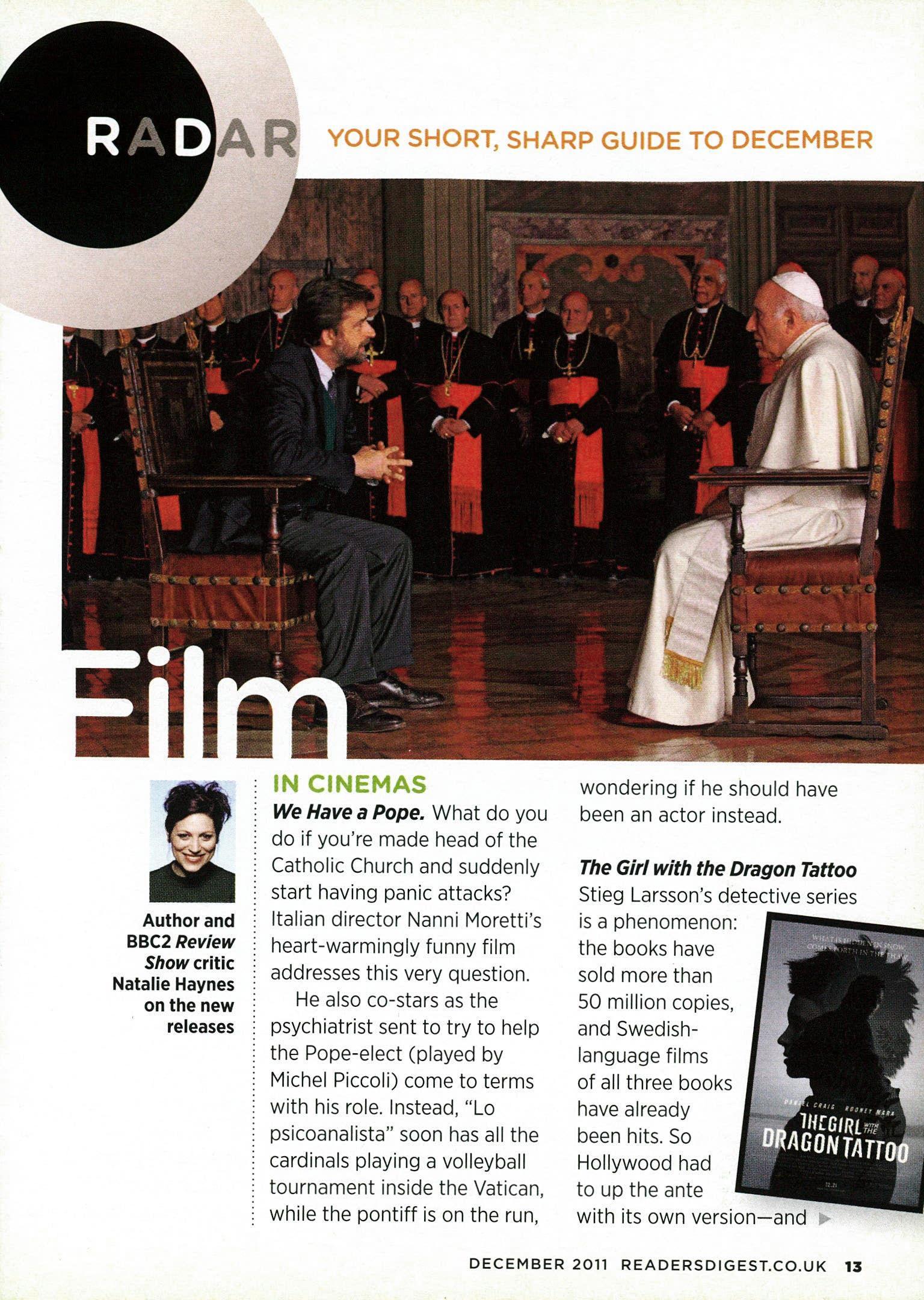
YOUR SHORT, SHARP GUIDE TO DECEMBER
Author and BBC2 Review
Show critic Natalie Haynes on the new releases
We Have a Pope. What do you do if you're made head of the Catholic Church and suddenly start having panic attacks? Italian director Nanni Moretti's heart-warmingly funny film addresses this very question. He also co-stars as the psychiatrist sent to try to help the Pope-elect (played by Michel Piccoli) come to terms with his role. Instead, "Lo psicoanalista" soon has all the cardinals playing a volleyball tournament inside the Vatican, while the pontiff is on the run,
wondering if he should have been an actor instead.
The Girl with the Dragon Tattoo Stieg Larsson's detective series is a phenomenon: the books have sold more than 50 million copies, and Swedishlanguage films of all three books have already been hits. So Hollywood had to up the ante with its own version—and
it has. David Fincher (The Social Network) directs and Daniel Craig is Mikael Blomkvist in what could be the finest adaptation of a best-seller since Harry Potter (but with more Nazis and fewer wizards).
Captain America:
The First Avenger. Chris Evans stars as the superhero defending the US from The Red Skull (Hugo Weaving). Full of the charm that's marked recent Marvel films such as Thor, see it to prepare yourself for April's Marvel: The Avengers—set to be the biggestbudget film ever. Rise of the Planet of the Apes. Remember when Charlton Heston arrived on an alien world ruled by simians, only to find out that it was—horror—the Earth? This prequel explains how the apes got to the top of the tree.
Technology expert and Answer Me This! podcaster Oily Mann selects the Xmas gifts all right-thinking children will be crying out for
Air Swimmer, ,9.99. What a brilliantly simple idea: a remotecontrolled, fish-shaped helium balloon that appears to be swimming through the air. Soon they'll be in every shopping centre and playground, but, right now, they've got unrivalled wow factor—assuming you've never seen a 57-inch clownfish drift through your living room before.
Disney Princess Magic Wand Game, Z14.99. Princesses NEVER stoop so low as to roll a dice. So, in this innovative board game, Cinderella, Snow White,
4-)

Belle and Sleeping Beauty progress to the Enchanted Castle (where, by happy coincidence, it's the day of the ball) by waving a battery-operated pink wand to receive directions from the Fairy Godmother herself.
Angry Birds Knock On Wood, 09.99 It had to happen. One of the world's most popular app games (350 million downloads and counting) is now a 3D reality in the
style of Jenga and Mouse Trap. The bizarre basics remain: to win you must catapult an unhappy avian at some evil tower-dwelling pigs. A bit too much time is spent setting up buildings just to smash them down, but this is laugh-outloud family fun.
Kuchi-Paku Polar Bear, £38.99. Following in the grand tradition of Dancing Cactus and Big Mouth Billy Bass, this cuddlesome creature gets jiggy to your kids' music collection— because, as we all know, arctic animals simply adore JLS. Just plug in an MP3 player and watch him go, moving his mouth in sync with the vocals (sort of). The fun bit for adults? Docking your phone and seeing what happens when a bear channels your bank manager.
Hot Wheels Video Racer, £64.99. If you have plastic tracks for rev-up toy cars
going up your fridge and round your cat flap, you've got a Hot Wheels fan in da house. They'll love Video Racer, a vehicle with a microcam in the bumper so you can see the circuit from AV a driver's perspective and review the action on a built-in screen. The car also mounts to skateboards or bikes to capture real-world clips that hopefully won't involve so many 360-degree loops.
Club Penguin Air Hockey, £39.99. Full-size air hockey tables start at £200, so this miniature plastic one is a good-value alternative. And, as it's branded in the style of the massively popular online game
4 t , Kuchi-Paku: every home needs one...
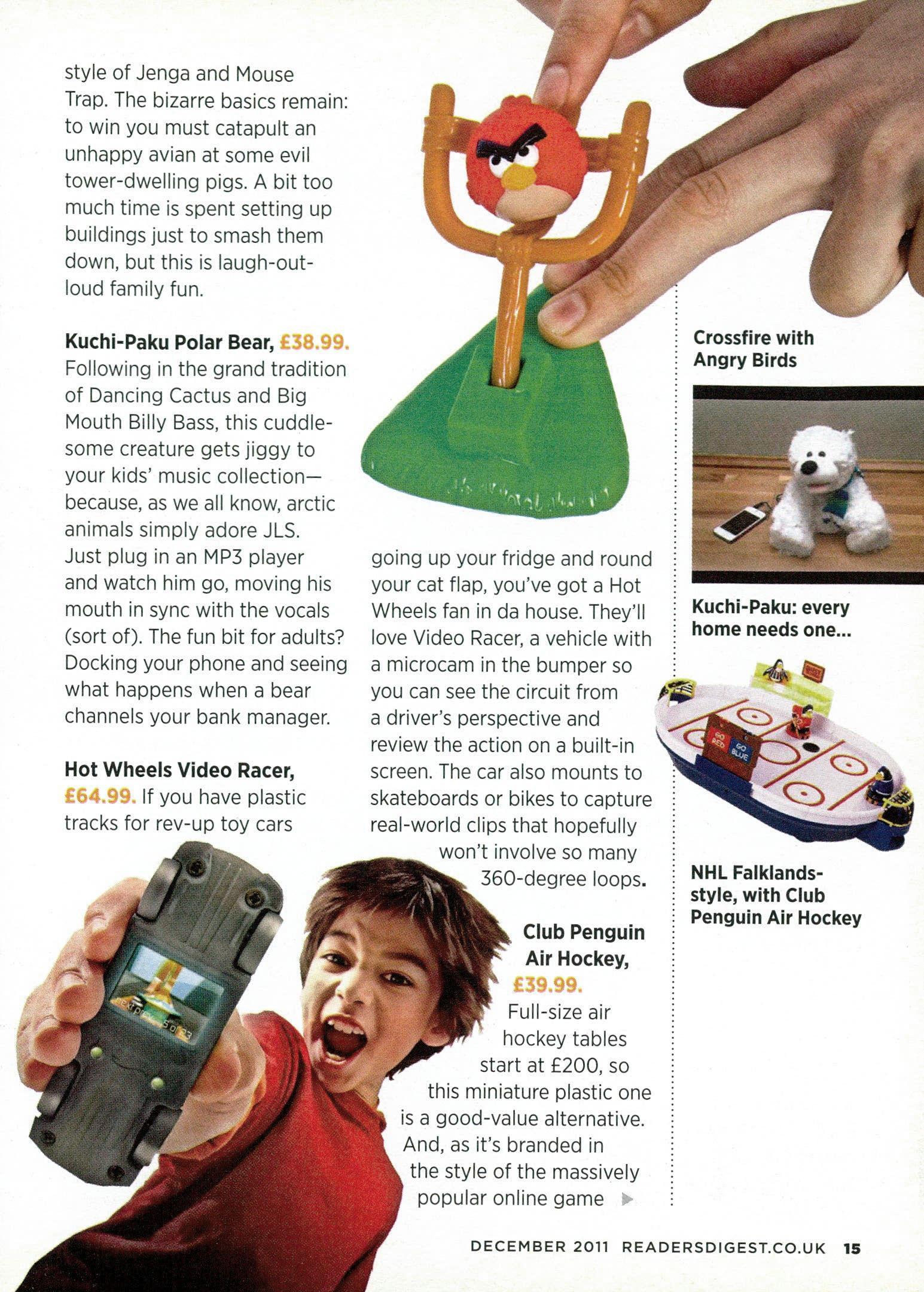
NHL Falklandsstyle, with Club Penguin Air Hockey
Crossfire with Angry BirdsRecreate Big with this giant keyboard
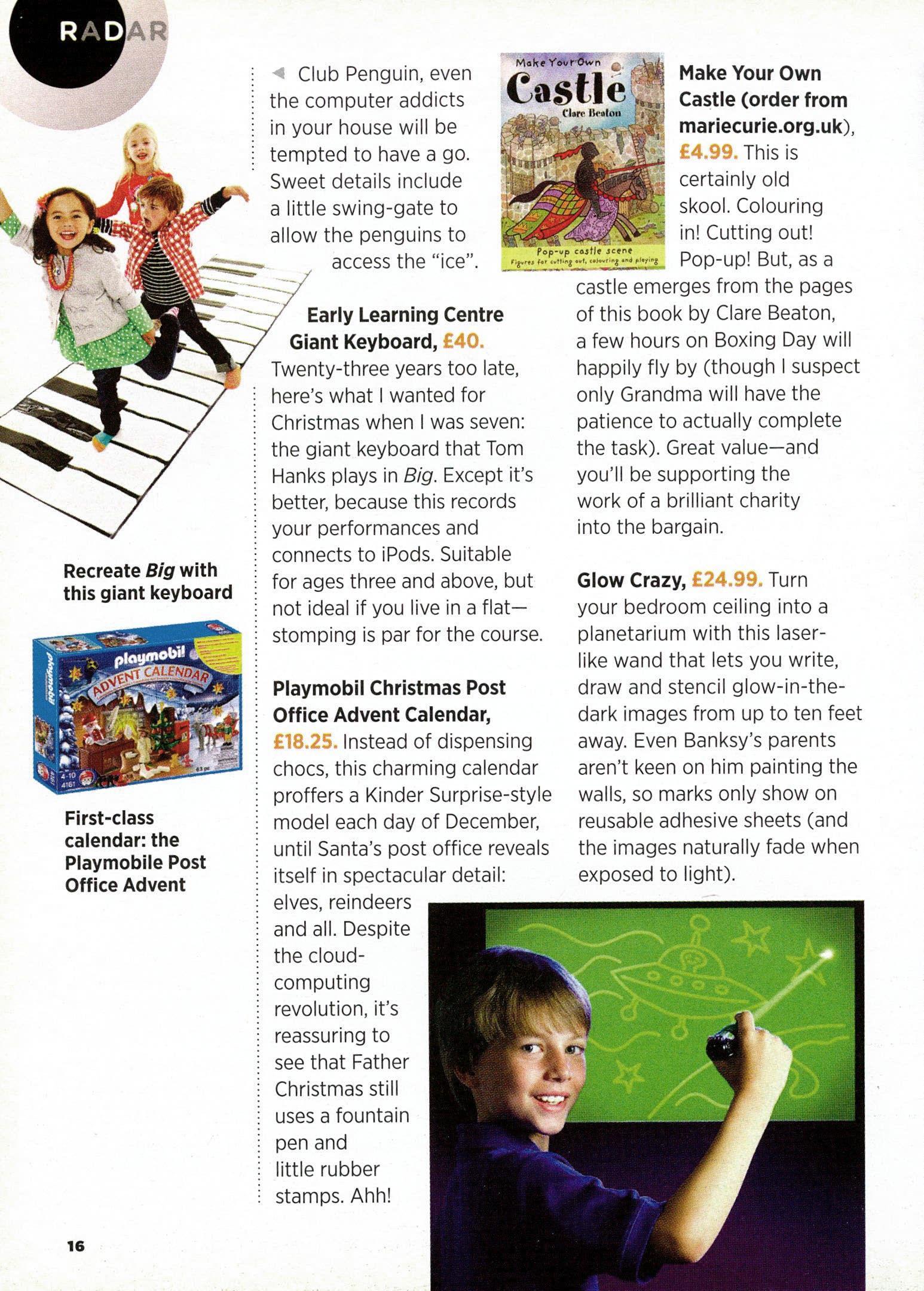
First-class calendar: the Playmobile Post Office Advent
41 Club Penguin, even the computer addicts in your house will be tempted to have a go. Sweet details include a little swing-gate to allow the penguins to access the "ice".
Early Learning Centre Giant Keyboard, £40. Twenty-three years too late, here's what I wanted for Christmas when I was seven: the giant keyboard that Tom Hanks plays in Big. Except it's better, because this records your performances and connects to iPods. Suitable for ages three and above, but not ideal if you live in a flat— stomping is par for the course.
Playmobil Christmas Post Office Advent Calendar, £18.25. Instead of dispensing chocs, this charming calendar proffers a Kinder Surprise-style model each day of December, until Santa's post office reveals itself in spectacular detail: elves, reindeers and all. Despite the cloudcomputing revolution, it's reassuring to see that Father Christmas still uses a fountain pen and little rubber stamps. Ahh!
Make Your Own Castle (order from mariecurie.org.uk), £4.99. This is certainly old skool. Colouring in! Cutting out! Pop-up! But, as a castle emerges from the pages of this book by Clare Beaton, a few hours on Boxing Day will happily fly by (though I suspect only Grandma will have the patience to actually complete the task). Great value—and you'll be supporting the work of a brilliant charity into the bargain.
Glow Crazy, £24.99. Turn your bedroom ceiling into a planetarium with this laserlike wand that lets you write, draw and stencil glow-in-thedark images from up to ten feet away. Even Banksy's parents aren't keen on him painting the walls, so marks only show on reusable adhesive sheets (and the images naturally fade when exposed to light).
a talented acolyte. As an English rose with an acoustic guitar and a voice largely unsullied by transatlantic stylings, Gilmore is labelled as folk. But her work has a broader sweep than that, making her an interesting choice by the estate of Sandy Denny to compose music for the folk icon's unused last lyrics. The results have a winsome grace, with an eerie symbiosis between living and dead ladies of song.

BBC 6 Music's Stuart Maconie's pick of the recent releases
Mylo Xyloto by Coldplay. Think U2 for the Justin Bieber generation...and vice versa. Apparently, Coldplay now see their peers and rivals as acts like Adele, rather than Radiohead or U2, and Mylo Xyloto has been touted as a full-on pop album. That means dance beats and basslines, fizzing synths and a guest slot for Rihanna. But it's also a concept album of sorts—a tale of human aspiration in a dystopian future. It might best be described as "feel-good, high-concept cinematic pop". Catchy, clever and clean-cut.
Don't Stop Singing by Thea Gilmore. Think the words a legend set to music by
Futurist Manifesto by Be Bop Deluxe. Think a glam-rock Hendrix from Wakefield. U Largely remembered for the Seventies hits "Maid In Heaven"—a daring techno-flash pop song in about six different time signatures—and "Ships in the Night", Be Bop Deluxe were, at one point, poised to become a global proposition. But leader Bill Nelson had an artstudent penchant for Cocteau, Fritz Lang and modern art, none of which played well in Boise, Idaho. Still, here are their five studio albums, crammed with good stuff and extras, and recommended for anyone who loved both Roxy Music and Pink Floyd.
Four Hills ski-jumping tournament, starts Oberstdorf, Germany, December 30. Some would argue that this sport would be more interesting if the competitors went head-to-head from ramps at either end of a big crocodile pit. Nevertheless, Austrian Thomas Morgenstern will attempt to repeat his 2010 victory in this event (which moves on to other mountains in Germany and Austria in January) to again prove himself one of the humans most adept at hurling themselves off a hill into a valley.
Australia vs India test match, Melbourne. December 26-30. Not long ago, this would have been a clash between the world's best five-day cricket outfits. But, in the last year,
ESPNcricinfo cricket blogger, broadcaster and stand-up Andy Zaltzman previews the best of the month's action
they've been pounded by England like a recently divorced French chef pounds garlic.
So both teams will be looking to get back on their horses—and remember that they are far better jockeys than their ploughing-snout-firststraight-through-a-fence-intoa-ditch efforts against Andrew Strauss's men suggested.
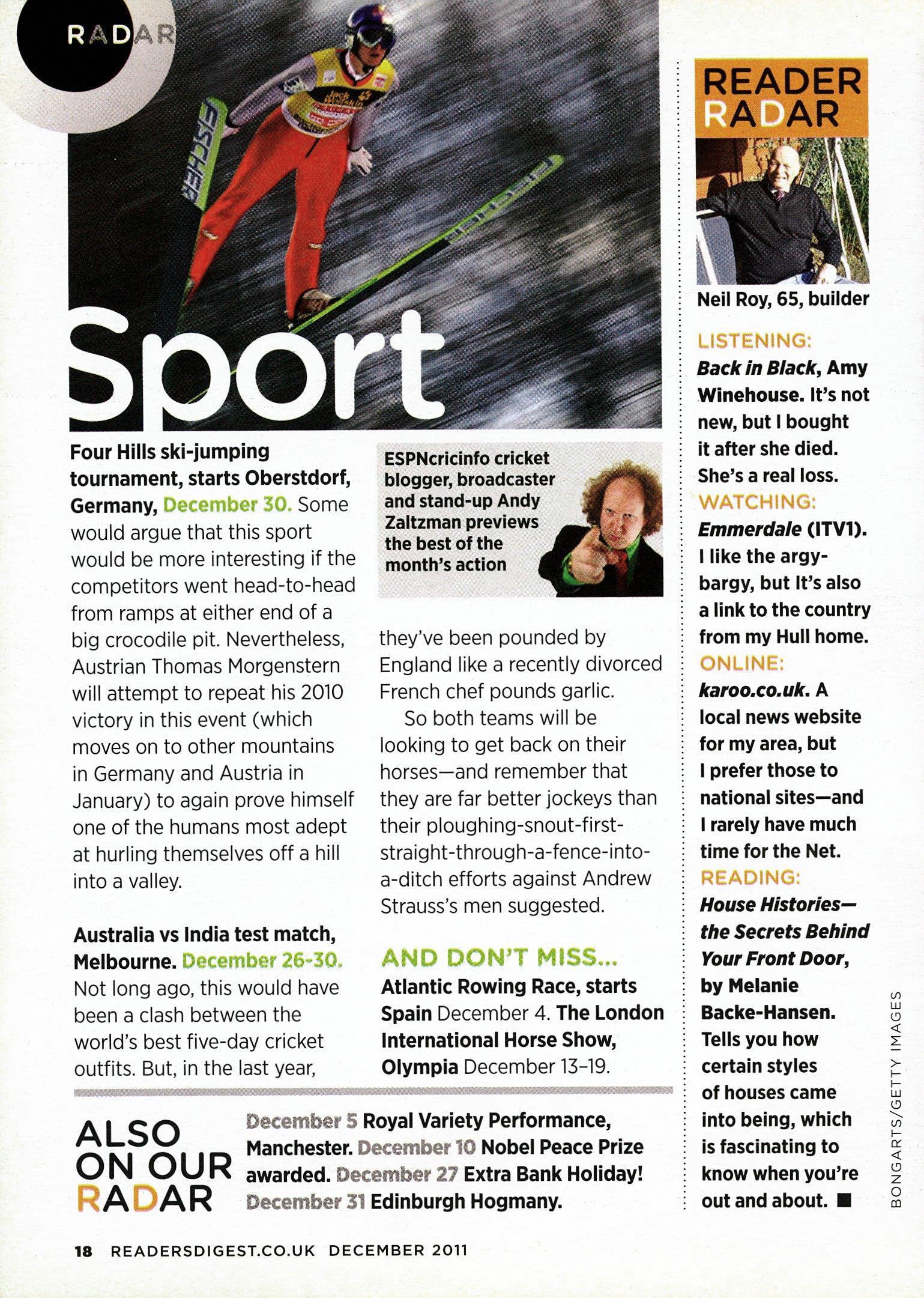
Atlantic Rowing Race, starts Spain December 4. The London International Horse Show, Olympia December 13-19.
December 5 Royal Variety Performance, Manchester. December10 Nobel Peace Prize
ON OUR awarded. December 27 Extra Bank Holiday! A AR December 31 Edinburgh Hogmany.
ISTFNINC, Back in Black, Amy Winehouse. It's not new, but I bought it after she died. She's a real loss.
Emmerdale (ITV1). I like the argybargy, but It's also a link to the country from my Hull home. karoo.co.uk. A local news website for my area, but I prefer those to national sites—and I rarely have much time for the Net.
House Histories— the Secrets Behind Your Front Door, by Melanie Backe-Hansen. Tells you how certain styles of houses came into being, which is fascinating to know when you're out and about. •

1 A lady who regularly visits my betting shop to place her husband's bets came in one morning.
"How's your luck?" she asked cheerily.
"Not very good," I admitted. "The last time I backed a winner was when I had a few bob on William to beat Harold at Hastings."
"I didn't know there was a racecourse at Hastings," she mused.
John Robinson, London
1 My sister, a teacher, was telling us about two children at her school who'd been fighting.
"They were really going at it hammer and tongs," she said.
Her young daughter, who'd been listening in, asked, "Did the one with the hammer win?"
Shula Clarkson, Great Yarmouth
1 Two couples we know went out for a joint meal, and the wives ordered Steak Diane.
When the waiter arrived with the dishes, he said to
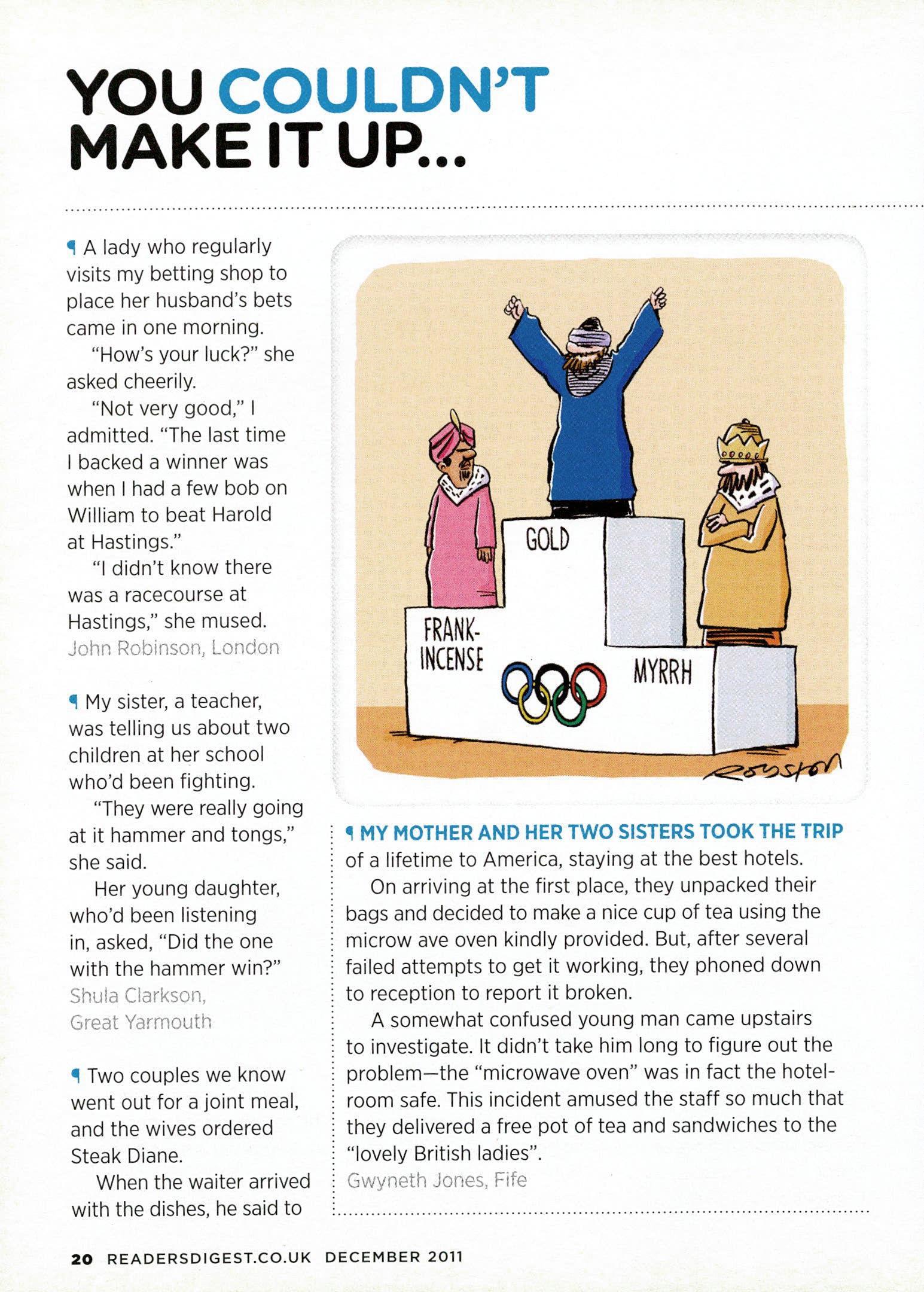
1 MY MOTHER AND HER TWO SISTERS TOOK THE TRIP of a lifetime to America, staying at the best hotels.
On arriving at the first place, they unpacked their bags and decided to make a nice cup of tea using the microw ave oven kindly provided. But, after several failed attempts to get it working, they phoned down to reception to report it broken.
A somewhat confused young man came upstairs to investigate. It didn't take him long to figure out the problem—the "microwave oven" was in fact the hotelroom safe. This incident amused the staff so much that they delivered a free pot of tea and sandwiches to the "lovely British ladies".
Gwyneth Jones, Fife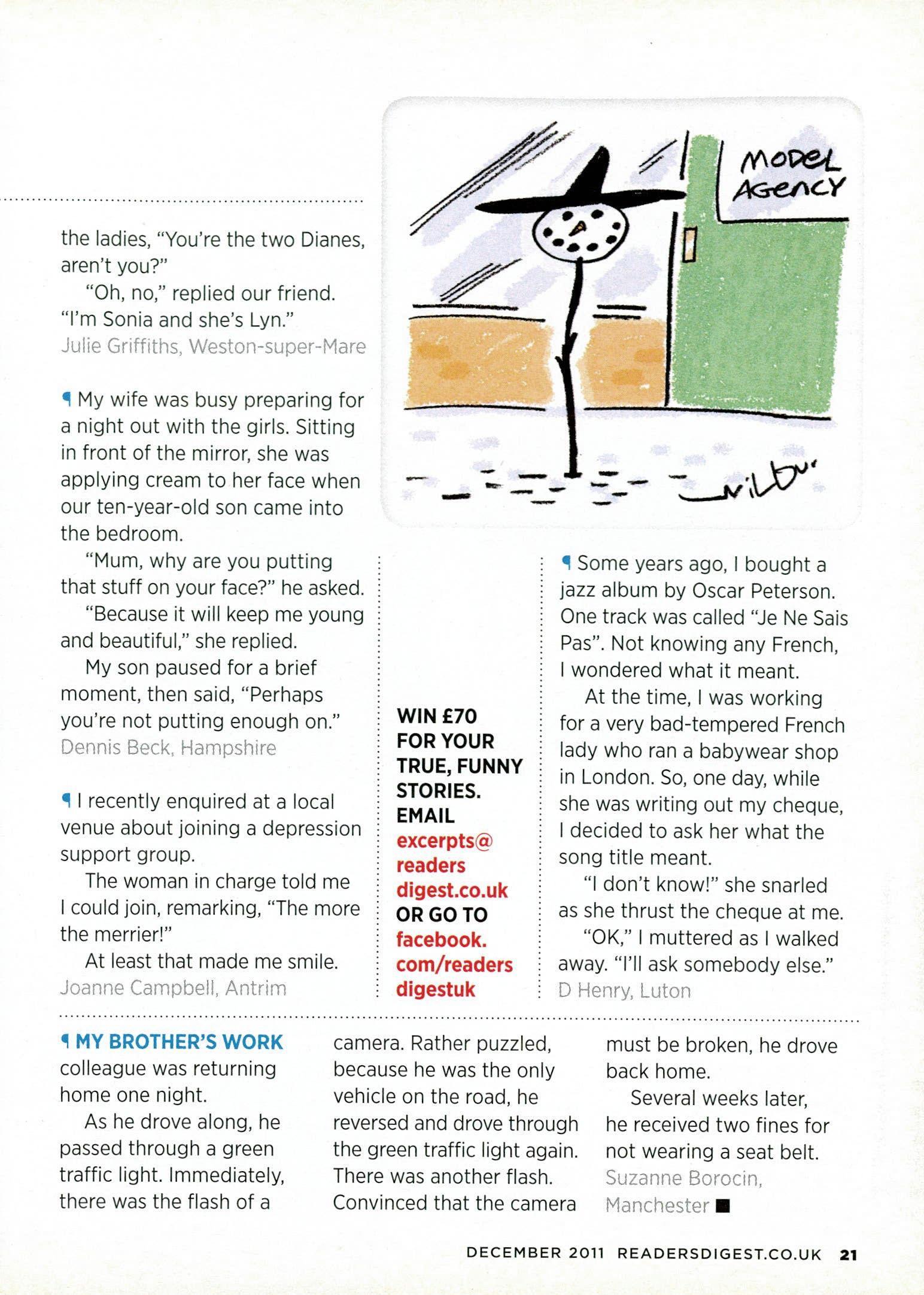
the ladies, "You're the two Dianes, aren't you?"
"Oh, no," replied our friend. "I'm Sonia and she's Lyn."
Julie Griffiths, Weston-super-Mar
My wife was busy preparing for a night out with the girls. Sitting in front of the mirror, she was applying cream to her face when our ten-year-old son came into the bedroom.
"Mum, why are you putting that stuff on your face?" he asked.
"Because it will keep me young and beautiful," she replied.
My son paused for a brief moment, then said, "Perhaps you're not putting enough on."
Dennis Beck, Hampshire
I recently enquired at a local venue about joining a depression support group.
The woman in charge told me I could join, remarking, "The more the merrier!"
At least that made me smile. Joanne Campbell, Antrim 0,3",
I MY BROTHER'S WORK colleague was returning home one night.
As he drove along, he passed through a green traffic light. Immediately, there was the flash of a
WIN £70 FOR YOUR TRUE, FUNNY STORIES. EMAIL excerpts@ readers digest.co.uk OR GO TO facebook. com/readers digestuk
I Some years ago, I bought a jazz album by Oscar Peterson. One track was called "Je Ne Sais Pas". Not knowing any French, I wondered what it meant.
At the time, I was working for a very bad-tempered French lady who ran a babywear shop in London. So, one day, while she was writing out my cheque, I decided to ask her what the song title meant.
"I don't know!" she snarled as she thrust the cheque at me.
"OK," I muttered as I walked away. "I'll ask somebody else."
D Henry, Luton
camera. Rather puzzled, because he was the only vehicle on the road, he reversed and drove through the green traffic light again. There was another flash. Convinced that the camera
must be broken, he drove back home.
Several weeks later, he received two fines for not wearing a seat belt.
Suzanne Borocin, Manchester ■
One hour learning to fly
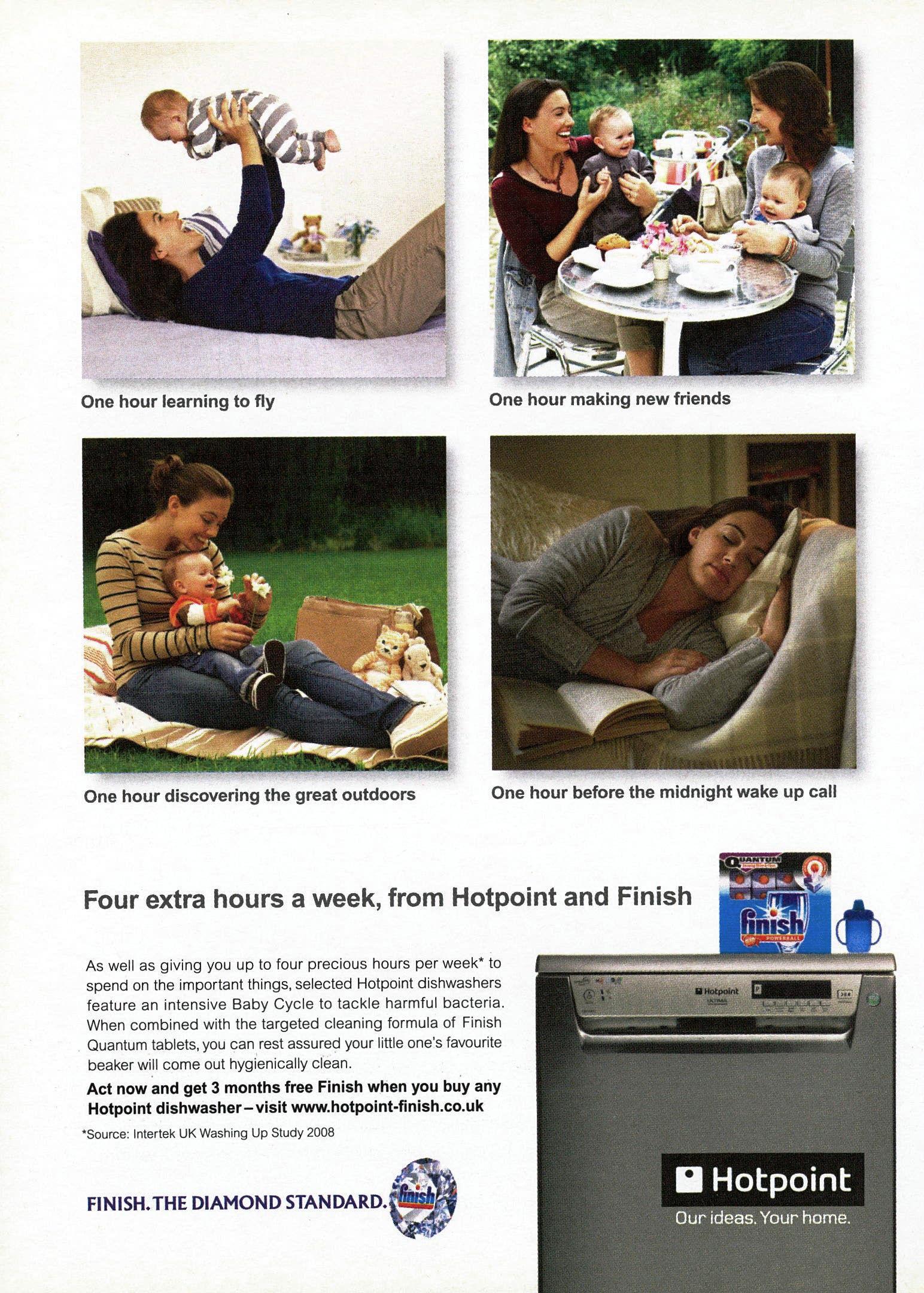
As well as giving you up to four precious hours per week* to spend on the important things, selected Hotpoint dishwashers feature an intensive Baby Cycle to tackle harmful bacteria. When combined with the targeted cleaning formula of Finish Quantum tablets, you can rest assured your little one's favourite beaker will come out hygienically clean.
Act now and get 3 months free Finish when you buy any Hotpoint dishwasher—visit www.hotpoint•finish.co.uk
*Source: Intertek UK Washing Up Study 2008
From punk poet to GSCE set text, John Cooper Clarke has been thrilling audiences for more than 30 years. Now, the Bard of Salford presents 15 of his favourite words, together with some alarmingly plausible definitions. See how you match up to one of Britain's great wordsmiths by answering A, B or C.
1 spinet n
A keyboard instrument
B nautical dance step
C mini washing machine
2 disorientation n
A translation of ancient Chinese texts B confusion
C banishment from the east
3 flourish n
A any farinaceous substance B flamboyant gesture C bamboo whip
4 spansule n
A extended-use capsule for the administration of pharmaceuticalsB rivet used in bridge construction
C dog bred specifically for vivisection
5 flageolet n
A whipping post B seagoing canoe C wind instrument (not to be confused with the flageolet
bean, also a wind instrument) 11 lavish adj
6 spasm n
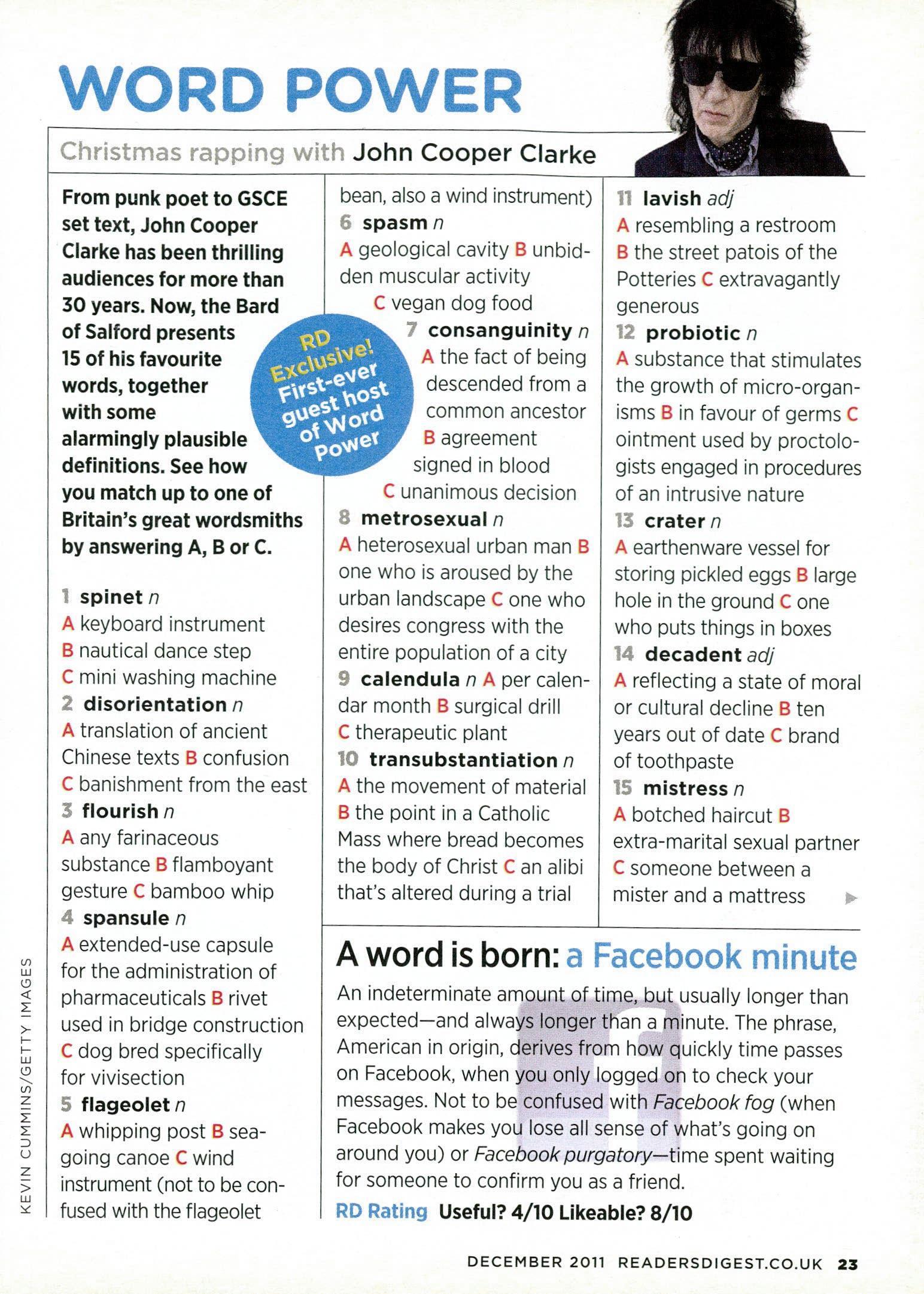
A resembling a restroom
A geological cavity B unbid- B the street patois of the den muscular activity Potteries C extravagantly C vegan dog food generous
7 consanguinity n 12 probiotic n
A the fact of being A substance that stimulates descended from a the growth of micro-organcommon ancestor isms B in favour of germs C B agreement ointment used by proctolosigned in blood gists engaged in procedures
C unanimous decision of an intrusive nature
8 metrosexual n
13 crater n
A heterosexual urban man B A earthenware vessel for one who is aroused by the storing pickled eggs B large urban landscape C one who hole in the ground C one desires congress with the who puts things in boxes entire population of a city 14 decadent adj
9 calendula n A per calen-
A reflecting a state of moral dar month B surgical drill or cultural decline B ten C therapeutic plant years out of date C brand
10 transubstantiation n of toothpaste
A the movement of material 15 mistress n
B the point in a Catholic A botched haircut B
Mass where bread becomes extra-marital sexual partner the body of Christ C an alibi C someone between a that's altered during a trial mister and a mattress r-
An indeterminate amount of time, but usually longer than expected—and always longer than a minute. The phrase, American in origin, derives from how quickly time passes on Facebook, when you only logged on to check your messages. Not to be confused with Facebook fog (when Facebook makes you lose all sense of what's going on around you) or Facebook purgatory—time spent waiting for someone to confirm you as a friend.
RD Rating Useful? 4/10 Likeable? 8/10
9-11 getting there 12-13 impressive 14-15 word-power wizard!
1 spinet—A keyboard instrument. Italian spinetta, perhaps from the name of pianomaker Giovanni Spinetti.
2 disorientation—B confusion. "Is this month's Word Power causing you some disorientation?"
3 flourish—B flamboyant gesture. Latin florere (to bloom).
4 spansule—A capsule. "A spansule is designed to release drugs at a steady rate over a period of hours."
5 flageolet—C a small wind instrument that looks like a recorder. Provencal flaujol.
6 spasm—B unbidden muscular activity. Greek span (pull).
7 consanguinity—A descent from a common ancestor. Latin cum (together) and sanguis (blood).
8 metrosexual—A urban man. "There's nothing wrong with being a metrosexual—we're even in the dictionary now."
9 calendula—C theraputic plant from a genus that includes the pot marigold. From Latin
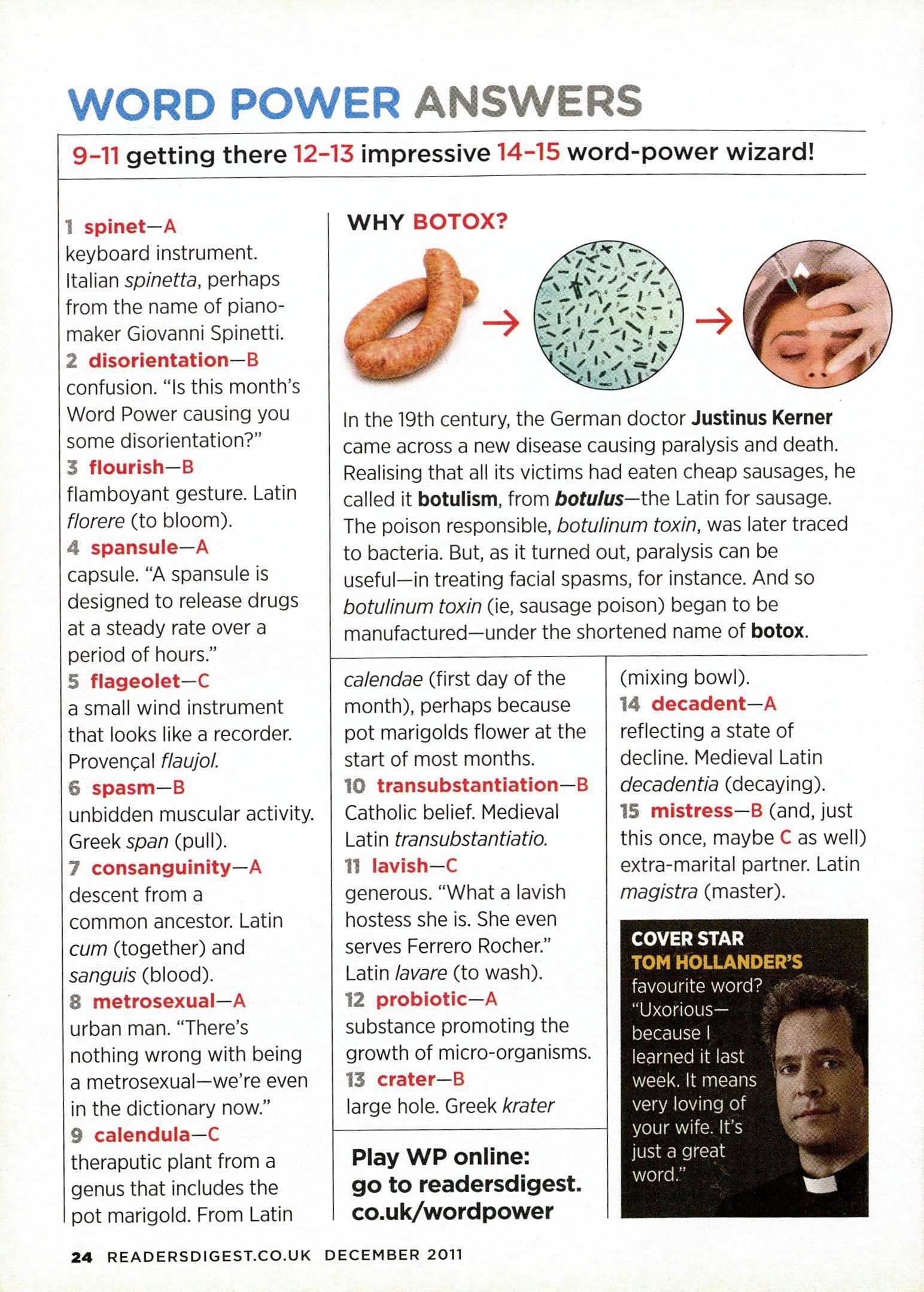
In the 19th century, the German doctor Justinus Kerner came across a new disease causing paralysis and death. Realising that all its victims had eaten cheap sausages, he called it botulism, from botulus the Latin for sausage. The poison responsible, botulinum toxin, was later traced to bacteria. But, as it turned out, paralysis can be useful—in treating facial spasms, for instance. And so botulinum toxin (ie, sausage poison) began to be manufactured—under the shortened name of botox.
calendae (first day of the month), perhaps because pot marigolds flower at the start of most months.
10 transubstantiation—B Catholic belief. Medieval Latin transubstantiatio.
11 lavish—C
generous. "What a lavish hostess she is. She even serves Ferrero Rocher." Latin lavare (to wash).
12 probiotic—A substance promoting the growth of micro-organisms.
13 crater—B large hole. Greek krater
Play WP online: go to readersdigest. co.uk/wordpower
(mixing bowl).
14 decadent—A reflecting a state of decline. Medieval Latin decadentia (decaying).
15 mistress—B (and, just this once, maybe C as well) extra-marital partner. Latin magistra (master).
TOM HOLLANDER'S favourite word? "Uxorious— because I learned it last week. It means very loving of your wife. It's just a great word."
Family is important especially at this time of year. Our family live in the heart of Somerset where the lush green grass grows all year round, so our cows always produce the highest quality milk that gives our award-winning Cheddar its rich, creamy taste
Find out more about our family story at Facebook.com/wykefarms
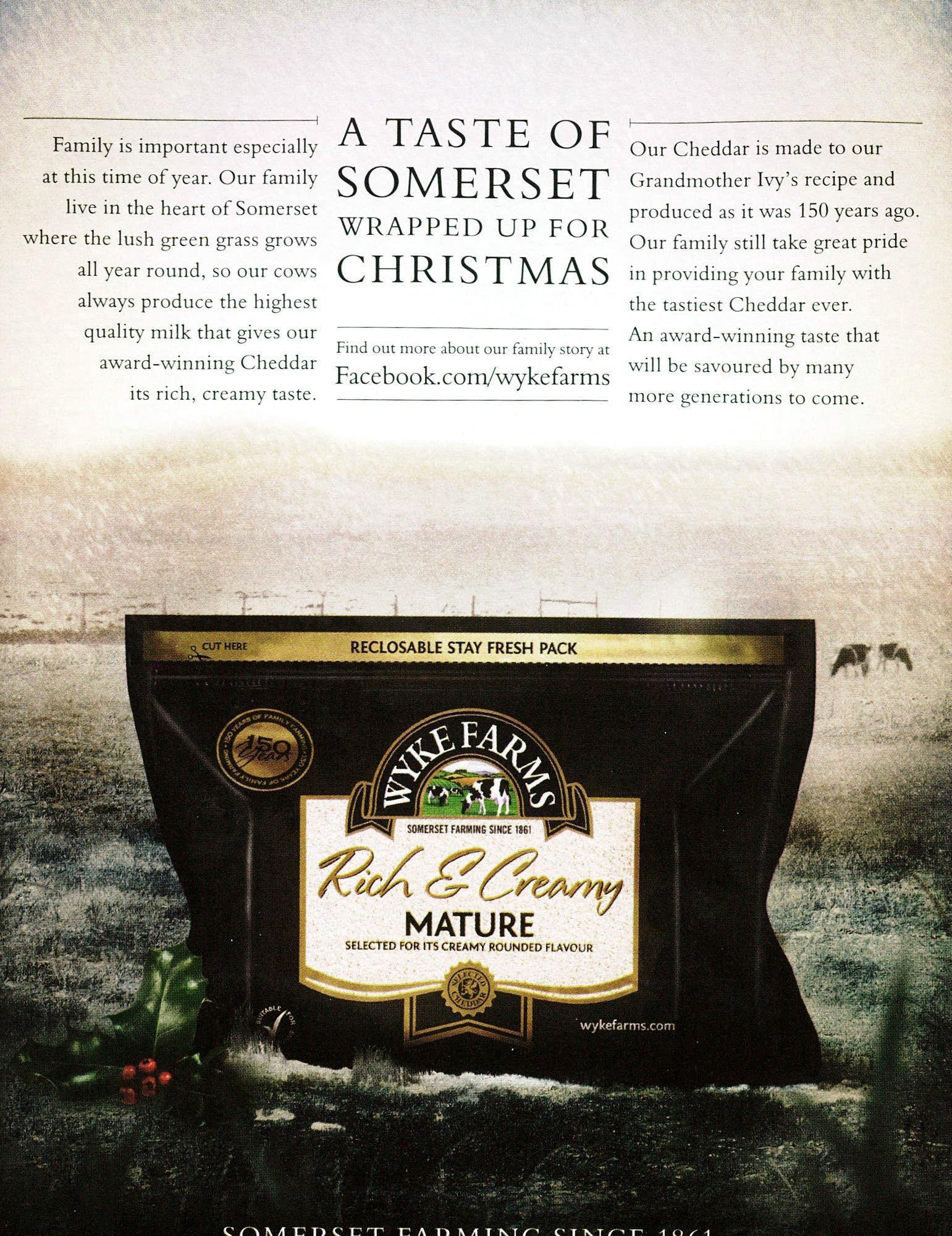
Our Cheddar is made to our Grandmother Ivy's recipe and produced as it was 150 years ago. Our family still take great pride in providing your family with the tastiest Cheddar ever. An award-winning taste that will be savoured by many more generations to come.
...virtual gaming will get real, says
Gary RimmerOne of the hottest gifts this year is Sphero, a smartphonecontrolled robotic ball. Swing your phone like a golf club and Sphero behaves like a ball on a putting green. So what kind of presents can we expect next?
Sphero heralds virtual gaming brought into the real world. Install a rolling road dynamometer in a garage floor (like those used in an MOT to test accelerator and brakes), hook up a giant LED screen, and an interface allows you to drive your car inside your own video road race. Or maybe you'll receive a Robokind "robot child" (above) to play football with you.
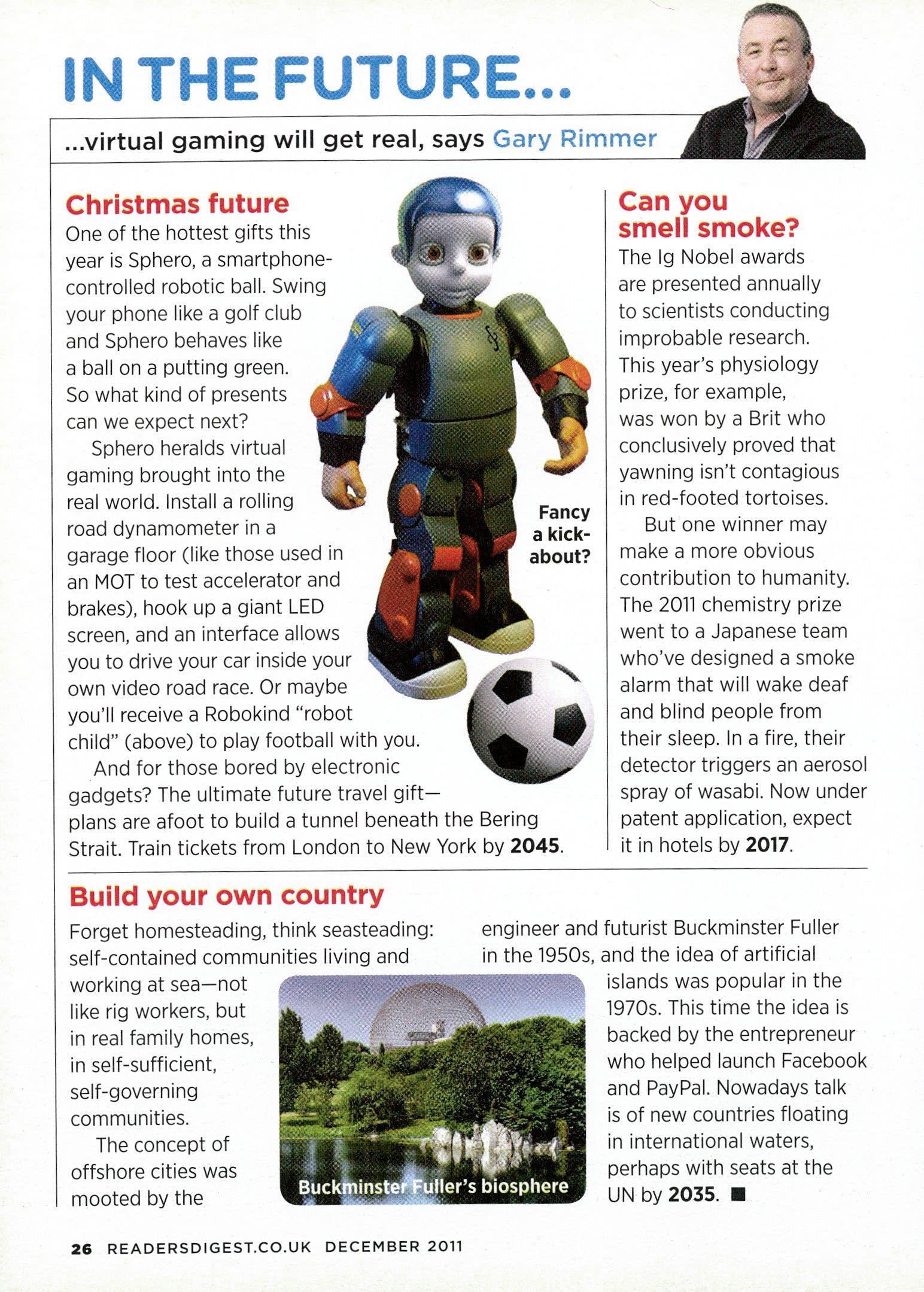
Fancy a kickabout?
And for those bored by electronic gadgets? The ultimate future travel gift— plans are afoot to build a tunnel beneath the Bering Strait. Train tickets from London to New York by 2045.
Forget homesteading, think seasteading: self-contained communities living and working at sea—not like rig workers, but in real family homes, in self-sufficient, self-governing communities.
The concept of offshore cities was mooted by the
The Ig Nobel awards are presented annually to scientists conducting improbable research. This year's physiology prize, for example, was won by a Brit who conclusively proved that yawning isn't contagious in red-footed tortoises. But one winner may make a more obvious contribution to humanity. The 2011 chemistry prize went to a Japanese team who've designed a smoke alarm that will wake deaf and blind people from their sleep. In a fire, their detector triggers an aerosol spray of wasabi. Now under patent application, expect it in hotels by 2017.
engineer and futurist Buckminster Fuller in the 1950s, and the idea of artificial islands was popular in the 1970s. This time the idea is backed by the entrepreneur who helped launch Facebook and PayPal. Nowadays talk is of new countries floating in international waters, perhaps with seats at the UN by 2035. •
Guo

On
Free cleft surgery which takes as little as 45 minutes and costs as little as £150, can give desperate children not just a new smile — but a new
I want to give a child a second chance at life.
0 £150 towards surgery for one child
D £30 towards medications for one surgery D £75 could cover half the cost of one surgery 0 £ We'll gratefully accept any amount
Mr/Mrs/Ms
Address
Postcode
Email Telephone
Charge my gift to my: ❑ Visa CI MasterCard ❑ Maestro Card No.
Signature
O My cheque is enclosed, made payable to The Smile Train UK
Use Gift Aid to increase your donation by 25%
ID YES, I would like Smile Train to claim Gift Ad on any donations that I have made within the last 4 years and all donations 1 make in the future until further notice. I confirm that I pay sufficient UK incometcapital gains tax to cover any tax that Smile Train will reclaim from any donations that I make. 0 NO, l am not a UK taxpayer. Send this coupon with your donation to: The Smile Train UK, PO Box 910, Northampton NN3
These details, including your email address/telephone number, may be used to keep you informed about our future developments. t you do not want to receive such information please tick this box El
With big changes the subject of heated debate in the form of the Health and Social Care Bill, what is the current state of the NHS? And, more importantly, what will it look like in the future?
Since it was founded on July 5, 1948, the NHS has grown to become the world's largest publicly funded health service. It employs 1.7 million people, with just under half of the employees clinically qualified. There are 120,000 hospital doctors, 40,000 GPs, 400,000 nurses and 25,000 ambulance staff. The NHS costs just over £100bn each year, the equivalent of £1,980 for every person in the country. Health expenditure has gone up by over ten times, in real terms, since the NHS's foundation 63 years ago.
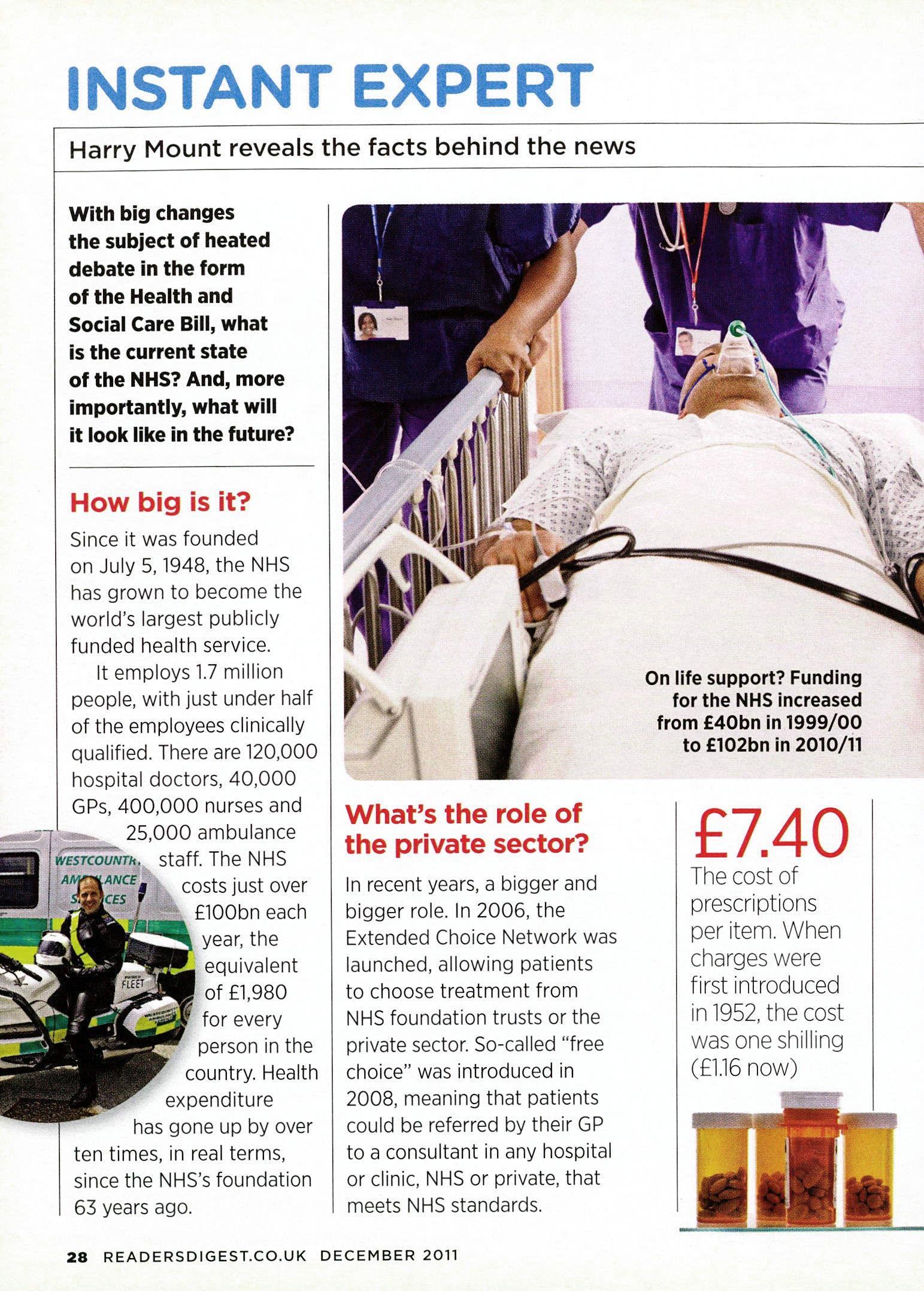
On life support? Funding for the NHS increased from £40bn in 1999/00 to f102bn in 2010/11
In recent years, a bigger and bigger role. In 2006, the Extended Choice Network was launched, allowing patients to choose treatment from NHS foundation trusts or the private sector. So-called "free choice" was introduced in 2008, meaning that patients could be referred by their GP to a consultant in any hospital or clinic, NHS or private, that meets NHS standards.
£7.40
The cost of prescriptions per item. When charges were first introduced in 1952, the cost was one shilling (£1.16 now)
The Conservatives have promised to keep the NHS free at the point of use, while opening it up more to market forces—the final position looks set to be a compromise that accommodates both these aims. The Bill proposes the creation of an independent NHS Board, with the aim of promoting patient choice and reducing NHS administration costs. This new board would allocate resources and provide commissioning guidance.
If the plans work out as Lansley envisages, you'll have greater control over your healthcare. Your GP will be able to commission services on your behalf, and with more accountability and more competition in the NHS, the idea is that services will improve while costs come down.

The Health and Social Care Bill is still making its way through Parliament. The original aim, pushed by health secretary Andrew Lansley, was to give family doctors greater powers and to increase the privatesector element.
Critics of the reforms say that an increased market role, combined with cuts, will hollow out the freefor-all ethos of the NHS. There's no suggestion that you'll have to start paying for services that are now free, but according to the King's Fund— the think-tank that works on health issues—the NHS will have to find productivity improvements of £20bn by 2015 if it wants to meet rising demand while maintaining quality and avoiding significant cuts.
It's too early to tell. While bumping up the powers of GPs and several existing authorities, the Coalition wants to cut the overall number of health bodies, in line with its plans to reduce administration costs by a third. Both primary care trusts and strategic health authorities will be abolished under the Bill's provisions. But these cuts may well not be enough to make the required savings. ■
Clarissa Baldwin is the chief executive of the UK's largest dog charity, Dogs Trust (formerly the National Canine Defence League). She joined in 1974 as a PR officer and coined the famous slogan, "A dog is for life, not just for Christmas." The charity now cares for 16,000 dogs a year and employs 600 people. Clarissa was awarded the OBE in 2003 for her work in animal welfare.
I'd bring back the old style of matron. My father died a few years ago, and MRSA was a contributing factor. The hospital was very dirty— no one had cleaned under his bed for weeks. It was horrific. The NHS should reinstate matrons who ensure that nurses do their jobs properly and wards are kept spotlessly clean.
I'd make the food I love non-fattening. I gave up smoking seven years ago and, although I'm thrilled I've stopped, I've put on weight! I tend to snack on crisps and nuts when I'm having a drink, and love ice cream and chocolate. Even though I try to get to the gym three times a week and no longer indulge in a Sunday roast with all those lovely potatoes, being of a certain age
I find it increasingly hard to shed the extra pounds.
I'd get rid of the EU. Whenever I read or hear about it, it's negative. I think MEPs' salaries and expenses are a ludicrous waste of money, as is the constant movement of the European parliament from Brussels to Strasbourg. It's about time we had a referendum to ask people if they still want to be part of it.
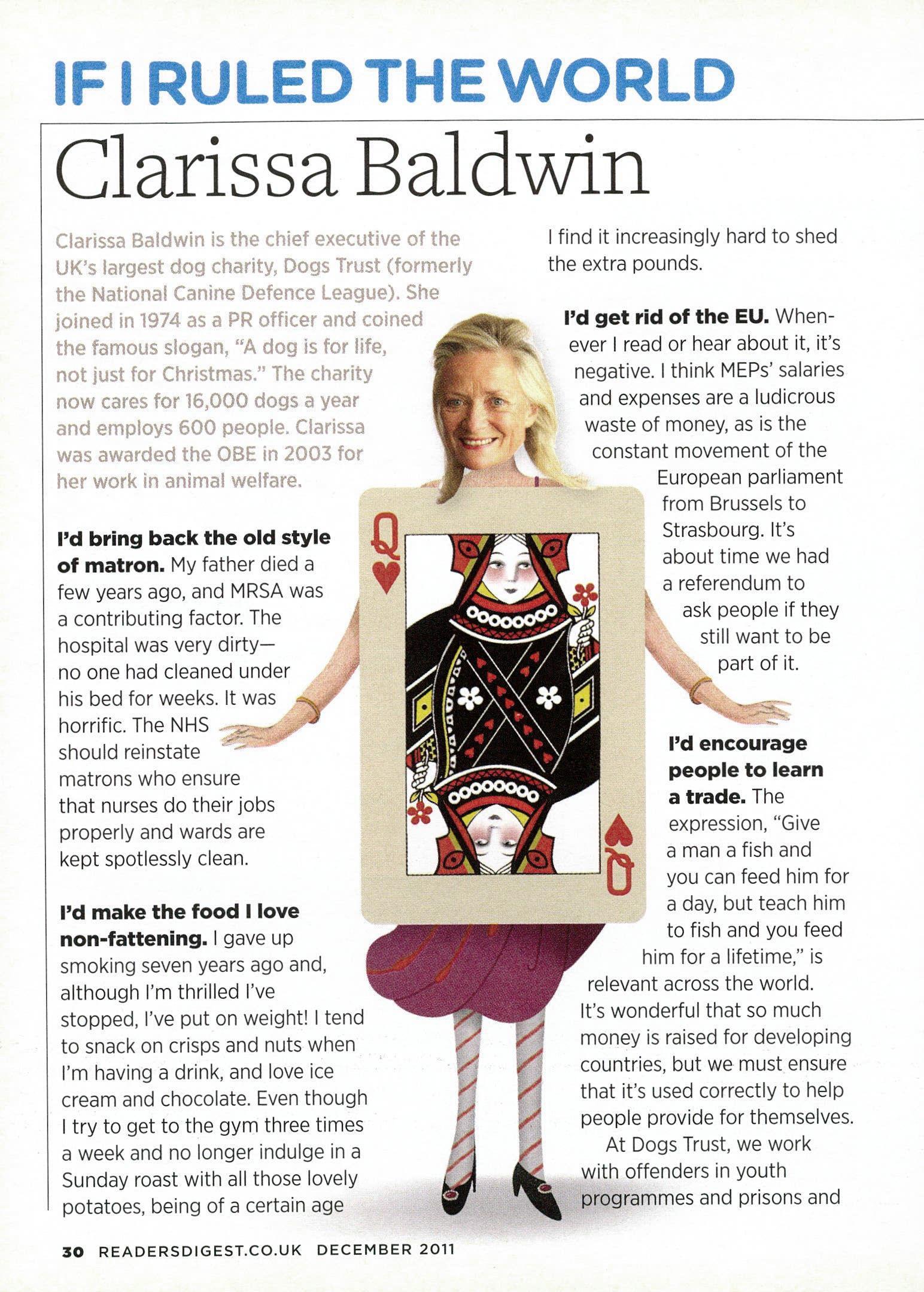
I'd encourage people to learn a trade. The expression, "Give a man a fish and you can feed him for a day, but teach him to fish and you feed him for a lifetime," is relevant across the world. It's wonderful that so much money is raised for developing countries, but we must ensure that it's used correctly to help people provide for themselves.
At Dogs Trust, we work with offenders in youth programmes and prisons and
see the difference that having a purpose in life can make to people. We're also conscious that we're very fortunate to be given funding and mustn't ever waste it. We do a quality job first, tell people what we're doing, then ask for their financial help to carry on.
I'd re-evaluate our state benefits. In particular, I think persistent offenders should have their benefits withheld until they put something back into society. Anyone who risks having money taken away from them is going to be disgruntled, but I think Mr Cameron is right to look at who's getting disability allowances. I'm sure we all know people who're getting unnecessary benefits—even child benefit should be evaluated on need. With our growing population, I'm not sure we should be making it any easier to have children.
I'd make sure paperbacks didn't fall apart. On holiday recently, I was sitting by the pool when the pages of my book fell out and were blown away. I don't remember them being so flimsy ten years ago. A book should be able to withstand a holiday!
The NHS should reinstate matrons who ensure that nurses do their jobs properly
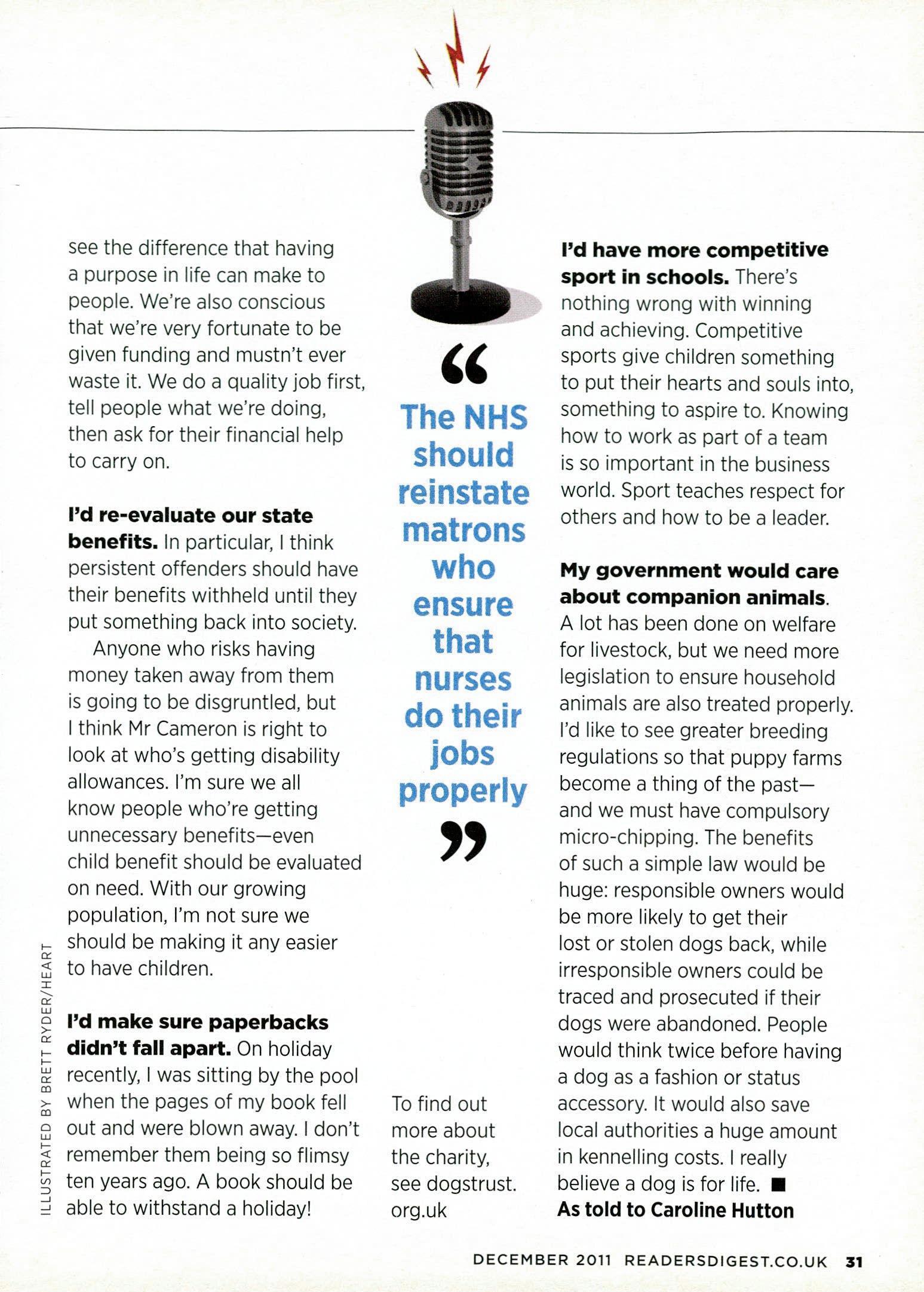
To find out more about the charity, see dogstrust. org.uk
I'd have more competitive sport in schools. There's nothing wrong with winning and achieving. Competitive sports give children something to put their hearts and souls into, something to aspire to. Knowing how to work as part of a team is so important in the business world. Sport teaches respect for others and how to be a leader.
My government would care about companion animals. A lot has been done on welfare for livestock, but we need more legislation to ensure household animals are also treated properly. I'd like to see greater breeding regulations so that puppy farms become a thing of the past— and we must have compulsory micro-chipping. The benefits of such a simple law would be huge: responsible owners would be more likely to get their lost or stolen dogs back, while irresponsible owners could be traced and prosecuted if their dogs were abandoned. People would think twice before having a dog as a fashion or status accessory. It would also save local authorities a huge amount in kennelling costs. I really believe a dog is for life. ■
As told to Caroline Hutton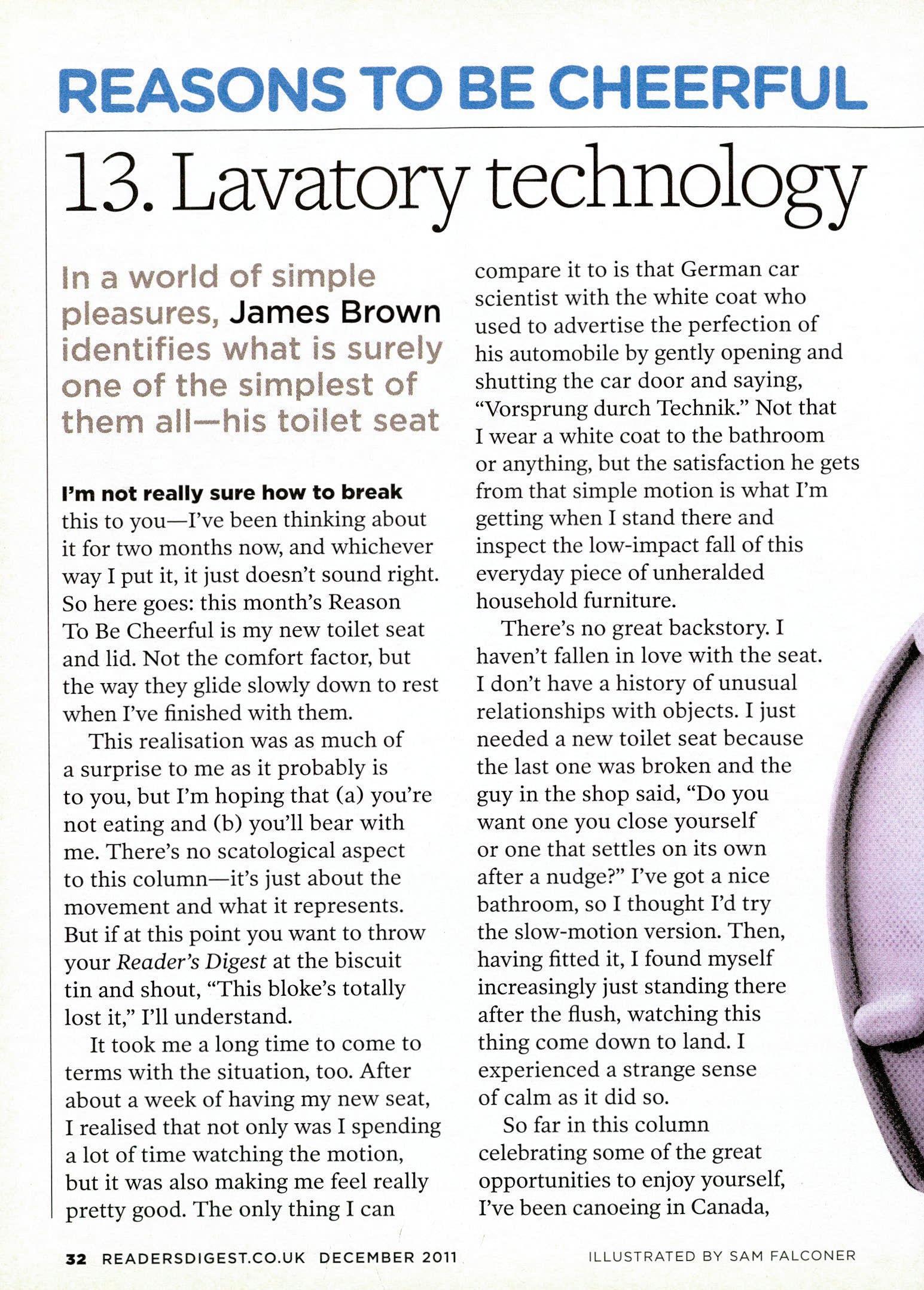
In a woria of simple pleasures, James Brown identifies what is surely one of the simplest of them all—his toilet seat
I'm not really sure how to break this to you—I've been thinking about it for two months now, and whichever way I put it, it just doesn't sound right. So here goes: this month's Reason
To Be Cheerful is my new toilet seat and lid. Not the comfort factor, but the way they glide slowly down to rest when I've finished with them. This realisation was as much of a surprise to me as it probably is to you, but I'm hoping that (a) you're not eating and (b) you'll bear with me. There's no scatological aspect to this column—it's just about the movement and what it represents. But if at this point you want to throw your Reader's Digest at the biscuit tin and shout, "This bloke's totally lost it," I'll understand.
It took me a long time to come to terms with the situation, too. After about a week of having my new seat, I realised that not only was I spending a lot of time watching the motion, but it was also making me feel really pretty good. The only thing I can
compare it to is that German car scientist with the white coat who used to advertise the perfection of his automobile by gently opening and shutting the car door and saying, "Vorsprung durch Technik." Not that I wear a white coat to the bathroom or anything, but the satisfaction he gets from that simple motion is what I'm getting when I stand there and inspect the low-impact fall of this everyday piece of unheralded household furniture.
There's no great backstory. I haven't fallen in love with the seat. I don't have a history of unusual relationships with objects. I just needed a new toilet seat because the last one was broken and the guy in the shop said, "Do you want one you close yourself or one that settles on its own after a nudge?" I've got a nice bathroom, so I thought I'd try the slow-motion version. Then, having fitted it, I found myself increasingly just standing there after the flush, watching this thing come down to land. I experienced a strange sense of calm as it did so.
So far in this column celebrating some of the great opportunities to enjoy yourself, I've been canoeing in Canada,
mucking out in Thirsk and cooking in Puglia. So I wasn't too sure you or I were ready for a subject reduction on such a major scale.
Despite secretly knowing that this was what I wanted to write about, I only realised I could do this as a collective column when I noticed how much I enjoyed leaping three at a time down the stairs (not the escalators) that lead directly to the platform of my local London Underground station. I enjoy the bounce as I miss two steps,

hit the third and risk a tumble as I hear the hiss of the tube doors. It's not a big deal but, again, it makes me happy when I do it.
These small, everyday occurrences actually provide a lot of enjoyment, or at least a degree of comfort and satisfaction. I cautiously suggested my theory to the editor of this magazine during a lunch, and she immediately said, "Yes, and I do this," and picked up the pepper pot and sniffed it.
By now I'm betting (hoping) you're having a small flicker of recognition. These are tiny, almost unnoticeable habits we have. They are conscious acts, not involuntary physical actions or sounds.
They aren't that sigh of contentment as the last guests leave/work is done/Curb Your Enthusiasm, Deadwood or your favourite programme comes on. Nor are they to do with the head-and-hand movements we use to express enjoyment (nodding, clapping, waving, etc). Instead, these are particular traits that help make up our unique physical imprint. They are pleasures we take—very personal ones—that we're often embarrassed to admit to. (I know, I know—"Hey, this guy's attempting to intellectualise his falling ►
4( Somewhere along the line, we parked the enjoyment of small things and replaced it with responsibility and seriousness ))
toilet-seat action." I'm with you in your suspicions, but this is an open confession.)
I've come to the conclusion that these pleasures are the last remnants of childhood we haven't yet edited out. Think how much a kid loves dragging a stick along railings and how much it irritates an adult. Somewhere along the line, we parked the childlike enjoyment of small things and replaced it with responsibility and seriousness. The open-minded exploration that children have is
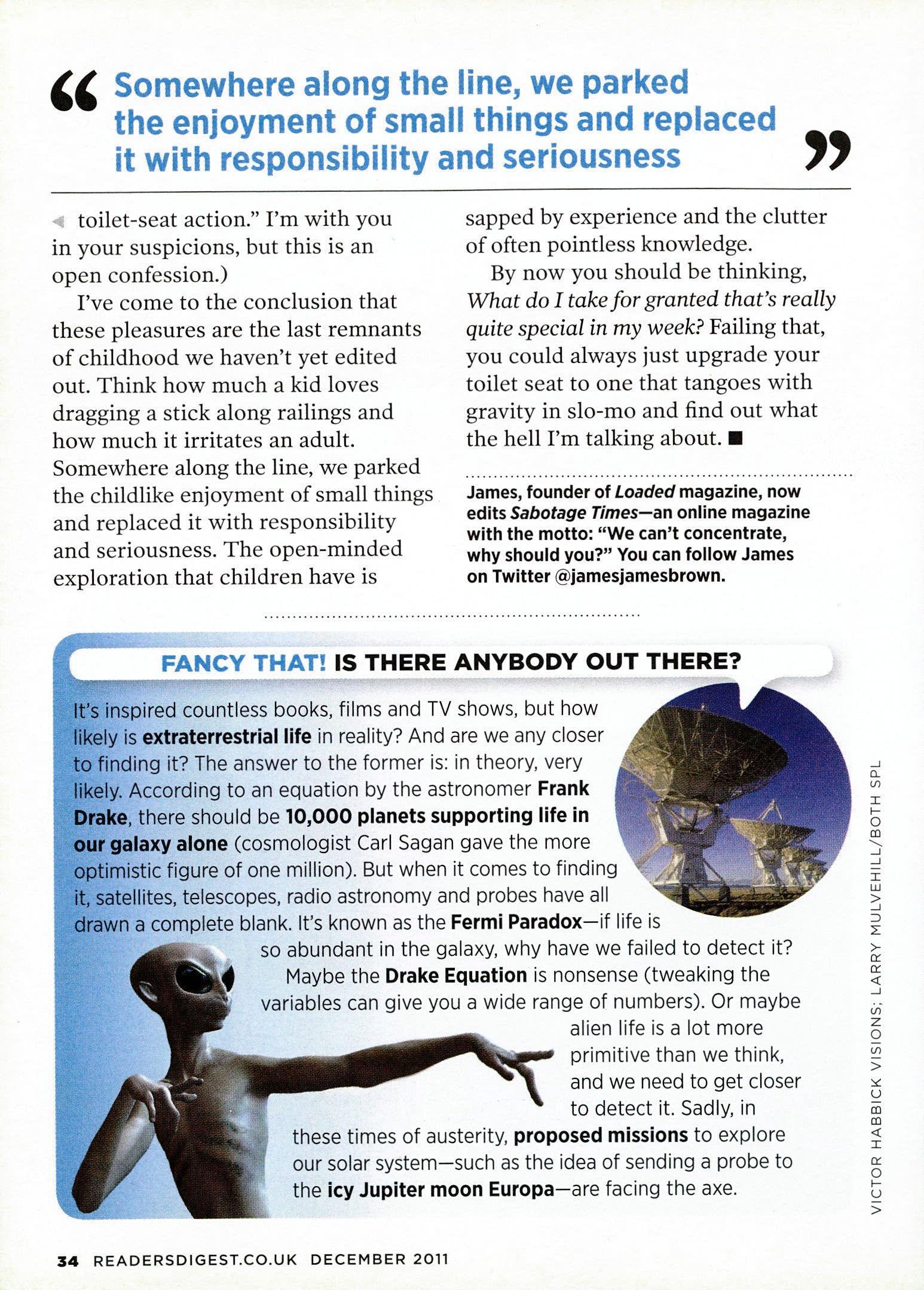
sapped by experience and the clutter of often pointless knowledge. By now you should be thinking, What do I take for granted that's really quite special in my week? Failing that, you could always just upgrade your toilet seat to one that tangoes with gravity in slo-mo and find out what the hell I'm talking about. ■
James, founder of Loaded magazine, now editsSabotage Times—an online magazine with the motto: "We can't concentrate, why should you?" You can follow James on Twitter @jamesjamesbrown.
It's inspired countless books, films and TV shows, but how likely is extraterrestrial life in reality? And are we any closer to finding it? The answer to the former is: in theory, very likely. According to an equation by the astronomer Frank Drake, there should be 10,000 planets supporting life in our galaxy alone (cosmologist Carl Sagan gave the more optimistic figure of one million). But when it comes to finding it, satellites, telescopes, radio astronomy and probes have all drawn a complete blank. It's known as the Fermi Paradox—if life is so abundant in the galaxy, why have we failed to detect it? Maybe the Drake Equation is nonsense (tweaking the variables can give you a wide range of numbers). Or maybe alien life is a lot more primitive than we think, and we need to get closer to detect it. Sadly, in these times of austerity, proposed missions to explore our solar system—such as the idea of sending a probe to the icy Jupiter moon Europa—are facing the axe.

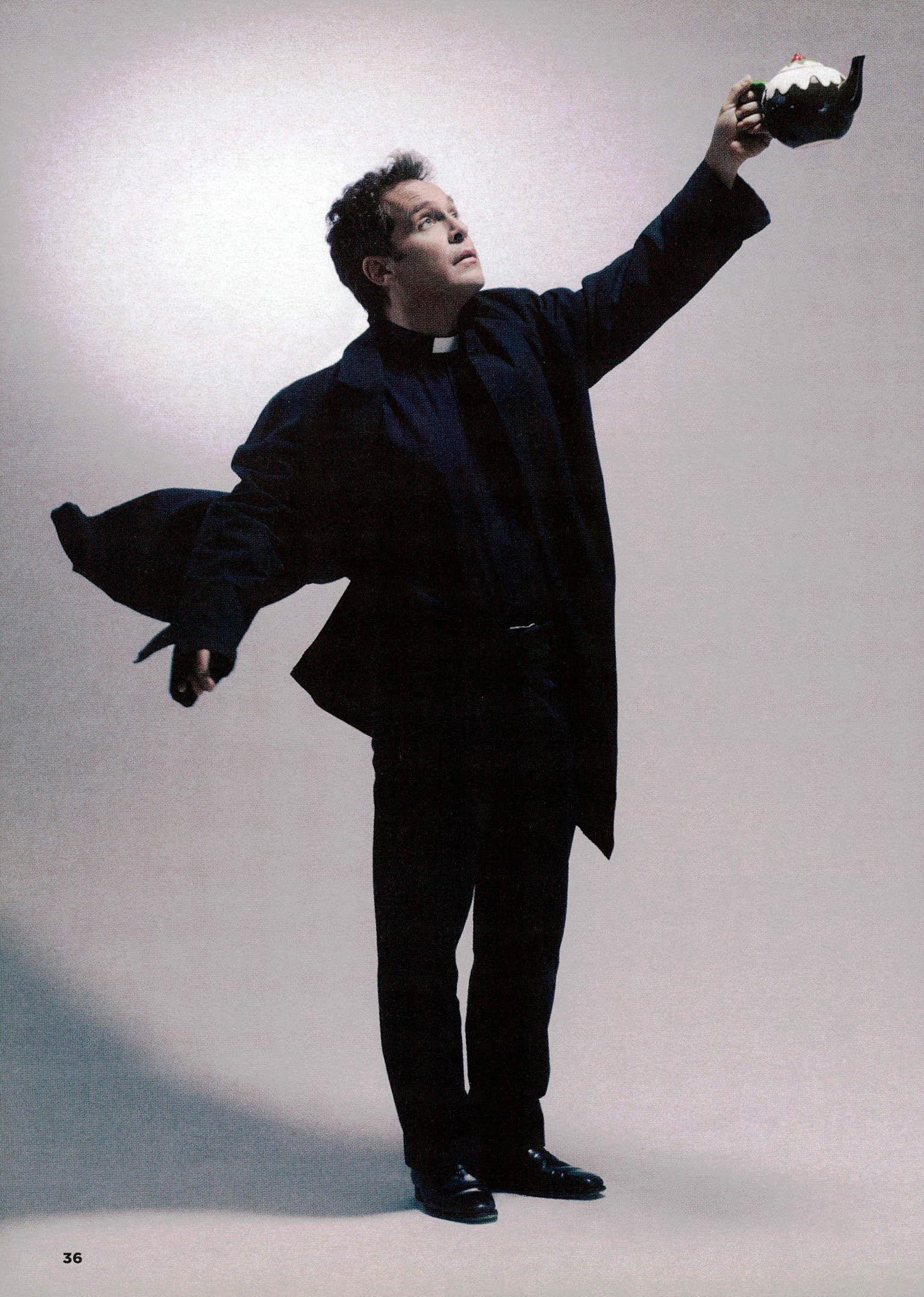
Life can be hard for the modern clergy—but, thanks to a BBC sitcom, they've now found an unlikely new hero. Step forward Tom Hollander...

He only set out to make a successful TV show. Yet, as the Reverend Adam Smallbone in the Bafta-winning Rev, Tom Hollander has somehow become the modern face of the dog collar. The TV comedy about a rural priest moving to an inner-city parish has re-invented the image of Anglican vicars—and made Tom something of a hero among men of the cloth.
He knows this, he tells me—as we meet near his West London home to discuss the Rev Christmas special—because they tell him all the time.
"One man, who'd had a breakdown, came up and said, `Thank you for that programme. It restored my faith in what I'm doing,'" Tom recalls. "Then again, a woman came up ■
in Waterstone's the other day and said, `Thank you so much for your series. It confirms all the reasons I gave up.'
"But we've been taken aback by the positive response to the show. The extent to which the clergy love it makes it feel as if we've poured water onto a plant that's been starved for a long time. The Church is quite used to seeing itself portrayed comically, without anybody taking what it does seriously. But here the vicar isn't too funny himself—it's the situations he finds himself in."
So accurate is Rev's warts-and-all representation of clergy life—taking in everything from obsessive parishioners to money crises and parents going to church just to get school places for their kids—that it's now shown to trainee vicars. And Tom says we can expect more of the same for the Christmas special.
"The basic set-up is that the festive season is a tough time for vicars—a concentrated version of everyone else's experience. I mean, it's quite stressful, isn't it? You have to see family members that you spend the rest of the year avoiding. Well, vicars also have countless carol services, and must constantly put on a show. They're up at 5am every day rushing around...they're just frantic."
As ever with Rev, the aim is to show that—aside from the God stuff—Adam Smallbone is just an everyman, trying to be good in a bad old world.
"We try to make him an average bloke with recognisable anxieties," says Tom, who co-created the show with the main writer James Wood. "When we researched the series, we found that vicars are endlessly put in mildly humiliating situations.
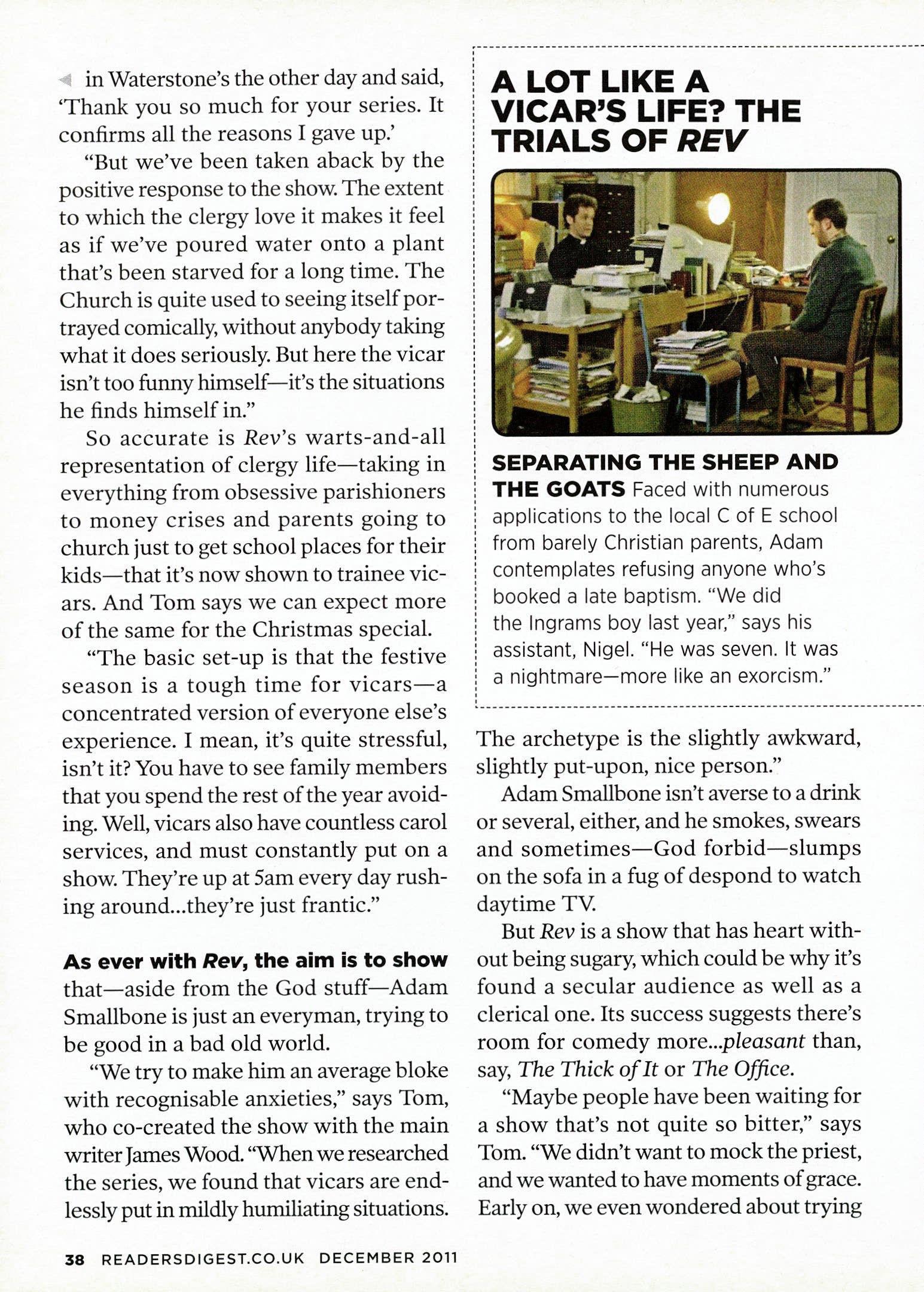
SEPARATING THE SHEEP AND THE GOATS Faced with numerous applications to the local C of E school from barely Christian parents, Adam contemplates refusing anyone who's booked a late baptism. "We did the Ingrams boy last year," says his assistant, Nigel. "He was seven. It was a nightmare—more like an exorcism."
The archetype is the slightly awkward, slightly put-upon, nice person."
Adam Smallbone isn't averse to a drink or several, either, and he smokes, swears and sometimes—God forbid—slumps on the sofa in a fug of despond to watch daytime TV.
But Rev is a show that has heart without being sugary, which could be why it's found a secular audience as well as a clerical one. Its success suggests there's room for comedy more...pleasant than, say, The Thick of It or The Office.
"Maybe people have been waiting for a show that's not quite so bitter," says Tom. "We didn't want to mock the priest, and we wanted to have moments of grace. Early on, we even wondered about trying
Adam lends his church to trendy vicar Darren, who installs plasma screens and a smoothie bar. "The more God loves you, the better your PA system," Darren reckons.
Adam's fundraising ideas to fix a church window don't impress his sarcastic boss, Robert. Why not an auction of my time, suggests Adam. "I think we both know how much that would raise," comes the reply.
to have miracles. Our little show is just quite good-natured. Simple as that."
Tom, more reflective and intellectual than your average actor, thinks a bit more, then adds, "And maybe people like it because it's about faith and doesn't take the mickey out of it. The idea that people are searching for something beyond themselves is not made ridiculous. These are strange days we live in, with economic uncertainty and so on. At times like this, I think you want to be...kinder."
The creation process for Rev entails Tom, James Wood, director Peter Cattaneo and producers Kenton Allen and Hannah Pescod (they're a close-knit team and Tom is determined that they all get
Down-and-out Mick constantly asks Adam for money. This time, it's to visit his sick mum. The previous week, she'd "died" and he needed cash to go and identify her body.
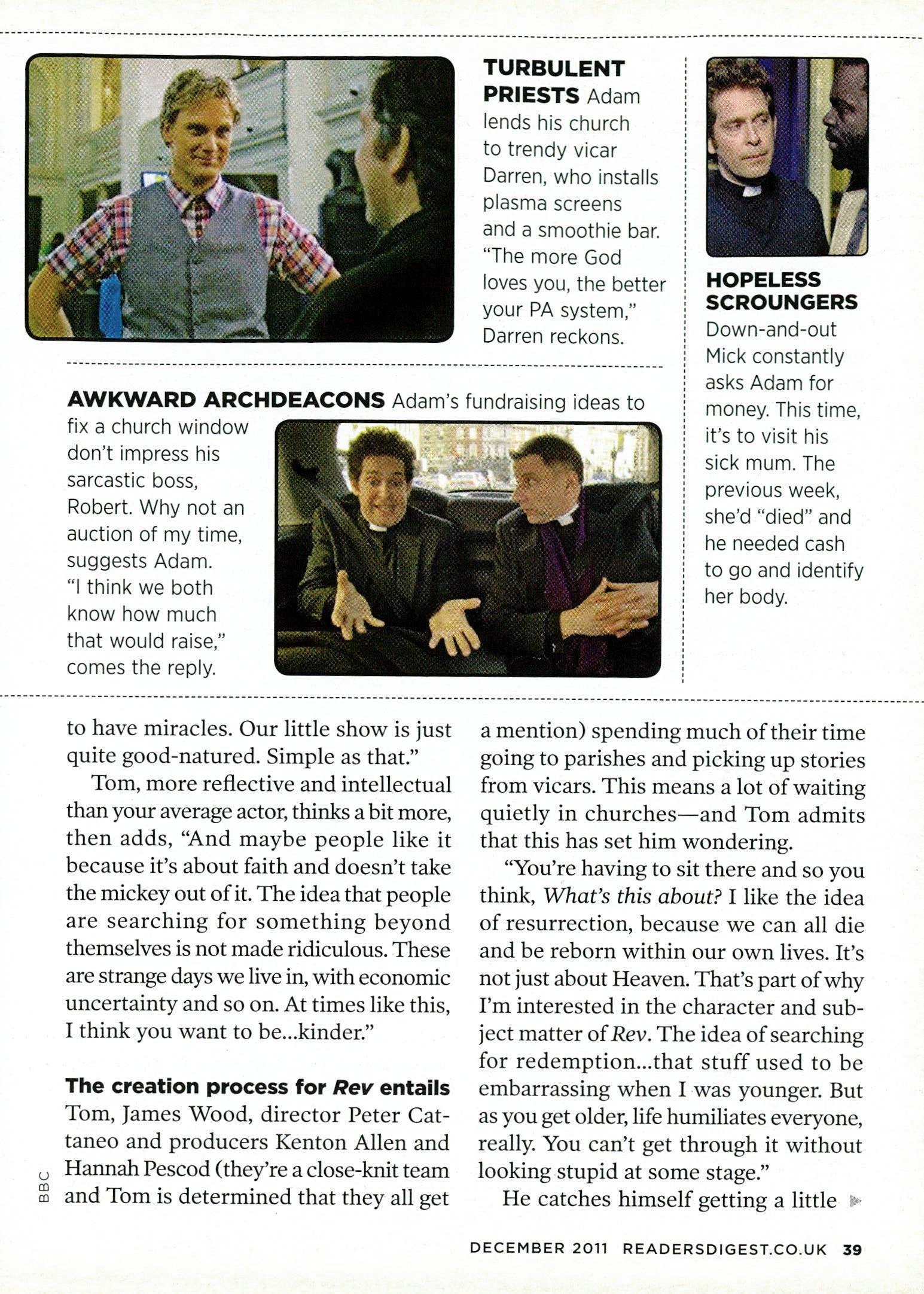
a mention) spending much of their time going to parishes and picking up stories from vicars. This means a lot of waiting quietly in churches—and Tom admits that this has set him wondering.
"You're having to sit there and so you think,What's this about? I like the idea of resurrection, because we can all die and be reborn within our own lives. It's not just about Heaven. That's part of why I'm interested in the character and subject matter ofRev. The idea of searching for redemption...that stuff used to be embarrassing when I was younger. But as you get older, life humiliates everyone, really. You can't get through it without looking stupid at some stage."
He catches himself getting a little to-
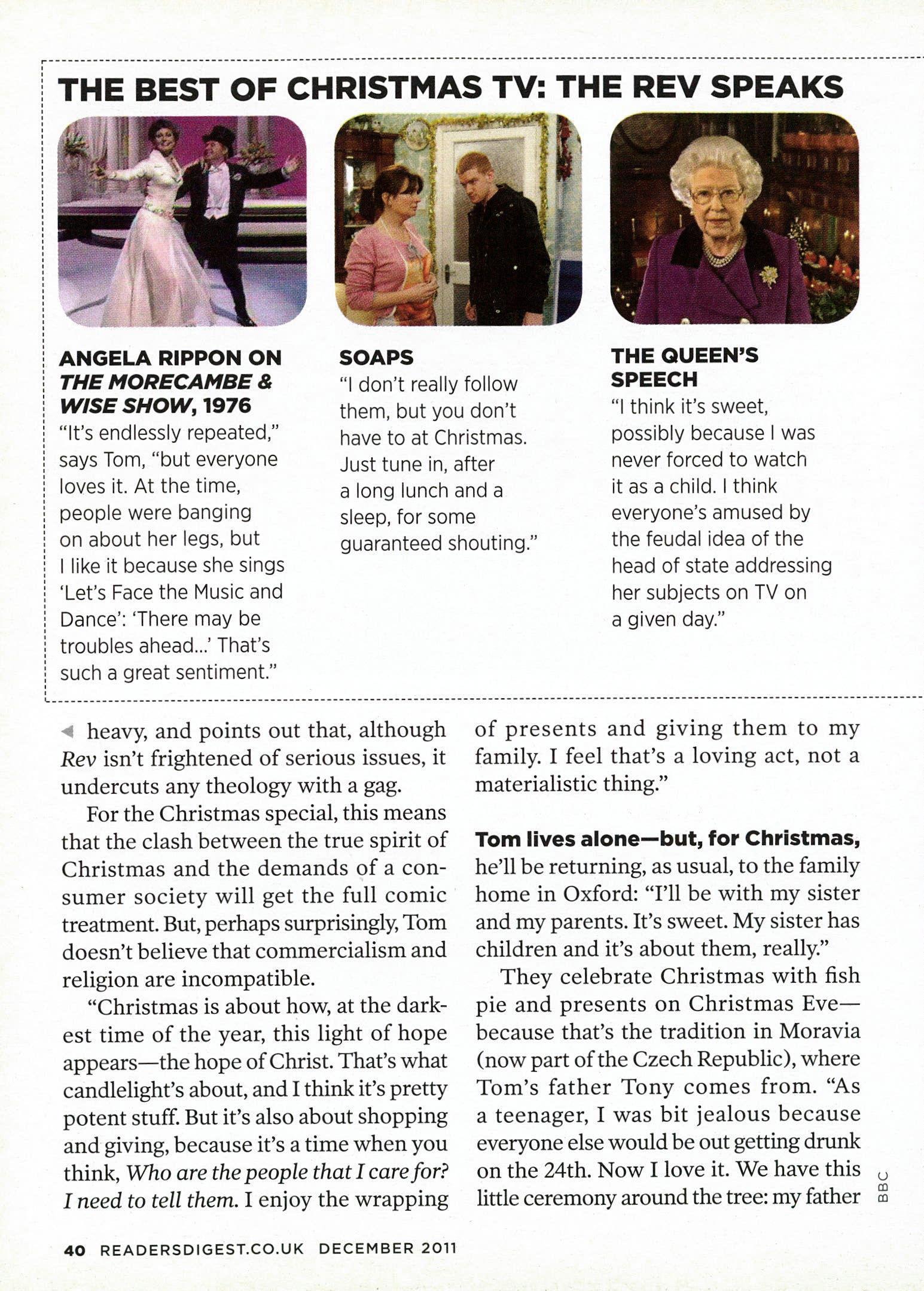
"It's endlessly repeated," says Tom, "but everyone loves it. At the time, people were banging on about her legs, but I like it because she sings 'Let's Face the Music and Dance': 'There may be troubles ahead...' That's such a great sentiment."
"I don't really follow them, but you don't have to at Christmas. Just tune in, after a long lunch and a sleep, for some guaranteed shouting."
"I think it's sweet, possibly because I was never forced to watch it as a child. I think everyone's amused by the feudal idea of the head of state addressing her subjects on TV on a given day."
. heavy, and points out that, although Rev isn't frightened of serious issues, it undercuts any theology with a gag.
For the Christmas special, this means that the clash between the true spirit of Christmas and the demands of a consumer society will get the full comic treatment. But, perhaps surprisingly, Tom doesn't believe that commercialism and religion are incompatible.
"Christmas is about how, at the darkest time of the year, this light of hope appears—the hope of Christ. That's what candlelight's about, and I think it's pretty potent stuff. But it's also about shopping and giving, because it's a time when you think, Who are the people that I care for? I need to tell them. I enjoy the wrapping
of presents and giving them to my family. I feel that's a loving act, not a materialistic thing."
Tom lives alone but, for Christmas, he'll be returning, as usual, to the family home in Oxford: "I'll be with my sister and my parents. It's sweet. My sister has children and it's about them, really."
They celebrate Christmas with fish pie and presents on Christmas Eve— because that's the tradition in Moravia (now part of the Czech Republic), where Tom's father Tony comes from. "As a teenager, I was bit jealous because everyone else would be out getting drunk on the 24th. Now I love it. We have this little ceremony around the tree: my father
"It's become another Christmassy thing to look forward to— marvellously inventive animation and brilliant scripts. I wish they did more of them, but I know all that Plasticine stuff is really labour-intensive."
2!-1-ttit.
"The Sound of Music and The Great Escape are must-sees, surely? I did once want to be in something that's on every Christmas. And Pirates of the Caribbean [where Tom plays Cutler Beckett] seems to have done the trick. But, no, I don't rush to show the kids that Uncle Tom is on TV."
lights candles for family members—dead and alive—then rings a bell that used to be rung by his father. It's supposed to be the spirit of Christmas arriving."
Chances are that the family will go to church on Christmas Day itself. So what happens when the country's best-known fictional vicar makes his entrance?
The answer is that there's more praise from his real-life counterparts. "It's strange. I went to a church in London's
"I should add that I love our Christmas special. But I'm a bit biased."
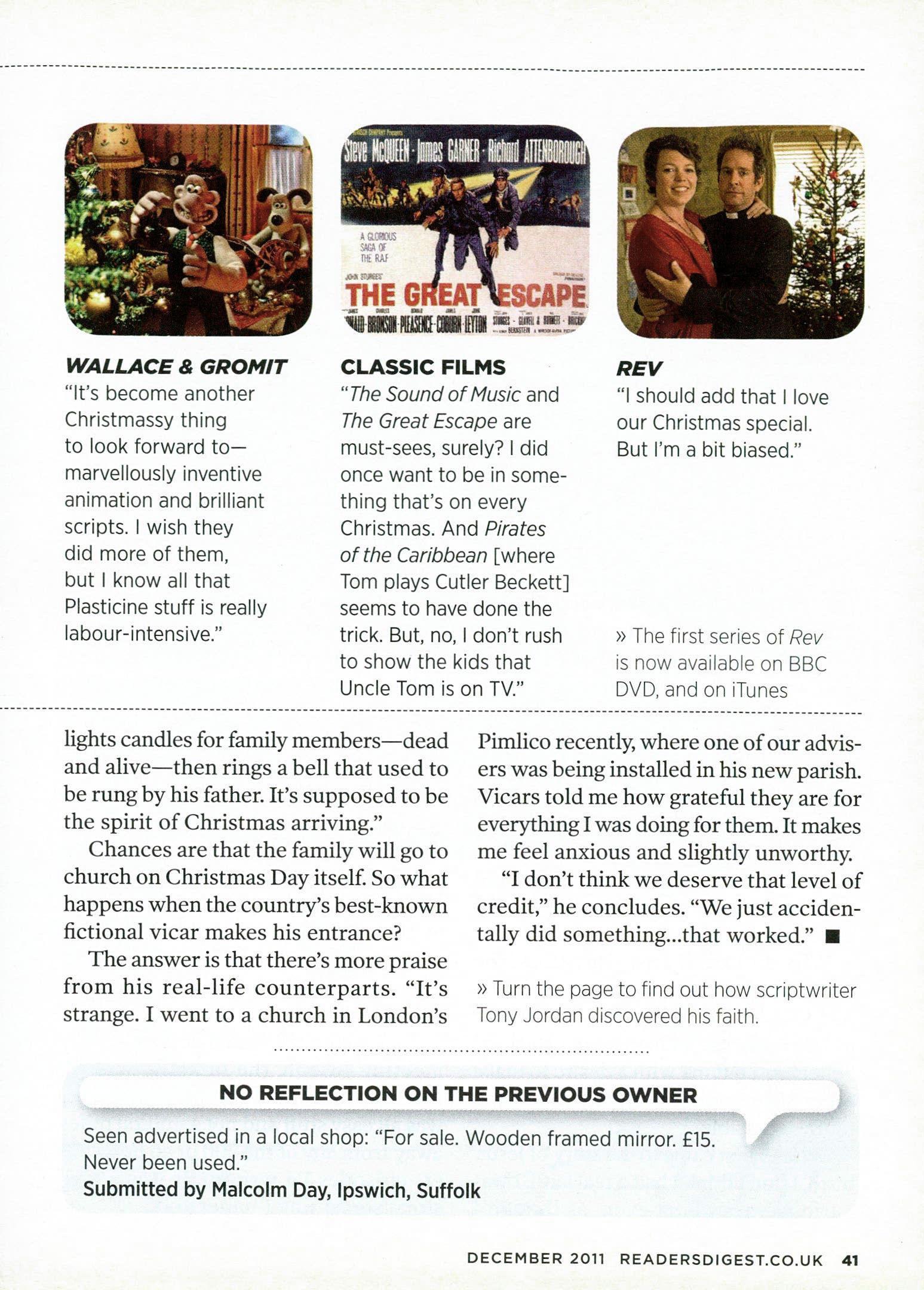
» The first series of Rev is now available on BBC DVD, and on iTunes
Pimlico recently, where one of our advisers was being installed in his new parish. Vicars told me how grateful they are for everything I was doing for them. It makes me feel anxious and slightly unworthy.
"I don't think we deserve that level of credit," he concludes. "We just accidentally did something...that worked." •
» Turn the page to find out how scriptwriter Tony Jordan discovered his faith.
Seen advertised in a local shop: "For sale. Wooden framed mirror, £15. Never been used."
Submitted by Malcolm Day, Ipswich, Suffolk
• Then, one evening, working late, I came to the scene where Mary is visited by Gabriel. As I wrote the dialogue for the angel who kneels before Mary and reveals she has the light of the world inside her, I felt a shudder—almost as though I suddenly knew the story was true. I realised that something so beautiful, that changed the world forever, was impossible to dismiss as fabricated.
Over the following days, I began to write with a real belief in the story and respect for its message. I had a sense of awe that's hard to explain. I sobbed as I wrote the scenes of Mary giving birth, Joseph accepting his role and the shepherds arriving to worship the baby.
So does this mean I'm now a bona fide Christian? Well, the truth is I have just as many questions as before and still struggle to make sense of everything. But yes, I have a faith. I have no doubt there is a God, that we are all ultimately answerable for our actions and that there is something else when we die.
Atheists and some moronic scientists

ridicule such belief by invoking an image of God as a guy with a white beard sitting on a cloud, then pointing out that only a fool would accept it. Yet I think that, though God's doctrine is clear enough, his form is beyond our comprehension.
I don't believe I live any differently since I discovered my faith. I still write the con drama Hustle, undisturbed by its moral ambiguity. Bible-bashing zealots so quick to judge everyone else make me angry. They are the reason millions of people have been killed in the name of Christianity. I have little time for organised religion, which I think can be in direct conflict with Christ's teachings.
But I suppose everyone who is moved by the words of Jesus, or who understands love and the blinding clarity of "Do unto others as you would have them do unto you", must wonder what their part is in the grand scheme of things.
Perhaps my part is to take those Bible stories and use any talent I have to bring them to life for a new audience. •
READER'S DIGEST is available in a talking edition for blind and partially sighted people. Each month, a selection from the magazine is recorded by National Talking Newspapers and Magazines and is available on two audio CDs or cassettes, DAISY disk (compatible with RNIB Talking Book players), MP3 download or digital full text, playable on a computer. The service is available for a modest annual subscription. For details, contact the National Recording Centre, 10 Browning Road, Heathfield, East Sussex TN21 8DB. Telephone: 01435 866 102; email: info@ tnauk.org.uk, website: tnauk.org.uk. Donations to National Talking Newspapers and Magazines should be sent to the same address.

Send fresh flowers in a personalised card... sent direct from the UK to arrive on the day you want
"We have sent over 500,000 flowercards to satisfied customers direct from our home grown nurseries, right here in the United Kingdom... for the finest quality flowers"
•The flowers are freshly picked and wrapped in a sealed water oasis.
•A pretty painted poinsettia paired with fresh carnations make this a floral greeting as rosy as Rudolph's nose. They don't need watering but if watered can last up to 2 weeks (a pipette is included for watering).
•Add a personalised message that will be printed on the front of the card.
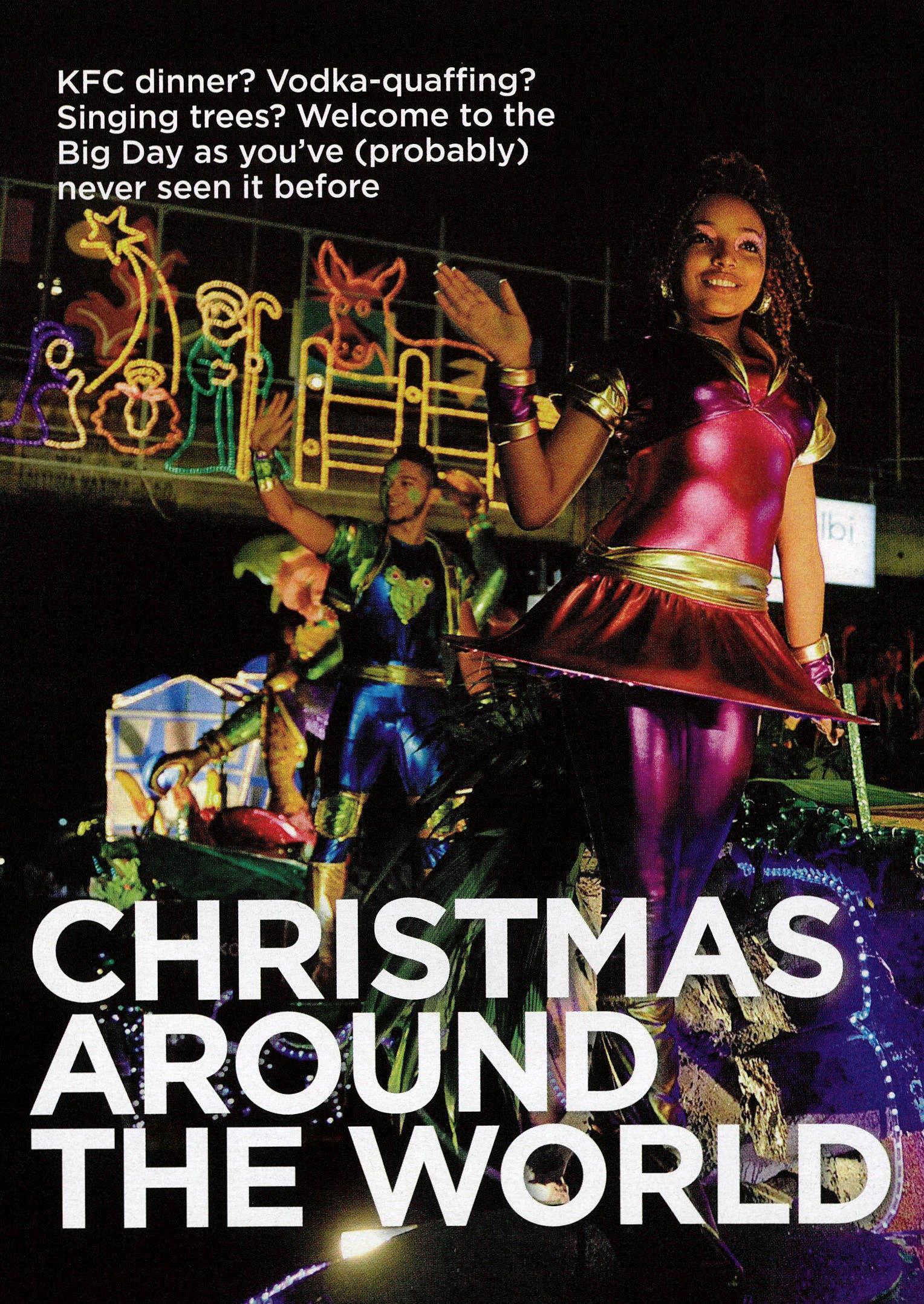
KFC dinner? Vodka-quaffing?
Singing trees? Welcome to the Big Day as you've (probably) never seen it before
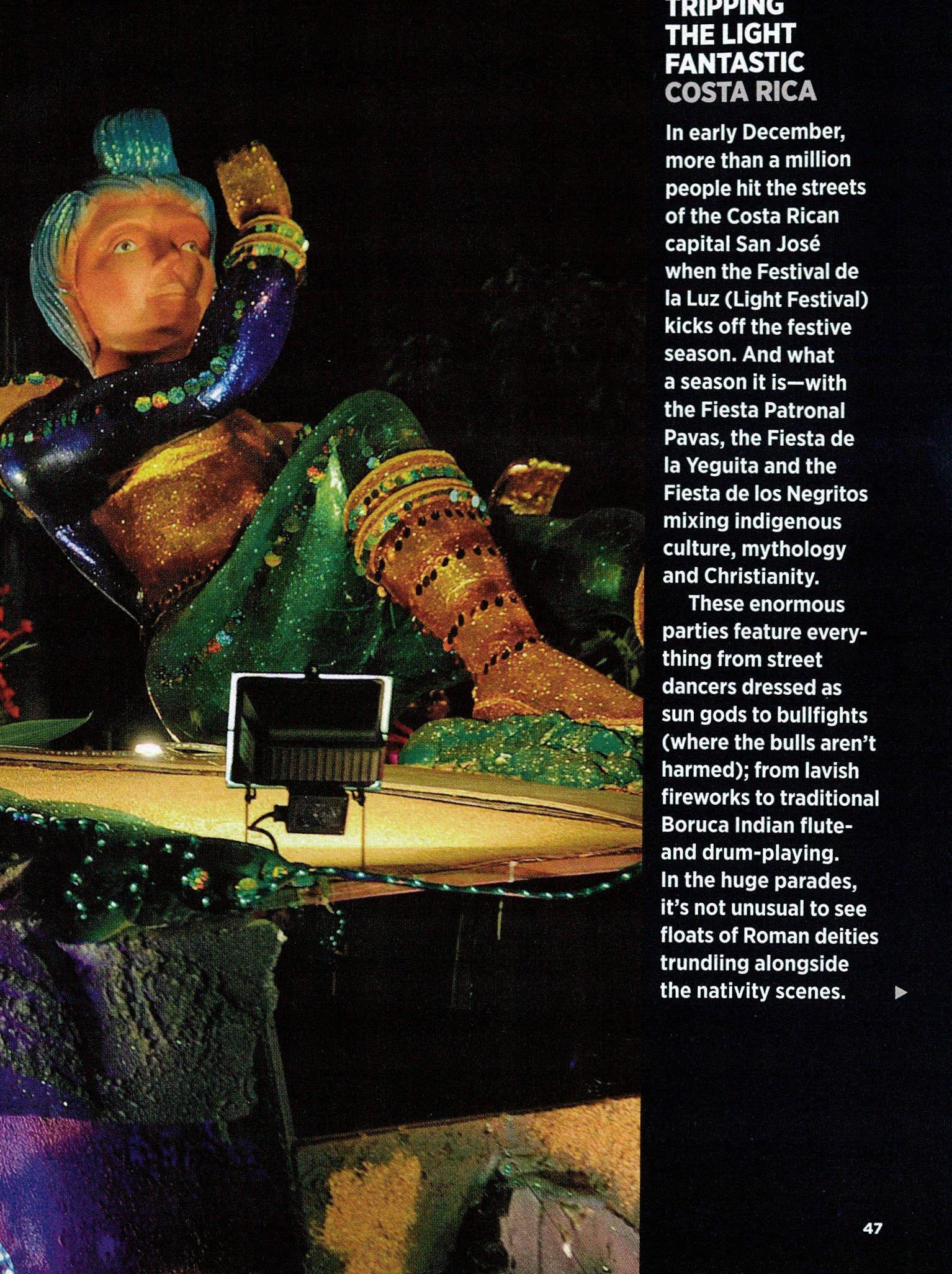
In early December, more than a million people hit the streets of the Costa Rican capital San Jose when the Festival de la Luz (Light Festival) kicks off the festive season. And what a season it is—with the Fiesta Patronal Pavas, the Fiesta de la Yeguita and the Fiesta de los Negritos mixing indigenous culture, mythology and Christianity. These enormous parties feature everything from street dancers dressed as sun gods to bullfights (where the bulls aren't harmed); from lavish fireworks to traditional Boruca Indian fluteand drum-playing.
In the huge parades, it's not unusual to see floats of Roman deities trundling alongside the nativity scenes.
MARTIN GEISSLER, Europe correspondent,ITVNews; Belgium Christmas here is about friends and family— more Christian than commercial. That's not to say the Belgians don't get to spoil their children, but the gifts are given three weeks beforehand, on the birthday of St Nicholas. And there are two Santas. One, Sint Niklass, visits children twice in Flemishspeaking households: on December 4, to find out who deserves presents; then again two nights later, when the good ones are rewarded. Those who haven't behaved just find a pile of sticks in their shoes! Belgium's French-speaking youngsters are visited by Pere Noel, who leaves presents for the good, while lumps of coal are given to those who've failed to impress. But while some children do now wake up to find a few gifts under the tree, this country has done better than many when it comes to maintaining the true spirit of Christmas.
Every Christmas Day, at Washington Crossing on the banks of the Delaware, 100 re-enactors and thousands of spectators gather to celebrate the birth of America as well as the birth of Christ.
The annual recreation of George Washington's journey across the river —after which he entered New Jersey and attacked the Hessians (German soldiers employed by the British)—commemorates a big turning point in the War of Independence.
On the big day, "Washington" delivers
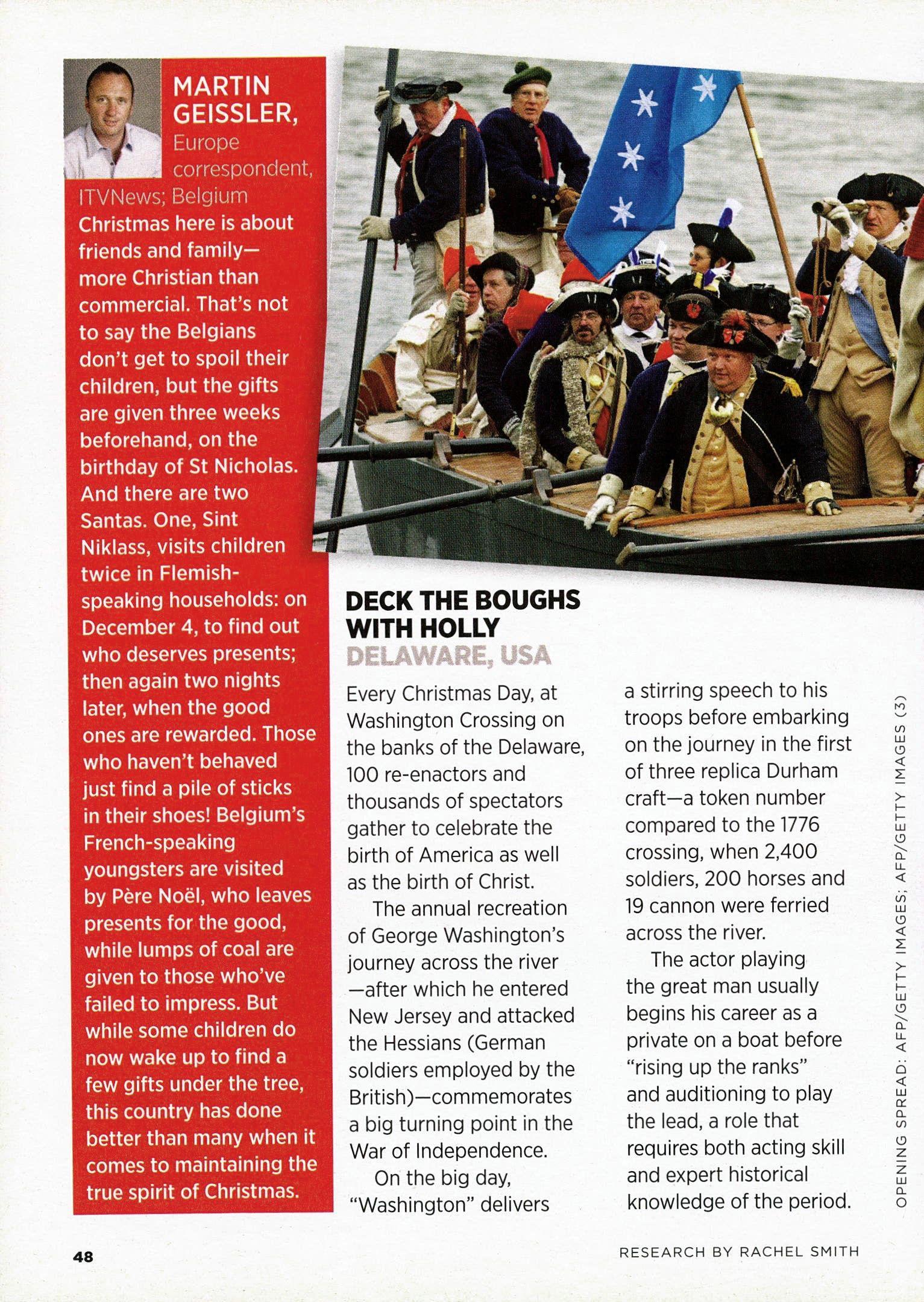
a stirring speech to his troops before embarking on the journey in the first of three replica Durham craft—a token number compared to the 1776 crossing, when 2,400 soldiers, 200 horses and 19 cannon were ferried across the river.
The actor playing the great man usually begins his career as a private on a boat before "rising up the ranks" and auditioning to play the lead, a role that requires both acting skill and expert historical knowledge of the period.

People could actually walk inside the sixstorey tree that popped up in front of this large retail venue last year. It was decorated with one million lightemitting diodes and baubles on the outside, and glitter balls on the inside.

Forget chocolate Santas and plastic reindeer—this 35-foot tree is adorned with 150 real-life singers, who form the centrepiece of a huge annual Christmas concert. Perched on the various branches (which, mercifully, are solid platforms rather than flimsy twigs), the singers belt out the likes of "It's the Most Wonderful Time of the Year", "Winter Wonderland" and the cleverly named grand finale: "Santa Claus is Coming to EdmunTown".
While Christmas is celebrated by millions of Chinese Christians, New Year is the big event for most. Families come together, their journeys home the largest human migration on the planet. Fireworks are let off almost constantly, and houses are decorated with lanterns and the Chinese flag. Food is an important part of the celebration —traditional dumplings are prepared
in advance so the whole family can sit down and eat (no one's left slaving over a wok trying to feed countless relatives).
Staying up on New Year's Eve, fortified by drink, is known as ao nian (after the monster Nian, who'd come hunting).
And on the first day of the lunar month of January, people go door to door to greet neighbours. The eldest of the family hand out envelopes of money called ya sui plan—lucky money"—to the youngest. So: presents, food, family. Even though more than a billion people here don't celebrate Christmas, it feels familiar.
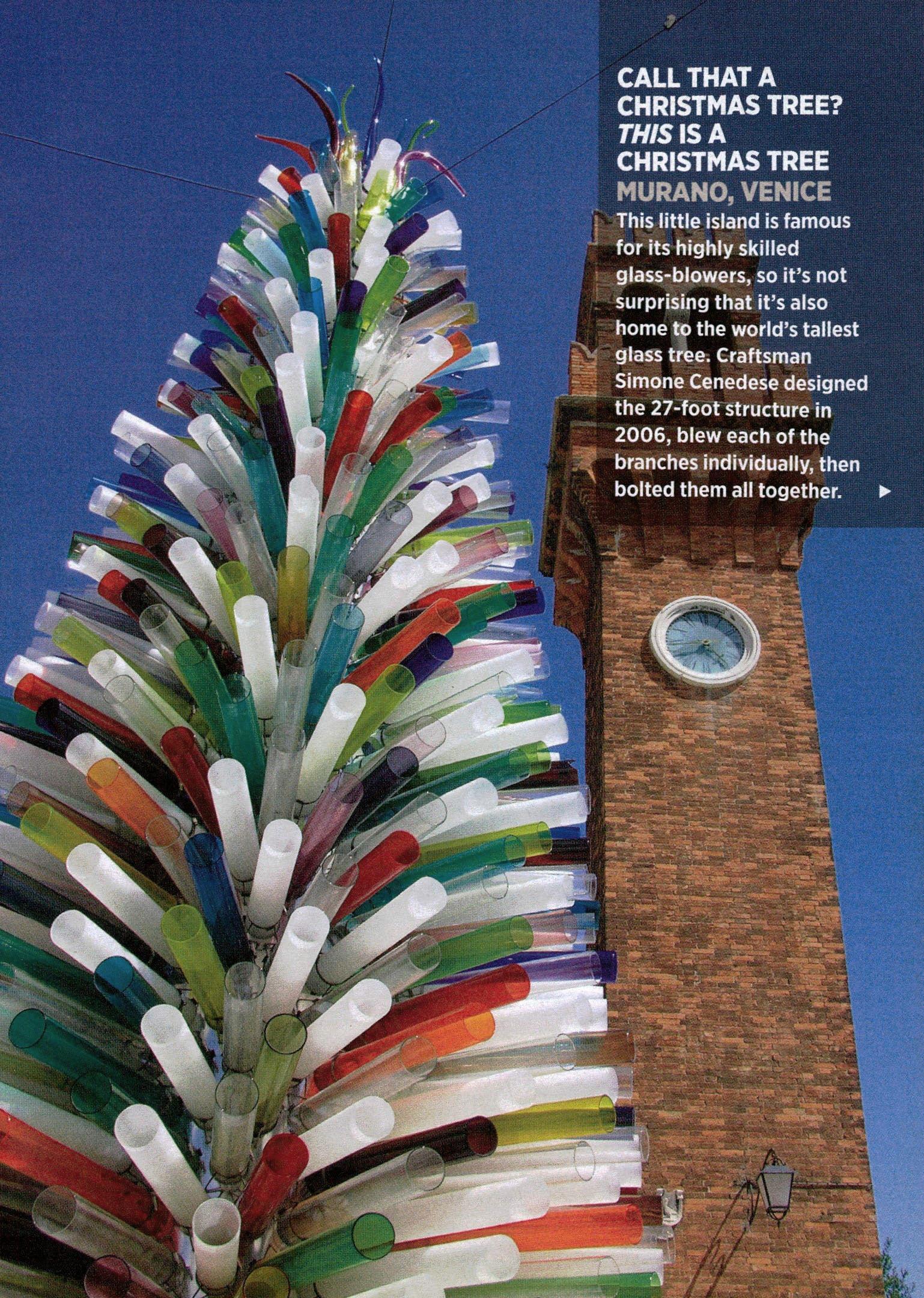
CALL THAT A CHRISTMAS TREE? THIS IS A CHRISTMAS
This little island is famous for its highly skilled glass-blowers, so it's not surprising that it's also home to the world's tallest glass tree. Craftsman Simone Cenedese designed the 27-foot structure in 2006, blew each of the branches individually, then bolted them all together. ►
For a little-known South American sect, the Messiah's birth didn't happen more than 2,000 years ago—it was in 1959.
The approximately 150,000 members of the Maradonian Church of the Hand of God worship Diego Maradona, the Argentine 1986 World Cup
winner, widely regarded as one of the best footballers of all time.
Christmas for the group takes place on October 30 —the birthday of the man they call "D1OS" (a fusion of his shirt number and the Spanish word for God).
Customs include singing Diego-themed carols,
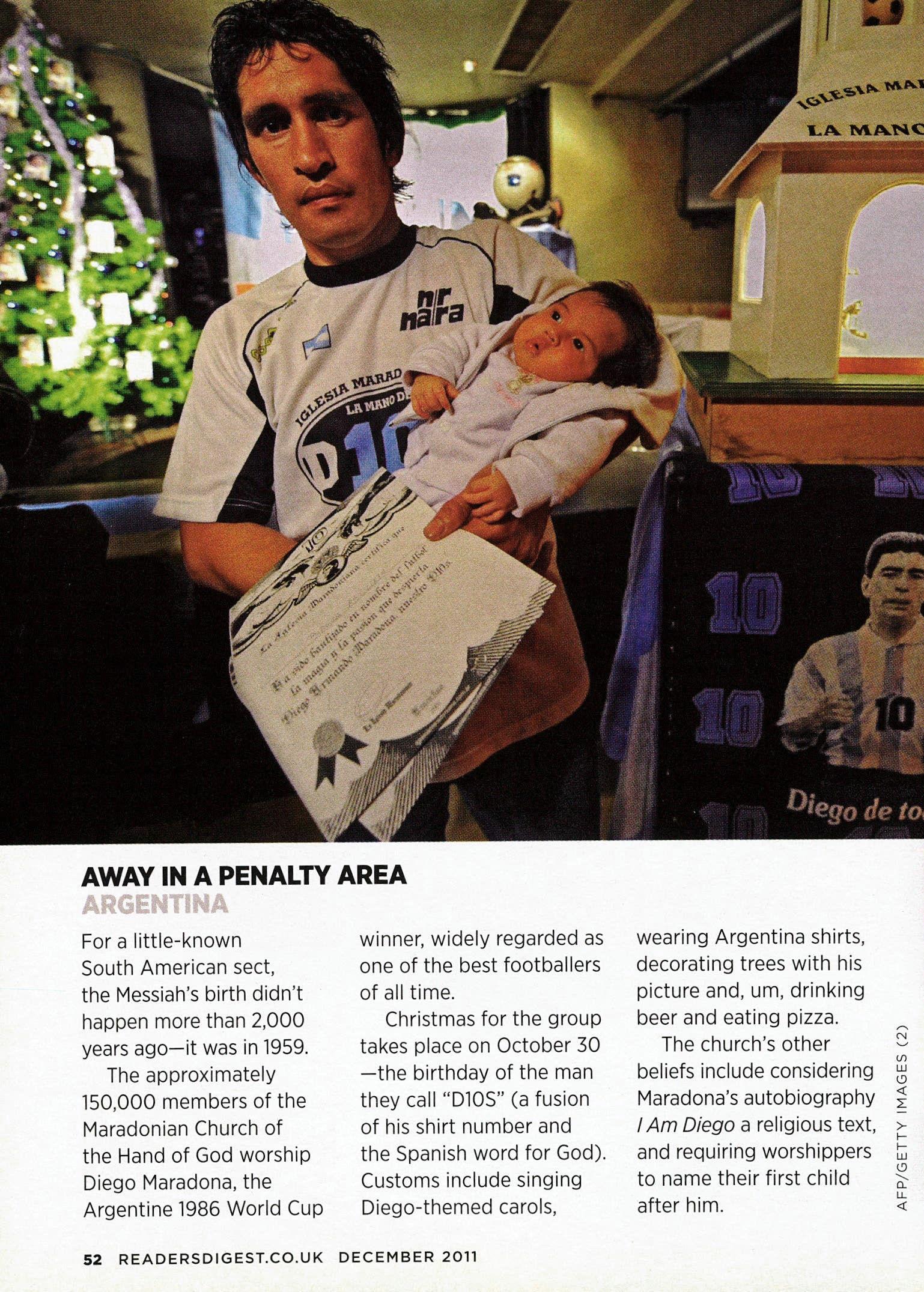
wearing Argentina shirts, decorating trees with his picture and, urn, drinking beer and eating pizza.
The church's other beliefs include considering Maradona's autobiography I Am Diego a religious text, and requiring worshippers to name their first child after him.
December 25 isn't a national holiday for the largely Buddhist or atheist Japanese, but it's become a finger-lickin' cause for celebration thanks to the annual Kentucky Fried Chicken "Christmas party barrel" lunch.
The tradition started in 1974, when KFC executives decided it would be a good idea to give the Japanese a rough sample of what the festive season in America is like—with a Christmas chicken and wine deal for £6.50. A lack of turkeys in Japan meant that a truly traditional meal was out, but this deep-friedpoultry alternative was deemed satisfactory.
The meal has since become so popular that customers make reservations as early as October. KFC's sales between December 23-25 equal half its normal monthly income.
correspondent, pro Channel 4

ADespite being a predominantly Buddhist nation, increasingly Thais are getting into the Christmas swing. Carols are piped mercilessly into stores, malls unveil giant Christmas trees, and inflatable Santas and neon "snowdrops" add unlikely additional colour to Bangkok's streets.
But, for many, the 25th is just the opening salvo in the celebration season. January 1 is a public holiday where Thais exchange gifts and do some serious partying, before the Grandaddy of them all: the traditional Thai New Year of Songkran in April.
No white Christmas here, but Thais will still reach for their pullovers as it's the start of a brief cool period—a chilly 25°C! My family will celebrate with a fine plastic tree from Tesco-Lotus, a roast followed by mangoes, then a dip in the community pool to round it all off! •
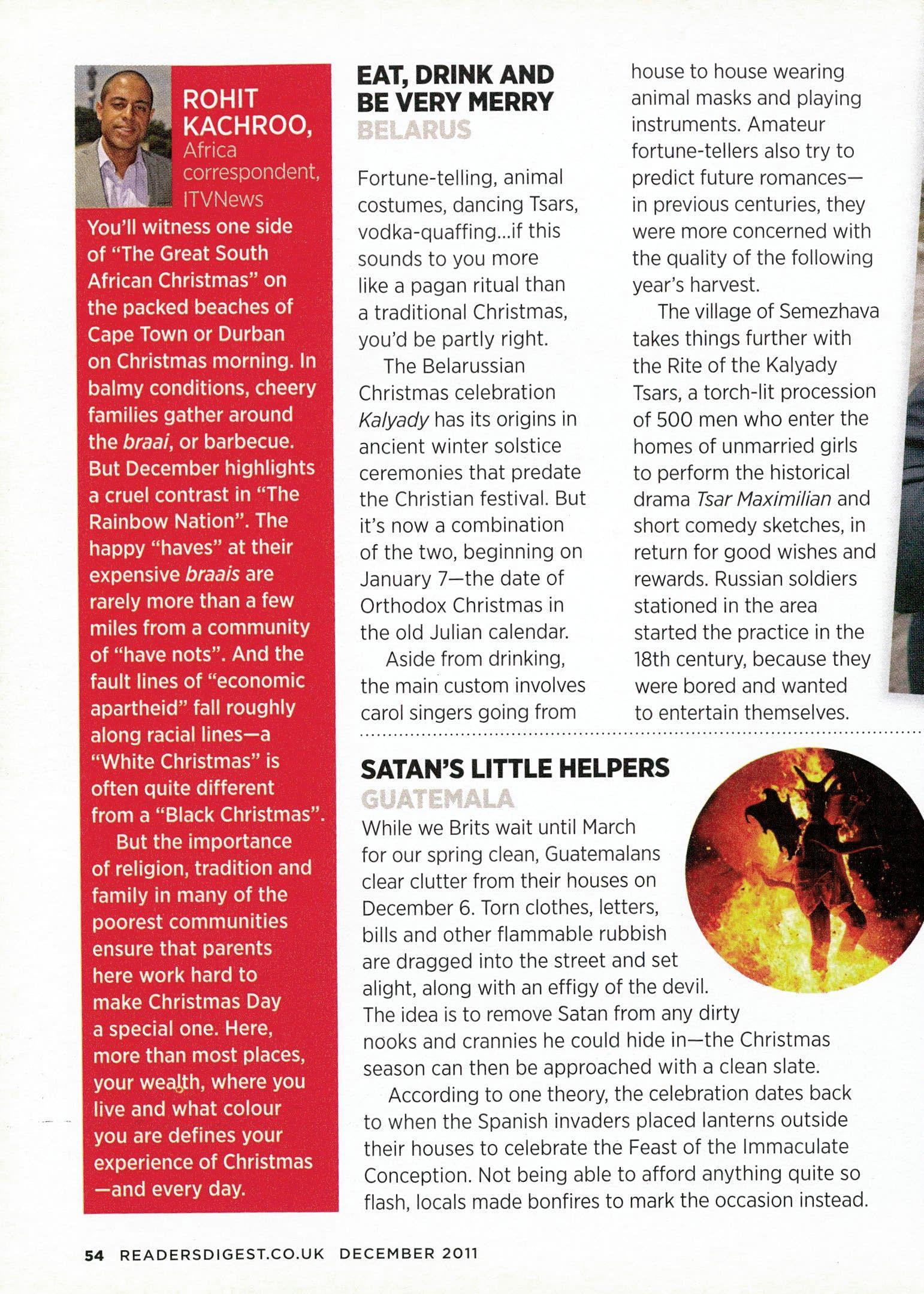 ROHIT KACHROO, correspondent. ITVNews
ROHIT KACHROO, correspondent. ITVNews
You'll witness one side of "The Great South African Christmas" on the packed beaches of Cape Town or Durban on Christmas morning. In balmy conditions, cheery families gather around the braai, or barbecue. But December highlights a cruel contrast in The Rainbow Nation". The happy "haves" at their expensive braais are rarely more than a few miles from a community of have nots". And the fault lines of "economic apartheid" fall roughly along racial lines—a "White Christmas" is often quite different from a "Black Christmas".
But the importance of religion, tradition and family in many of the poorest communities ensure that parents here work hard to make Christmas Day a special one. Here, more than most places, your wealth, where you live and what colour you are defines your experience of Christmas —and every day.
house to house wearing BE VERY MERRY animal masks and playing instruments. Amateur fortune-tellers also try to Fortune-telling, animal predict future romances— costumes, dancing Tsars, in previous centuries, they vodka-quaffing...if this were more concerned with sounds to you more the quality of the following like a pagan ritual than year's harvest. a traditional Christmas, The village of Semezhava you'd be partly right. takes things further with The Belarussian the Rite of the Kalyady Christmas celebration Tsars, a torch-lit procession Kalyady has its origins in of 500 men who enter the ancient winter solstice homes of unmarried girls ceremonies that predate to perform the historical the Christian festival. But drama Tsar Maximilian and it's now a combination short comedy sketches, in of the two, beginning on return for good wishes and January 7—the date of rewards. Russian soldiers Orthodox Christmas in stationed in the area the old Julian calendar. started the practice in the Aside from drinking, 18th century, because they the main custom involves were bored and wanted carol singers going from to entertain themselves.
While we Brits wait until March for our spring clean, Guatemalans clear clutter from their houses on December 6. Torn clothes, letters, bills and other flammable rubbish are dragged into the street and set alight, along with an effigy of the devil. The idea is to remove Satan from any dirty nooks and crannies he could hide in—the Christmas season can then be approached with a clean slate. According to one theory, the celebration dates back to when the Spanish invaders placed lanterns outside their houses to celebrate the Feast of the Immaculate Conception. Not being able to afford anything quite so flash, locals made bonfires to mark the occasion instead.

In many countries, the festive season is a whirlwind of presents, partying and crackers. But for the Finns it's a time of quiet reflection.
On Christmas Eve, while most Westerners are cosying up in front of the television, the Finns trek to snowy churchyards to place candles on the graves of departed loved ones. The custom stems from the Middle Ages, when a 20-day period of peace—with no fighting or troublemaking allowed—was declared each December 24 from the old capital Turku. ■

Catch of the day: trying out the new net-gun for stopping small boats
From
lightweight batons to bomb-sniffing bees—deep in the Chilterns a group of scientists is working to keep Britain safe
 BY BENJI WILSON RAPHED BY BARRY MARSDEN
BY BENJI WILSON RAPHED BY BARRY MARSDEN
Mro clarify: the Centre for Applied Science and Technology (CAST) isn't quite the real-life Q lab from James Bond.
I arrive at the Home Office organisation— whose job is to develop and test technology for the security services—hoping to find Desmond Llewelyn firing rockets out of Aston Martins and men in radiation suits testing outlandish gadgets for our boys in the field. What I find is a series of low-slung buildings nestled in the Chilterns off a country lane, not far from a saddlery.
Yes, the security is encouraging: two ring-fences of razor wire, car-boot checks,
strict identity control, and those huge dentists' mirrors to look for undercarriage bombs. But when I ask some of the assembled scientists where the jet packs are, they laugh.
In fact, the vast majority of CAST's work is for the police and prison service, not for debonair spies. It's thanks to this series of labs and warehouses—and the 200 or so scientists and engineers inside—that our front-line coppers are no longer just armed with wooden batons and dustbin-lid-style riot shields. (These days, it's black high-impact nylon rod batons and lightweight, 4mm-thick transparent polycarbonate shields.)
"We now have a capability to say, as commanders, 'Stand where you are, take

"What do you mean it doesn't look like much?"
A CAST worker with the latest in ground-penetrating radar technology
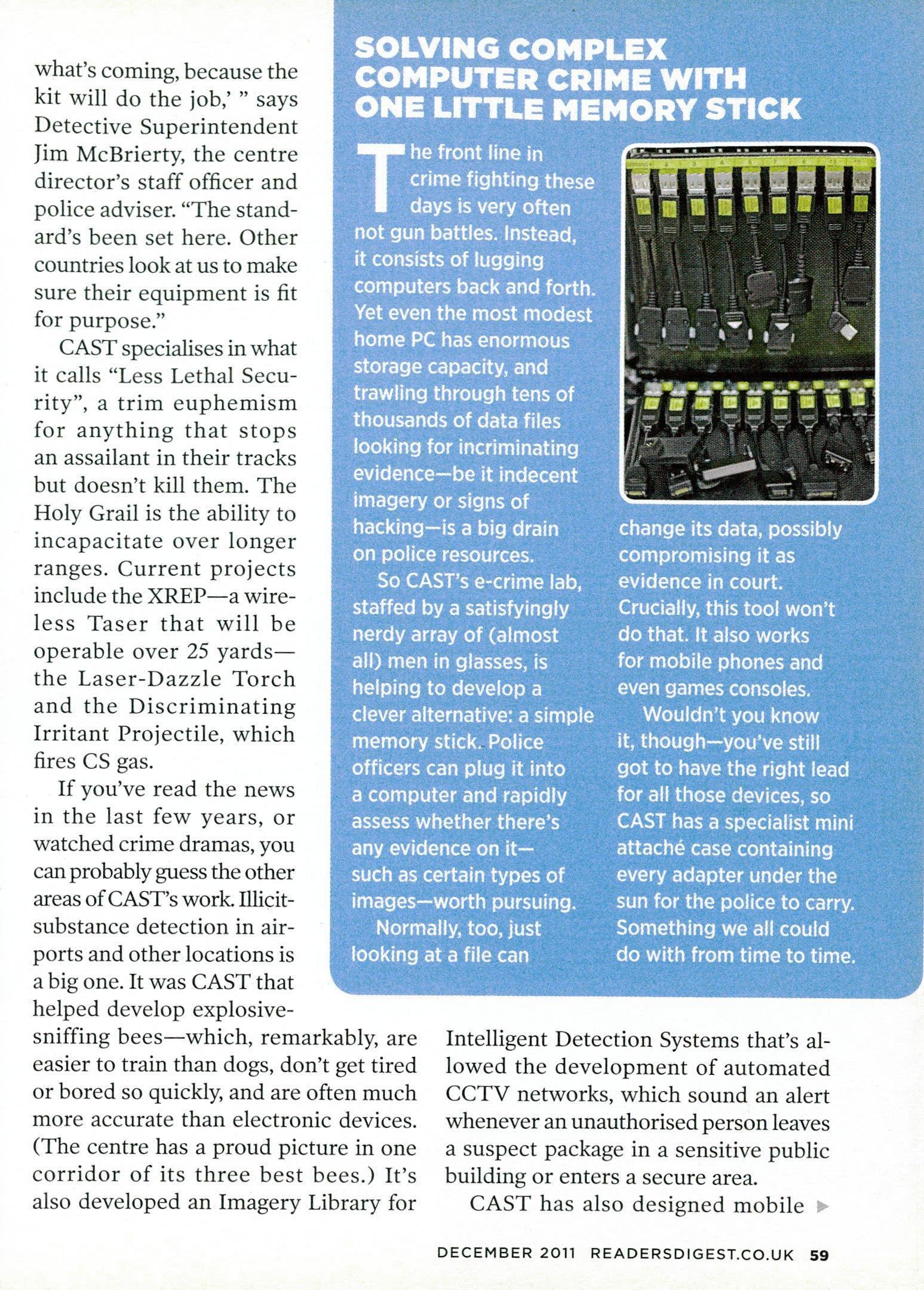
what's coming, because the kit will do the job,' " says Detective Superintendent Jim McBrierty, the centre director's staff officer and police adviser. "The standard's been set here. Other countries look at us to make sure their equipment is fit for purpose."
CAST specialises in what it calls "Less Lethal Security", a trim euphemism for anything that stops an assailant in their tracks but doesn't kill them. The Holy Grail is the ability to incapacitate over longer ranges. Current projects include the XREP—a wireless Taser that will be operable over 25 yards— the Laser-Dazzle Torch and the Discriminating Irritant Projectile, which fires CS gas.
The front line in crime fighting these days is very often not gun battles. Instead, it consists of lugging computers back and forth. Yet even the most modest home PC has enormous storage capacity, and trawling through tens of thousands of data files looking for incriminating evidence—be it indecent imagery or signs of hacking—is a big drain on police resources.
So CAST's e-crime lab, staffed by a satisfyingly nerdy array of (almost all) men in glasses, is helping to develop a clever alternative: a simple memory stick. Police officers can plug it into a computer and rapidly assess whether there's any evidence on it— such as certain types of images—worth pursuing. Normally, too, just looking at a file can
If you've read the news in the last few years, or watched crime dramas, you can probably guess the other areas of CAST's work Illicitsubstance detection in airports and other locations is a big one. It was CAST that helped develop explosivesniffing bees—which, remarkably, are easier to train than dogs, don't get tired or bored so quickly, and are often much more accurate than electronic devices. (The centre has a proud picture in one corridor of its three best bees.) It's also developed an Imagery Library for
leassiurit change its data, possibly compromising it as evidence in court. Crucially, this tool won't do that. It also works for mobile phones and even games consoles. Wouldn't you know it, though—you've still got to have the right lead for all those devices, so CAST has a specialist mini attaché case containing every adapter under the sun for the police to carry. Something we all could do with from time to time.
Intelligent Detection Systems that's allowed the development of automated CCTV networks, which sound an alert whenever an unauthorised person leaves a suspect package in a sensitive public building or enters a secure area.
CAST has also designed mobile 0.
. versions of ground-penetrating radar machines—originally developed by the oil industry—that can detect buried objects and were instrumental in discovering bodies buried in the garden of the Scottish serial killer Peter Tobin. And IRIS, its fingerprint-imaging system, uses special lighting to reveal prints that can't be seen with the naked eye, such as on certain types of plastics and even on the inside of a burglar's discarded gloves.
Aside from detective work, it was CAST that helped test the bomb barriers outside Parliament designed to keep people out, and the fences outside prisons designed to keep people in. It has a site in Langhurst, West Sussex, where it conducts attack trials—cars are driven at full pelt into walls. ("I've seen it," says one of the team. "The front axle becomes the back axle.")
No escape: fingerprints like this would once have gone undetected

When there's a major national event, such as the Papal visit or a party conference, CAST loans expensive surveillance equipment—such as scanners and explosive-testing equipment—and sends its people out to train the police operators. Needless to say, it'll be closely involved with the security operation at the Olympics.
Yet, though CAST has a website, and its staff are happy to welcome me on campus and show me some mindboggling pet projects, there's something decidedly covert about the place.
During the Second World War, the site was a radio listening post, complete with Enigma machines for cracking German codes. Its central building has double-thickness walls, enough to take a direct hit from a doodlebug. This was always a location for keeping secrets, and it still retains a hush-hush air. We're asked not to print names, and we're accompanied to a limited number of areas to see particular projects. Some of what we see is dazzling, yet staff admit there's more gadgetry and surveillance equipment that they're not able to show us for "classified" reasons.
The problem with showing off their technology, says my guide, is not simply that they want to protect their secrets. "What we can do is one of the things we want to protect. But it's nowhere near as important as what we can't do. You want to maintain an assumption that we can do everything—because as soon as what we can't do is public, everyone knows what they might get away with."
Even more intriguingly for those
In 2004, the Met asked CAST to find a way of stopping small fast vessels on the Thames. This was partly in response to the 2000 Millennium Dome diamond heist, where the thieves had planned their getaway on a speedboat. But there was also a need to protect critical infrastructure —public buildings, power plants, naturalgas terminals—against waterborne threats.
So CAST helped design a shoulder/hand-held system that propels a net across the water to stop small boats.
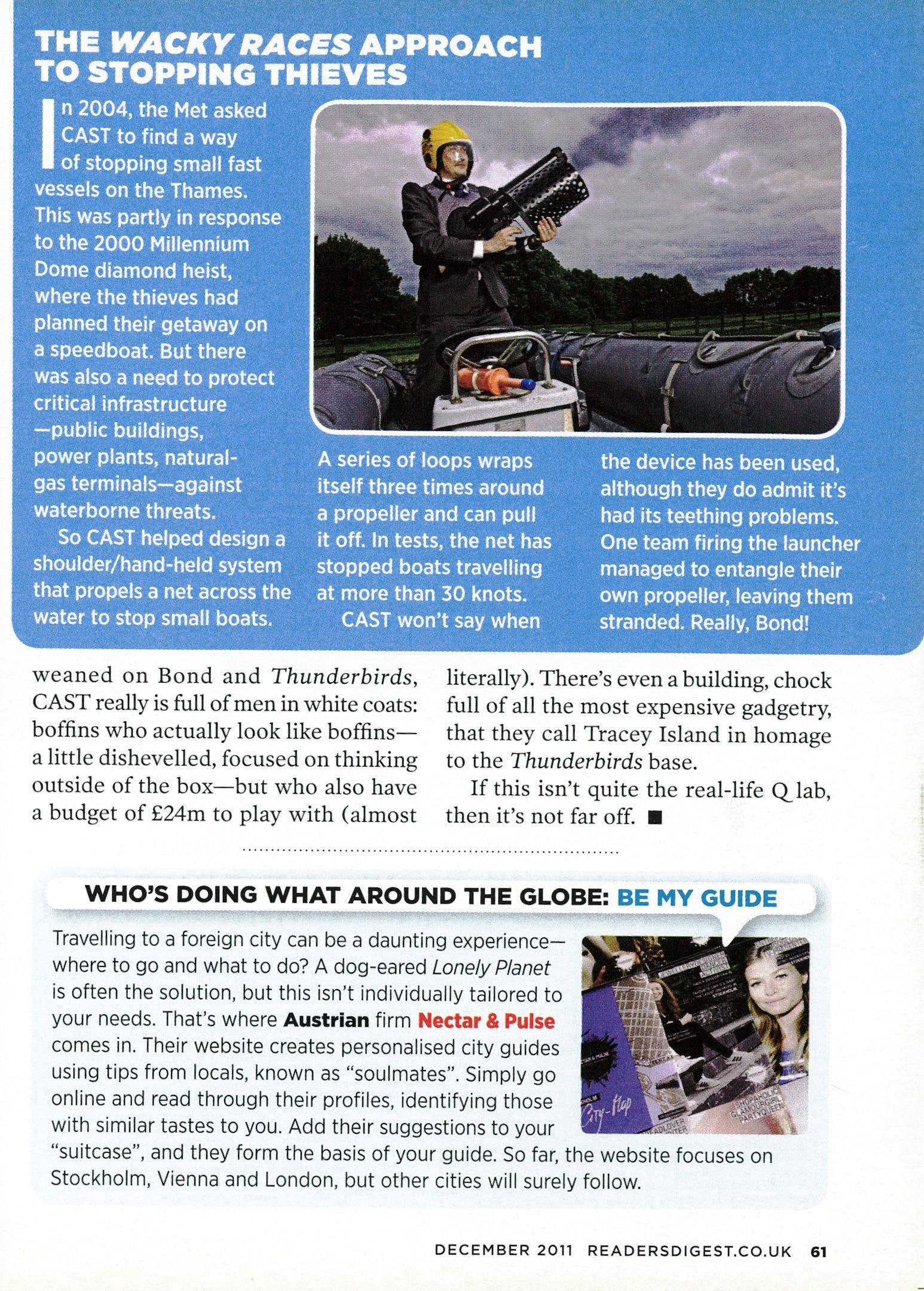
A series of loops wraps itself three times around a propeller and can pull it off. In tests, the net has stopped boats travelling at more than 30 knots.
CAST won't say when the device has been used, although they do admit it's had its teething problems. One team firing the launcher managed to entangle their own propeller, leaving them stranded. Really, Bond!
weaned on Bond and Thunderbirds, CAST really is full of men in white coats: boffins who actually look like boffins— a little dishevelled, focused on thinking outside of the box—but who also have a budget of £24m to play with (almost
literally). There's even a building, chock full of all the most expensive gadgetry, that they call Tracey Island in homage to the Thunderbirds base.
If this isn't quite the real-life Qlab, then it's not far off. ■
Travelling to a foreign city can be a daunting experience— where to go and what to do? A dog-eared Lonely Planet is often the solution, but this isn't individually tailored to your needs. That's where Austrian firm Nectar & Pulse comes in. Their website creates personalised city guides using tips from locals, known as "soulmates". Simply go online and read through their profiles, identifying those with similar tastes to you. Add their suggestions to your "suitcase", and they form the basis of your guide. So far, the website focuses on Stockholm, Vienna and London, but other cities will surely follow.
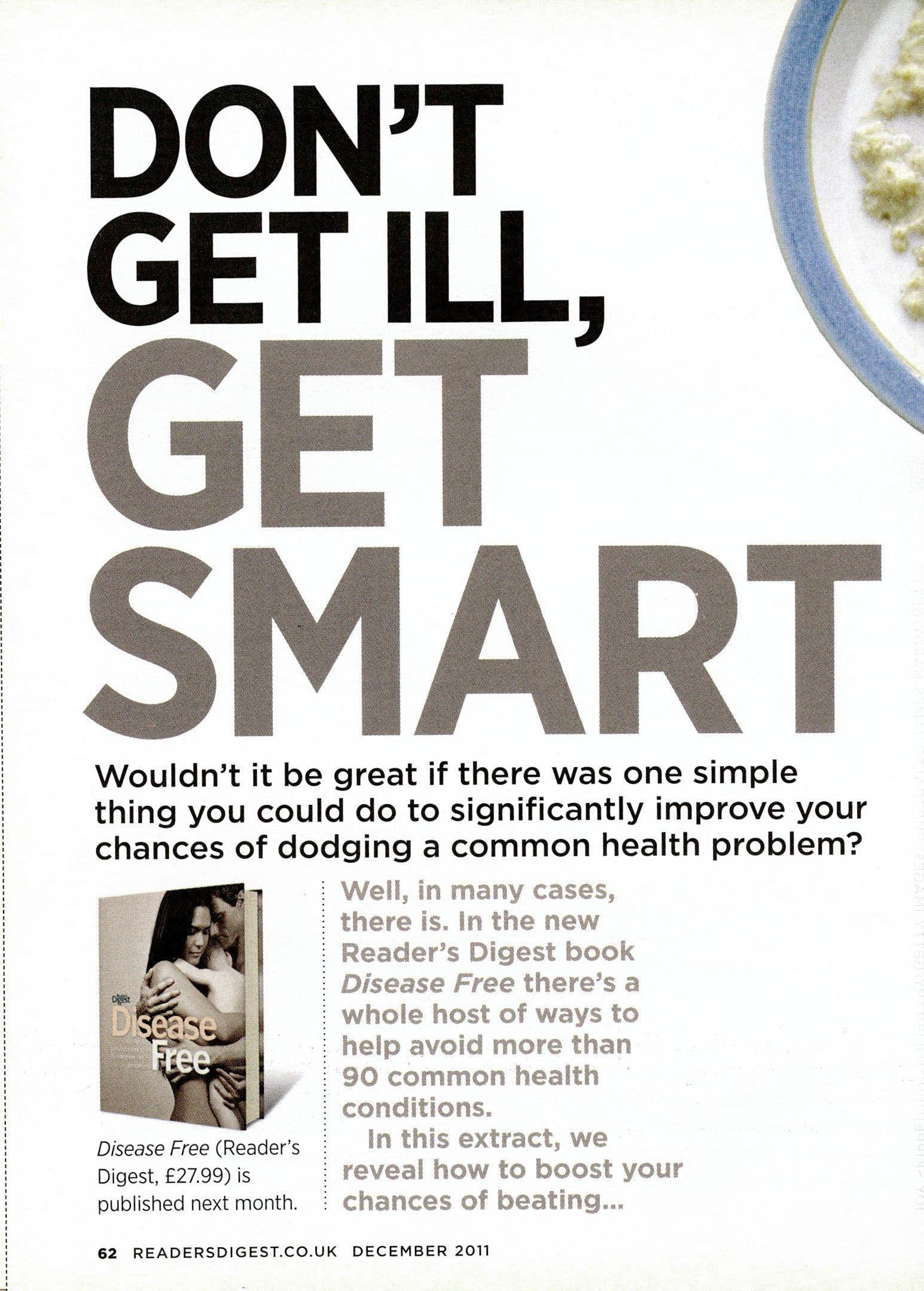
Wouldn't it be great if there was one simple thing you could do to significantly improve your chances of dodging a common health problem?
Well, in many cases, there is. In the new Reader's Digest book Disease Free there's a whole host of ways to help avoid more than 90 common health conditions.
Disease Free (Reader's Digest, £27.99) is published next month.
In this extract, we reveal how to boost your chances of beating...
Have porridge for breakfast. Oats contain more soluble fibre than any other grain, and just two servings of porridge a day can lower your cholesterol by up to three per cent. Increase the benefit by adding grated apple—also rich in soluble fibre.
Clean your nose out daily. Just as a rain shower removes pollen from the air, a saline rinse washes allergens from your nasal passages. In a University of Michigan study of 127 adults with stuffed-up noses, 60 per cent of those who rinsed their nasal passages thoroughly experienced eased congestion, sneezing and itching—compared with 40 per cent of those who just sprayed with an antihistamine.
Give ginger a go. Research shows that this warming spice contains potent compounds that are similar to those in non-steroidal anti-inflammatory migraine drugs. Although this hasn't been rigorously tested, it may also be that ginger relieves the nausea that often comes with this kind of severe headache.

Play a wind instrument. When 25 snorers at a Swiss sleep clinic started playing the didgeridoo, snoring was reduced by about 22 per cent, due to the training of the upper airways by the breathing technique required. If you don't have access to a didgeridoo, try playing a clarinet, flute or tuba instead.
Turn over in bed. In one study, people who slept on their left side had half as much reflux as right-side sleepers. The location of your stomach and oesophagus means that lying on your right puts increased pressure on the lower oesophageal sphincter.
Say yes to soya. People with gout may benefit from limiting animal proteins in their diet and substituting them for foods derived from soya beans. Several studies show that soya reduces uric acid, the build up of which causes the condition. Try to have soya products, such as tofu or soya milk, at least twice a week.
51%
Amount by which you could reduce your risk of hearing loss if you stop smoking

Spit out that dummy. Though it can be very useful at times, letting your child suck on a pacifier can increase their chance of an infection travelling from the mouth into the Eustachian tube, the passage connecting the middle ear with the back of the throat.
Measure your legs. Or, better still, ask your GP to do it. It's surprisingly common to have limbs of unequal length and this can contribute to knee and hip pain, say researchers from Chapel Hill School of Medicine, North Carolina. Having one leg as little as 8mm shorter than the other can increase the risk of knee pain by 50 per cent. Combat this with shoe inserts, which your doctor can supply.
Walk two miles a day. At a brisk pace, this should take you no more than half an hour, but it will cut your risk of the condition by 50 per cent, according to a Canadian study of some 10,000 people. Exercise probably has numerous benefits, including increased blood flow to the brain and increased production of a chemical called brain-derived neurotrophic factor (BDNF)—which encourages nerve cells in the brain to multiply and create more connections with each other.
Snack on almonds. They're packed with magnesium, which studies have found can help prevent ear damage and help cells make better use of the energy you need to repair it. Oat bran, pumpkin seeds, barley and spinach are good sources.

33%
Amount by which you could reduce your risk of stomach cancer by eating an orange three or more times a week
Take brewer's yeast. The supplement is an excellent source of biotin (also called inositol or vitamin B7), which plays an important role in how cells communicate with one another, and helps reduce the frequency and severity of attacks. Try sprinkling a tablespoon of yeast over cereal or yogurt.
Change your position. Modern toilets work against you when it comes to haemorrhoids, since they require you to sit instead of squat. Squatting makes bowel movements easier and it prevents excessive straining. Try propping up your feet on a small footstool and pulling your knees up towards your chest. #-
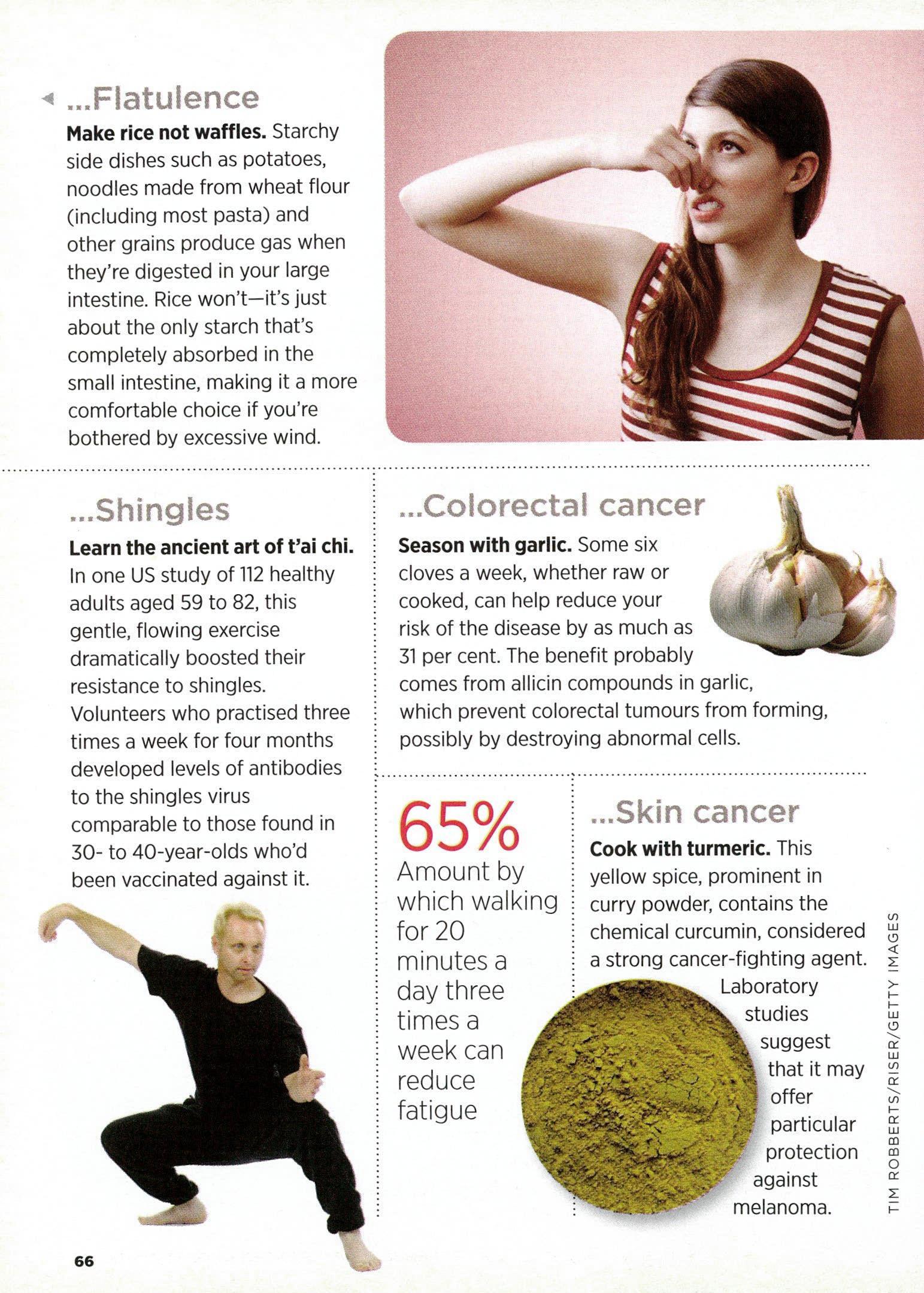
Make rice not waffles. Starchy side dishes such as potatoes, noodles made from wheat flour (including most pasta) and other grains produce gas when they're digested in your large intestine. Rice won't—it's just about the only starch that's completely absorbed in the small intestine, making it a more comfortable choice if you're bothered by excessive wind.
Learn the ancient art of t'ai chi.
In one US study of 112 healthy adults aged 59 to 82, this gentle, flowing exercise dramatically boosted their resistance to shingles.
Volunteers who practised three times a week for four months developed levels of antibodies to the shingles virus comparable to those found in 30- to 40-year-olds who'd been vaccinated against it.
Season with garlic. Some six cloves a week, whether raw or cooked, can help reduce your risk of the disease by as much as 31 per cent. The benefit probably comes from allicin compounds in garlic, which prevent colorectal tumours from forming, possibly by destroying abnormal cells.
Amount by which walking for 20 minutes a day three times a week can reduce fatigue
Cook with turmeric. This yellow spice, prominent in curry powder, contains the chemical curcumin, considered a strong cancer-fighting agent. Laboratory studies suggest that it may offer particular protection against melanoma.
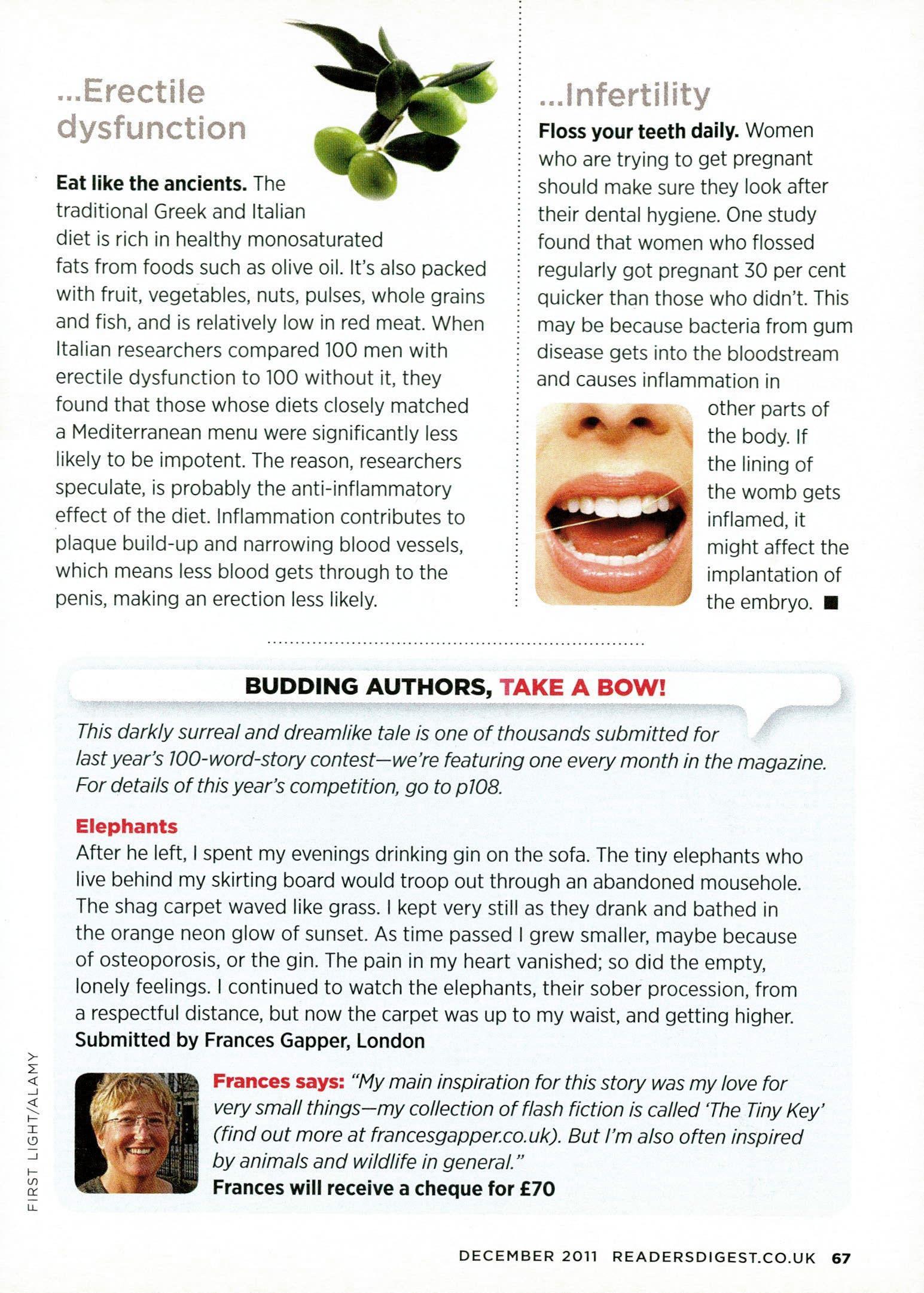
Eat like the ancients. The traditional Greek and Italian diet is rich in healthy monosaturated fats from foods such as olive oil. It's also packed with fruit, vegetables, nuts, pulses, whole grains and fish, and is relatively low in red meat. When Italian researchers compared 100 men with erectile dysfunction to 100 without it, they found that those whose diets closely matched a Mediterranean menu were significantly less likely to be impotent. The reason, researchers speculate, is probably the anti-inflammatory effect of the diet. Inflammation contributes to plaque build-up and narrowing blood vessels, which means less blood gets through to the penis, making an erection less likely.
Floss your teeth daily. Women who are trying to get pregnant should make sure they look after their dental hygiene. One study found that women who flossed regularly got pregnant 30 per cent quicker than those who didn't. This may be because bacteria from gum disease gets into the bloodstream and causes inflammation in other parts of the body. If the lining of the womb gets inflamed, it might affect the implantation of the embryo. ■
This darkly surreal and dreamlike tale is one of thousands submitted for last year's 100-word-story contest—we're featuring one every month in the magazine. For details of this year's competition, go to p108.
Elephants
After he left, I spent my evenings drinking gin on the sofa. The tiny elephants who live behind my skirting board would troop out through an abandoned mousehole. The shag carpet waved like grass. I kept very still as they drank and bathed in the orange neon glow of sunset. As time passed I grew smaller, maybe because of osteoporosis, or the gin. The pain in my heart vanished; so did the empty, lonely feelings. I continued to watch the elephants, their sober procession, from a respectful distance, but now the carpet was up to my waist, and getting higher.
Submitted by Frances Gapper, London
Frances says: "My main inspiration for this story was my love for very small things—my collection of flash fiction is called 'The Tiny Key' (find out more at francesgapperco.uk). But I'm also often inspired by animals and wildlife in general."
Frances will receive a cheque for £70

Ever wondered what might change your life forever?
For Katherine Connor, it was a three-month-old elephant WORDS AND PICTURES BY
CRAIG STENNETT
41 It's 7pm on a Wednesday evening and Katherine Connor has just walked into the buzzing weekly night market in Uttarardit, a provincial town on the banks of the Nan River in north Thailand. The 30-year-old Londoner, holding her 18-month-old son Noah in her arms—and with her three-year-old daughter Hope close by—is exchanging concerned looks with her Thai husband Anon.
As the sun sets, a constant stream of traffic passes nearby. The noise and fumes intensify as Katherine and her family are greeted by the sight of two baby Asian elephants being used as street beggars for their owners. The elephants hold on the tip of their trunks small sugar-cane bags costing the buyer 50p. Any purchaser will then be offered the delights of feeding the nutrient-free cane back to the animals.
"That one is a year old, the other looks like three. They're both dehydrated. Look, scars around the neck, and fresh stab wounds, too!" Katherine says in fluent Thai to Anon. Both these young elephants should still be in their mothers' care.
In 2002, Katherine left her successful retail-management job with Gap, sold her house in London, and embarked on what she thought would be an adventure of a lifetime—travelling around the world for a year. "I loved my life, living in London and working in the West End, but I knew there must be something more," Katherine remembers. With visits to Hong Kong, Singapore and Malaysia under her belt, she arrived in Thailand, and six weeks later found herself volunteering at an elephant centre. She'd never even seen an elephant in real life before, but it was an experience that was to change her life. She met and fell in love with a three-month-old baby elephant called Boon Lott (meaning "survivor" in Thai).
"I'd never felt such an incredible draw to another being as I did when I first saw Boon Lott," Katherine recalls. The little elephant was at the centre with its mother because he'd been born prematurely. The owner wanted to abandon him and return the mother to the profitable business of illegal logging, but
"I had never felt such a draw to another being"

close bond: Katherine nursed Boon Lott through his injuries, even sleeping alongside him and designing a wheelchair so the baby elephant could continue to suckle his mother
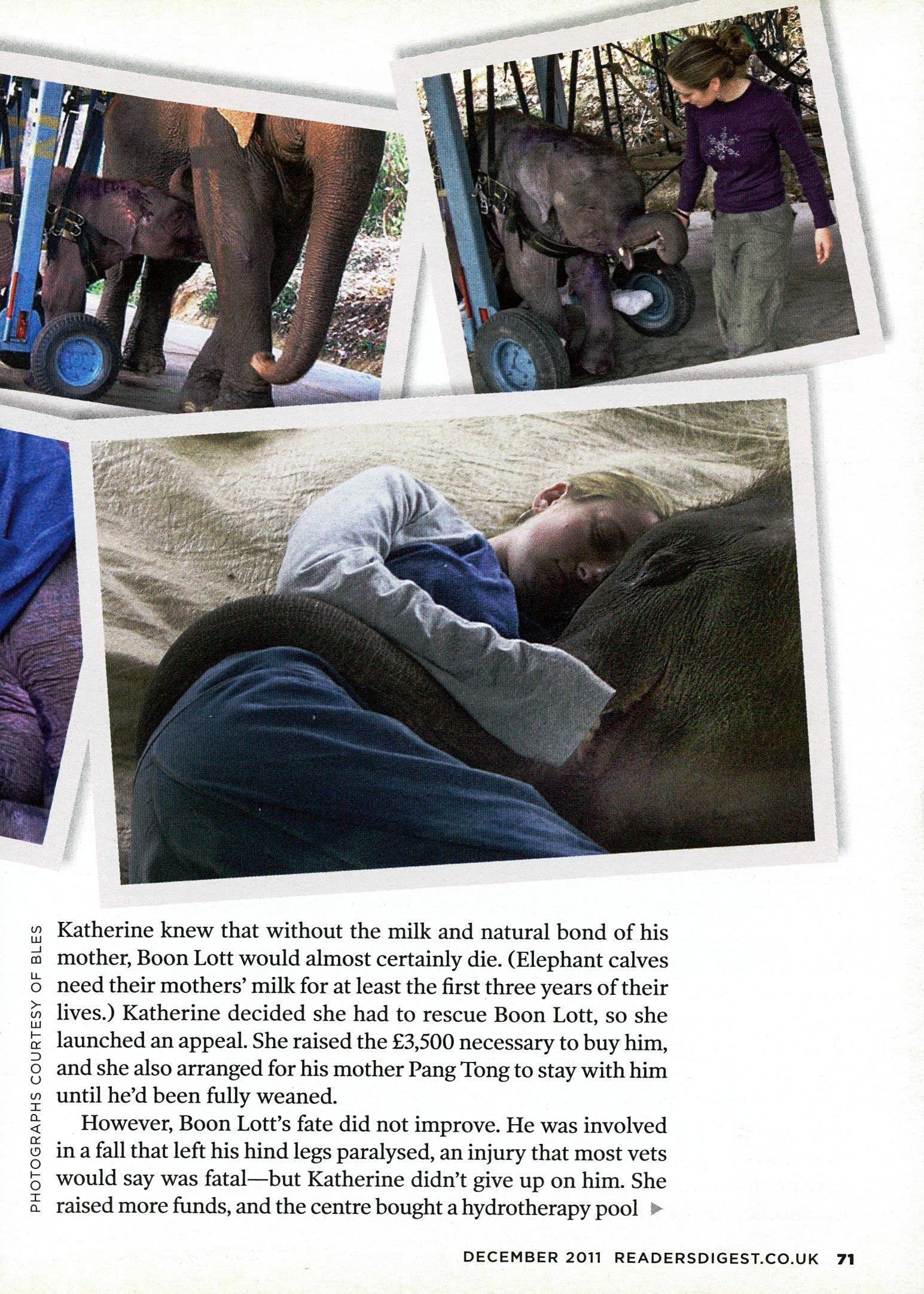
Katherine knew that without the milk and natural bond of his mother, Boon Lott would almost certainly die. (Elephant calves need their mothers' milk for at least the first three years of their lives.) Katherine decided she had to rescue Boon Lott, so she launched an appeal. She raised the £3,500 necessary to buy him, and she also arranged for his mother Pang Tong to stay with him until he'd been fully weaned.
However, Boon Lott's fate did not improve. He was involved in a fall that left his hind legs paralysed, an injury that most vets would say was fatal—but Katherine didn't give up on him. She raised more funds, and the centre bought a hydrotherapy pool it-
Elephants who work on the streets have poor health and diets. They're also overworked, cruelly handled and vulnerable to road accidents. They have an expected fiveyear lifespan as opposed to the 65-year average.
Elephants involved in illegal logging on the Thai-Burmese border live little better in terms
of health and treatment. The use of amphetamines to increase their work rates is reportedly rife. Trekking elephants in so-called sanctuaries are deliberately underfed to control aggression. The howdahs (chairs) on their backs—used to carry tourists—cause damage to the animals' spines. "The training regimes are

A street elephant offering sugar cane to market shoppers
based on submission and cruelty," Katherine says.
The use of a sharp metal hook known as an "ankus" (below) on the animal's most sensitive areas, such as the head, mouth or inner ear, is designed to stab the elephant into submission and break its spirit (the process is called phaagaan in Thai). Starvation is added for extra measure.
to help treat his legs. Later—in a world first—an elephant "wheelchair" was devised by Katherine and the engineering department of nearby Chiang Mai University.
All this hard work was starting to pay off, and Boon Lott began standing for short periods unassisted. Sadly, though, he fell again. This time, the injury was too severe—he died on June 26, 2004, with Katherine still cradling him in her arms.
During this period, Katherine had become friendly with Anon, whose elephant was also being cared for at the centre. But the day after Boon Lott died, Anon had to return to his village.
"Before Anon left, he gave me the number of the only phone in the village where he lives," Katherine says. "He was so different from the men I knew back home. He'd never even seen a film before. We'd forged a friendship through our love of elephants."
With Boon Lott dead and Anon gone, Katherine felt there was nothing left for her in Thailand— so, emotionally and physically exhausted, she returned to London. "It was great to see my family again. Old friends came to visit, and it was expected that after a period of mourning I'd pick up my old life again. But I felt empty. What had seemed important wasn't any more."
After a few weeks, Katherine found Anon's phone number. She knew she had to call him. From thousands of miles away, he reminded her of how she'd dreamed about opening an elephant sanctuary. "If you can find the money," he told her, "I'll find the land and we can open a sanctuary together."
"I threw myself into fundraising and sold all my own possessions to start this dream," Katherine remembers. "In June 2005, Anon told me he'd found some land and I returned to Thailand." Katherine, then just ►
Protective environment: Boon Lott's Elephant Sanctuary
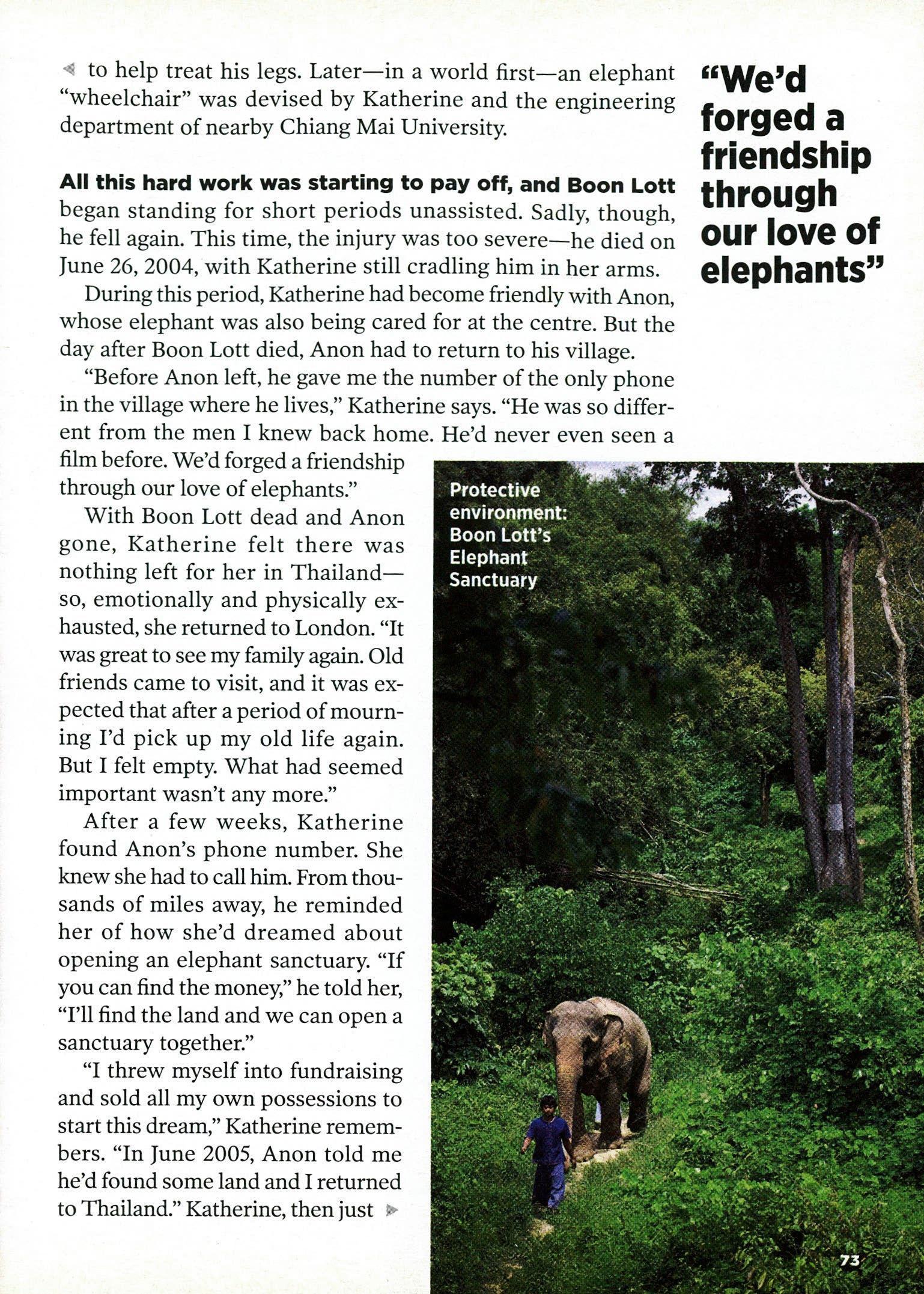
"We'd forged a friendship through our love of elephants"
"We owe it to the animals to treat them with dignity and respect"
 Soul mate: Katherine's husband Anon
Soul mate: Katherine's husband Anon
24, set up Boon Lott's Elephant Sanctuary (BLES), although most people said they were attempting the impossible.
'We wanted to create a safe home for the elephants we rescued. We wanted them simply to be elephants. No rides or humiliating tricks. We wanted to lead by example—to show how elephant welfare and management should be.
"Pang Tong Mrs Gold' in Thai), Boon Lott's mother, was our first rescued elephant. Her life had been full of abuse. Even as Anon and I were negotiating to buy her from her owner, he was boasting about the beatings, starvation and extreme conditions he'd worked her under.
"The work on our sanctuary went along at a pace. I also realised by then that I'd fallen in love with Anon, but I didn't want to jeopardise our friendship or the progress of the sanctuary. But one night, while we were both talking over an open fire, I found out that Anon felt the same way as I did—he told me that he loved me. It all seemed to fall into place. We were to build our sanctuary together as man and wife."
BLES now has 13 elephants that have access to 420 acres of land, left in its natural forest condition for the animals to forage through. Each one is partnered with a mahout—or elephant keeper/driver—to care for it and rebuild its trust. "There are two profound moments when we rescue an elephant," Katherine says. "The first is when you realise there will be no more abuse; the second is when the elephant realises this."
The sanctuary can host a maximum of six visitors—it provides accommodation as well as the chance to learn about, and interact with, the elephants and the mahouts—without any rides or shows. Although BLES is full at the moment, Katherine still travels the country answering
calls for help and monitoring the 3,500 elephants believed to still be living in Thailand—down from the 100,000 that roamed and worked there at the beginning of the 20th century.
"We watch out for all the street, logging and trekking elephants we come across," she says. "We try not to alienate elephant owners, but we want to show them what can be achieved without the use of the hook or the chain. The revenue we get from the small number of tourists we allow enables us to be a successful business. That success means something to Thai people—and we hope it'll encourage trekking centres to change their ways. It's enough for tourists to meet elephants as elephants."
Darkness envelopes Uttarardit night market, and the two baby elephants continue begging to meet their owners' high expectations of bringing in about £200 a day. "I said a prayer for them in my mind and apologised for the treatment they were receiving," Katherine says, sadly. "If tourists didn't visit these places, I'm sure the owners would adopt more humane regimes. Elephants are the biggest land mammals on earth—we owe it to ourselves and to the animals to treat them with dignity and respect. But without more land, we can't take any more. It breaks my heart to see an elephant being badly treated. I want to save them all." ■
Following in sort lt footsteps: Kathy' and Anon's three-yearold daughter Hope
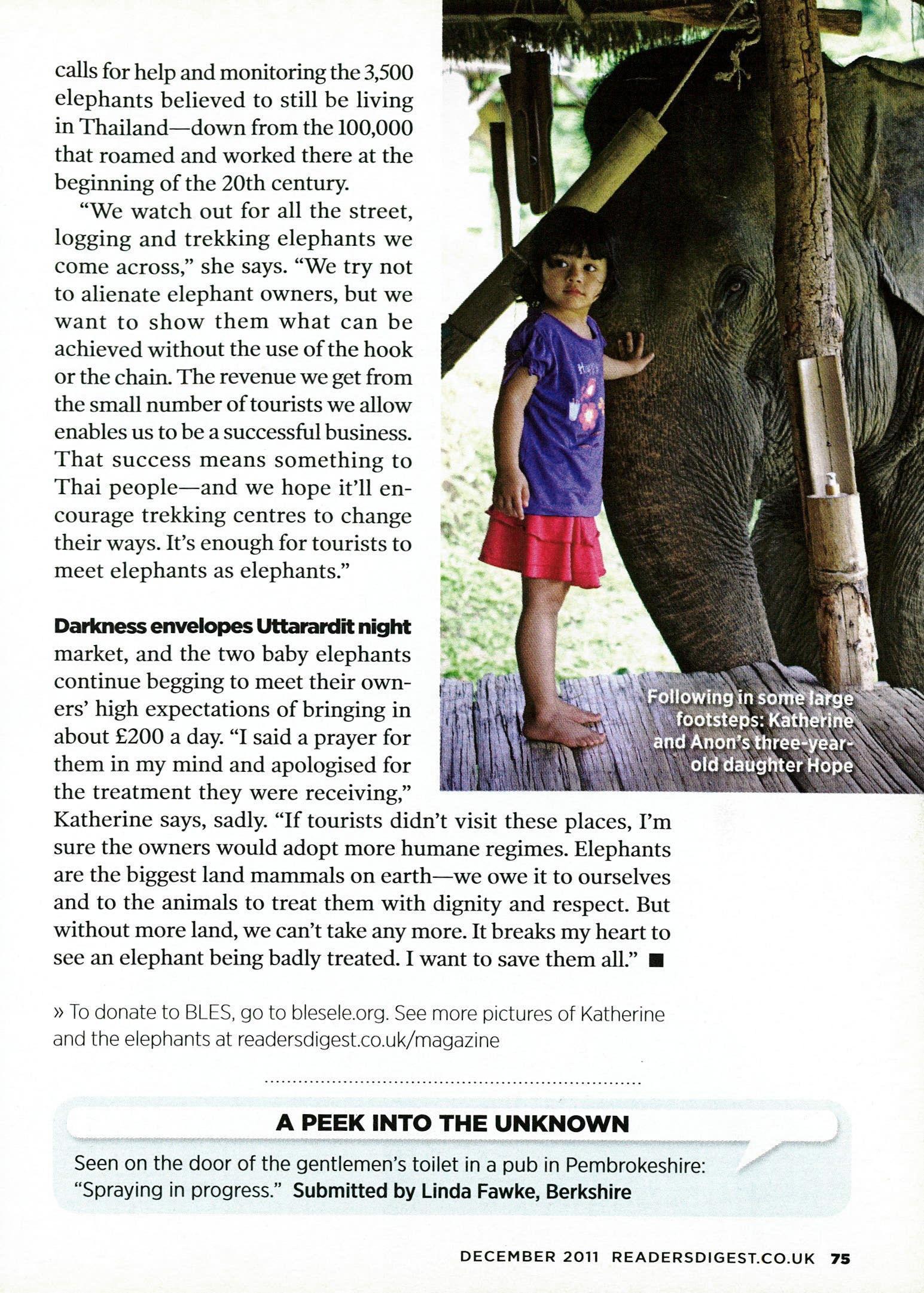
» To donate to BLES, go to blesele.org. See more pictures of Katherine and the elephants at readersdigest.co.uk/magazine
Seen on the door of the gentlemen's toilet in a pub in Pembrokeshire: "Spraying in progress." Submitted by Linda Fawke, Berkshire

A host of famous names reveal their favourite-ever Christmases—and the
ones they'd rather forget
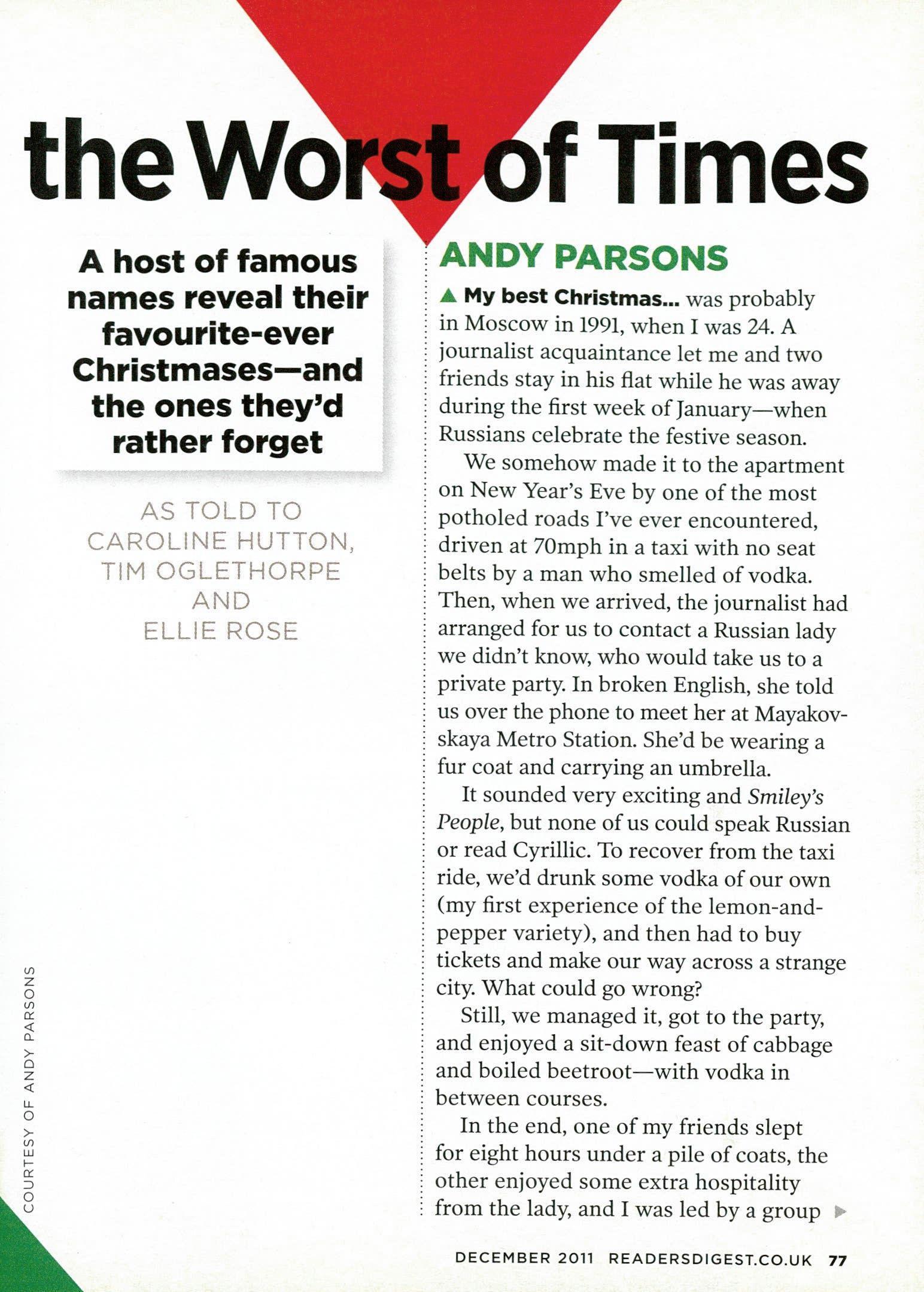
A My best Christmas... was probably in Moscow in 1991, when I was 24. A journalist acquaintance let me and two friends stay in his flat while he was away during the first week of January—when Russians celebrate the festive season.
We somehow made it to the apartment on New Year's Eve by one of the most potholed roads I've ever encountered, driven at 70mph in a taxi with no seat belts by a man who smelled of vodka. Then, when we arrived, the journalist had arranged for us to contact a Russian lady we didn't know, who would take us to a private party. In broken English, she told us over the phone to meet her at Mayakovskaya Metro Station. She'd be wearing a fur coat and carrying an umbrella.
It sounded very exciting and Smiley's People, but none of us could speak Russian or read Cyrillic. To recover from the taxi ride, we'd drunk some vodka of our own (my first experience of the lemon-andpepper variety), and then had to buy tickets and make our way across a strange city. What could go wrong?
Still, we managed it, got to the party, and enjoyed a sit-down feast of cabbage and boiled beetroot—with vodka in between courses.
In the end, one of my friends slept for eight hours under a pile of coats, the other enjoyed some extra hospitality from the lady, and I was led by a group ►
of pipe-playing men to Red Square at 4am, where we took off our shirts and danced for an hour, even though it was minus 30°C. Glasnost had arrived!
• My worst Christmas... was in 2005 when I spent the big day on a 24-hour British Airways flight to Australia. The tickets were slightly cheaper, but I thought BA would lay on something special. How wrong I was. No turkey meal, no little presents, nobody dressed up as Santa—just a lot of very miserable cabin staff who wanted to be at home. Ho, ho, ho! ER
» Andy Parsons will be hosting Live at the Apollo on BBC1 this month. His live DVD Gruntled is out now.
Ray Winstone with daughters— and fellow actors— Jaime (left) and Lois
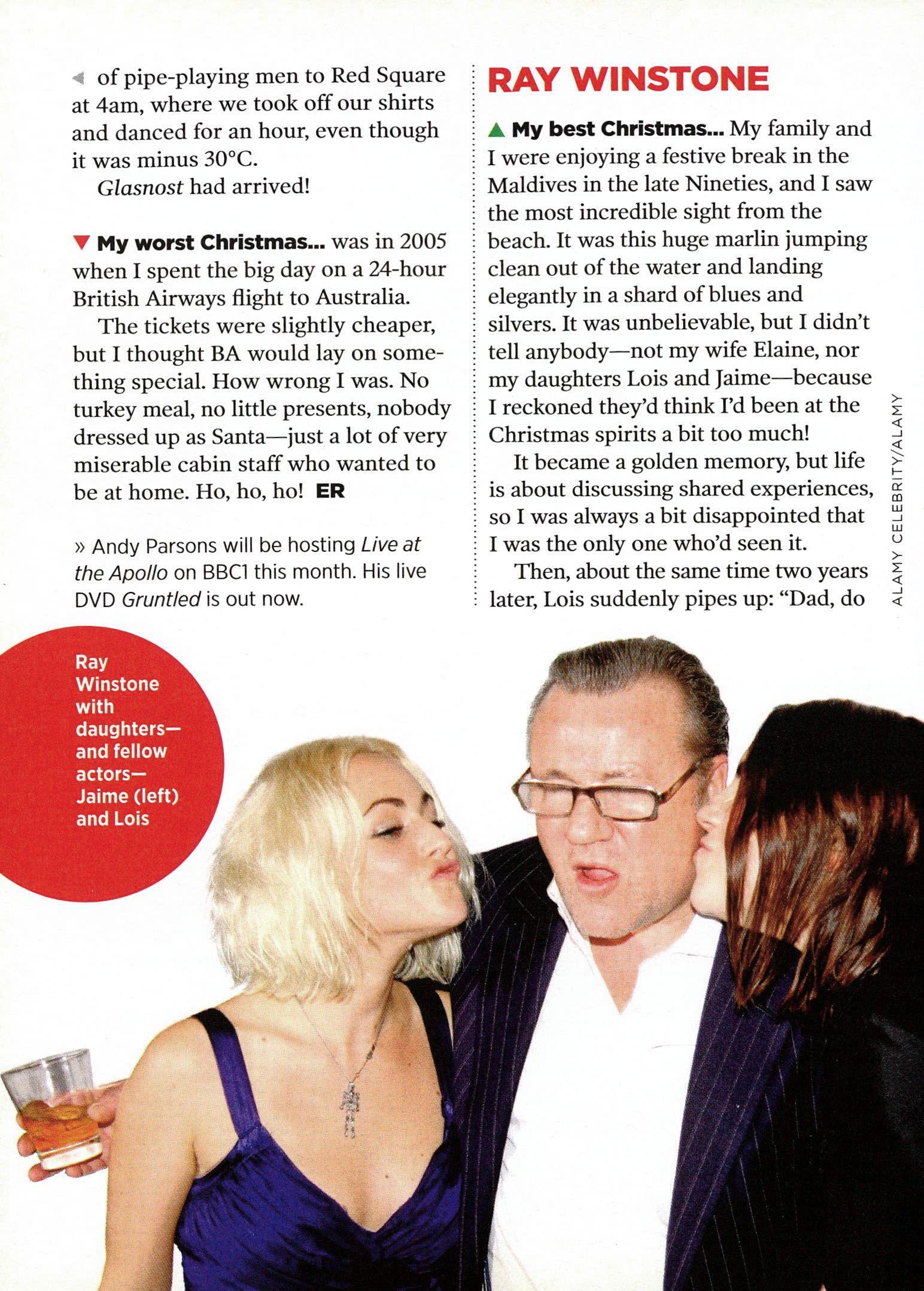
• My best Christmas... My family and I were enjoying a festive break in the Maldives in the late Nineties, and I saw the most incredible sight from the beach. It was this huge marlin jumping clean out of the water and landing elegantly in a shard of blues and silvers. It was unbelievable, but I didn't tell anybody—not my wife Elaine, nor my daughters Lois and Jaime—because I reckoned they'd think I'd been at the Christmas spirits a bit too much!
It became a golden memory, but life is about discussing shared experiences, so I was always a bit disappointed that I was the only one who'd seen it.
Then, about the same time two years later, Lois suddenly pipes up: "Dad, do
you remember when we saw that big fish in the Maldives?"
She'd been standing right behind me at the time and I hadn't realised. We had shared the experience! That marlin had made my Christmas all over again.
• My worst Christmas... My worstbehaved Christmas was when I was 18 and at drama school.
I was furious that the headteacher hadn't invited me to the Christmas party—even if I hadn't been a model student. So, while everyone else was preparing to kiss under the mistletoe, I was busy plotting my revenge and, a little later, stuck a piece of wood containing some very sharp tacks under the wheels of her car, with inevitable consequences.
By Christmas itself, my actions had got me expelled—someone "grassed me up", as they say—and I spent the festive season fretting about a missed opportunity and, quite understandably, getting it in the neck from my parents. The £900a-term fees they'd been paying hadn't come easily to them.
But the incident did make me realise that there are consequences to one's actions—for you and for others. I tried never to hurt my parents in the same way again, and to be less selfish and more hard-working. TO
♦My best Christmas... was in 1976 when I was doing my first-ever pantomime Mother Goose. My parents and brother came up to stay in my hotel in Darlington. It was cold and raining, and the only place we could find to go for Christmas lunch was a terrible cafe. It wasn't looking good...but we were joined by almost all the cast and the Dunkirk spirit prevailed. There were about 25 of us round the table—we sang songs, played games and drank lots. It was wonderful.
• My worst Christmas... isn't a specific occasion, but more a sadness that I'm always working in panto. We do performances on Christmas Eve and Boxing Day, so the 25th is rather rushed. I remember with nostalgia being a youngster and having the time to wrap presents, decorate the tree, and put out a little cake and sherry for Father Christmas. The hotels I stay in are good to me and always put a tree in my room—but it's not the same. CH

» Ray plays Magwitch in Great Expectations on BBC1 this Christmas, and Uncle Claude in Hugo, in cinemas December 2.
» Christopher appears in his 38th pantomime, Robinson Crusoe and The Caribbean Pirates, at the New Theatre, Cardiff, from December 10 to January 22.

♦My best Christmas... We didn't have a lot of money when I was a kid, but my parents always spoiled us at Christmas and made it lovely. Sometimes they worked on the day itself (my dad as a waiter, my mum helping in an old people's home), and then my younger sister and I would have to wait until they both got back. That was purgatory.
But we'd normally eat around the time of the Queen's Speech —lunch was the full shumoddle—and then watch a film. I was bewitched by Fred Astaire in Top Hat and The Band Wagon, and Gene Kelly in Singin' in the
• My best Christmas... was last year. We had a totally traditional time. My children Sunnie, Herbie and Teddie were the perfect ages (six, three and one) to make it all magical—even if Herbie was a bit anxious about a big, bearded stranger coming into his room at night and we had to leave his stocking outside his door.
Lots of the family came to stay, and Harrogate —where we live—had gorgeous lights and a lovely Christmas Eve concert. My mother is really good at helping
Rain—they were always on and inspired my love of dancing.
V My worst Christmas... My parents had a party in our house on Christmas Eve, and my six-year-old brother had been finishing off a few of the leftover drinks. He couldn't differentiate between lemonade and alcohol, so we ended up rushing him to casualty to have his little stomach pumped. I was a few years older and felt partly responsible. Thankfully he was fine, though he probably nursed a hangover on Christmas Day. CH
» Anton appears in Strictly Come Dancing on BBC1 this month and tours nationwide in Anton & Erin—Let's Do It from January 19. See raymondgubbay.co.uk.
in the kitchen and makes fantastic mince pies, so we spent a lot of time eating, and after Christmas lunch we played silly games.
My parents split up when I was young, so having a family occasion with everyone I love meant a lot.
• My worst Christmas... was when I was about 20 and got so drunk on Bacardi in the pub on Christmas Eve that I spent the whole of the following day in bed. My poor mum! CH
» Charlotte plays Laurel Thomas in Emmerdale, which has an hour-long edition on Christmas Day.
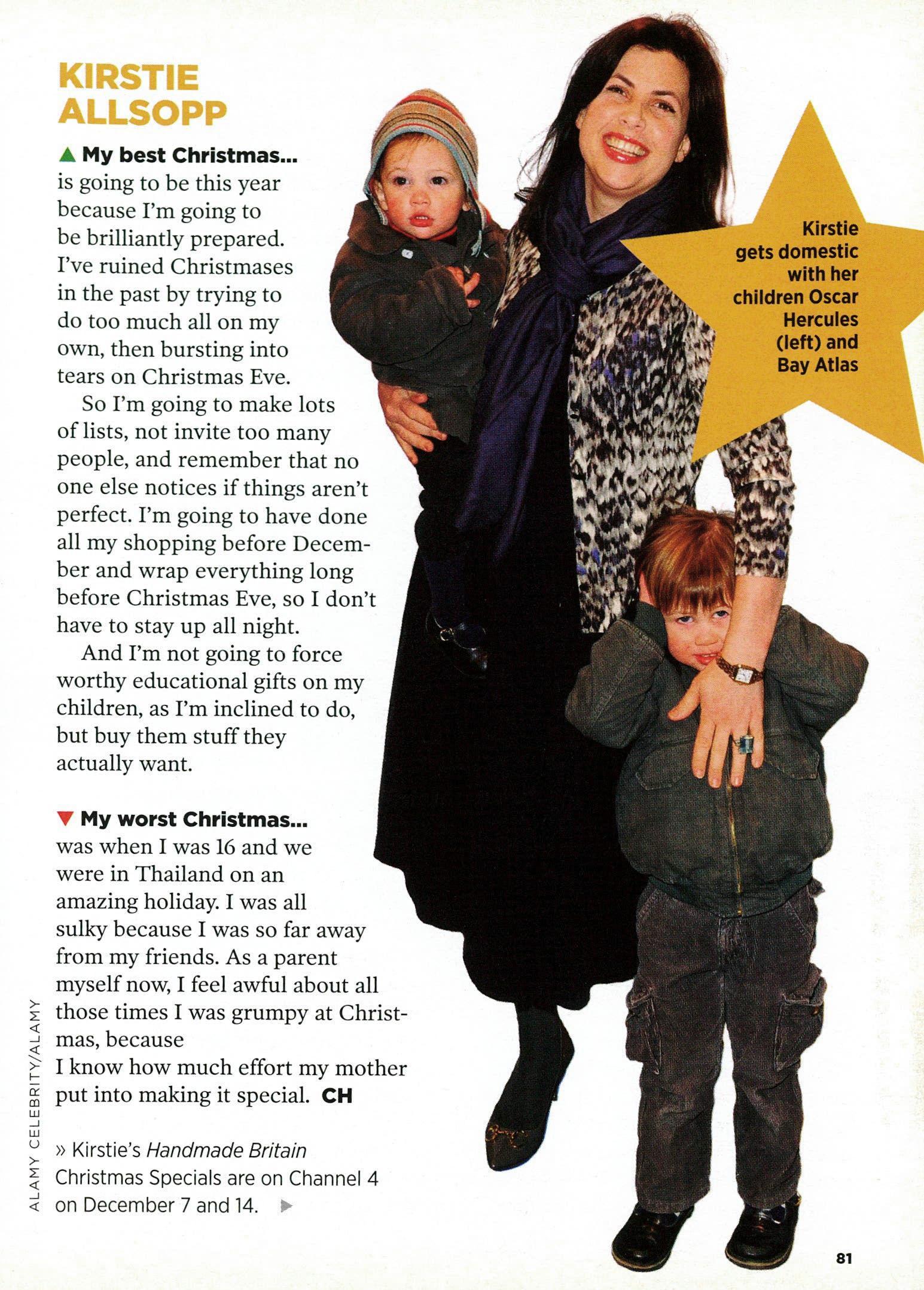
♦ My best Christmas... is going to be this year because I'm going to be brilliantly prepared. I've ruined Christmases in the past by trying to do too much all on my own, then bursting into tears on Christmas Eve.
So I'm going to make lots of lists, not invite too many people, and remember that no one else notices if things aren't perfect. I'm going to have done all my shopping before December and wrap everything long before Christmas Eve, so I don't have to stay up all night.
And I'm not going to force worthy educational gifts on my children, as I'm inclined to do, but buy them stuff they actually want.
• My worst Christmas... was when I was16 and we were in Thailand on an amazing holiday. I was all sulky because I was so far away from my friends. As a parent myself now, I feel awful about all those times I was grumpy at Christmas, because I know how much effort my mother put into making it special. CH
» Kirstie's Handmade Britain Christmas Specials are on Channel 4 on December 7 and 14. ►
A My best Christmas... Back in 1972, when I was seven, my brother John and I were spending Christmas at our grandparents' house in Stockton-onTees, and we got snowed in.
Snow is what you dream about at Christmas—and we had enough to

not only enjoy things like sledging but also to keep us cut off, pretty much, from the outside world for four days in a house full of toys, lots of cousins to play with, Laurel and Hardy cartoons and the Morecambe & Wise show on TV. It was heaven!
What was particularly great was that John and I got on so well. We didn't fall out, just played games, ate festive food and threw snowballs at one another. I think if you survive four excitable days together under the same roof when you're kids with lots of energy to let off, that pretty much sets up a relationship for life. We've been close ever since.
• My worst Christmas... It won't come as any great surprise to learn that it was when my mum Josephine died. It happened just two days before the turn of the year, in 2004, and of course it'll be on the family's mind this Christmas, too. That time obviously had a profound effect on me—on all of us—although the fact that I gave up alcohol around that time was coincidental rather than consequential.
Subconsciously, however, I may have been aware of the need to make every moment count, to create more time and more energy for myself—not only for work but also for my four-year-old daughter Daisy. When you lose someone, you realise how precious time is and how easily it can be squandered. TO
» Stephen stars in the new series of Wild At Heart, which starts on ITV1 in January.
A My best Christmas... was 1994, when my husband proposed at our house in East Finchley, north London. He said, "I've never wanted to marry anyone else, so I've got you a special present."
I opened the box to find an engagement ring.
• My worst Christmas... The following year I got terrible food poisoning. We had to call the doctor out on Christmas morning, and he gave me an injection to stop me being sick. My very capable mother and sister took charge while I lay miserable in bed. I managed to make it downstairs later in the day to eat some dry toast and pull a cracker, but I missed all the fun. CH
» Phyllis plays housekeeper Mrs Hughes in ITV1's Downton Abbey Christmas Day special.
A My best Christmas... was just over 20 years ago, when my late husband and I bought our tiny cottage in Wales. It was a two-up two-down, but we managed to sleep our four daughters, two of their partners and a friend— plus a couple of Labradors and two cats—in a muddle of bunk beds and mattresses on the floor. It was either going to be a disaster or a triumph, and luckily it was wonderful.
We walked along the beach on Christmas morning and it was a beautiful blue day, with the sand icy under our feet. We made a huge log fire, drank lots of champagne and all cooked lunch on our new Aga. We didn't have a TV, so we played charades and board games. Everyone was
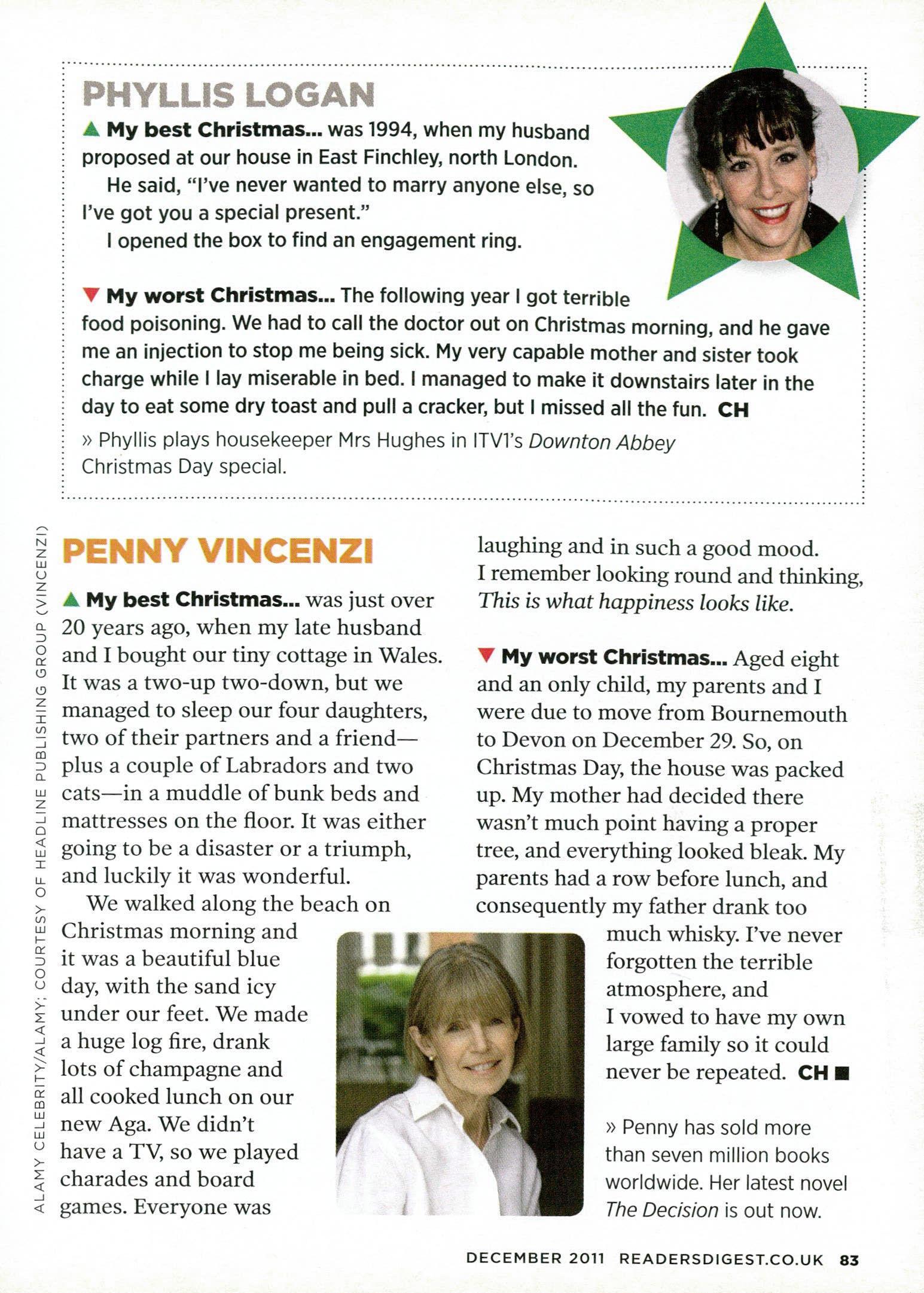
laughing and in such a good mood. I remember looking round and thinking, This is what happiness looks like.
V My worst Christmas... Aged eight and an only child, my parents and I were due to move from Bournemouth to Devon on December 29. So, on Christmas Day, the house was packed up. My mother had decided there wasn't much point having a proper tree, and everything looked bleak. My parents had a row before lunch, and consequently my father drank too much whisky. I've never forgotten the terrible atmosphere, and I vowed to have my own large family so it could never be repeated. CH ■
» Penny has sold more than seven million books worldwide. Her latest novel The Decision is out now.
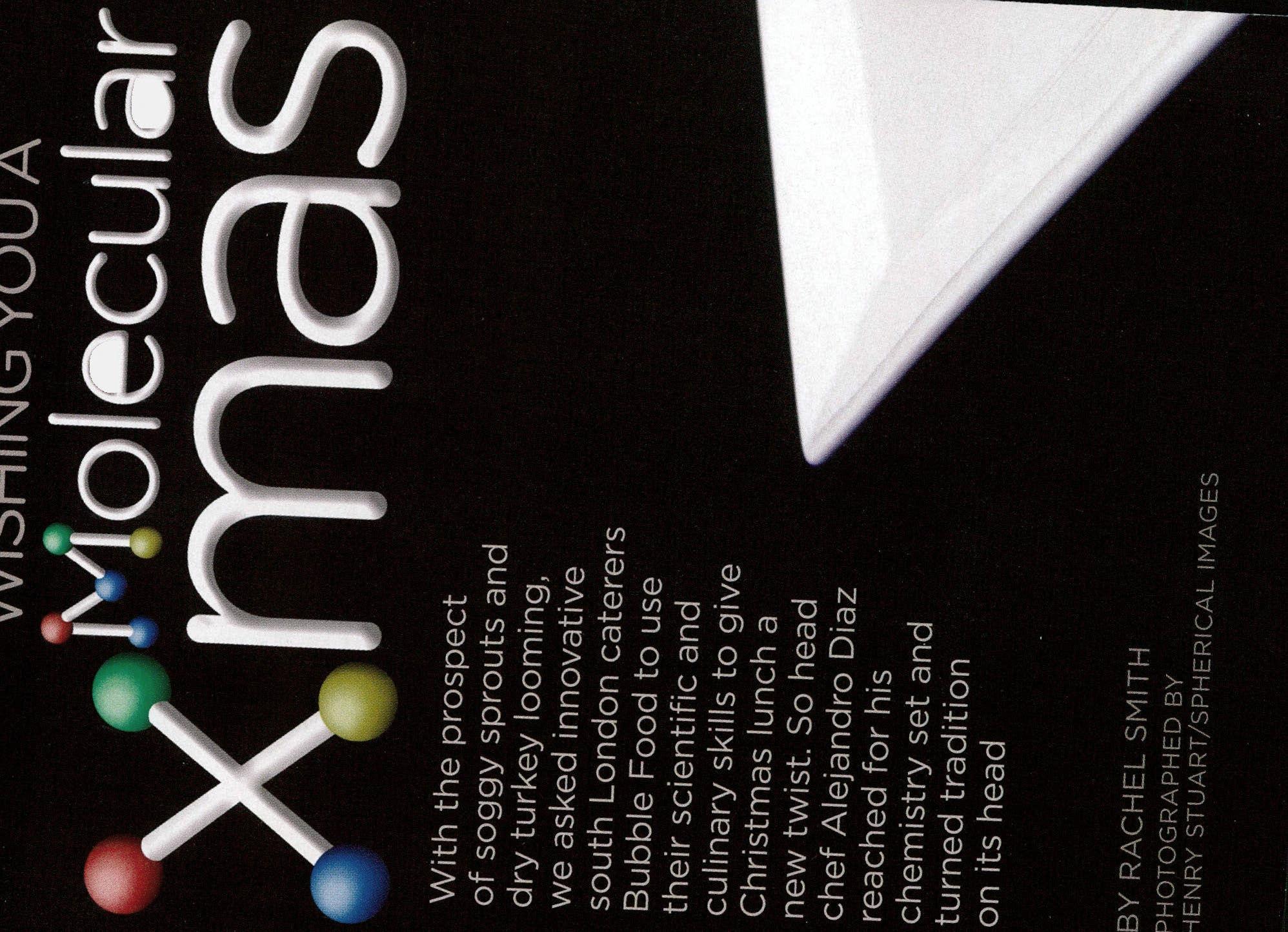
glazed salmon, resting on a bed of horseradish crumble and topped with beetroot caviar. Served with warm aspic—a gelatin dish made from meat consommé—garnished with miniature watercress
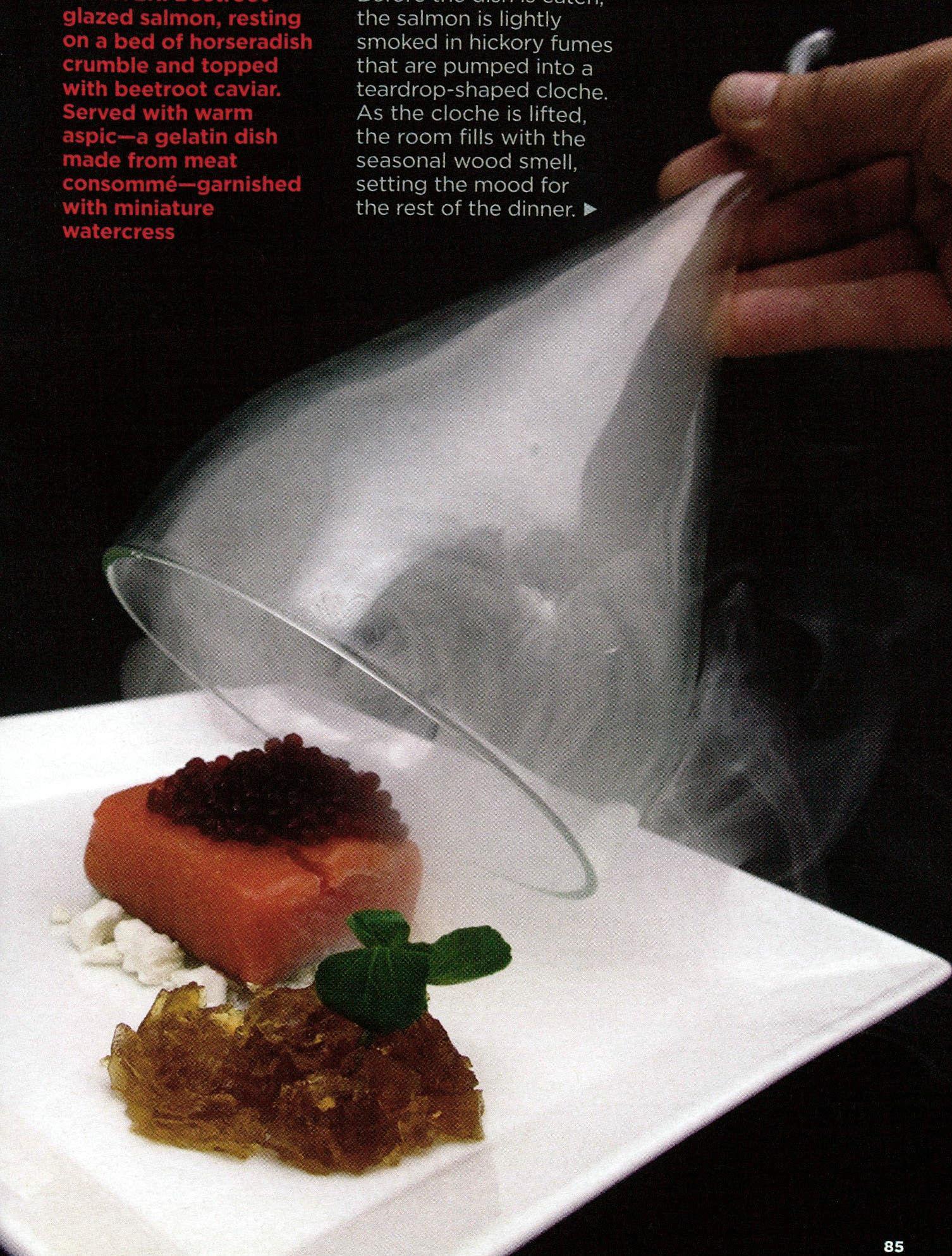
the salmon is lightly smoked in hickory fumes that are pumped into a teardrop-shaped cloche. As the cloche is lifted, the room fills with the seasonal wood smell, setting the mood for the rest of the dinner. ►
oo me wo wee s o develop a recipe for the Brussels sprout ice cream that didn't taste disgusting" —Alejandro
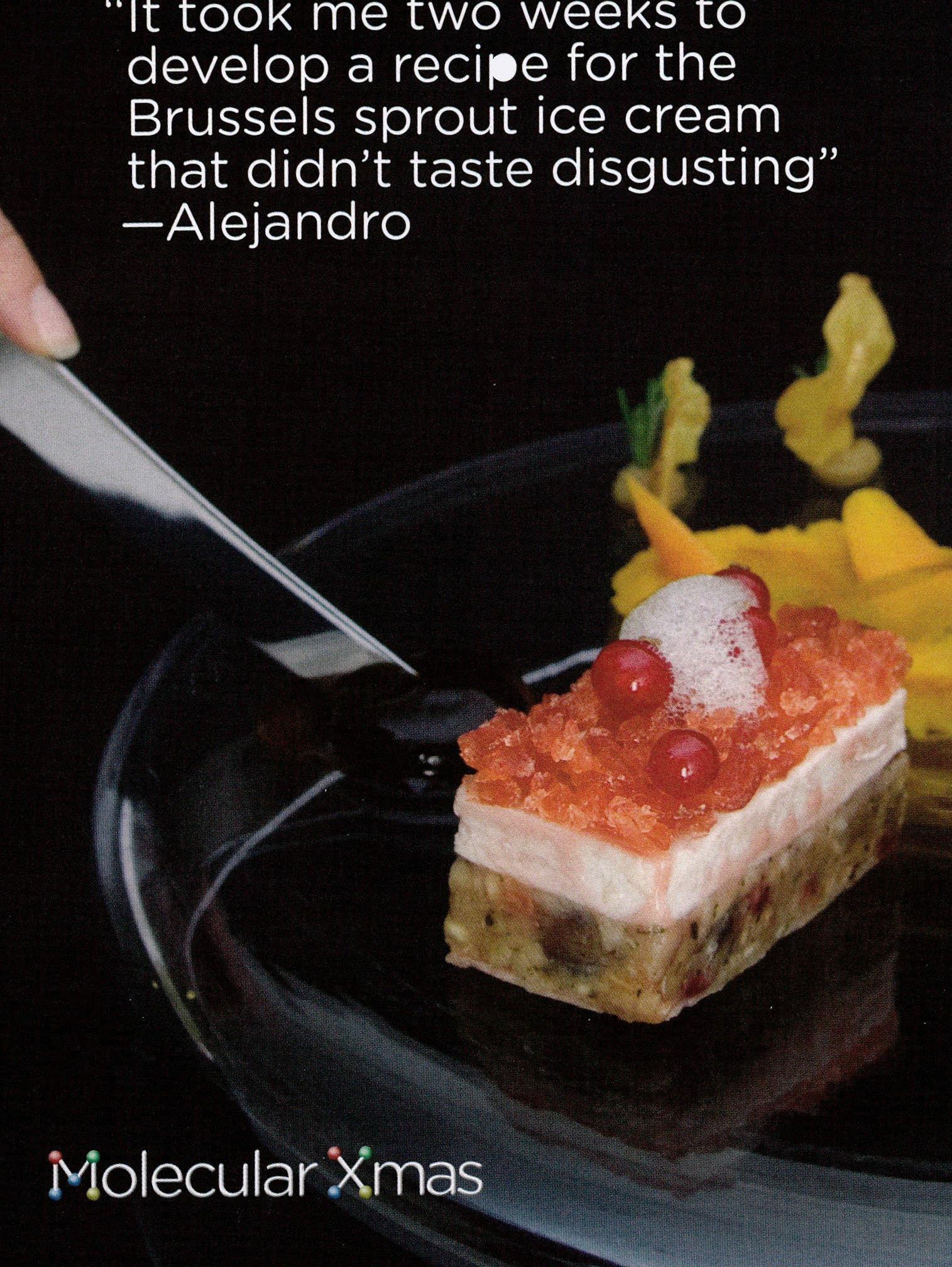
'Mofecularmas
A terrine of sous-vide turkey breast, chestnut stuffing and cranberry crystals. Accompanied by a ball of Brussels sprout ice cream encased in blanched sprout leaves, textures of root vegetables and a gravy "ravioli"
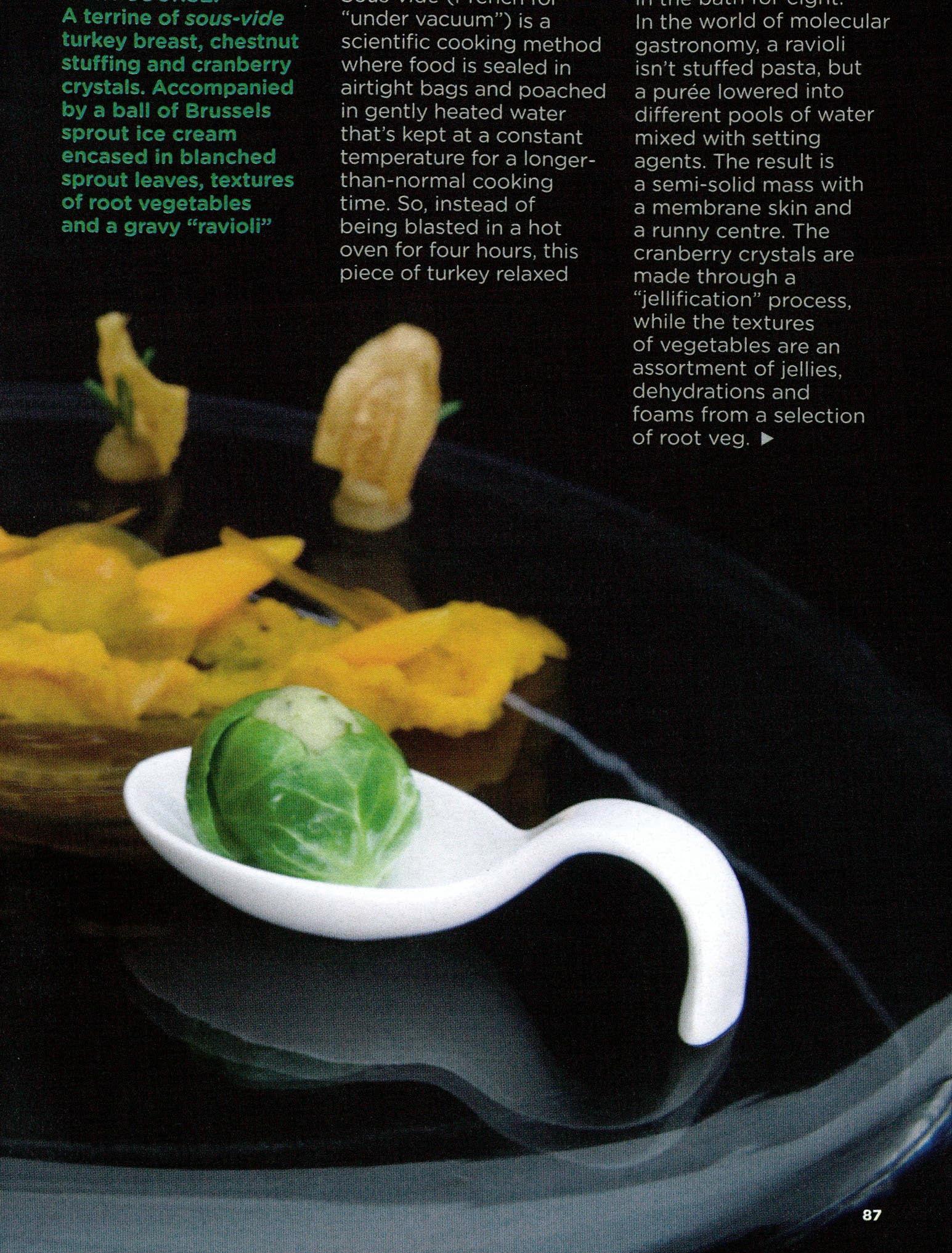
"under vacuum") is a scientific cooking method where food is sealed in airtight bags and poached in gently heated water that's kept at a constant temperature for a longerthan-normal cooking time. So, instead of being blasted in a hot oven for four hours, this piece of turkey relaxed
In the world of molecular gastronomy, a ravioli isn't stuffed pasta, but a purée lowered into different pools of water mixed with setting agents. The result is a semi-solid mass with a membrane skin and a runny centre. The cranberry crystals are made through a "jellification" process, while the textures of vegetables are an assortment of jellies, dehydrations and foams from a selection of root veg.
There's a huge universe still to discover when it comes to molecular gastronomy. It's so new—we've only just scratched the surface"
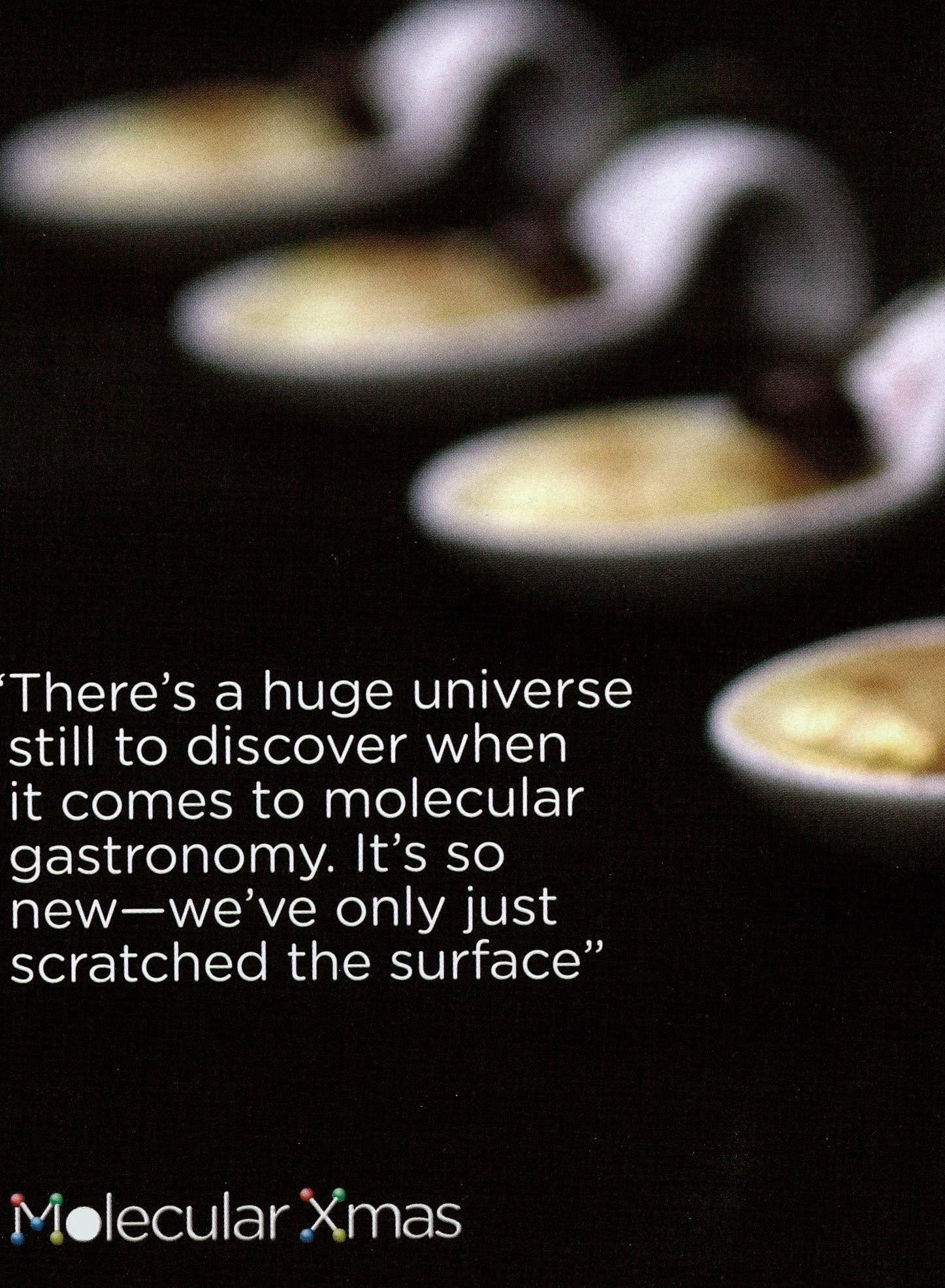
ravioli, cherries and cherry stems
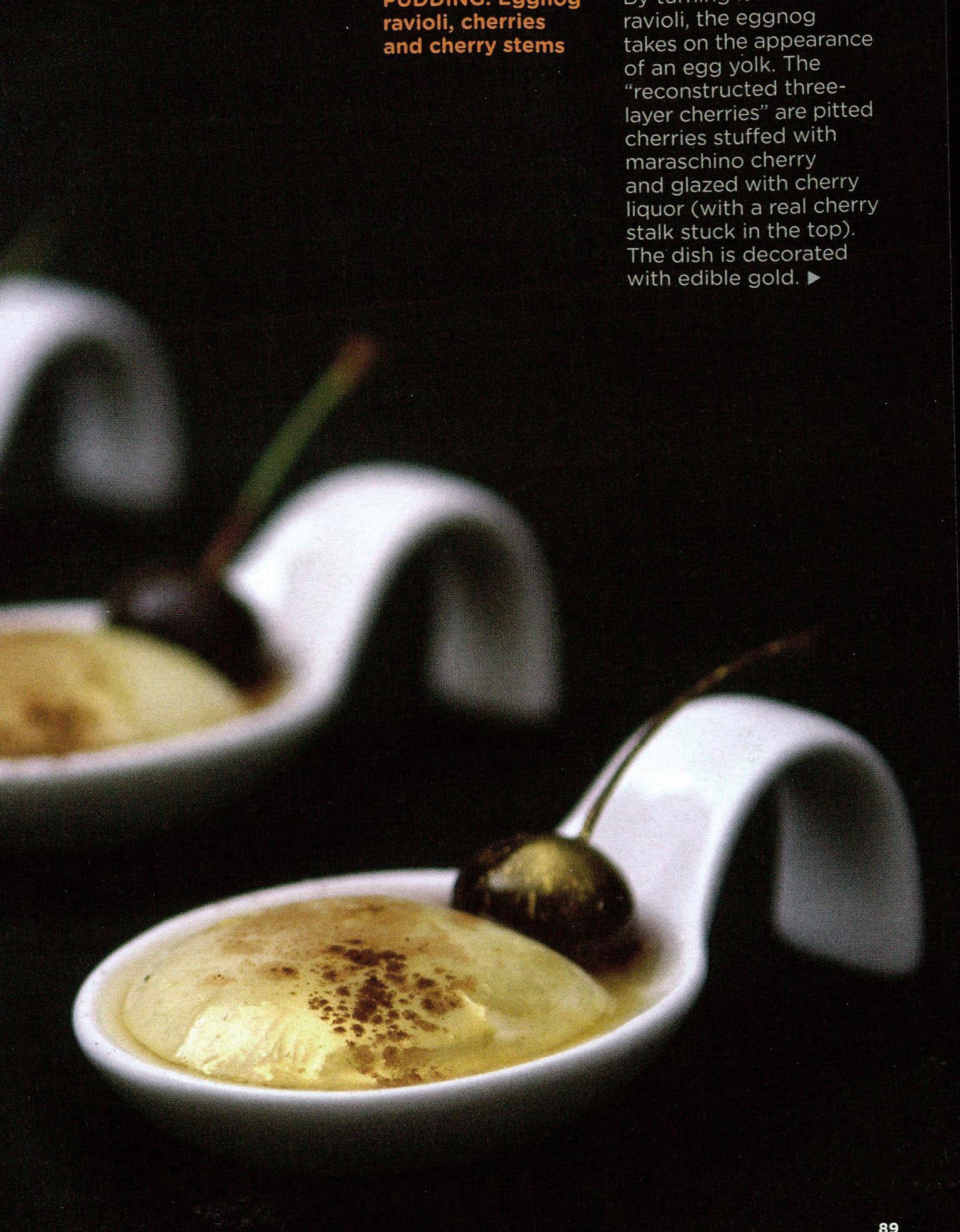
ravioli, the eggnog takes on the appearance of an egg yolk. The "reconstructed threelayer cherries" are pitted cherries stuffed with maraschino cherry and glazed with cherry liquor (with a real cherry stalk stuck in the top). The dish is decorated with edible gold. ►
"The soda is my favourite part of the menu—the physical change from a pie t• a cocktail is huge, but the flavours are identical"
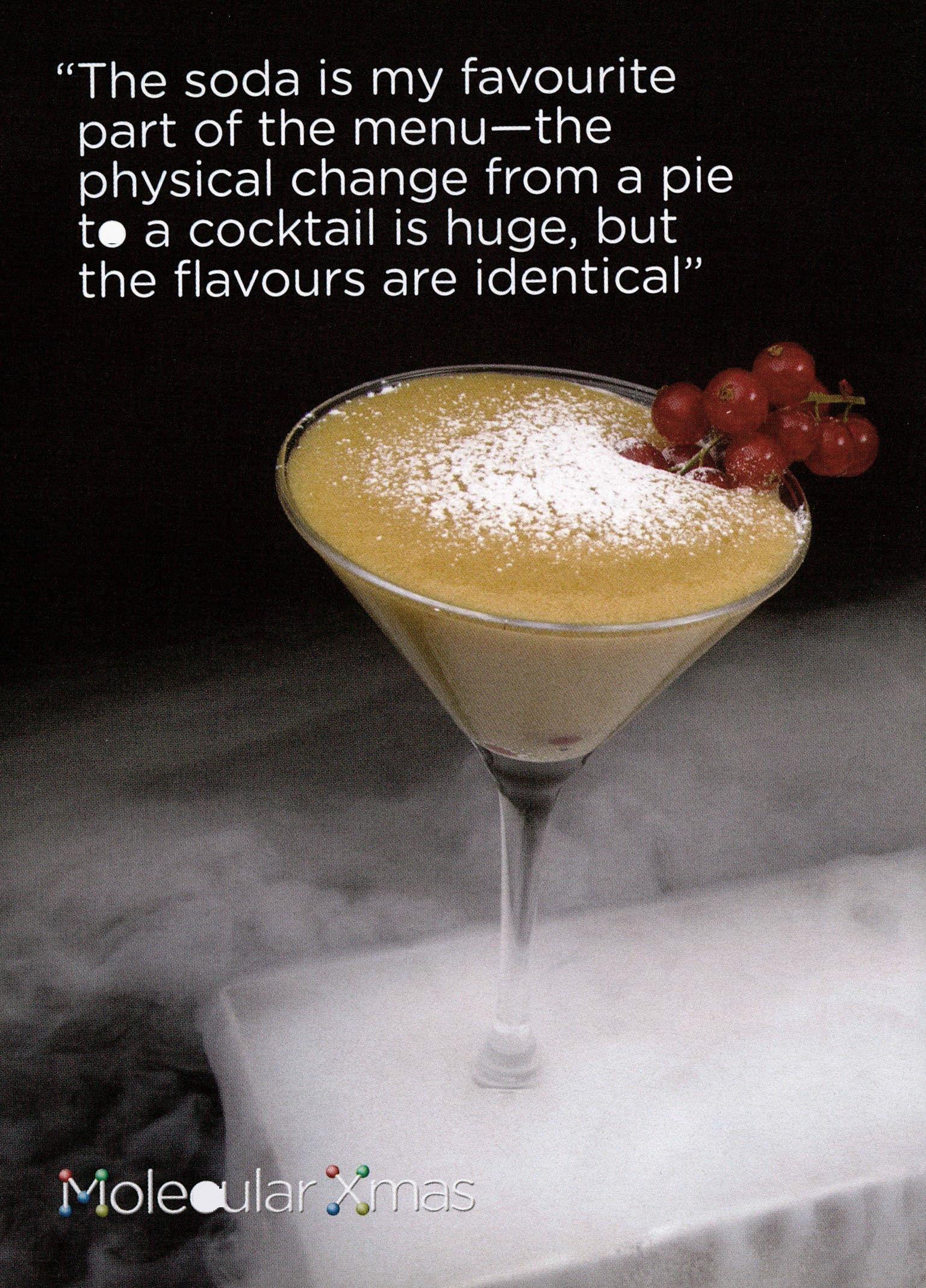
uolesul
» See video footage of our molecular meal at readersdigest.co.uk/ magazine. For more information on alternative Christmas catering, visit bubblefood. corn COCKTAILS: Mince pie soda
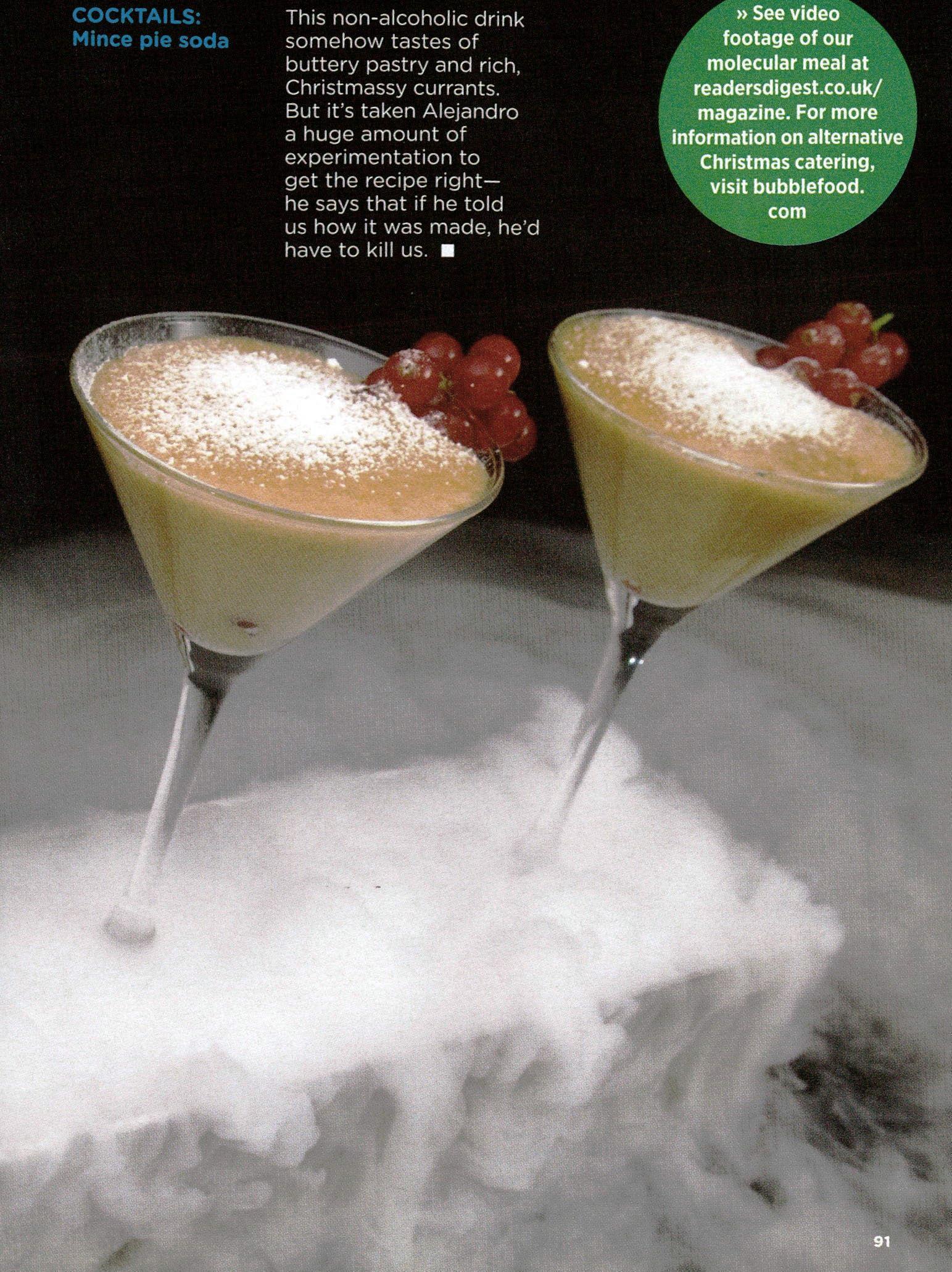
This non-alcoholic drink somehow tastes of buttery pastry and rich, Christmassy currants. But it's taken Alejandro a huge amount of experimentation to get the recipe right— he says that if he told us how it was made, he'd have to kill us. ■
 BY DANNY SCOTT
BY DANNY SCOTT
Michael Holmes, 29, is a British skydiving instructor, based in New Zealand. His parachute failed during a jump on December 13, 2006.
"I was supposed to be filming a group of skydivers above Taupo, around 150 miles south of Auckland. We jumped out of the plane at 15,000 feet and fell to about 4,000 feet, but when I deployed my
main parachute, it didn't open properly.
"I tried to untangle it, but I was falling at around 60mph, spinning violently [experiencing centrifugal forces of 5Gs] and blood was being
forced into my hands so I couldn't do much with them. So I decided to release the main parachute, then deploy my reserve. Unfortunately, the main chute didn't detach and I knew that, if I deployed my reserve now, the two could easily get tangled up.
"I kept attempting desperately to sort out the main canopy, but, at 1,000 feet, I had to make a decision. I had about eight seconds
before I hit the ground. So I took a gamble, deployed my reserve and... the parachutes wrapped around each other.
"Up until that point, I was just thinking, Let's get this sorted. Now I realised, 'Oh, s**t! I'm dead'—in fact, my helmet-camera captured me saying those exact words. Then I decided that I ought to leave people a last message—so, with the $.

Michael's view as he hurtles to earth without a functioning parachute

4 earth coming up to meet me, I just blurted, 'Bye!'
"I don't remember hitting the ground —I was out cold for a few seconds. Then I could hear my colleague John asking me if I was all right. I was drifting in and out of consciousness, but all I could think was, Something went wrong. Was it my fault? What had just happened—surviving—didn't register. All I kept talking about was checking my parachute. John laughed at me!
"It wasn't until the next day—lying in hospital—that I started thinking about words like 'miracle'. I'd fallen almost three miles and all I had was a broken ankle, three broken ribs, a punctured lung, some bruising and lots of scratches from the blackberry bush I landed in.
"Some say it was the bush that saved me; others that, because I thought I was going to die, my body went limp. I'm not a religious man, but I guess whatever is in charge just decided it wasn't my time."
» Michael's story features in the lndestructibles series, currently showing on the National Geographic Channel.
roken bones, but no harm done; (right) the crash landing as it happened
Corporal Simon Brown, 33, from Morley, West Yorkshire, served with the Royal Electrical and Mechanical Engineers in Iraq. On December 6, 2006, he was shot in the face.
"My job was to travel with the patrols and repair the armoured trucks if they broke down—on the frontline, you can't wait for the RAC! Around 11.30am one day, we were involved in a skirmish with insurgents near Basra Palace. One of our vehicles had a fault and we had to try and move it away under heavy fire.
"I got everything attached for towing and climbed back into my armoured vehicle, but the driver couldn't really see the road because of all the dust. I just popped my
head back out of the hatch to check it was clear—and felt this massive smack on the side of my face.
"I guess every soldier thinks they have an idea of how it feels to get shot, but it was nothing like I'd imagined. No noise, just a piece of metal, travelling faster than the speed of sound, hitting me in the face. It might
see, but I assumed that was because I'd got my eyes closed. I could tell something had gone wrong in my mouth [Simon's palate had collapsed], so I stuck my thumb in there to help me breathe.
"Because there wasn't much pain, I figured I'd have a few stitches back at base and everything would be fine. But the bullet had cauterised my nerves. It had gone in under my left eye—which I lost—passed half an inch from my brain, and come out near my right eye, which now has about 15 per cent vision.
Simon lost an eye, but the bullet missed his brain

only have been 7.62mm in diameter, but it felt like I'd been smashed with an iron bar!
"It knocked my head sideways, but I managed to get myself back down the hatch. I didn't really feel any pain. The adrenalin was pumping and I was totally conscious. I couldn't
"Still, whenever I tell my story, people are always surprised by how matter-of-fact I am. Yeah, I was shot in the face, but as a soldier you're taught to stay calm. I was the one who bandaged my own head! And, if I hadn't had the wherewithal to make sure I could breathe, I probably wouldn't be here. That's quite an incentive, when you think about it. Stay calm and do the right thing, or you'll die!"
» Simon now works as a motivational speaker and fund-raises for the Royal British Legion (poppy.org.uk) ►
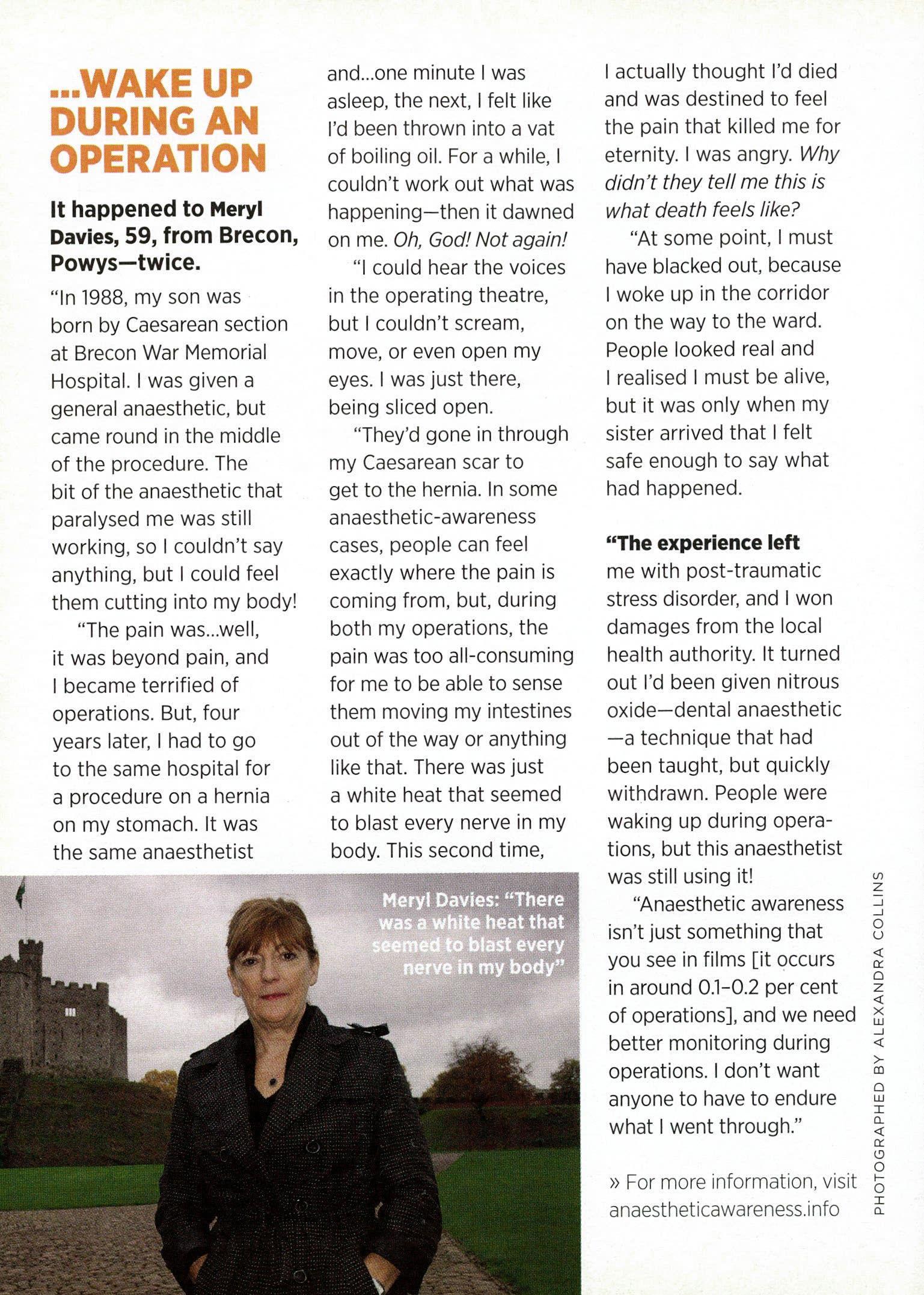
It happened to Meryl Davies, 59, from Brecon, Powys—twice.
"In 1988, my son was born by Caesarean section at Brecon War Memorial Hospital. I was given a general anaesthetic, but came round in the middle of the procedure. The bit of the anaesthetic that paralysed me was still working, so I couldn't say anything, but I could feel them cutting into my body!
"The pain was...well, it was beyond pain, and I became terrified of operations. But, four years later, I had to go to the same hospital for a procedure on a hernia on my stomach. It was the same anaesthetist
and...one minute I was asleep, the next, I felt like I'd been thrown into a vat of boiling oil. For a while, I couldn't work out what was happening—then it dawned on me. Oh, God! Not again!
"I could hear the voices in the operating theatre, but I couldn't scream, move, or even open my eyes. I was just there, being sliced open.
"They'd gone in through my Caesarean scar to get to the hernia. In some anaesthetic-awareness cases, people can feel exactly where the pain is coming from, but, during both my operations, the pain was too all-consuming for me to be able to sense them moving my intestines out of the way or anything like that. There was just a white heat that seemed to blast every nerve in my body. This second time,
I actually thought I'd died and was destined to feel the pain that killed me for eternity. I was angry. Why didn't they tell me this is what death feels like?
"At some point, I must have blacked out, because I woke up in the corridor on the way to the ward. People looked real and I realised I must be alive, but it was only when my sister arrived that I felt safe enough to say what had happened.
"The experience left me with post-traumatic stress disorder, and I won damages from the local health authority. It turned out I'd been given nitrous oxide—dental anaesthetic —a technique that had been taught, but quickly withdrawn. People were waking up during operations, but this anaesthetist was still using it!
"Anaesthetic awareness isn't just something that you see in films [it occurs in around 0.1-0.2 per cent of operations], and we need better monitoring during operations. I don't want anyone to have to endure what I went through."
» For more information, visit anaestheticawareness.info
Dominic Hurley, 38, from Rotherham, was unconscious for three months following a road accident on August 18, 1994.
"During my hotel-management degree, I did a placement at a hotel in Cyprus. It was hard work, so, on a rare night off, a group of us hired mopeds and went into Ayia Napa.
"On the way home, it seems I fell asleep and tumbled off my bike. I wasn't wearing

a helmet, my head took a real bang and I fell into a coma.
"I was transferred back home and my family kept watch over me 24 hours a day. I know you read about people being able to hear stuff when they're unconscious, but, though my mum told me I opened my eyes occasionally and there was movement in my limbs, I don't remember anything about those three months. Nothing...a big blank.
"And, when I came out of the coma, it wasn't like films where people just open their eyes and go, 'Gee, Dad, where am I?' It was a gradual thing— a very blurred two years. My parents were there when I woke up and, when the nurses told me who they were, I sort of recognised them, but I couldn't recall anything about them.
"I do remember standing by my hospital bed a little later, and Supermarket Sweep was on the telly. Somewhere inside, I knew that I didn't like it. I kept falling
Dominic shortly shortly after the accident (above), and taking the first steps to recovery— more than three months later
Headway

-4 over, but I still tried to crawl over to turn it off. But most of the recollections I've got of those first few months are things my parents have told me about. They'd show me pictures and say, 'You did this last week,' yet I couldn't remember. When I went home after four months in hospital, I didn't even recognise my own house. I just thought, Oh, this is nice.
"Days just slipped by. Friends would visit, but I had no recollection of anything we'd ever done together. Thinking and remembering seemed really hard, so I guess I just didn't bother. It was my parents and therapists who got me out of that—showing me photos, telling me about my life. I was forced to start building up a picture of who I was.
"I still can't really walk, and I've got little use of my right arm. But this is who I am now. I've been told it's unlikely I'll ever get any real memories of what life was like before the accident, so why worry about it? I'd rather concentrate on the future."
» Dominic has raised more than £53,000 for various charities, including £20,000 for brain-injury charity Headway (headway.org.uk)
Sam MacPherson, 55, from Fort William in the Scottish Highlands, volunteers for the Lochaber Mountain Rescue Team. He was a passenger in a craft whose engine failed in January 1989.
"We were flying up the mountain Creag Meagaidh to replenish an equipment store. There were ten of us on board and I was strapped in at the side, looking across at the winchman, who had the door open, trying to spot a place to land.
"I guess we were about 70 feet above the hillside when I felt the helicopter shake and suddenly saw the winchman slam the door shut. We'd lost one of the two engines at exactly the same moment that we'd been hit by a downdraught off the mountain. The winchman had a helmet on, so he must have heard the pilot say we were going down, but I had no idea. Up in the mountains, you get used to the helicopter getting shoved around violently by the wind, so I didn't realise we were falling. I was actually sitting there quite calmly until we hit the ground.
"The sound and feeling were a bit like a car crash—metal being ripped apart, while my body was slammed against the side of the helicopter. I remember assuming that I was about to die. You don't hit the ground in a bloody great helicopter and survive. But I didn't panic or scream. I just sat there thinking, Oh, well. Game over.
"As the rotors hit the ground, the helicopter was lurching over and over... throwing my body left and right. I could
see rucksacks and heavy rescue equipment being chucked about like toys. It was pure luck that I wasn't smacked in the head.
"I suppose there was some shouting and a few choice words, but I couldn't hear a thing above the noise, which got louder until it was almost a rush of noise that made your ears ring. I have no memory of what the rest of the guys were doing or the looks on their faces. I was just in the moment, expecting it to be my last!
"When the rolling finally stopped, I thought, Am / dead? No! Brilliant. Then I noticed I was hanging upside down and the helicopter was full of thick smoke. The survival instinct kicked in, and I managed to unsnap my belt and fell towards the floor. I could hear voices, so I knew at least some of the others were alive.
"The windows were smashed. As I reached towards the light, I saw one of my colleagues hanging there, so I shoved
him through the window. There was so much adrenalin going through my body, I could have lifted an elephant.
"After I got myself out, I dangled my arms back inside and managed to get a couple more people out. The pilot's face had been cut by a bit of flying Perspex, but that was the only injury. Miraculously, we'd all escaped and were OK! A group of walkers ran over. One of them shouted, "How many are dead?" We looked at the helicopter—which was still on fire—then looked at each other and smiled.
"How did I feel? Lucky. But doing this job, you learn not to dwell on things— to dust yourself down and carry on. We just got picked up by another helicopter, went to the pub and had a pint. Probably the best pint I've ever had in my life!" ■
» To donate to the Mountain Rescue Committee of Scotland, visit mrc-scotland. org.uk.

Peak practice: Sam MacPherson nearly came a cropper on the Creag Meagaidh mountain range in Scotland
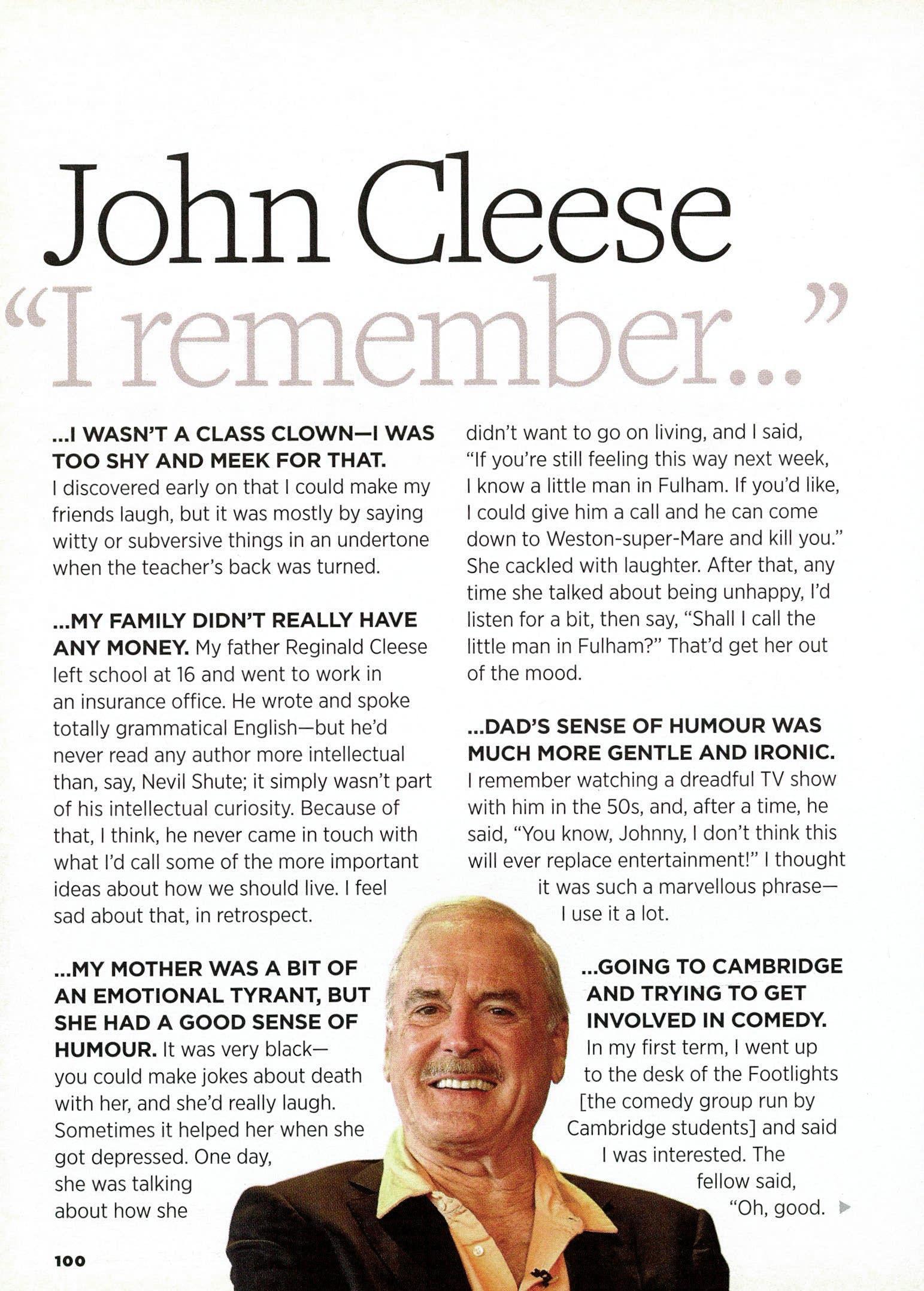
...I WASN'T A CLASS CLOWN—I WAS TOO SHY AND MEEK FOR THAT. I discovered early on that I could make my friends laugh, but it was mostly by saying witty or subversive things in an undertone when the teacher's back was turned.
...MY FAMILY DIDN'T REALLY HAVE ANY MONEY. My father Reginald Cleese left school at 16 and went to work in an insurance office. He wrote and spoke totally grammatical English—but he'd never read any author more intellectual than, say, Nevil Shute; it simply wasn't part of his intellectual curiosity. Because of that, I think, he never came in touch with what I'd call some of the more important ideas about how we should live. I feel sad about that, in retrospect.
...MY MOTHER WAS A BIT OF AN EMOTIONAL TYRANT, BUT SHE HAD A GOOD SENSE OF HUMOUR. It was very black— you could make jokes about death with her, and she'd really laugh. Sometimes it helped her when she got depressed. One day, she was talking about how she
didn't want to go on living, and I said, "If you're still feeling this way next week, I know a little man in Fulham. If you'd like, I could give him a call and he can come down to Weston-super-Mare and kill you." She cackled with laughter. After that, any time she talked about being unhappy, I'd listen for a bit, then say, "Shall I call the little man in Fulham?" That'd get her out of the mood.
...DAD'S SENSE OF HUMOUR WAS MUCH MORE GENTLE AND IRONIC. I remember watching a dreadful TV show with him in the 50s, and, after a time, he said, "You know, Johnny, I don't think this will ever replace entertainment!" I thought it was such a marvellous phrase— I use it a lot.
...GOING TO CAMBRIDGE AND TRYING TO GET INVOLVED IN COMEDY. In my first term, I went up to the desk of the Footlights [the comedy group run by Cambridge students] and said I was interested. The fellow said, "Oh, good. ►
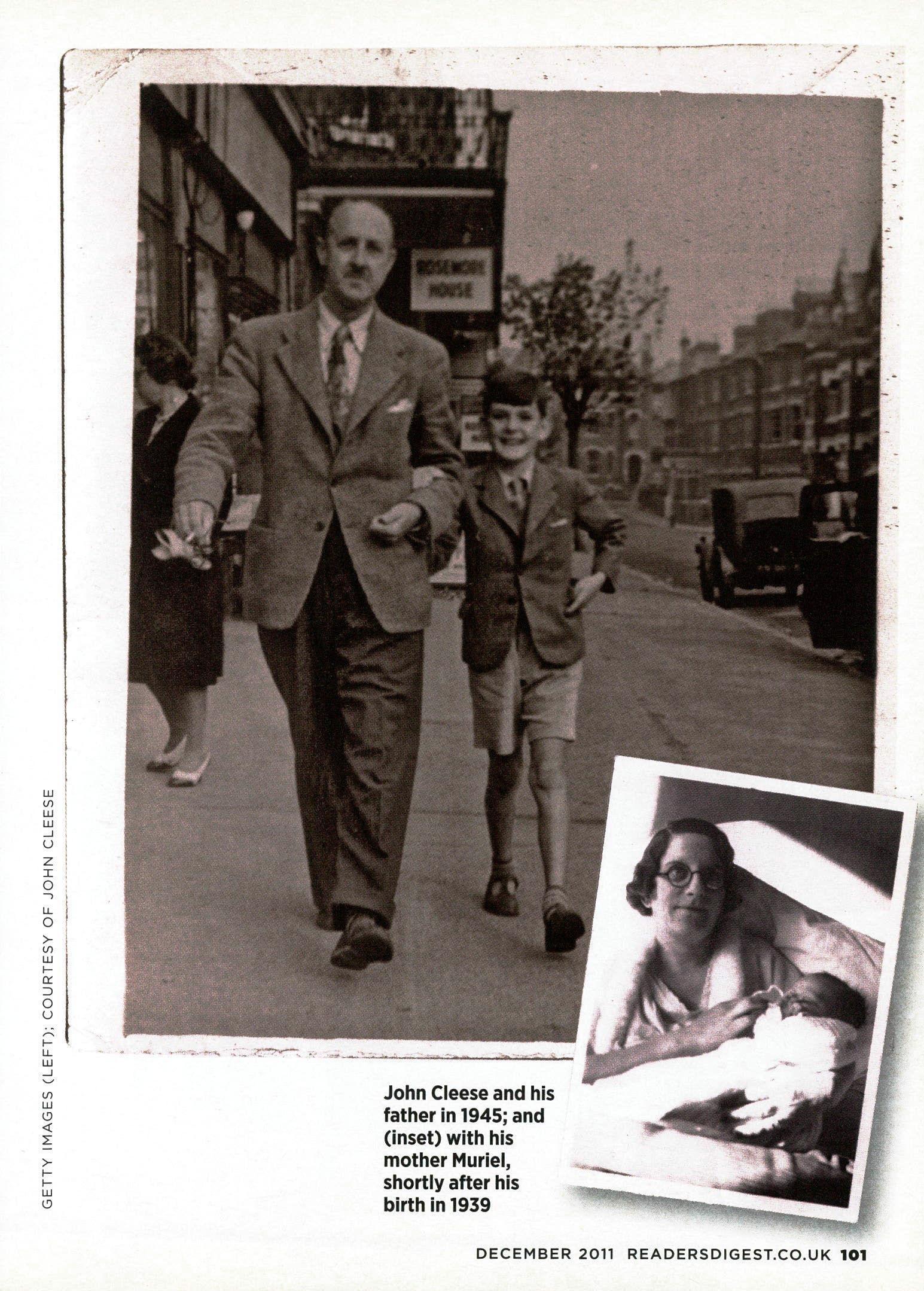
John Cleese and his father in 1945; and (inset) with his mother Muriel, shortly after his birth in 1939
4 Do you sing?" I was astonished to be asked that and replied, "Oh, no, I don't!" "Well, never mind. Do you dance?" he asked, and I said, "No..." "Well what do you do?" he asked. And I went red and replied, "Well, I sometimes sort of try to make people laugh..." Then, I ran off in confusion and embarrassment!
OF A
with whom I wrote and performed a sketch. Funnily enough, he never performed again, whereas I did because I really enjoyed it. They were the most congenial, varied bunch I came across at Cambridge—they were from working-class families as well as upperclass ones. Some were doing history, some were doing sciences, and one or two were doing law, as I was. I never had the slightest thought of doing anything professionally, but they asked me to be in the Footlights Revue in
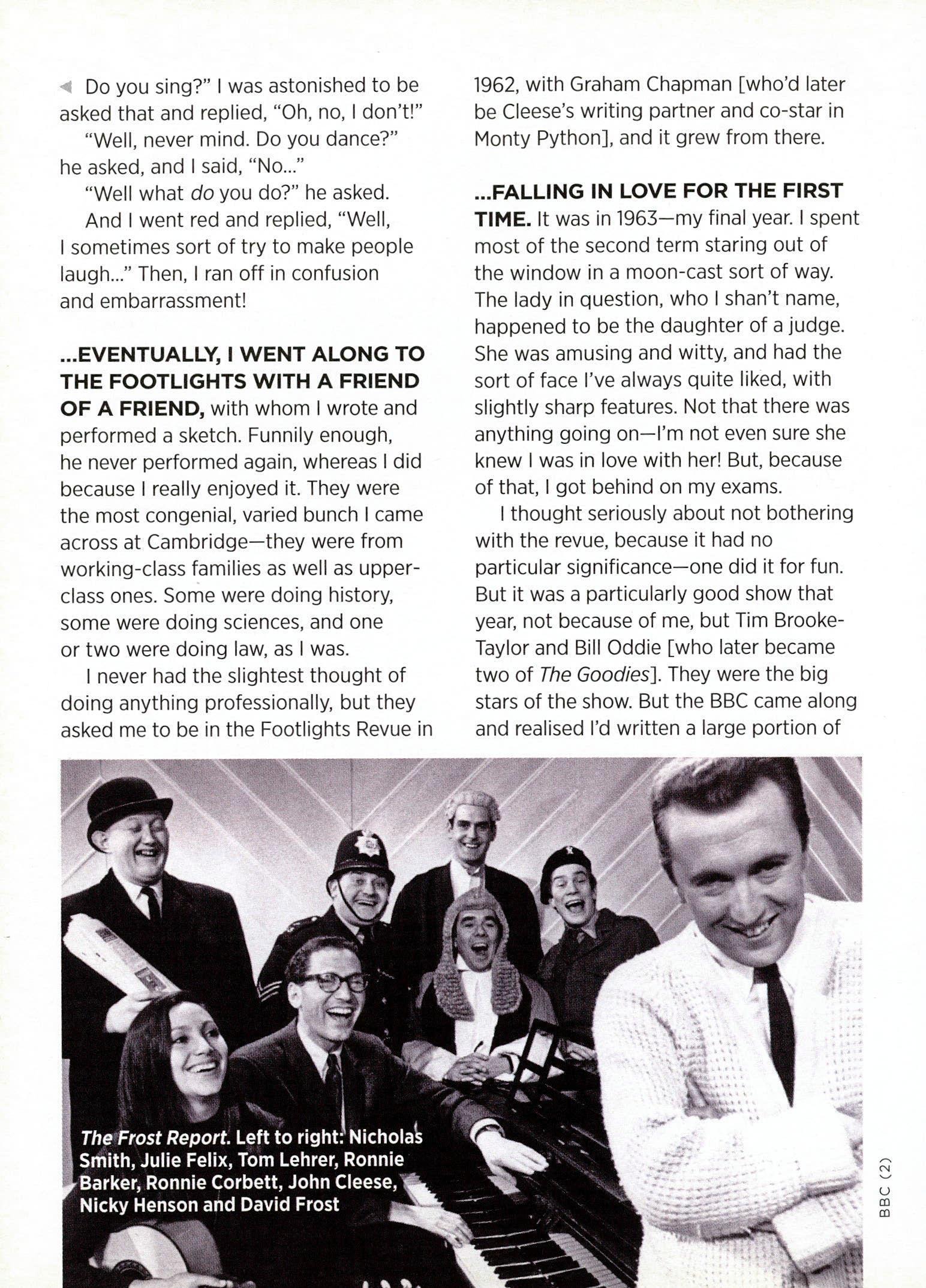
The Frost Report. Left to righjNichola's
1962, with Graham Chapman [who'd later be Cleese's writing partner and co-star in Monty Python], and it grew from there.
TIME. It was in 1963—my final year. I spent most of the second term staring out of the window in a moon-cast sort of way. The lady in question, who I shan't name, happened to be the daughter of a judge. She was amusing and witty, and had the sort of face I've always quite liked, with slightly sharp features. Not that there was anything going on—I'm not even sure she knew I was in love with her! But, because of that, I got behind on my exams.
I thought seriously about not bothering with the revue, because it had no particular significance—one did it for fun. But it was a particularly good show that year, not because of me, but Tim BrookeTaylor and Bill Oddie [who later became two of The Goodies]. They were the big stars of the show. But the BBC came along and realised I'd written a large portion of
Smith, Julie Felix, Tom Lehrer, Ronnie Barker, Ronnie Corbett, John Cleese, Nicky Henson and David Frostwith Pyt in 19

it, so they offered me a job in radio at £30 a week—two-and-a-half times what I was going to earn as a lawyer's clerk. I gave up the law without a second thought!
...I LOST CONTACT WITH MY FATHER TO SOME EXTENT because, as I grew, he didn't entirely want me to—he wanted to go on being my dad and, rather than allow the relationship to become a more equal one, he took every opportunity to give me advice, even when I knew more about the subject than he did. I used to think, Why is he telling me this? He felt more comfortable advising me than he did treating me as an equal.
...WORKING ON THE FROST
David [Frost] plucked me out of obscurity when he asked me to join. He said, "We have two people called Ronnie Barker and Ronnie Corbett, but you won't know who they are"—and I didn't. Ronnie Corbett hadn't been in anything before. Once the show started, it was very popular—we did it to 14 million people every Thursday. Ronnie Barker was an extraordinary character actor—it was wonderful how he could slip into anything from Lord of the Manor to a Bulgarian peasant.
If you fail, you fail in front of a lot of people
...MY RISE TO FAME WAS SUDDEN, BUT ONLY BY BRITISH STANDARDS.
In America, you could go from being nothing to famous very rapidly indeed, and I think that's why so many US stars go a little odd—particularly if they take it seriously, which one must never do! In Britain, the process of becoming famous is gradual, so you habituate to it more easily. In the beginning, I could sometimes feel my heart swell with a sort of egotistical pride when I was recognised; but you rapidly realise there's a considerable downside to it. Once you're well known, there are expectations of you.
MONTY
Its manifestation was that I seemed to be suffering from low-grade flu symptoms all the time, especially in the winter. I felt the aspect of suddenly becoming a public figure much more than before, and it carried lots of negatives with it—I wasn't comfortable in interviews in those days and, although the press was betterbehaved than it is now, I still found it intrusive. Part of the problem with doing a job like that is that it's highly stressful—if you fail, you fail in front of a lot of people.
...I ENJOYED MAKING LIFE OF BRIAN MOST OUT OF THE MONTY PYTHON FILMS. We were shooting in
Tunisia and rose in the mornings as the sun was coming up. You could get wonderful fresh fruit for breakfast and drink coffee—it was as though we shot the whole thing on a beautiful spring day.
We were on good form—especially Michael Palin. Terry Jones did a particularly good job of directing. We always felt he and assistant director Jonathan Benson knew what they were doing —so all we had to do was to turn up and be funny!
But when we did The Meaning of Life in 1982, _44 I never really enjoyed it .*,k
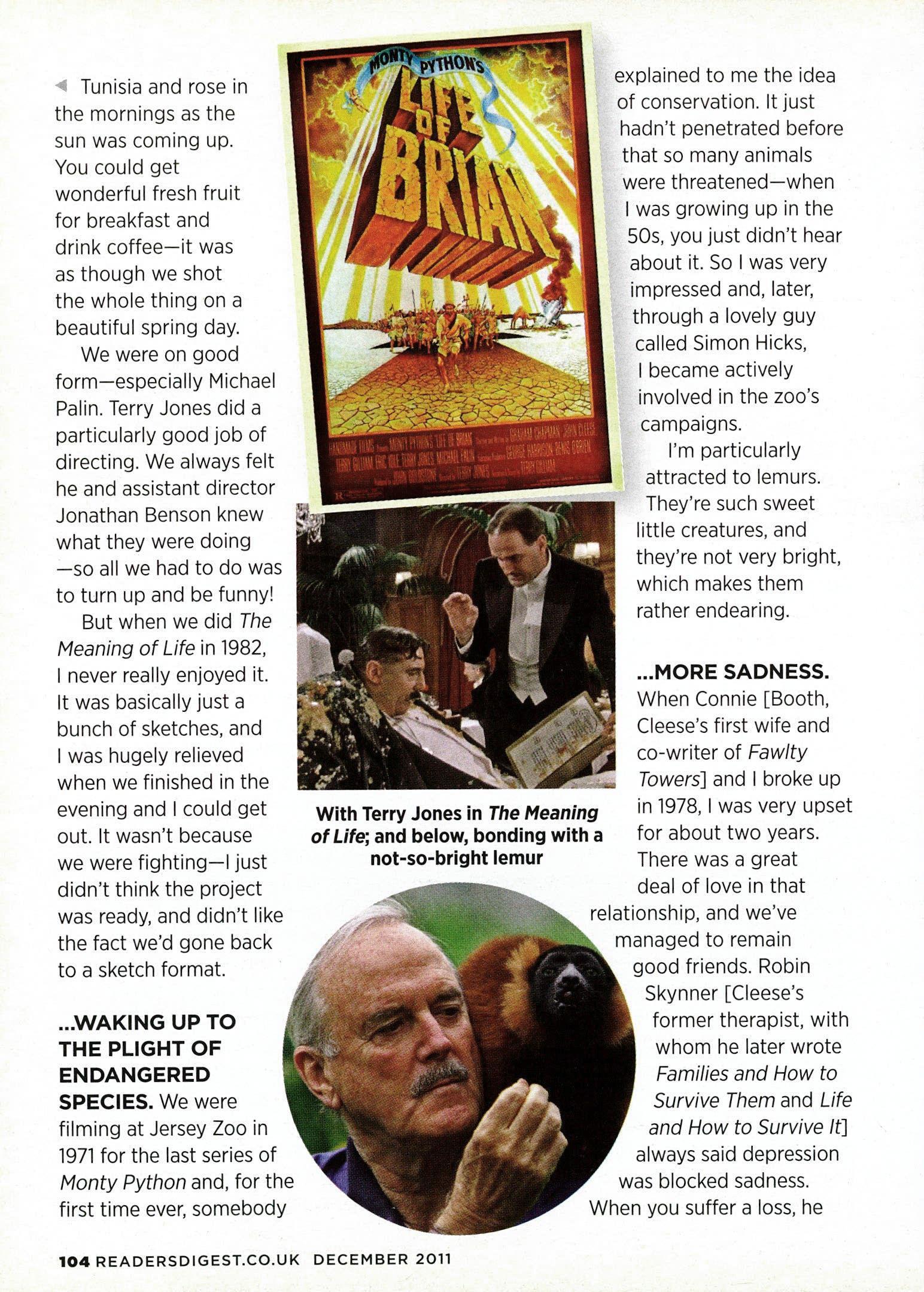
explained to me the idea of conservation. It just hadn't penetrated before that so many animals were threatened—when I was growing up in the 50s, you just didn't hear about it. So I was very impressed and, later, through a lovely guy called Simon Hicks, I became actively involved in the zoo's campaigns.
I'm particularly attracted to lemurs. They're such sweet little creatures, and they're not very bright, which makes them rather endearing.
...MORE SADNESS. It was basically just a 1;4
When Connie [Booth, bunch of sketches, and Cleese's first wife and I was hugely relieved co-writer of Fawlty when we finished in the Towers] and I broke up evening and I could get
With Terry Jones in The Meaning in 1978, I was very upset out. It wasn't because of Life; and below, bonding with a for about two years. we were fighting—I just not-so-bright lemur
There was a great didn't think the project deal of love in that was ready, and didn't like relationship, and we've the fact we'd gone back managed to remain to a sketch format. good friends. Robin Skynner [Cleese's
...WAKING UP TO former therapist, with THE PLIGHT OF whom he later wrote ENDANGERED Families and How to SPECIES. We were Survive Them and Life filming at Jersey Zoo in and How to Survive It] 1971 for the last series of always said depression Monty Python and, for the was blocked sadness. first time ever, somebody When you suffer a loss, he
At a Fawity Towers reunion in 2009, with Connie Booth (centre), Prunella Scales and Andrew Sachs
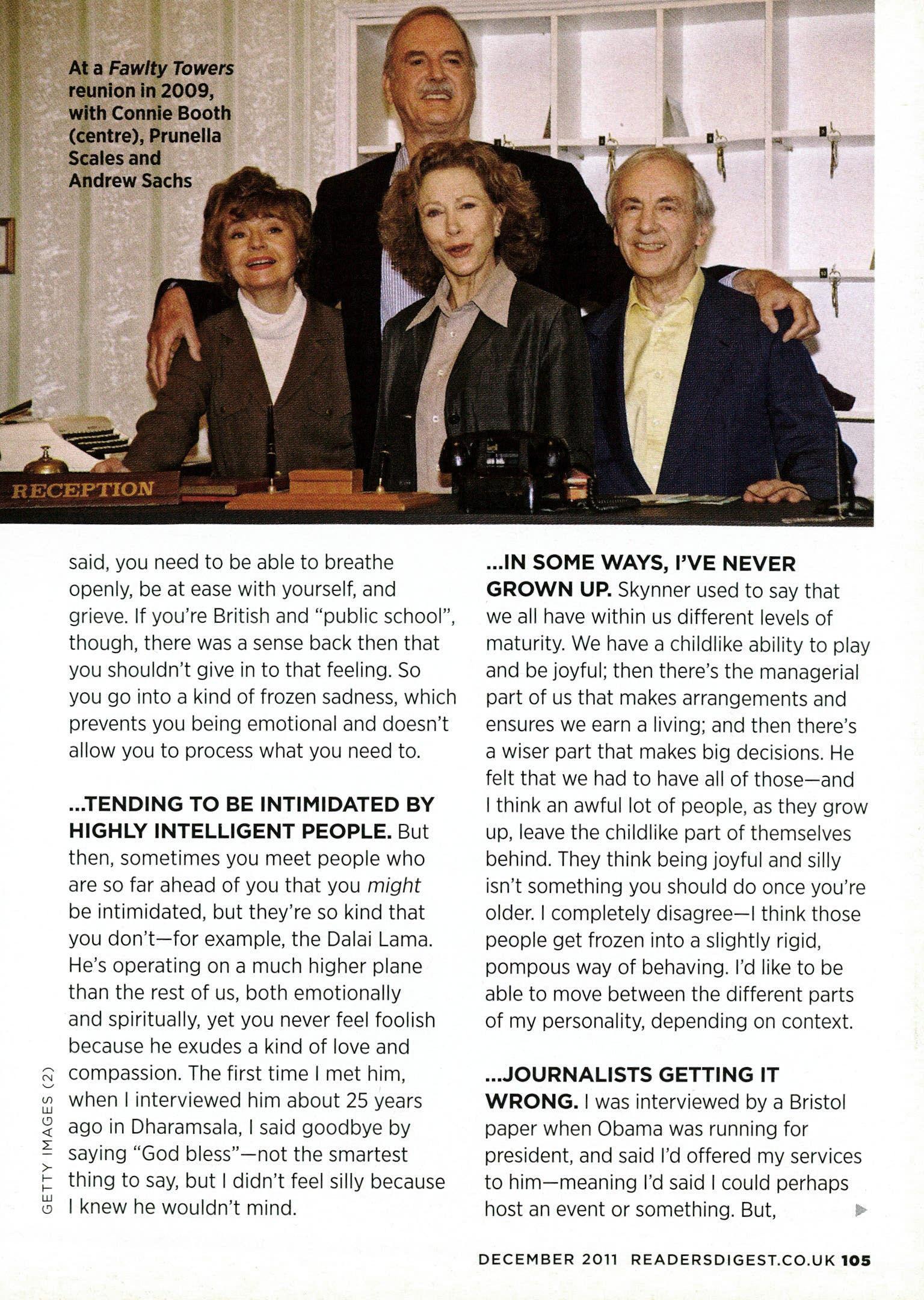
said, you need to be able to breathe openly, be at ease with yourself, and grieve. If you're British and "public school", though, there was a sense back then that you shouldn't give in to that feeling. So you go into a kind of frozen sadness, which prevents you being emotional and doesn't allow you to process what you need to.
HIGHLY
PEOPLE. But then, sometimes you meet people who are so far ahead of you that you might be intimidated, but they're so kind that you don't—for example, the Dalai Lama. He's operating on a much higher plane than the rest of us, both emotionally and spiritually, yet you never feel foolish because he exudes a kind of love and compassion. The first time I met him, when I interviewed him about 25 years ago in Dharamsala, I said goodbye by saying "God bless"—not the smartest thing to say, but I didn't feel silly because I knew he wouldn't mind.
Skynner used to say that we all have within us different levels of maturity. We have a childlike ability to play and be joyful; then there's the managerial part of us that makes arrangements and ensures we earn a living; and then there's a wiser part that makes big decisions. He felt that we had to have all of those—and I think an awful lot of people, as they grow up, leave the childlike part of themselves behind. They think being joyful and silly isn't something you should do once you're older. I completely disagree—I think those people get frozen into a slightly rigid, pompous way of behaving. I'd like to be able to move between the different parts of my personality, depending on context.
WRONG. I was interviewed by a Bristol paper when Obama was running for president, and said I'd offered my services to him—meaning I'd said I could perhaps host an event or something. But,
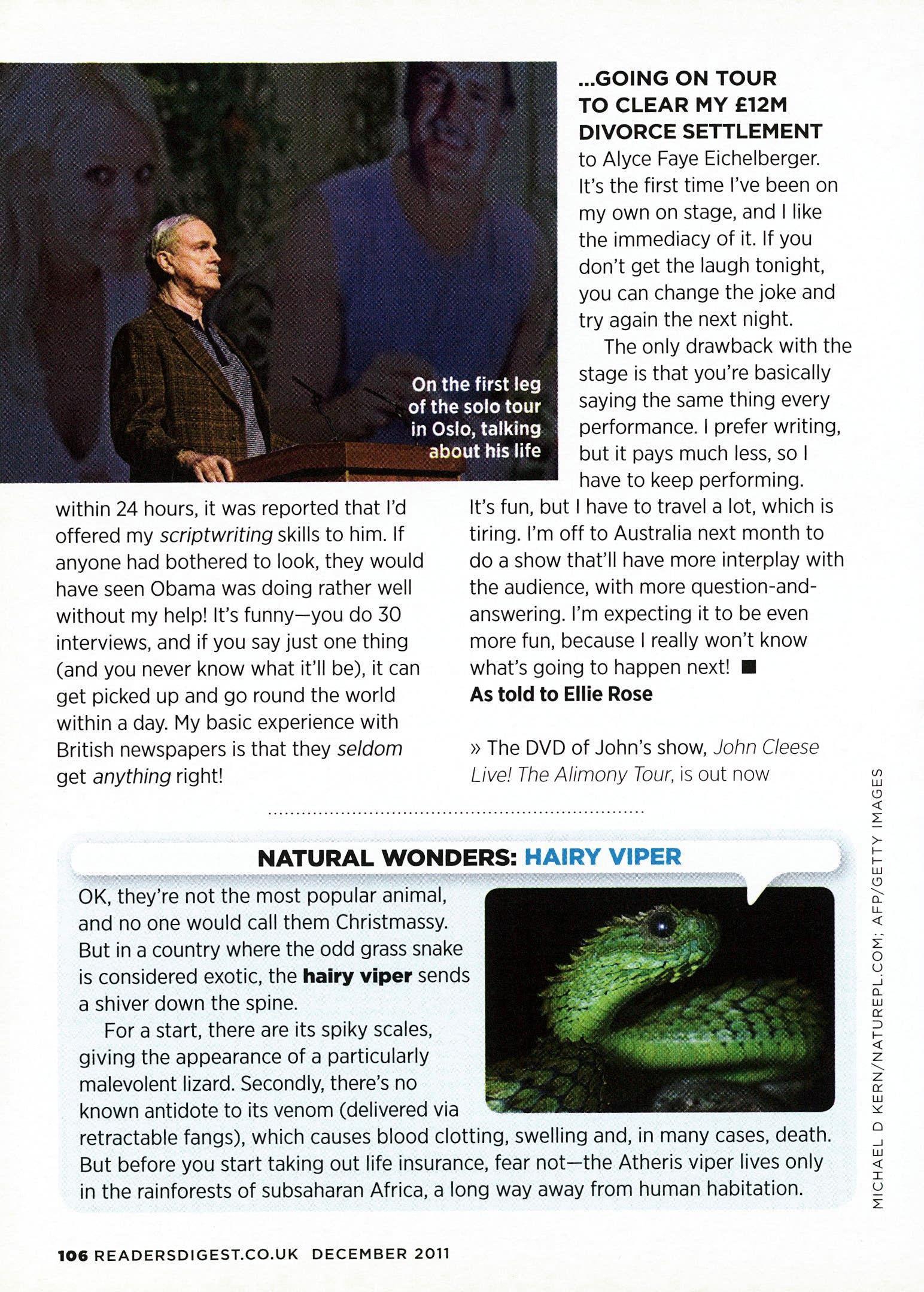
On the first leg of the solo tour in Oslo, talking about his life
to Alyce Faye Eichelberger. It's the first time I've been on my own on stage, and I like the immediacy of it. If you don't get the laugh tonight, you can change the joke and try again the next night.
The only drawback with the stage is that you're basically saying the same thing every performance. I prefer writing, but it pays much less, so I have to keep performing. It's fun, but I have to travel a lot, which is tiring. I'm off to Australia next month to do a show that'll have more interplay with the audience, with more question-andanswering. I'm expecting it to be even more fun, because I really won't know what's going to happen next! ■
As told to Ellie Rose
within 24 hours, it was reported that I'd offered my scriptwriting skills to him. If anyone had bothered to look, they would have seen Obama was doing rather well without my help! It's funny—you do 30 interviews, and if you say just one thing (and you never know what it'll be), it can get picked up and go round the world within a day. My basic experience with British newspapers is that they seldom » The DVD of John's show, John Cleese get anything right! Live! The Alimony Tour, is out now
OK, they're not the most popular animal, and no one would call them Christmassy. But in a country where the odd grass snake is considered exotic, the hairy viper sends a shiver down the spine.
For a start, there are its spiky scales, giving the appearance of a particularly malevolent lizard. Secondly, there's no known antidote to its venom (delivered via retractable fangs), which causes blood clotting, swelling and, in many cases, death. But before you start taking out life insurance, fear not—the Atheris viper lives only in the rainforests of subsaharan Africa, a long way away from human habitation.
Simply place your record (33.3, 45, or 78 rpm) on to the turntable or cassette into the tape player, insert a blank CD into the built-in CD burner, hit the record button and let Neostar Viny12CD transfer vinyl or tape to CD - listen to the CD in-car, at home, on your computer, or anywhere with a standard CD player. You can even connect any external audio player (e.g. CD player, MP3 player/iPod, 8-track recorder, reel-to-reel player etc) to Vinyl2CD using the 'aux-in' input connections (lead supplied) for transferring your other music collections direct to CD, or for making copies of your existing CDs!
PLUS You also have the option to connect Vinyl2CD to a PC or Mac via the USB lead (supplied) for instant transfer of your recordings to your computer. Includes FREE 'Audacity' software for editing and labelling. Finally, connect Neostar Vinyl2CD ,1111111.11.11 to your home stereo system and use as a normal turntable/CD/tape player! Supplied Black with a quality stylus worth £12.95, Vinyl2CD can also be purchased with an additional stylus for just an extra £9.95.
A specialist 78 stylus costs just £12.95 and pack of 10 recordable CDs are just £6.95.
Mick Hulett, Sleaford
oneosear
• Belt-drive turntable with premium tonearm and cartridge
• 33.3, 45 and 78rpm • Built in CD Burner records directly from turntable or cassette tape' Built in track split feature • Aux-in and line-out jacks for complete connectivity
Step 1: Step 2:„r-, s.!-`”) Step 3:
Place vinyl/ Insert blank ' Press Play tape on to CD into and record ,..._ turntable/ built-in and enjoy tape carrier CD burner your new CD
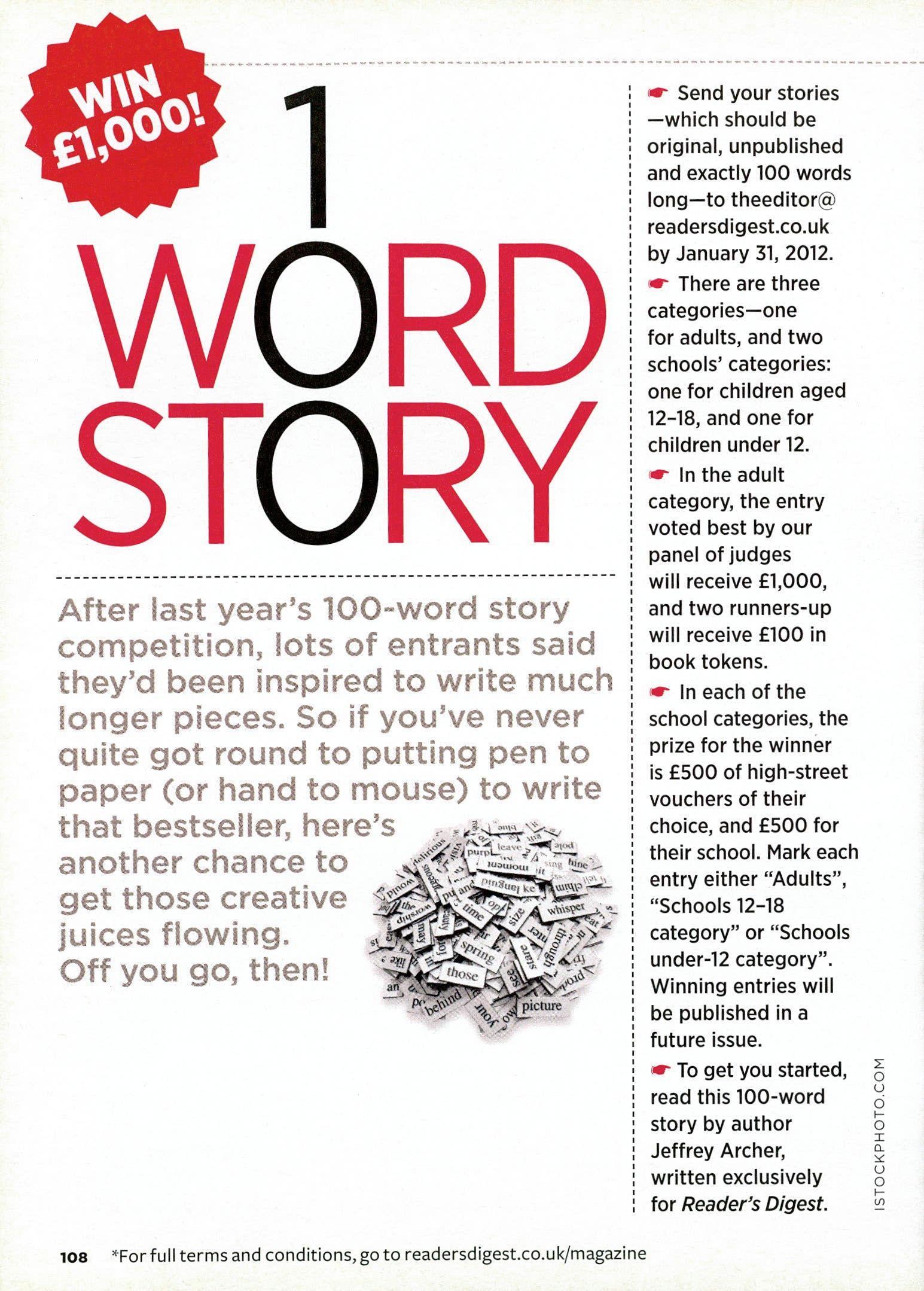
After last year's 100-word story competition, lots of entrants said they'd been inspired to write much longer pieces. So if you've never quite got round to putting pen to paper (or hand to mouse) to write that bestseller, here's another chance to get those creative juices flowing. Off you go, then!
e- Send your stories —which should be original, unpublished and exactly 100 words long—to theeditor@ readersdigest.co.uk by January 31,2012.
vir There are three categories—one for adults, and two schools' categories: one for children aged 12-18, and one for children under 12.
•- In the adult category, the entry voted best by our panel of judges will receive £1,000, and two runners-up will receive £100 in book tokens.
a- In each of the school categories, the prize for the winner is £500 of high-street vouchers of their choice, and £500 for their school. Mark each entry either "Adults", "Schools 12-18 category" or "Schools under-12 category". Winning entries will be published in a future issue.
Ir To get you started, read this 100-word story by author Jeffrey Archer, written exclusively 0 for Reader's Digest.
Paris, March 14, 1921
The collector relit his cigar, picked up the magnifying glass, and studied the triangular 1874 Cape of Good Hope.
"I did warn you there were two," said the dealer, "so yours is not unique."
"How much?"
"Ten thousand francs."
The collector wrote out a cheque, before taking a puff on his cigar, but it was no longer alight. He picked up a match, struck it, and set light to the stamp.
The dealer stared in disbelief as the stamp went up in smoke.
The collector smiled. "You were wrong, my friend," he said, "mine is unique." ■
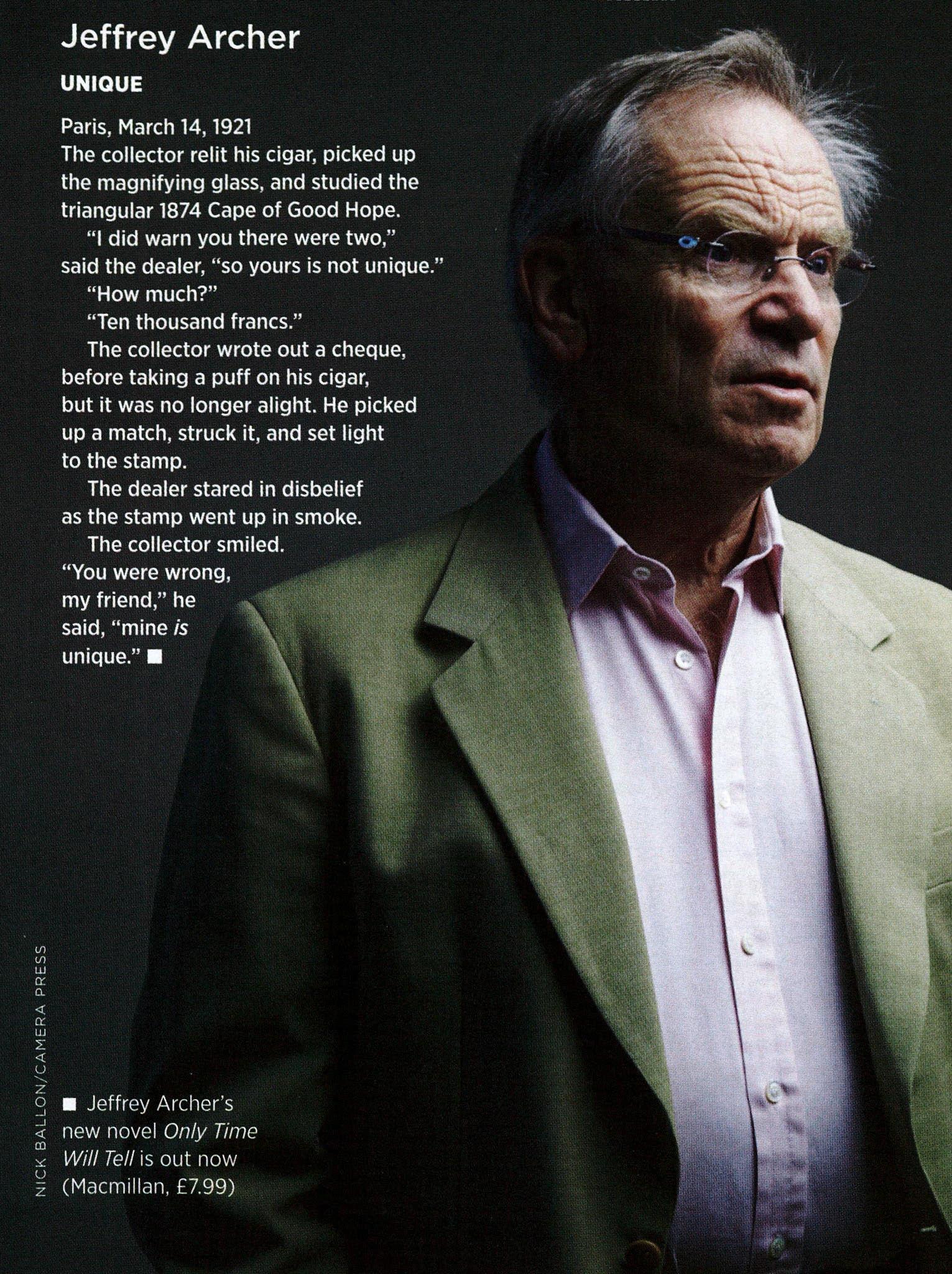
■ Jeffrey Archer's new novel Only Time Will Tell is out now (Macmillan, £7.99)
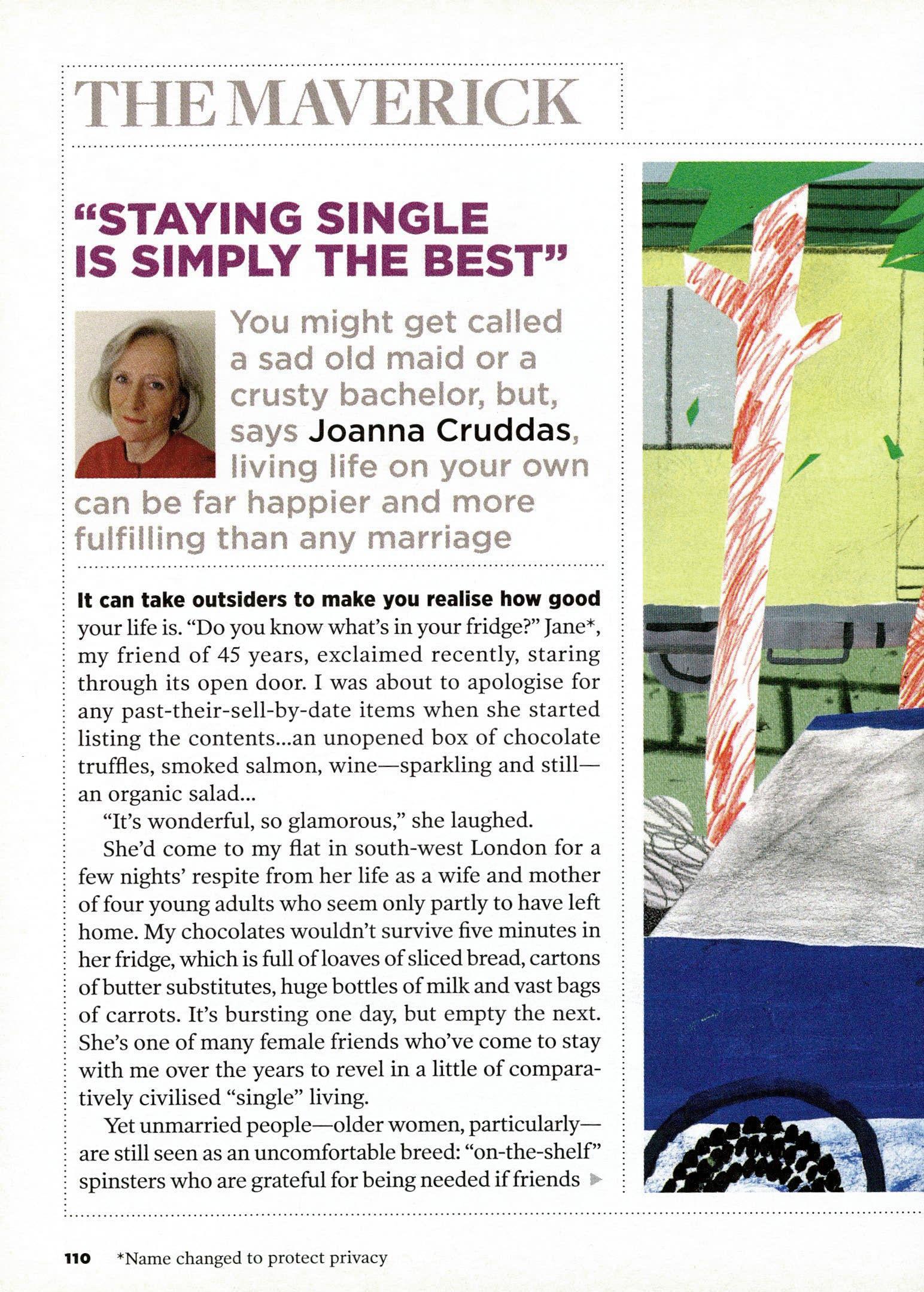
You might get called a sad old maid or a crusty bachelor, but, says Joanna Cruddas, living life on your own can be far happier and more fulfilling than any marriage
It can take outsiders to make you realise how good your life is. "Do you know what's in your fridge?" Jane*, my friend of 45 years, exclaimed recently, staring through its open door. I was about to apologise for any past-their-sell-by-date items when she started listing the contents...an unopened box of chocolate truffles, smoked salmon, wine—sparkling and still— an organic salad...
"It's wonderful, so glamorous," she laughed.
She'd come to my flat in south-west London for a few nights' respite from her life as a wife and mother of four young adults who seem only partly to have left home. My chocolates wouldn't survive five minutes in her fridge, which is full of loaves of sliced bread, cartons of butter substitutes, huge bottles of milk and vast bags of carrots. It's bursting one day, but empty the next. She's one of many female friends who've come to stay with me over the years to revel in a little of comparatively civilised "single" living.
Yet unmarried people—older women, particularly— are still seen as an uncomfortable breed: "on-the-shelf" spinsters who are grateful for being needed if friends ■

have a childcare crisis, but make the numbers uneven at dinner parties.
Despite a few serious relationships and the odd broken heart, I've known I would stay single since the mid1960s, when I was 14. But I've still had to put up with numerous comments about my status, ranging from the outrageous—"Has
and periods of quality time, trips to the cinema that may or may not lead to a walk or supper afterwards. We swing with the moment, enabling our relationships to run deep and reach an intimacy not complicated by sex. Our friends are chosen for who they are, not because we have children of similar age or are someone's appendit occurred to you that you aren't married because you're too selfish to make the commitment?"
—to my godmother's lament, as her health deteriorated in the late Nineties, "It's sad you never found anyone."
Sad for whom?
Staying single is a great way to live for me and many, many people— and the world would be a much poorer place without us
Of course, some people need to marry and have children to provide a new generation and—a small minority, I'd say—never look back. But I believe that staying single is a great way to live for me and many, many people—and the world would be a much poorer place without us.
As my late friend Oliver, an unmarried businessman, pointed out, we "singles" form an exclusive club. We may not be related, but we have a common understanding and a sense of loyalty to each other that's comparable to, or greater than, any family. We support each other 24/7. Our friendships are not competing with partners and children. We can offer each other regular lengthy conversations

age. Best of all, these relationships do not expect monogamy, and we may have five or six of the closest friendships—with people from the same or opposite sex—so our every interest can be fulfilled.
Unlike my married acquaintances, our relationships aren't strained by the niggles of daily sharing. There's no tautness of lips as incompetent cutting massacres another loaf of bread, no teasing that's acquired undertones with the years, no evenings ruined over the choice of a TV programme—small matters that create an atmosphere and, eventually, build mountainous stress.
"Don't you feel you've missed out, being alone?" one of my closest friends, whose marriage has been a turbulent mystery to many of us for decades, asked me recently. Of course, to be single is to miss out on one level—but then so is never having seen the aurora borealis or the Grand Canyon. Everyone has missed out on something, but you
compensate and find other bonuses or ways of being.
The same friend frets that her kids may never find partners. But, rather than leave them unsatisfied, that independence could be liberating. Single people's characters aren't diluted as we absorb bits of our partner's personality and lose edges of our own. Our careers aren't in constant conflict with the demands of family life, and we don't struggle with guilt as we palm off our children to nurseries. Where we live, how we live and what we make of our lives must be self-created. It may not be easy, but it's exciting.
Is single th new mar ried?
by short-term sharing. Do I spoil them, play at parenting, then send them packing? Possibly—but I see it as being able to show them a different way of living.
Join the d ebate at facebook.comfreaders digestuk o r email readersle tters a readersd igest. co.0 k
Earlier this year, my married friend Tony* and I met for a coffee. He arrived, knuckles white with tension. "I dread Christmas from the moment the last one is over," he snapped.

Perhaps because I was the youngest member of my family, I've never had a maternal instinct. Yet, for me, the icing on my single's cake is the relationship I have with my nephews, nieces and close friends' children. My role is somewhere between parent and sibling. I offer the safeness of maturity, but I'm not quite "establishment" in the way mums can seem to their young. I know the one-on-one time and space I can give is a luxury to people who are used to competing for attention at home. We exchange confidences and are enriched
He had several months of negotiations ahead before his festive arrangements were sorted out, he explained, and his mind was a tangle of in-laws and geographical logistics. I usually start planning my Christmas about now, and I know it won't involve driving miles to risk other people's lumpy pillows and chaotic breakfasts for the sake of waking up in a full house because kind friends think I shouldn't be on my own.
Being alone isn't being lonely. I love Christmas in London, when the city changes pace. As for the big day, I'll most likely have a lazy start, a church service with lots of music, then a lengthy lunch with a couple of friends in one or other of our homes.
Or, who knows, I might just do something completely different. ■
I suppose we all have opinions on what the "ideal" Christmas present is, but I thought this was pushing it a bit.
Submitted by Glenn Braley, Poole, Dorset
Why settle for a run-of-the-mill festive season, when it's so easy to make it extraspecial—if you just know where to look, that
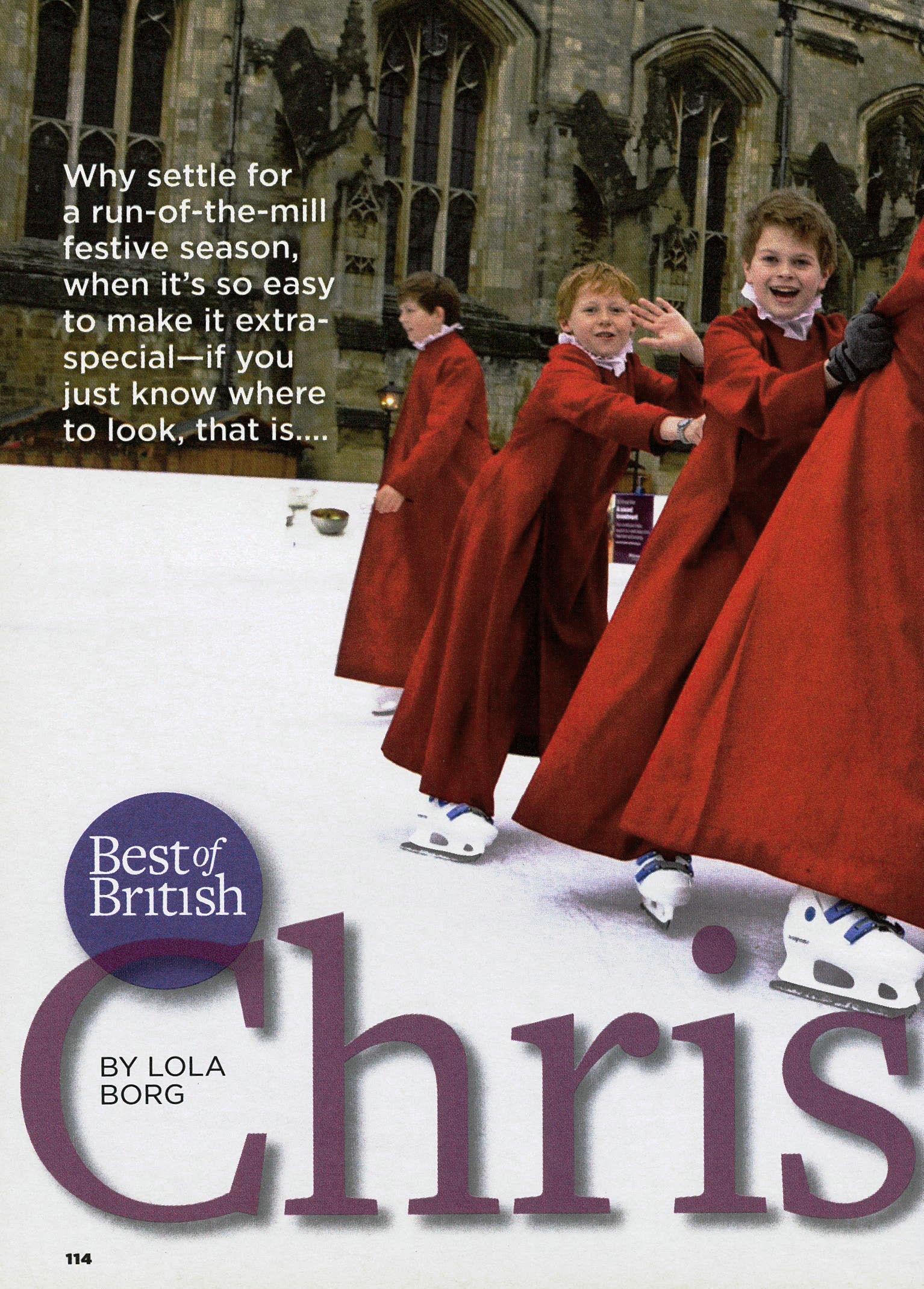 BY LOLA BORG
BY LOLA BORG
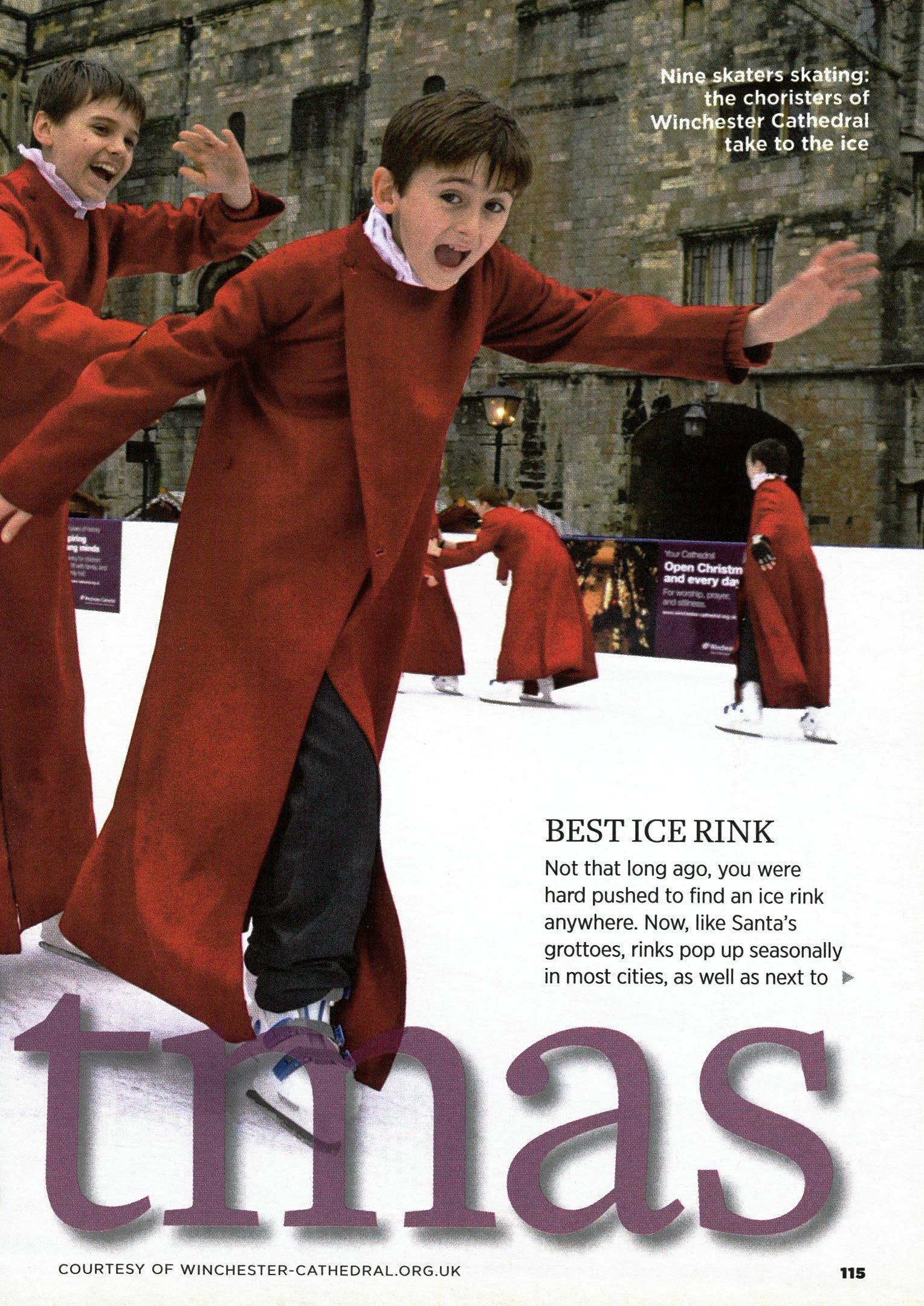
Not that long ago, you were hard pushed to find an ice rink anywhere. Now, like Santa's grottoes, rinks pop up seasonally in most cities, as well as next to
tourist attractions (eg, Hampton Court and the Eden Project). In London, it's hard to beat the neoclassical backdrop of the
A bright idea (pun intended) that's now a regular fixture of WestCountry life. Simply make a paper lantern, light it, and parade the streets of a dark and wintry Salisbury—along with a few thousand others—finishing up at the beautiful medieval cathedral. The Wilton Brass Band plays carols and the procession ends with the traditional sticky buns for all.
The Lantern Parade takes place in Salisbury, Wiltshire, on December 15
Somerset House rink for sheer urban elegance, especially in those precious days when the city is largely deserted. Outside the capital, the vote goes to Winchester (previous page). There, the rink is bang outside the Cathedral, so skaters glide in the shadow of the 1,400-year-old site of
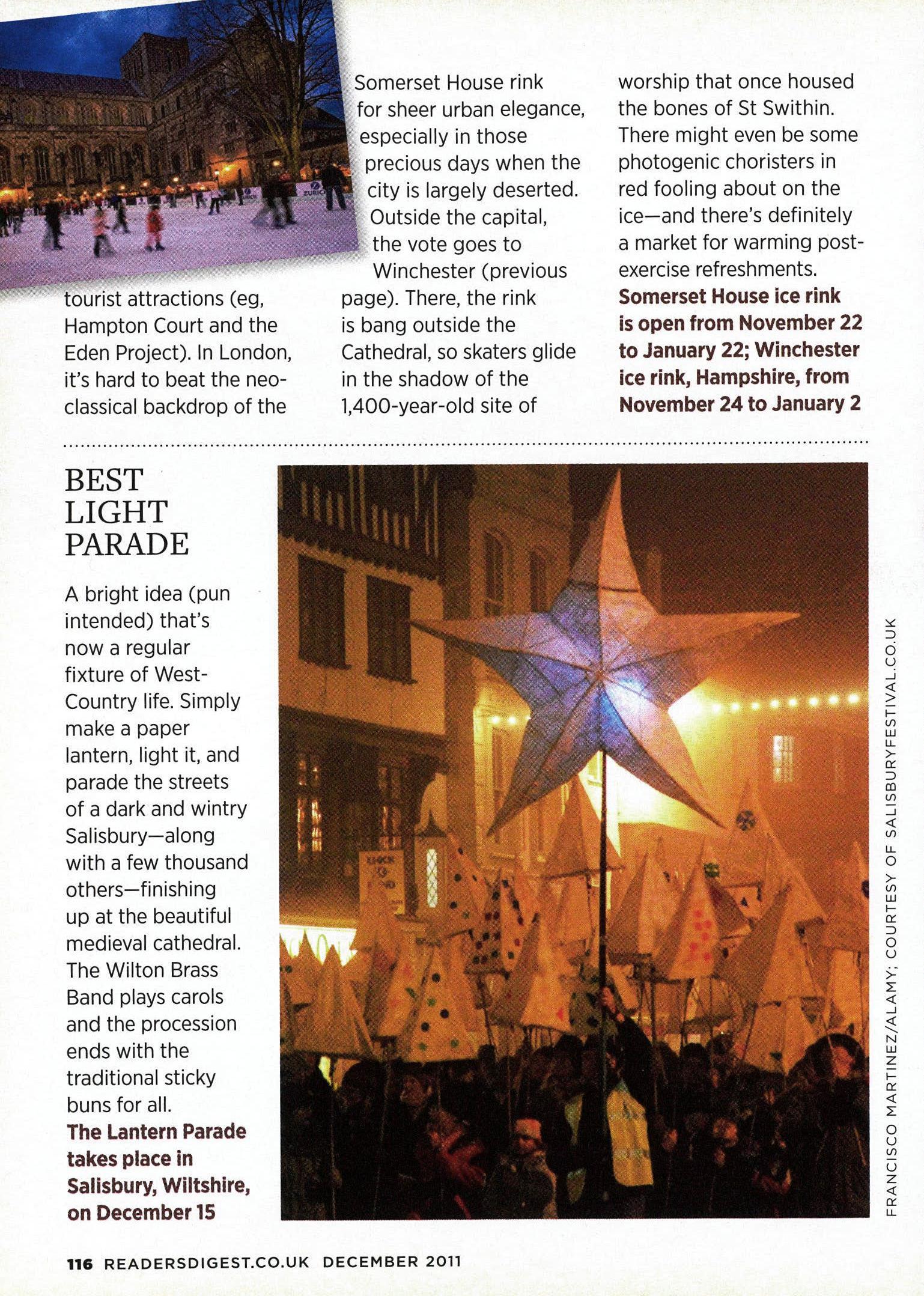
worship that once housed the bones of St Swithin. There might even be some photogenic choristers in red fooling about on the ice—and there's definitely a market for warming postexercise refreshments.
Somerset House ice rink is open from November 22 to January 22; Winchester ice rink, Hampshire, from November 24 to January 2
The place in Britain where you're most likely to find the white stuff is the Cairngorms in the Scottish Highlands. The mountains feature the highest, coldest plateaux in Britain—and have an actual "alpine" climate. Naturally, winter walking and skiing are popular Cairngorm activities, but to really get you into the Christmas spirit there's also the UK's only free-roaming reindeer herd at the Cairngorm Reindeer Centre in Aviemore. (Children can leave a letter in the reindeer postbox.) The Sleddog Centre, also in Aviemore, runs courses that culminate in a solo sled trip through the snow.
For demanding types who want snow south of the border, the Met Office's advice is to head for Upper Teesdale in the North Pennines, just north of Barnard Castle, a beautiful area of hills and crags.
So this is what it's like to be Santa! Feeling the chill at the Cairngorm Sleddog Centre

A German import (they first appeared in 15th-century Dresden), Christmas markets have recently become all the rage. The original— and many think the best—is Lincoln (above), which has been pulling in punters for 29 years now. More than 250 stalls are crammed into the historic Castle Square, between the Gothic cathedral and the Norman castle, so it wins hands down for magical seasonal atmosphere. Expect cobbled streets and all the trimmings: carols, stalls strung with lights and plenty of local produce, including Lincolnshire cheese and sausages. But be warned—it's hilly, so go easy on the mulled wine, or use the Park-and-Ride Service to get bussed into the heart of the area. Lincoln Market runs from December 1 to 4 t.
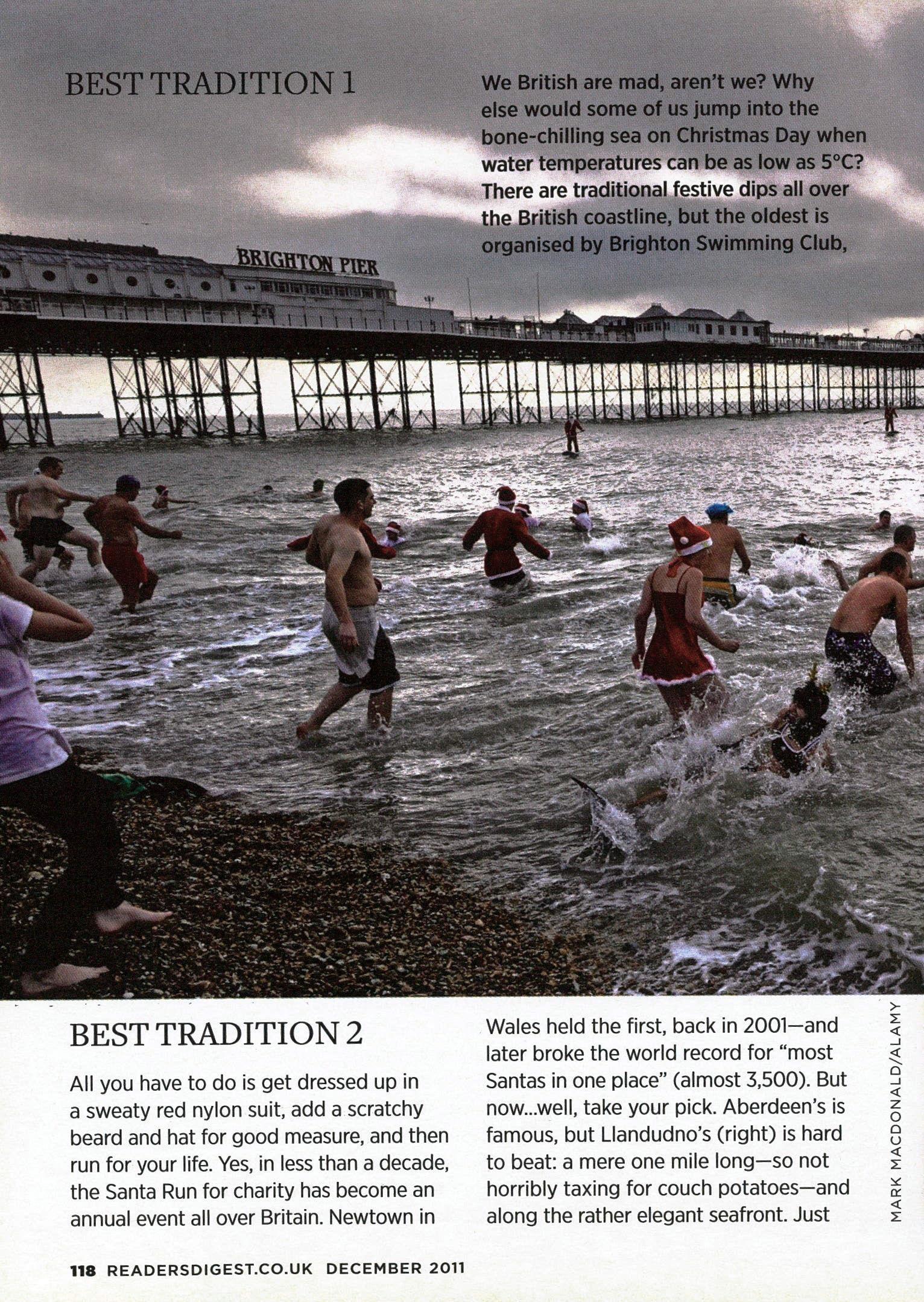
All you have to do is get dressed up in a sweaty red nylon suit, add a scratchy beard and hat for good measure, and then run for your life. Yes, in less than a decade, the Santa Run for charity has become an annual event all over Britain. Newtown in
We British are mad, aren't we? Why else would some of us jump into the bone-chilling sea on Christmas Day when water temperatures can be as low as 5°C? There are traditional festive dips all over the British coastline, but the oldest is organised by Brighton Swimming Club,
Wales held the first, back in 2001—and later broke the world record for "most Santas in one place" (almost 3,500). But now...well, take your pick. Aberdeen's is famous, but Llandudno's (right) is hard to beat: a mere one mile long—so not horribly taxing for couch potatoes—and along the rather elegant seafront. Just
whose members have been taking the plunge since 1895. They won't invite you to join them in the briny, though unless you 're a member, too. "We advise people not to go in," says BSC chairman John Ottaway. Many people are not used to such cold water." But should you decide
to jump, well, no one can stop you. Not even the coastguards. Most take the easier option and watch. All welcome (Santa hats optional).
The Brighton Swimming Club Christmas Day swim is at 11am near the Palace Pier on Brighton beach, Sussex
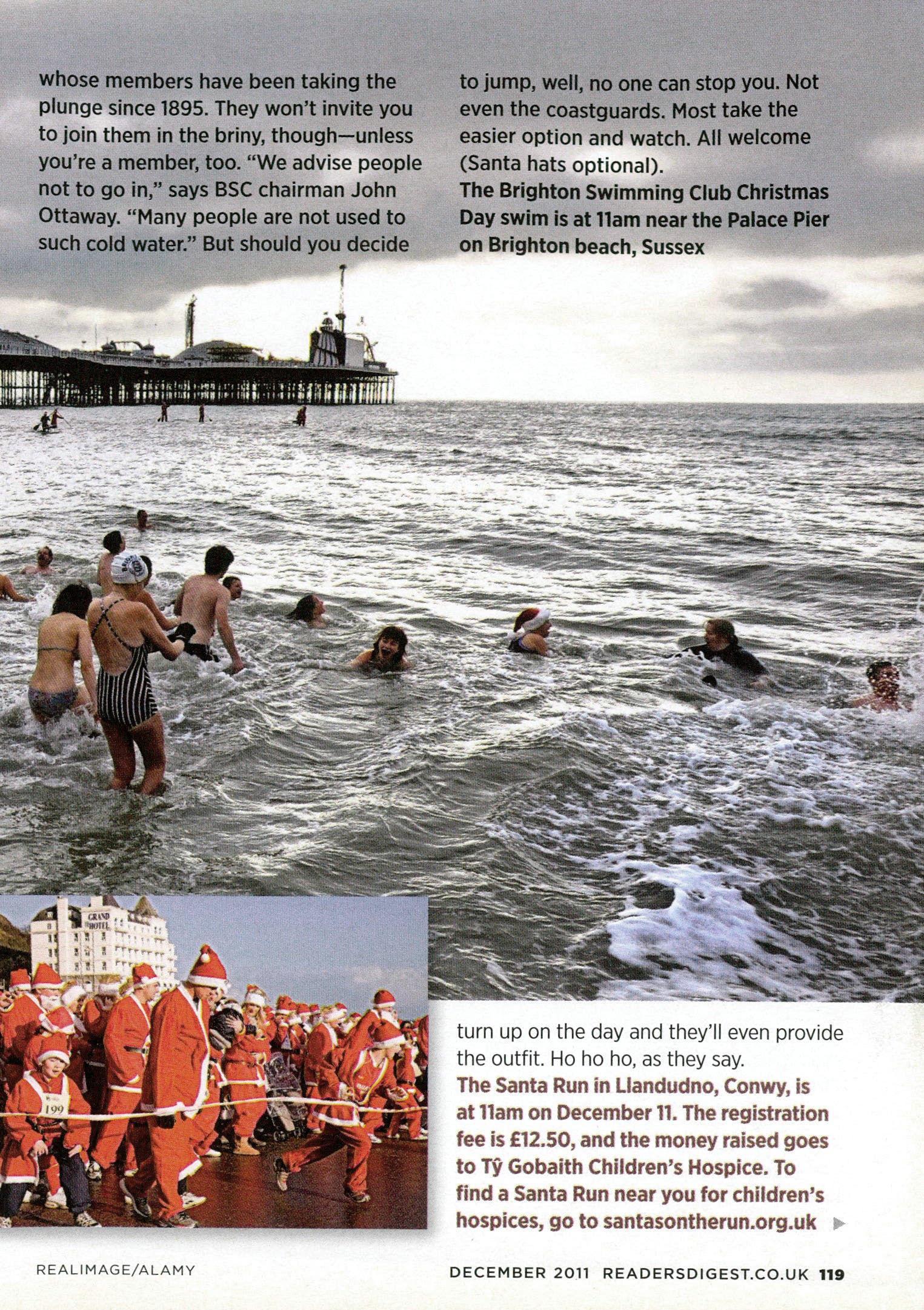
turn up on the day and they'll even provide the outfit. Ho ho ho, as they say.
The Santa Run in Llandudno, Conwy, is at 11am on December 11. The registration fee is £12.50, and the money raised goes to T9 Gobaith Children's Hospice. To find a Santa Run near you for children's hospices, go to santasontherun.org.uk ►
The spruce in Trafalgar Square donated by the Norwegians is always a crowd-puller. But for something different (and more ecofriendly), it has to be Wakehurst Place, Kew Gardens' country estate, which can brag of Britain's largest living Christmas tree (above). At 115 feet—and strung with nearly 2,000 lights (all eco-friendly, too)—the tree is even a seasonal landmark for pilots flying into nearby Gatwick. The lighting-up ceremony is always popular, and there's also an open-air carol service led by a Salvation Army band and local choirs. But if you can't make those, the tree still looks spectacular from the main road.
The lighting-up ceremony at Wakehurst Place, Haywards Heath, West Sussex, is on November 25 at 6.15pm; the carol service is on December 16 at 7pm. Both are entry by donation

Forget mouldy chocolates in cheap cardboard. Welwyn in Hertfordshire— not to be confused with Welwyn Garden City— produces a real advent calendar using windows in the village with displays lovingly made by residents. (One year a local graffiti artist decorated the window of The Sagar Tandoori, but the organisers, St Mary's Church, got a little wibbly at his representation of the baby Jesus as a tiger. He changed it.) There's a daily unveiling, usually with refreshments: "We consume a massive amount of mulled wine and mince pies in December," says Jane Carr, St Mary's churchwarden. Those who can't make it to Welwyn can view the windows at welwynadventwindows.com.
Gentler, sweeter and altogether more in the spirit of Christmas than Oxford Street, the tiny fishing village of Mousehole in Cornwall is the place for spectacular lights. Each year since 1963, they've twinkled merrily around the pretty harbour. Look out for Christmas trees, whales, Celtic crosses and the local Starry Gazey pie (a fish dish traditionally eaten on December 23—and so called because the fishes' heads poke out of the pastry and seem to be looking upwards) all fashioned out of bulbs. The switching-on ceremony is mercifully without a soap star in a starring role, but instead features community singing and the Mousehole Male Voice Choir. It also attracts vast crowds—so go early. ■ The Mousehole Harbour Lights will be switched on at 7.30pm on December 17
If you have a better slice of British Christmas than the ones mentioned here, why not let us know? Send us an email—with a picture if possible —to theeditor@ readersdigest.co.uk.
There are more seasonal suggestions —and other pickings from our Best of British series—at readersdigest.co. uk/magazine, and also on Facebook at facebook.com/ readersdigestuk.


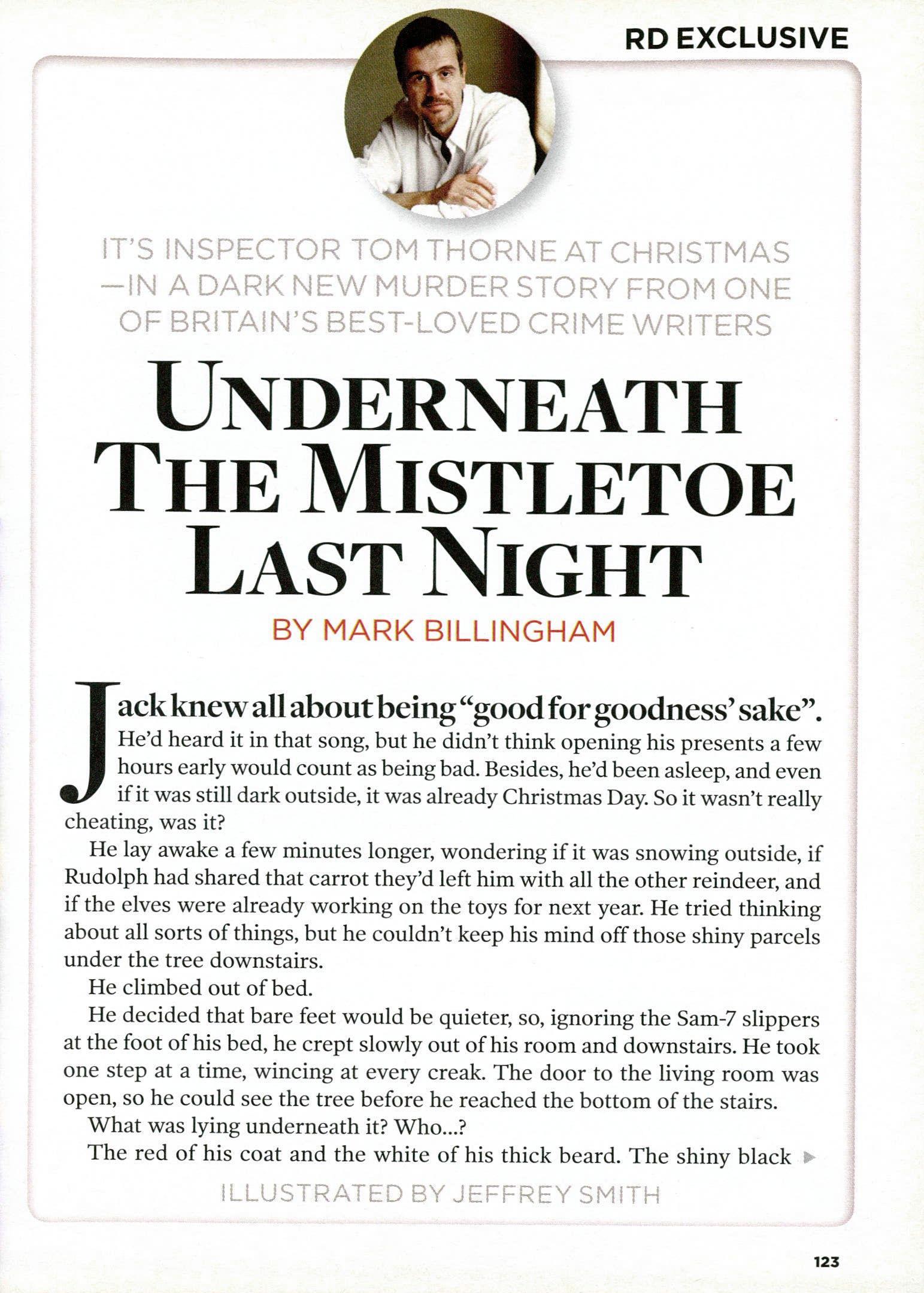
j i ack knew all about being "good for goodness' sake".
He'd heard it in that song, but he didn't think opening his presents a few hours early would count as being bad. Besides, he'd been asleep, and even if it was still dark outside, it was already Christmas Day. So it wasn't really cheating, was it?
He lay awake a few minutes longer, wondering if it was snowing outside, if Rudolph had shared that carrot they'd left him with all the other reindeer, and if the elves were already working on the toys for next year. He tried thinking about all sorts of things, but he couldn't keep his mind off those shiny parcels under the tree downstairs.
He climbed out of bed.
He decided that bare feet would be quieter, so, ignoring the Sam-7 slippers at the foot of his bed, he crept slowly out of his room and downstairs. He took one step at a time, wincing at every creak. The door to the living room was open, so he could see the tree before he reached the bottom of the stairs. What was lying underneath it? Who...?
The red of his coat and the white of his thick beard. The shiny black Iv,-
ILLUSTRATED BY JEFFREY SMITH
• belt and boots. Not as fat as Jack had been expecting, but maybe he was on a diet...
He waited for a minute at the foot of the stairs, then padded softly into the living room. He'd always thought it must be very tiring. All those houses to visit in one night. If Father Christmas chose this particular house to have a nap in, did that mean other children wouldn't be getting their presents? Or was this the last house on his journey?
Jack crept a little closer, then stopped. He THEY UNZIPPED let out a small gasp and clamped a hand across THE BODY BAG his mouth. He watched and waited for the AND KNELT chest to move, to hear a breath or a snuffle, BESIDE
but he could hear nothing except the low hum of the fridge in the kitchen and a strange hiss
inside his own head.

One arm was lying funny. AS HIS CUE TO A boot was half off his foot.
A different sort of red, where it shouldn't
have been.
The boy turned and bolted up the stairs.
He charged into his parents' room, shouting for his mum. She sat up and blinked, and he ran to her, breathless, fighting to get the words out.
"Somebody killed Father Christmas..."
Tom Thorne hadn't needed to think very long before signing himself up for the Christmas Day shift. It made no real difference to him. There was no family to spend it with, and, as far as he was concerned, Christmas Day was as good or bad a day to die as any other.
None of his regular team was at the house when he arrived, and clambering into the plastic bodysuit in the small front garden, he exchanged cursory nods of recognition or understanding with those officers already there.
We're the sad bastards. The ones with no lives.
Through a gaggle of Scenes-of-Crime Officers and police photographers, he was relieved to see the familiar figure of Phil Hendricks crouched over the body. The pathologist had been dumped by his partner a few weeks previously, and he and Thorne had already agreed to have Christmas lunch together at a local pub if no calls came in. Now, it looked like they would have to settle for turkey sandwiches and a few beers at Thorne's flat.
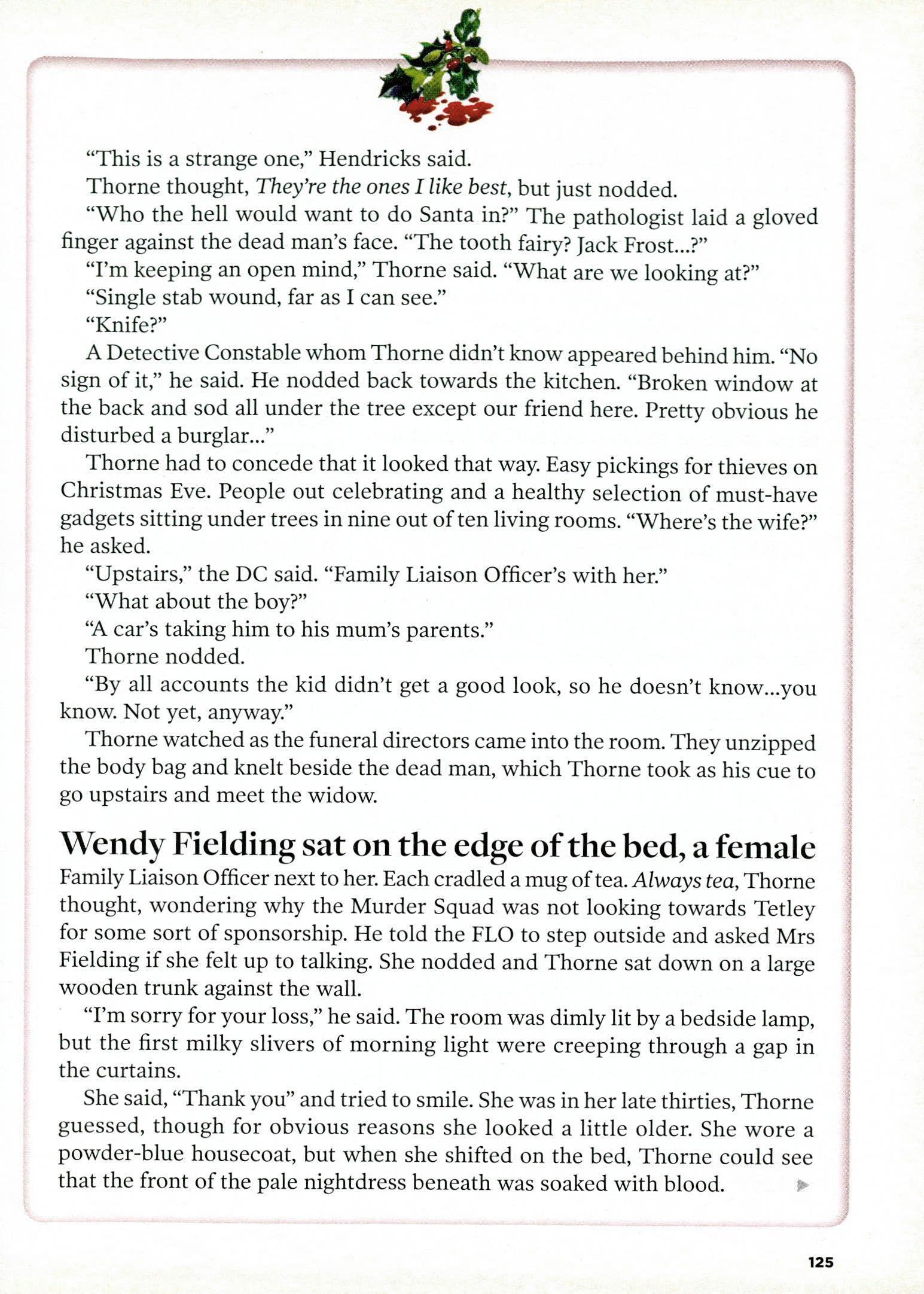
"This is a strange one," Hendricks said.
Thorne thought, They're the ones I like best, but just nodded.
"Who the hell would want to do Santa in?" The pathologist laid a gloved finger against the dead man's face. "The tooth fairy? Jack Frost...?"
"I'm keeping an open mind," Thorne said. "What are we looking at?"
"Single stab wound, far as I can see."
"Knife?"
A Detective Constable whom Thorne didn't know appeared behind him. "No sign of it," he said. He nodded back towards the kitchen. "Broken window at the back and sod all under the tree except our friend here. Pretty obvious he disturbed a burglar..."
Thorne had to concede that it looked that way. Easy pickings for thieves on Christmas Eve. People out celebrating and a healthy selection of must-have gadgets sitting under trees in nine out of ten living rooms. "Where's the wife?" he asked.
"Upstairs," the DC said. "Family Liaison Officer's with her."
"What about the boy?"
"A car's taking him to his mum's parents."
Thorne nodded.
"By all accounts the kid didn't get a good look, so he doesn't know...you know. Not yet, anyway."
Thorne watched as the funeral directors came into the room. They unzipped the body bag and knelt beside the dead man, which Thorne took as his cue to go upstairs and meet the widow.
Family Liaison Officer next to her. Each cradled a mug of tea. Always tea,Thorne thought, wondering why the Murder Squad was not looking towards Tetley for some sort of sponsorship. He told the FLO to step outside and asked Mrs Fielding if she felt up to talking. She nodded and Thorne sat down on a large wooden trunk against the wall.
"I'm sorry for your loss," he said. The room was dimly lit by a bedside lamp, but the first milky slivers of morning light were creeping through a gap in the curtains.
She said, "Thank you" and tried to smile. She was in her late thirties, Thorne guessed, though for obvious reasons she looked a little older. She wore a powder-blue housecoat, but when she shifted on the bed, Thorne could see that the front of the pale nightdress beneath was soaked with blood. ►
"Can you take me through what happened this morning?" he asked. She nodded without raising her head and took a deep breath. "It was just after one o'clock," she said. "I know because I looked at the clock when Jack came in." She spoke quietly and quickly, as though worried that, were she to hesitate even for a second, she might fall apart. "He told me Father Christmas was dead...that someone had killed him in the living room. I told him to stay here...I tucked him up in bed and..."
Then there was hesitation, and Thome watched THEY BOTH her swallow hard. She looked up at him. "He TURNED AT THE doesn't know it's his dad. He still believes in..."
She puffed out her cheeks, swallowed again.
"When do you think I should tell him?"
"We'll put you in touch with bereavement STANDING counsellors," Thorne told her. "They'll be able AWKWARDLY I N to advise you." THE DOORWAY.
"Right," she said.
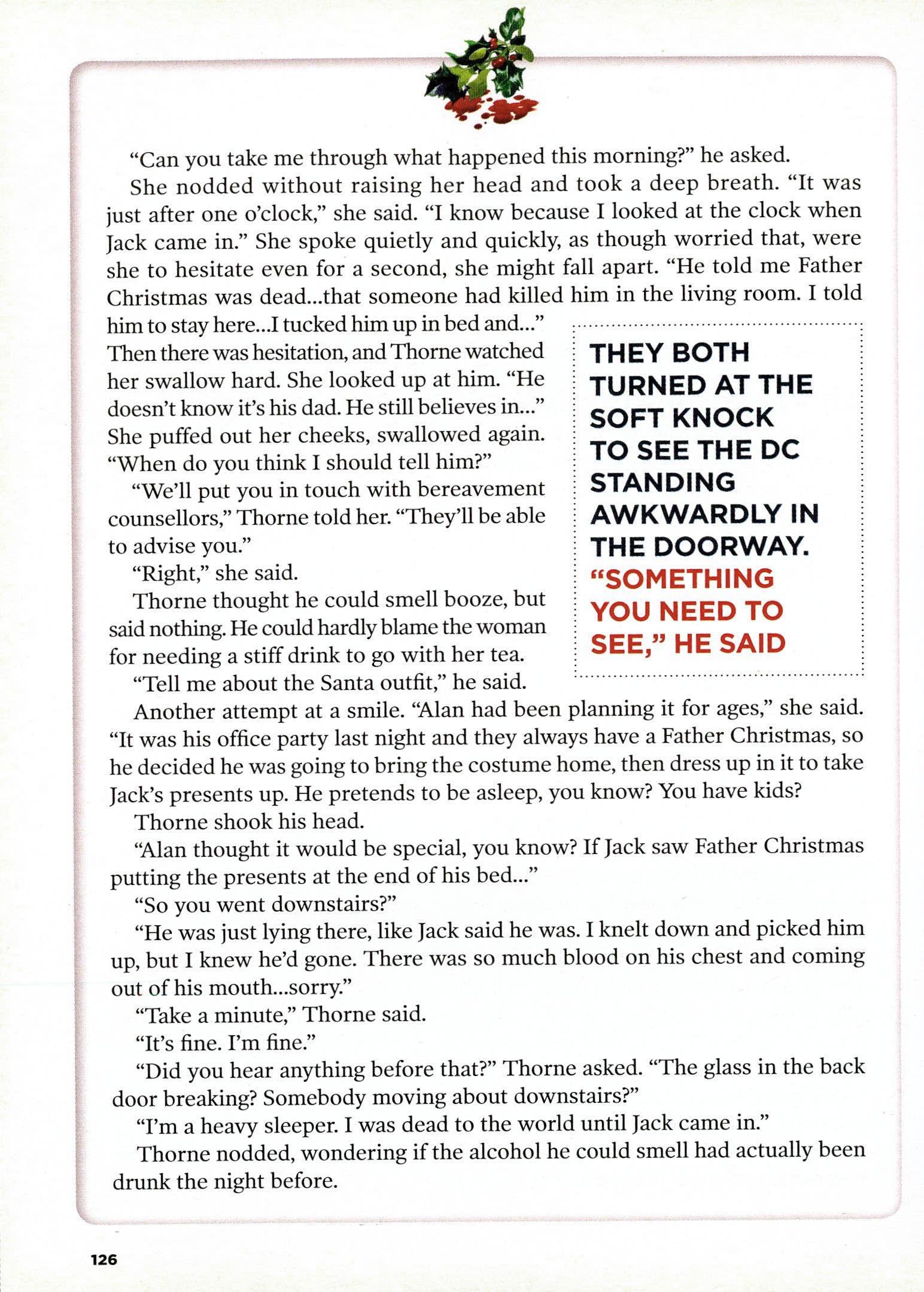
"SOMETHING
Thorne thought he could smell booze, but YOU NEED TO said nothing. He could hardly blame the woman for needing a stiff drink to go with her tea. SEE," HE SAID
"Tell me about the Santa outfit," he said.
Another attempt at a smile. 'Alan had been planning it for ages," she said. "It was his office party last night and they always have a Father Christmas, so he decided he was going to bring the costume home, then dress up in it to take Jack's presents up. He pretends to be asleep, you know? You have kids?
Thorne shook his head.
"Alan thought it would be special, you know? If Jack saw Father Christmas putting the presents at the end of his bed..."
"So you went downstairs?"
"He was just lying there, like Jack said he was. I knelt down and picked him up, but I knew he'd gone. There was so much blood on his chest and coming out of his mouth...sorry."
"Take a minute," Thorne said.
"It's fine. I'm fine."
"Did you hear anything before that?" Thorne asked. "The glass in the back door breaking? Somebody moving about downstairs?"
"I'm a heavy sleeper. I was dead to the world until Jack came in."
Thorne nodded, wondering if the alcohol he could smell had actually been drunk the night before.
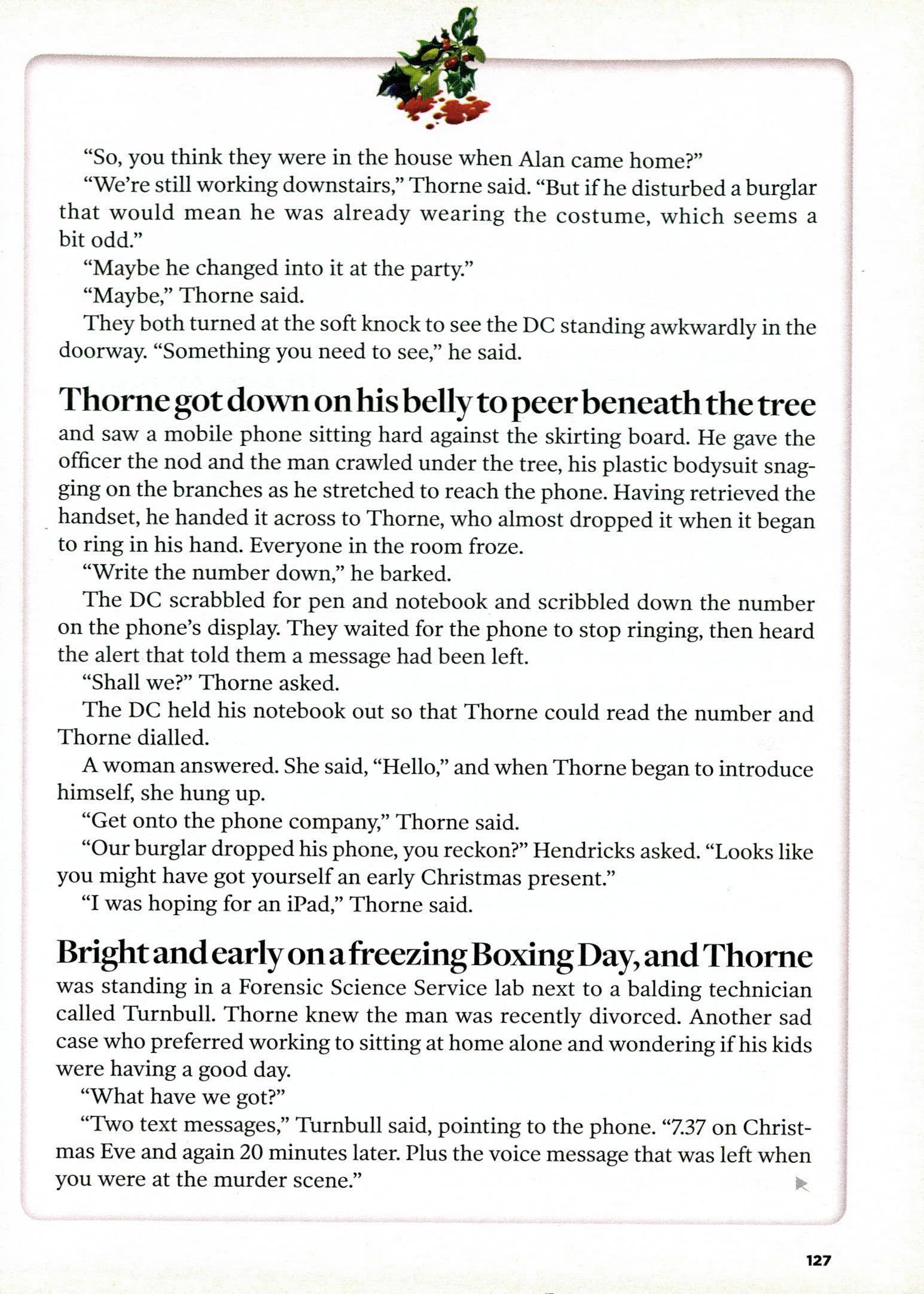
"So, you think they were in the house when Alan came home?"
"We're still working downstairs," Thorne said. "But if he disturbed a burglar that would mean he was already wearing the costume, which seems a bit odd."
"Maybe he changed into it at the party."
"Maybe," Thorne said.
They both turned at the soft knock to see the DC standing awkwardly in the doorway. "Something you need to see," he said.
and saw a mobile phone sitting hard against the skirting board. He gave the officer the nod and the man crawled under the tree, his plastic bodysuit snagging on the branches as he stretched to reach the phone. Having retrieved the handset, he handed it across to Thorne, who almost dropped it when it began to ring in his hand. Everyone in the room froze.
"Write the number down," he barked.
The DC scrabbled for pen and notebook and scribbled down the number on the phone's display. They waited for the phone to stop ringing, then heard the alert that told them a message had been left.
"Shall we?" Thorne asked.
The DC held his notebook out so that Thorne could read the number and Thorne dialled.
A woman answered. She said, "Hello," and when Thorne began to introduce himself, she hung up.
"Get onto the phone company," Thorne said.
"Our burglar dropped his phone, you reckon?" Hendricks asked. "Looks like you might have got yourself an early Christmas present."
"I was hoping for an iPad," Thorne said.
was standing in a Forensic Science Service lab next to a balding technician called Turnbull. Thorne knew the man was recently divorced. Another sad case who preferred working to sitting at home alone and wondering if his kids were having a good day.
"What have we got?"
"Two text messages," Turnbull said, pointing to the phone. "7.37 on Christmas Eve and again 20 minutes later. Plus the voice message that was left when you were at the murder scene."

Thorne had already established when Alan Fielding had left home to go to his firm's Christmas party. One message had been sent just before he left, and the second would have arrived when he was on his way there.
"Let's see," Thorne said.
Turnbull handed him a transcript of the messages.
"19.37.24/12/U. It's me. Just wondered if you'd left yet. I'm guessing ur having trouble getting away. Can't wait to see u. x"
"19.54.24/12/11. Hope ur on your way. Hurry CONCESSIONS up and get here will u? Can't wait to give u yr HAD BEEN MADE Xmas present. I know ur going to like it. x" TO THE
And last, a transcript of the voice message, left in the early hours of Christmas morning. ELSEWHERE IN
"Just me. Couldn't sleep. Tonight was amaz- THE
BUT ing though. I know you can't tell her today...I'm THE
not expecting you to, but do it soon, OK? Oh, ROOM WAS and you're the sexiest Santa I've ever seen..." AS BARE AND
"So, what do you think?" Turnbull asked. BLAND AS IT WAS Thorne stared at the phone. He already knew who the messages were from. The same
woman who had called the phone found un-
derneath the Christmas tree; the phone they thought had been left by whoever had killed Alan Fielding. Thorne now knew that the phone was Fielding's, that he had forgotten to take it with him, and that the caller was Angela Massey, a 24-year-old secretary who worked at the same company as he did.
Thorne had spoken to her on Christmas Day, just before the umpteenth repeat of The Great Escape. He was due to interview her formally later.
He blinked slowly. His head was still thick after the night before, when he and Hendricks had drunk far too much and swapped some distinctly unseasonal banter.
"Knife went straight through his heart," Hendricks had said. "Probably dead before he hit the deck."
"Something, I suppose."
"Not the best way to round off Christmas Eve."
"Yeah, well..."
"What?"
"I think he'd had quite a good night up to that point."
"So, that help you?" Turnbull asked. "The stuff on the phone?"
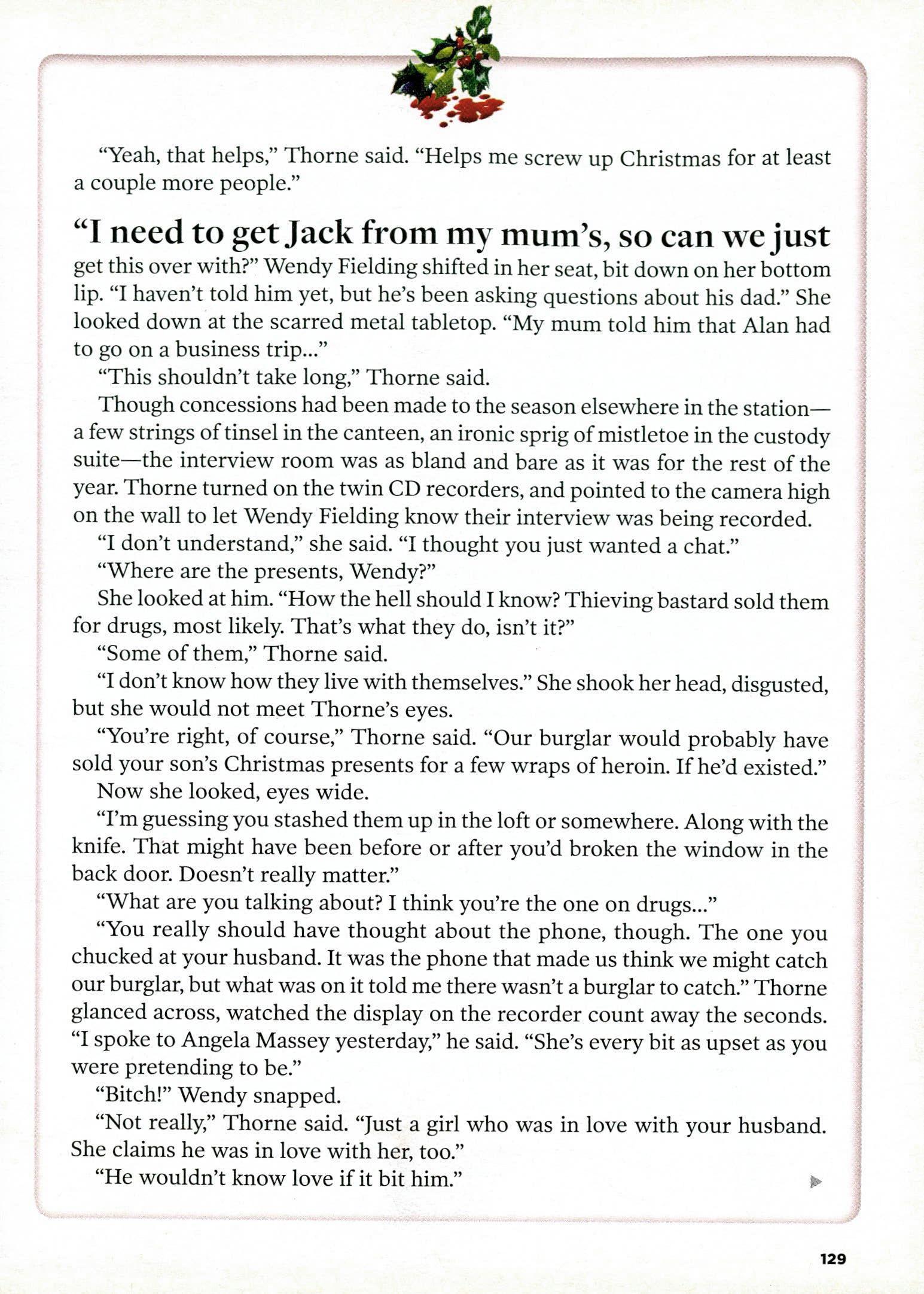
"Yeah, that helps," Thorne said. "Helps me screw up Christmas for at least a couple more people."
"I need to get Jack from my mum's, so can we just get this over with?" Wendy Fielding shifted in her seat, bit down on her bottom lip. "I haven't told him yet, but he's been asking questions about his dad." She looked down at the scarred metal tabletop. "My mum told him that Alan had to go on a business trip..."
"This shouldn't take long," Thorne said.
Though concessions had been made to the season elsewhere in the station— a few strings of tinsel in the canteen, an ironic sprig of mistletoe in the custody suite—the interview room was as bland and bare as it was for the rest of the year. Thorne turned on the twin CD recorders, and pointed to the camera high on the wall to let Wendy Fielding know their interview was being recorded.
"I don't understand," she said. "I thought you just wanted a chat."
"Where are the presents, Wendy?"
She looked at him. "How the hell should I know? Thieving bastard sold them for drugs, most likely. That's what they do, isn't it?"
"Some of them," Thorne said.
"I don't know how they live with themselves." She shook her head, disgusted, but she would not meet Thorne's eyes.
"You're right, of course," Thorne said. "Our burglar would probably have sold your son's Christmas presents for a few wraps of heroin. If he'd existed."
Now she looked, eyes wide.
"I'm guessing you stashed them up in the loft or somewhere. Along with the knife. That might have been before or after you'd broken the window in the back door. Doesn't really matter."
"What are you talking about? I think you're the one on drugs..."
"You really should have thought about the phone, though. The one you chucked at your husband. It was the phone that made us think we might catch our burglar, but what was on it told me there wasn't a burglar to catch." Thorne glanced across, watched the display on the recorder count away the seconds. "I spoke to Angela Massey yesterday," he said. "She's every bit as upset as you were pretending to be."
"Bitch!" Wendy snapped.
"Not really," Thorne said. "Just a girl who was in love with your husband. She claims he was in love with her, too."
"He wouldn't know love if it bit him." ►
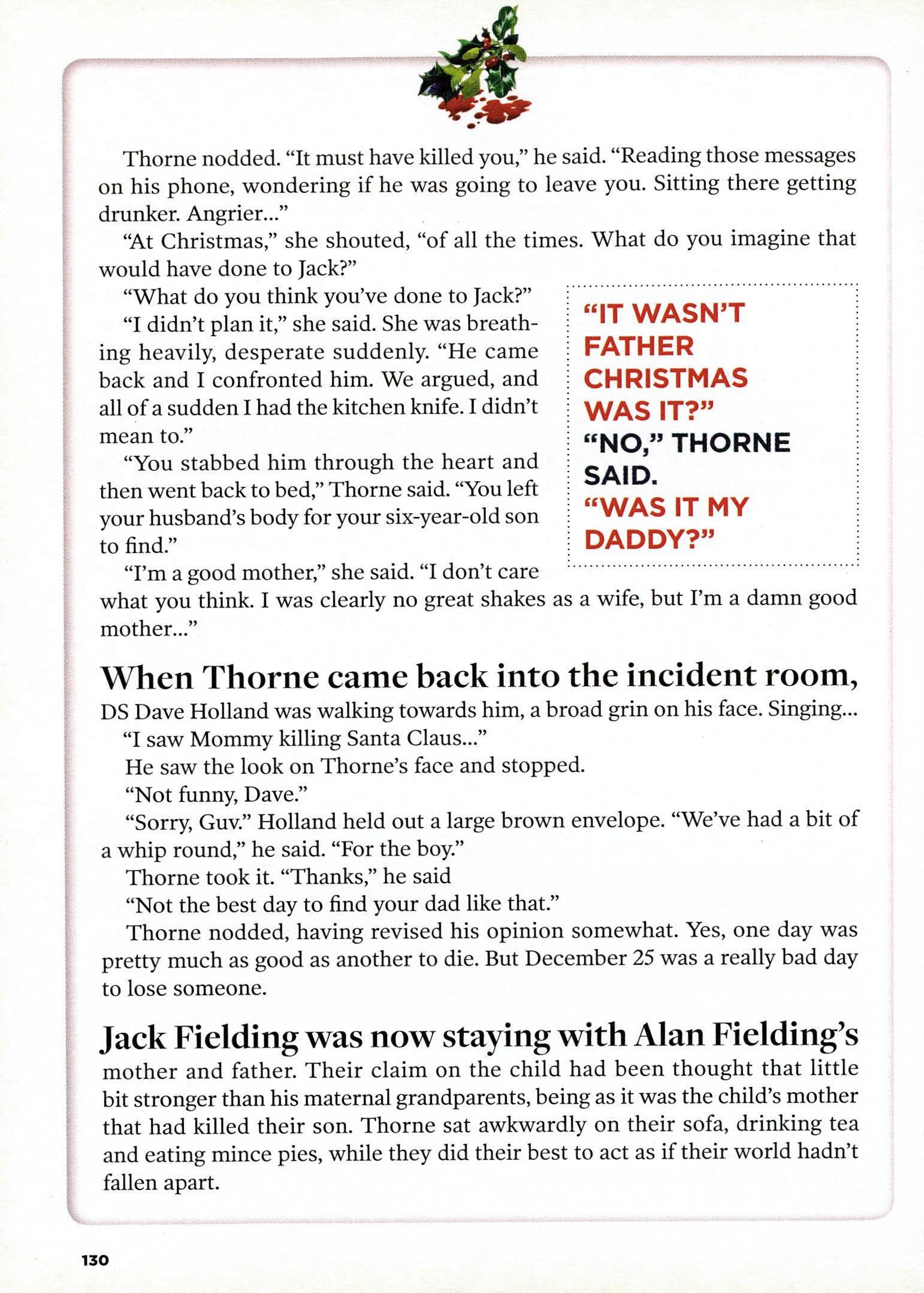
Thorne nodded. "It must have killed you," he said. "Reading those messages on his phone, wondering if he was going to leave you. Sitting there getting drunker. Angrier..."
"At Christmas," she shouted, "of all the times. What do you imagine that would have done to Jack?"
"What do you think you've done to Jack?"
"I didn't plan it," she said. She was breath- "IT WASN'T ing heavily, desperate suddenly. "He came FATHER back and I confronted him. We argued, and CHRISTMAS all of a sudden I had the kitchen knife. I didn't WAS IT?" mean to."
"You stabbed him through the heart and SAID. then went back to bed," Thorne said. "You left your husband's body for your six-year-old son "WAS IT MY to find." DADDY?"
"I'm a good mother," she said. "I don't care what you think. I was clearly no great shakes as a wife, but I'm a damn good mother..."
Thorne came back into the
room, DS Dave Holland was walking towards him, a broad grin on his face. Singing...
"I saw Mommy killing Santa Claus..."
He saw the look on Thorne's face and stopped.
"Not funny, Dave."
"Sorry, Guy." Holland held out a large brown envelope. "We've had a bit of a whip round," he said. "For the boy."
Thorne took it. "Thanks," he said
"Not the best day to find your dad like that."
Thorne nodded, having revised his opinion somewhat. Yes, one day was pretty much as good as another to die. But December 25 was a really bad day to lose someone.
Jack Fielding was now staying with Alan Fielding's mother and father. Their claim on the child had been thought that little bit stronger than his maternal grandparents, being as it was the child's mother that had killed their son. Thorne sat awkwardly on their sofa, drinking tea and eating mince pies, while they did their best to act as if their world hadn't fallen apart.
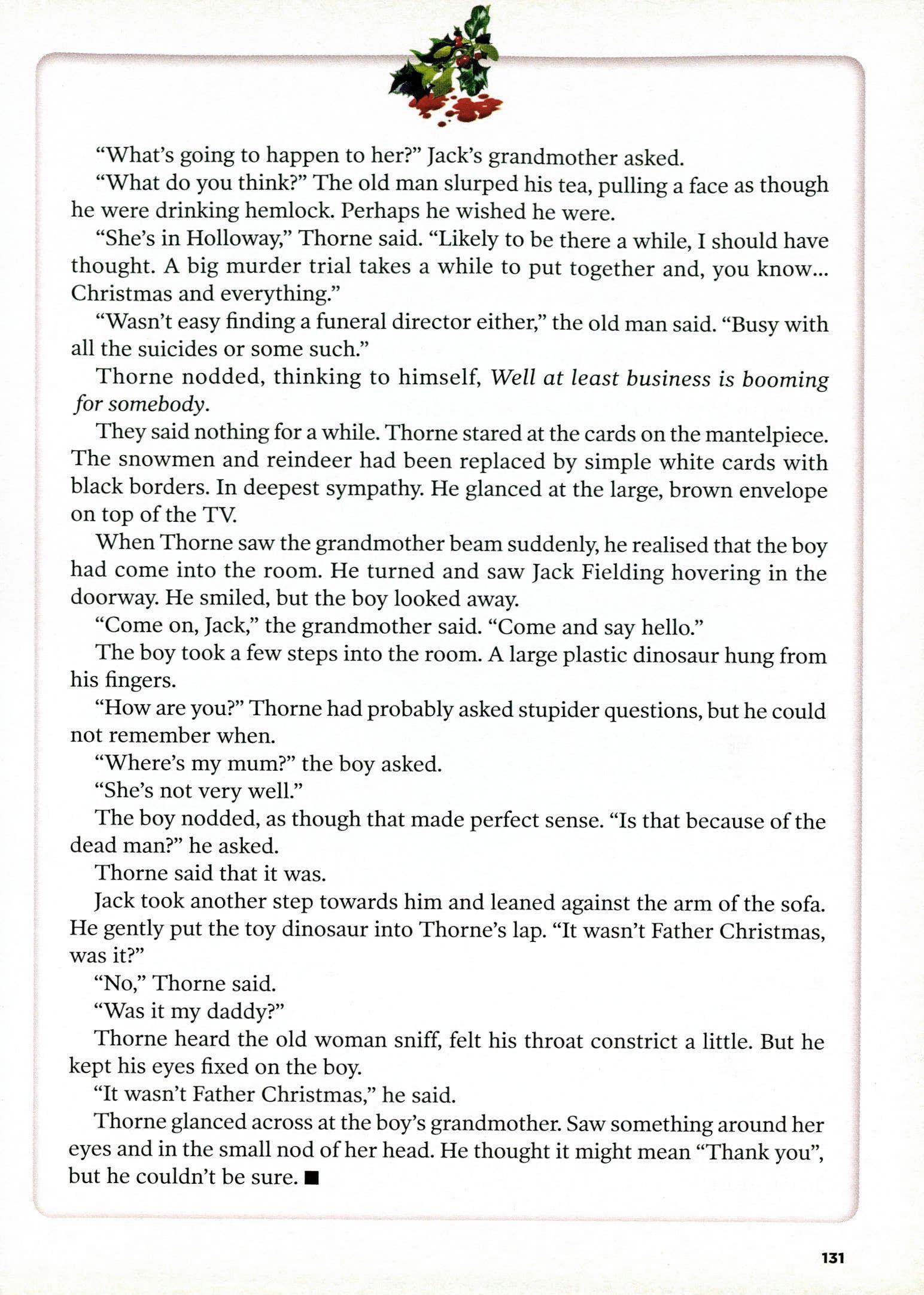
"What's going to happen to her?" Jack's grandmother asked.
"What do you think?" The old man slurped his tea, pulling a face as though he were drinking hemlock. Perhaps he wished he were.
"She's in Holloway," Thorne said. "Likely to be there a while, I should have thought. A big murder trial takes a while to put together and, you know... Christmas and everything."
"Wasn't easy finding a funeral director either," the old man said. "Busy with all the suicides or some such."
Thorne nodded, thinking to himself, Well at least business is booming for somebody.
They said nothing for a while. Thorne stared at the cards on the mantelpiece. The snowmen and reindeer had been replaced by simple white cards with black borders. In deepest sympathy. He glanced at the large, brown envelope on top of the TV.
When Thorne saw the grandmother beam suddenly, he realised that the boy had come into the room. He turned and saw Jack Fielding hovering in the doorway. He smiled, but the boy looked away.
"Come on, Jack," the grandmother said. "Come and say hello."
The boy took a few steps into the room. A large plastic dinosaur hung from his fingers.
"How are you?" Thorne had probably asked stupider questions, but he could not remember when.
"Where's my mum?" the boy asked.
"She's not very well."
The boy nodded, as though that made perfect sense. "Is that because of the dead man?" he asked.
Thorne said that it was.
Jack took another step towards him and leaned against the arm of the sofa. He gently put the toy dinosaur into Thorne's lap. "It wasn't Father Christmas, was it?"
"No," Thorne said.
"Was it my daddy?"
Thorne heard the old woman sniff, felt his throat constrict a little. But he kept his eyes fixed on the boy.
"It wasn't Father Christmas," he said.
Thorne glanced across at the boy's grandmother. Saw something around her eyes and in the small nod of her head. He thought it might mean "Thank you", but he couldn't be sure. ■
Hours of puzzling fun packed into one pocket-sized device! ONLY AVAILABLE from Reader's Digest
It's so small and lightweight, you can take PuzzlePro with you wherever you go. Batteries included.

Order by 15th December for guaranteed Christmas delivery!
As soon as you open the box, you'll be off! PuzzlePro couldn't be easier to use — there are no fiddly keys or complicated commands, just use the built-in stylus to 'drag and drop'. Simple!
Studies suggest that by spending a few minutes a day giving your brain a workout, you can reap major benefits as you get older. With four levels for every game, PuzzlePro is designed to help you boost your brain power, fast!
Only available from Reader's
No other puzzling device combines word, number and board games in one. Plus, all the pre-loaded games come straight from the Reader's Digest puzzle expertsguaranteeing quality and accuracy.
more games

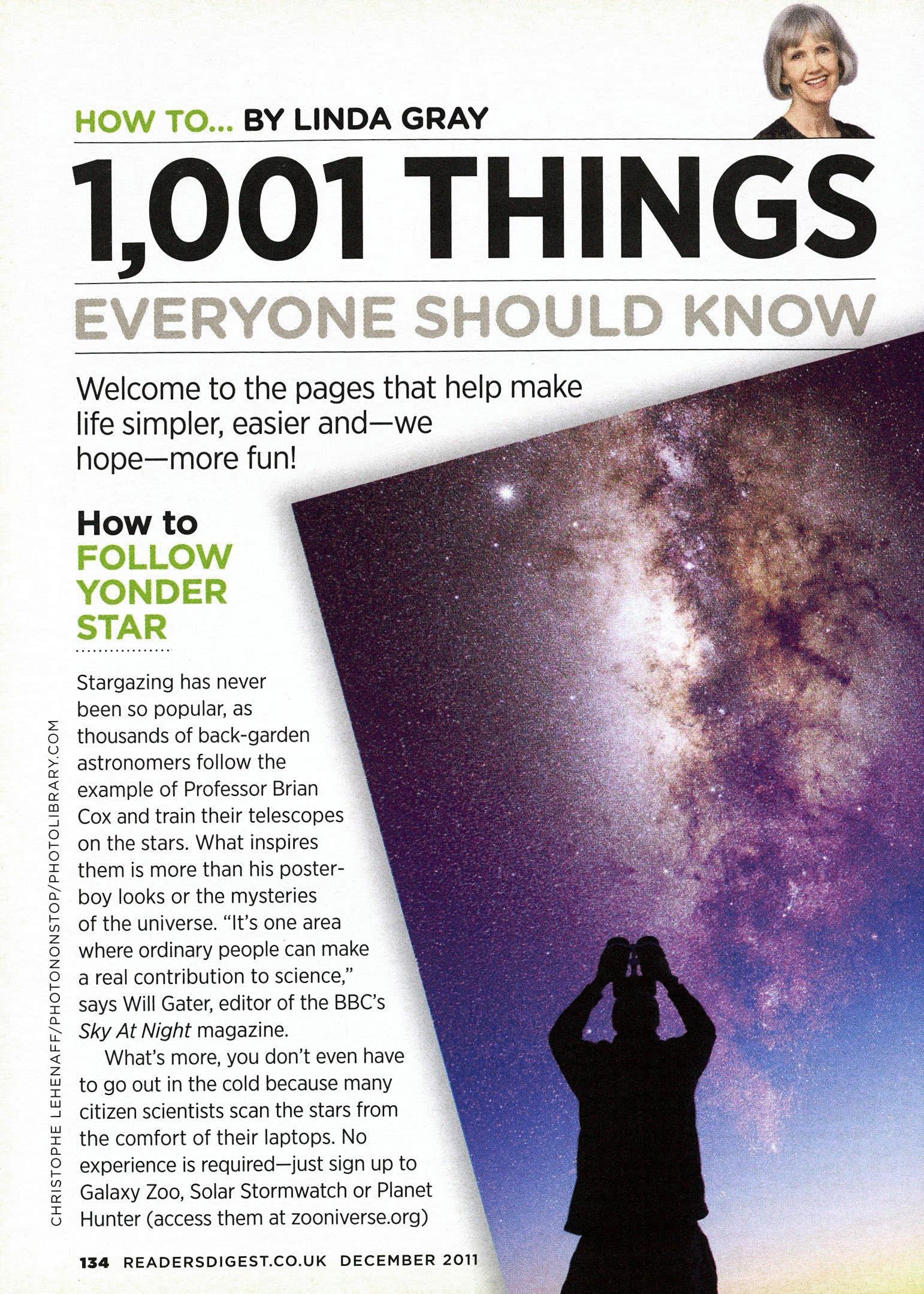 BY LINDA GRAY
BY LINDA GRAY
Welcome to the pages that help make life simpler, easier and—we hope—more fun!
Stargazing has never been so popular, as thousands of back-garden astronomers follow the example of Professor Brian Cox and train their telescopes on the stars. What inspires them is more than his posterboy looks or the mysteries of the universe. "It's one area where ordinary people can make a real contribution to science," says Will Gater, editor of the BBC's Sky At Night magazine.
What's more, you don't even have to go out in the cold because many citizen scientists scan the stars from the comfort of their laptops. No experience is required—just sign up to Galaxy Zoo, Solar Stormwatch or Planet Hunter (access them at zooniverse.org)
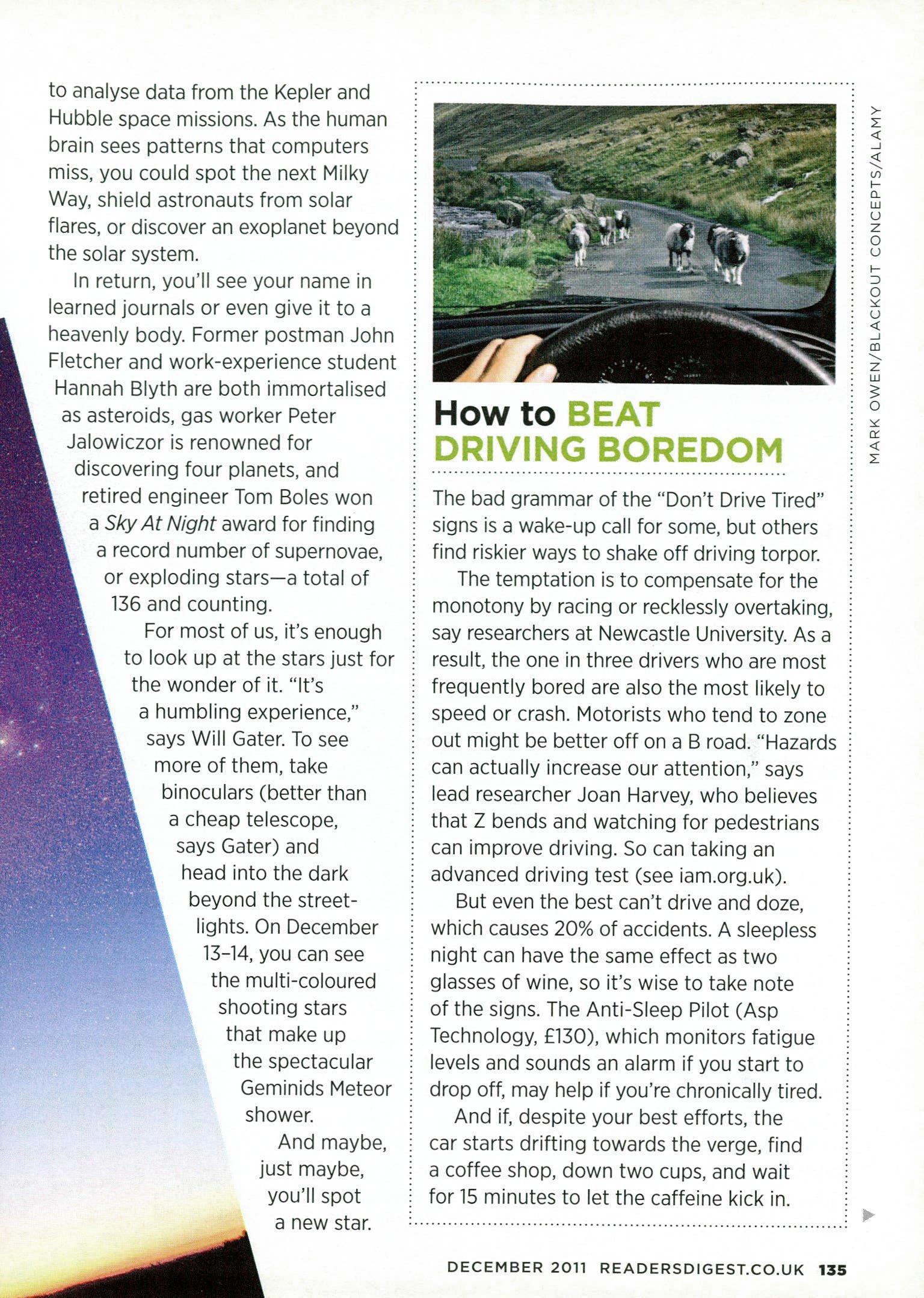
to analyse data from the Kepler and Hubble space missions. As the human brain sees patterns that computers miss, you could spot the next Milky Way, shield astronauts from solar flares, or discover an exoplanet beyond the solar system.
In return, you'll see your name in learned journals or even give it to a heavenly body. Former postman John Fletcher and work-experience student Hannah Blyth are both immortalised as asteroids, gas worker Peter Jalowiczor is renowned for discovering four planets, and retired engineer Tom Boles won a Sky At Night award for finding a record number of supernovae, or exploding stars—a total of 136 and counting.
For most of us, it's enough to look up at the stars just for the wonder of it. "It's a humbling experience," says Will Gater. To see more of them, take binoculars (better than a cheap telescope, says Gater) and head into the dark beyond the streetlights. On December 13-14, you can see the multi-coloured shooting stars that make up the spectacular Geminids Meteor shower.
And maybe, just maybe, you'll spot a new star.
The bad grammar of the "Don't Drive Tired" signs is a wake-up call for some, but others find riskier ways to shake off driving torpor. The temptation is to compensate for the monotony by racing or recklessly overtaking, say researchers at Newcastle University. As a result, the one in three drivers who are most frequently bored are also the most likely to speed or crash. Motorists who tend to zone out might be better off on a B road. "Hazards can actually increase our attention," says lead researcher Joan Harvey, who believes that Z bends and watching for pedestrians can improve driving. So can taking an advanced driving test (see iam.org.uk).
But even the best can't drive and doze, which causes 20% of accidents. A sleepless night can have the same effect as two glasses of wine, so it's wise to take note of the signs. The Anti-Sleep Pilot (Asp Technology, £130), which monitors fatigue levels and sounds an alarm if you start to drop off, may help if you're chronically tired. And if, despite your best efforts, the car starts drifting towards the verge, find a coffee shop, down two cups, and wait for 15 minutes to let the caffeine kick in.
In disagreements, as in total war, an allout assault is rarely the winning strategy. Keep calm: if you lose your cool, you've lost the argument. Avoid statements that are mere retrenchment ("That's rubbish!" or "How dare you say that to me?"). Instead, use words that invite the other party
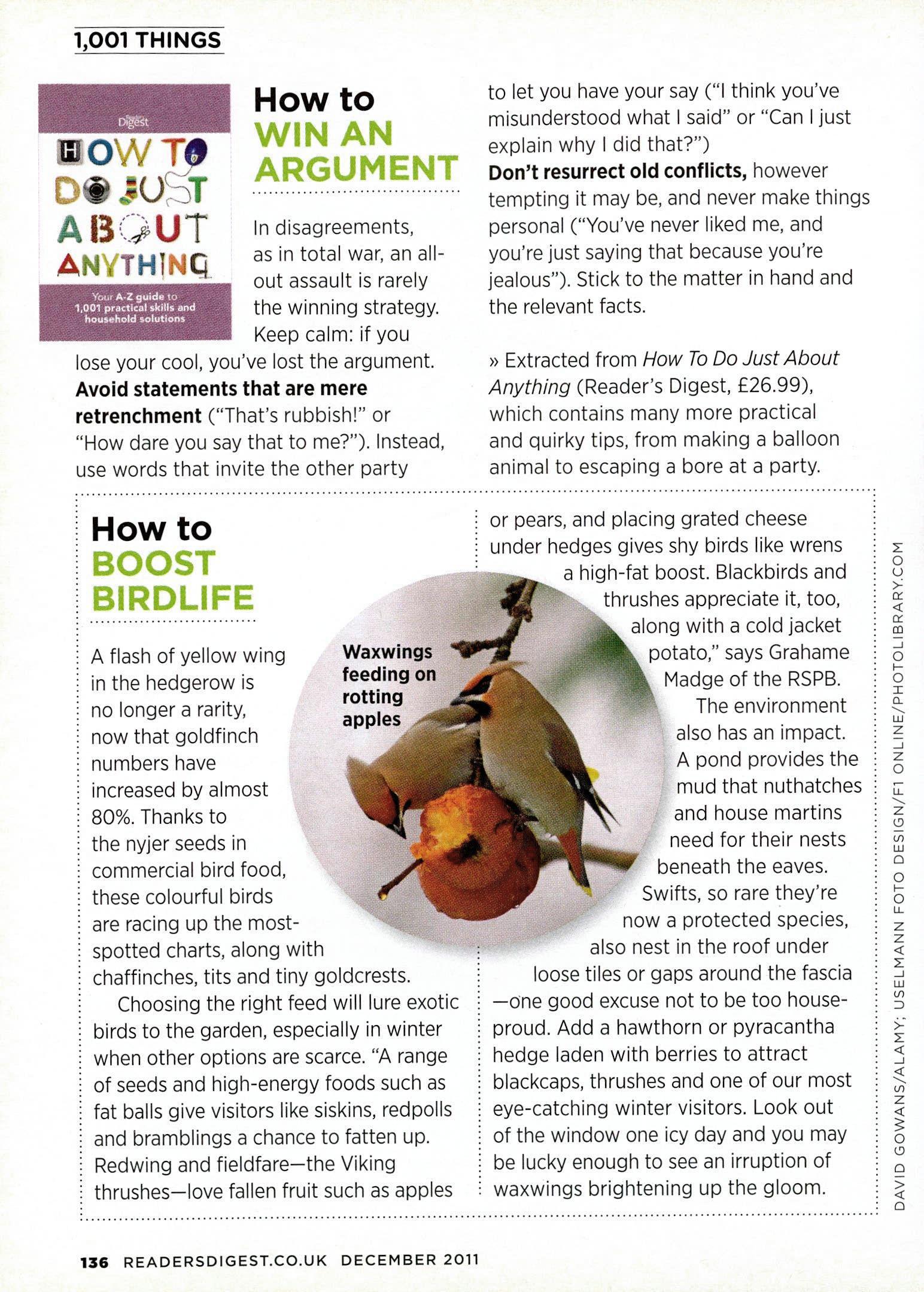
Waxwings feeding on rotting apples
A flash of yellow wing in the hedgerow is no longer a rarity, now that goldfinch numbers have increased by almost 80%. Thanks to the nyjer seeds in commercial bird food, these colourful birds are racing up the mostspotted charts, along with chaffinches, tits and tiny goldcrests. Choosing the right feed will lure exotic birds to the garden, especially in winter when other options are scarce. "A range of seeds and high-energy foods such as fat balls give visitors like siskins, redpolls and bramblings a chance to fatten up. Redwing and fieldfare—the Viking thrushes—love fallen fruit such as apples
to let you have your say ("I think you've misunderstood what I said" or "Can I just explain why I did that?")
Don't resurrect old conflicts, however tempting it may be, and never make things personal ("You've never liked me, and you're just saying that because you're jealous"). Stick to the matter in hand and the relevant facts.
» Extracted from How To Do Just About Anything (Reader's Digest, £26.99), which contains many more practical and quirky tips, from making a balloon animal to escaping a bore at a party.
or pears, and placing grated cheese under hedges gives shy birds like wrens a high-fat boost. Blackbirds and thrushes appreciate it, too, along with a cold jacket potato," says Grahame Madge of the RSPB. The environment also has an impact. A pond provides the mud that nuthatches and house martins need for their nests beneath the eaves.
Swifts, so rare they're now a protected species, also nest in the roof under loose tiles or gaps around the fascia —one good excuse not to be too houseproud. Add a hawthorn or pyracantha hedge laden with berries to attract blackcaps, thrushes and one of our most eye-catching winter visitors. Look out of the window one icy day and you may be lucky enough to see an irruption of waxwings brightening up the gloom.
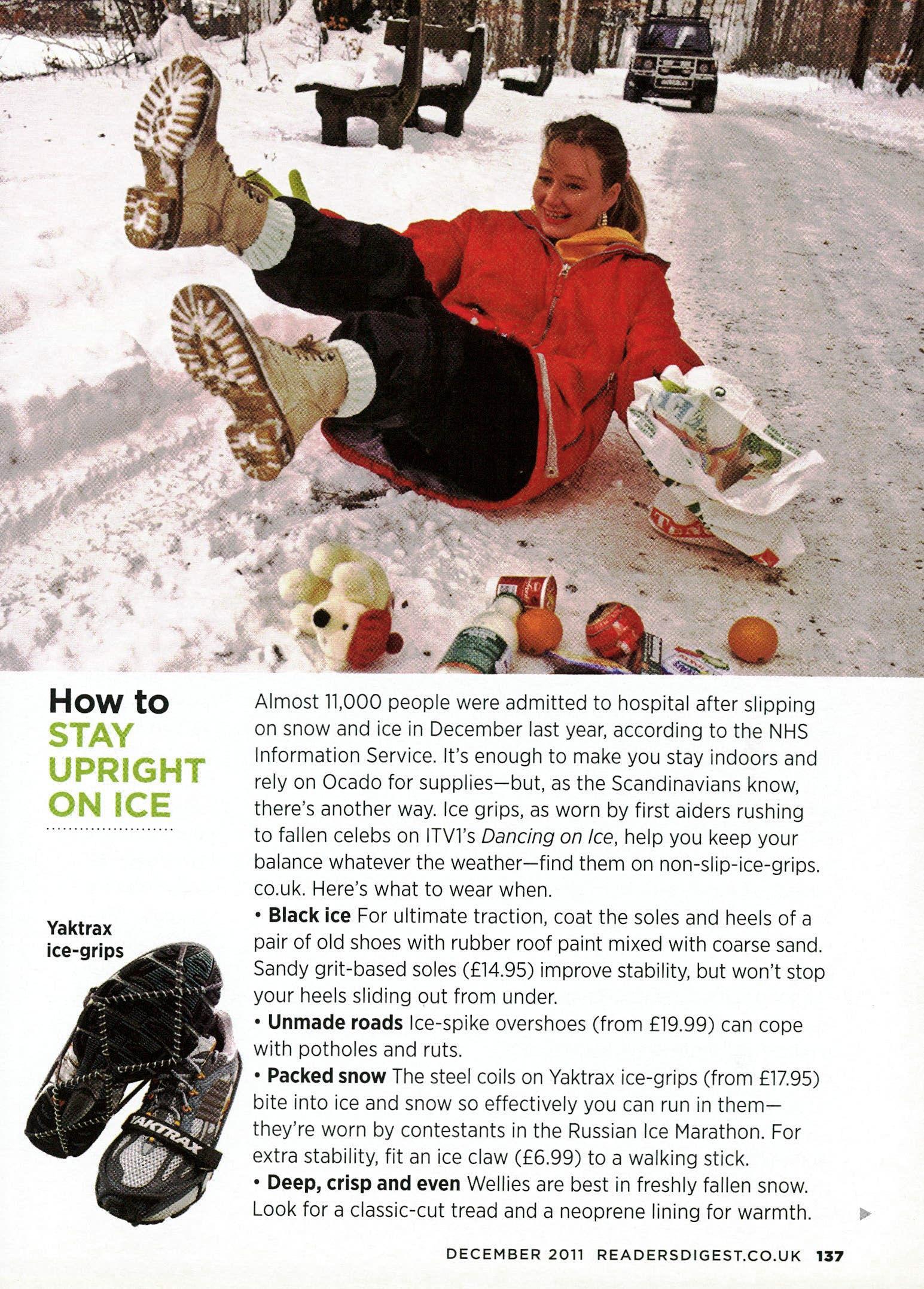
Yaktrax ice-grips
Almost 11,000 people were admitted to hospital after slipping on snow and ice in December last year, according to the NHS Information Service. It's enough to make you stay indoors and rely on Ocado for supplies—but, as the Scandinavians know, there's another way. Ice grips, as worn by first aiders rushing to fallen celebs on ITV1's Dancing on Ice, help you keep your balance whatever the weather—find them on non-slip-ice-grips. co.uk. Here's what to wear when.
• Black ice For ultimate traction, coat the soles and heels of a pair of old shoes with rubber roof paint mixed with coarse sand. Sandy grit-based soles (£14.95) improve stability, but won't stop your heels sliding out from under.
• Unmade roads Ice-spike overshoes (from £19.99) can cope with potholes and ruts.
•Packed snow The steel coils on Yaktrax ice-grips (from £17.95) bite into ice and snow so effectively you can run in them— they're worn by contestants in the Russian Ice Marathon. For extra stability, fit an ice claw (£6.99) to a walking stick.
• Deep, crisp and even Wellies are best in freshly fallen snow. Look for a classic-cut tread and a neoprene lining for warmth. ►
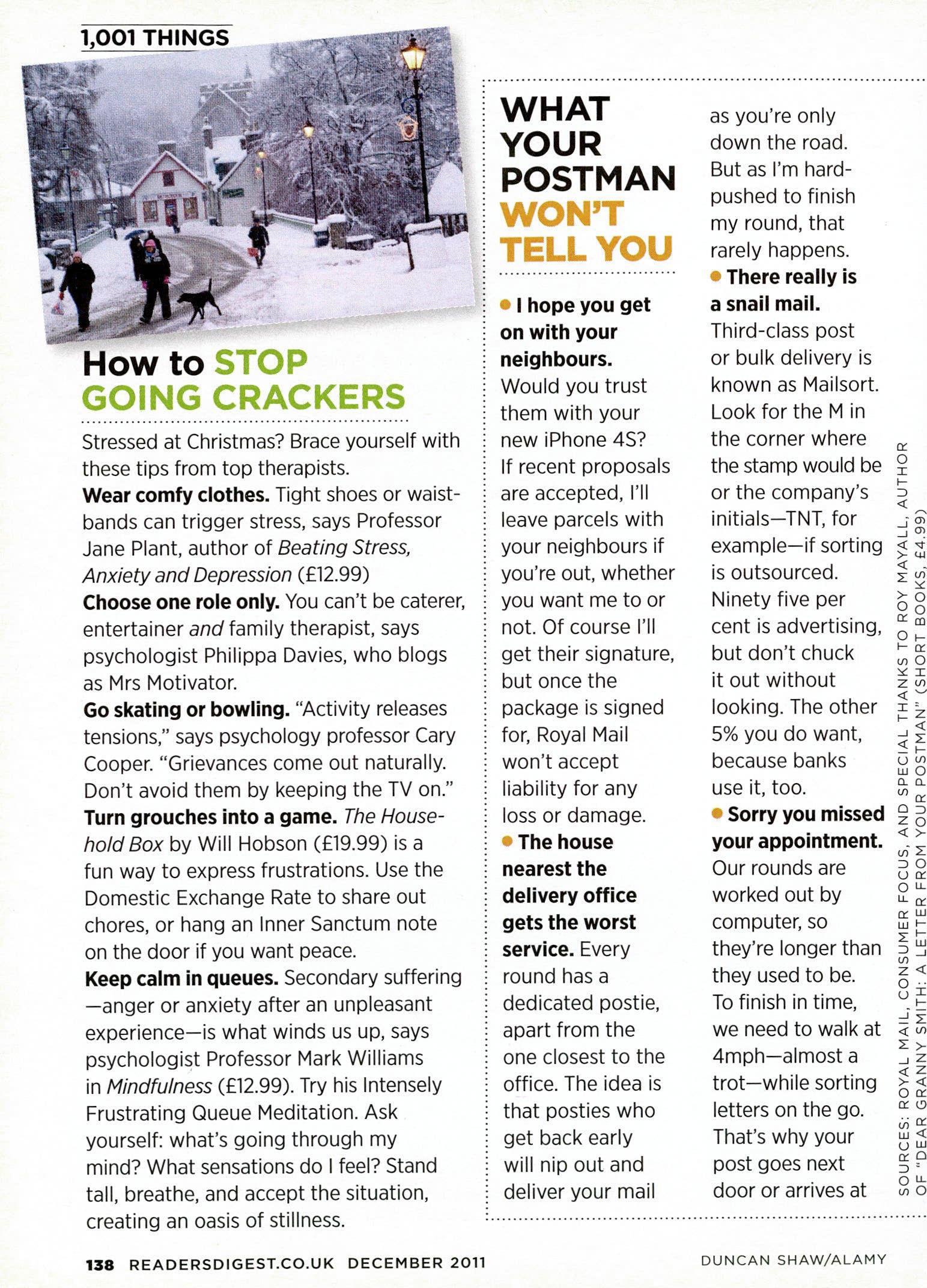
Stressed at Christmas? Brace yourself with these tips from top therapists. Wear comfy clothes. Tight shoes or waistbands can trigger stress, says Professor Jane Plant, author of Beating Stress, Anxiety and Depression (E12.99)
Choose one role only. You can't be caterer, entertainer and family therapist, says psychologist Philippa Davies, who blogs as Mrs Motivator.
Go skating or bowling. "Activity releases tensions," says psychology professor Cary Cooper. "Grievances come out naturally. Don't avoid them by keeping the TV on."
Turn grouches into a game. The Household Box by Will Hobson (E19.99) is a fun way to express frustrations. Use the Domestic Exchange Rate to share out chores, or hang an Inner Sanctum note on the door if you want peace. Keep calm in queues. Secondary suffering —anger or anxiety after an unpleasant experience—is what winds us up, says psychologist Professor Mark Williams in Mindfulness (02.99). Try his Intensely Frustrating Queue Meditation. Ask yourself: what's going through my mind? What sensations do I feel? Stand tall, breathe, and accept the situation, creating an oasis of stillness.
• I hope you get on with your neighbours. Would you trust them with your new iPhone 4S? If recent proposals are accepted, I'll leave parcels with your neighbours if you're out, whether you want me to or not. Of course I'll get their signature, but once the package is signed for, Royal Mail won't accept liability for any loss or damage. The house nearest the delivery office gets the worst service. Every round has a dedicated postie, apart from the one closest to the office. The idea is that posties who get back early will nip out and deliver your mail
as you're only down the road. But as I'm hardpushed to finish my round, that rarely happens. • There really is a snail mail.
Third-class post or bulk delivery is known as Mailsort. Look for the M in the corner where the stamp would be or the company's initials—TNT, for example—if sorting is outsourced. Ninety five per cent is advertising, but don't chuck it out without looking. The other 5% you do want, because banks use it, too.
Sorry you missed your appointment. Our rounds are worked out by computer, so they're longer than they used to be. To finish in time, we need to walk at 4mph—almost a trot—while sorting letters on the go. That's why your post goes next door or arrives at
3pm, and why you get no mail four days a week and then a cascade on Friday. Which is often too late. Sometimes I ring and run. I'm only allowed one minute for deliveries that need a signature, so I can't wait for you to get out of the bath. If we're really busy, the temptation is not to ring at all and leave a "sorry you were out— card I filled up earlier.
• I love my bike. I scoot around on it, use it as a trolley, and sort mail into the basket and panniers. But I may not have it much longer. We're going over to "park and loop", where two posties go out in a van and use golf trolleys to deliver the mail. They park up and do half a round each, which saves time—as long as they work at the same pace.
• Christmas cards are pricier than you think. A swanky card bigger than a folded sheet of A4 counts as a large letter, which costs 75p first class. And watch what you slip inside smaller cards because standard letters (46p first class) must be less than 5mm thick. My advice? Buy a letter gauge and save your sanity.
• Dog bites are no joke. Five thousand of us are attacked every year, even though every round has a card warning us of dangers. More than 100 are bitten on the bottom and dozens where it hurts even more. But if you're sniggering, the joke's on you. It costs the Royal
Mail a fortune to cover 15,000 days' sick leave, and who do you think picks up the bill?
• You don't have to stump up for insufficient postage. It's bad enough to schlep to an out-of-town sorting office, even worse to find the
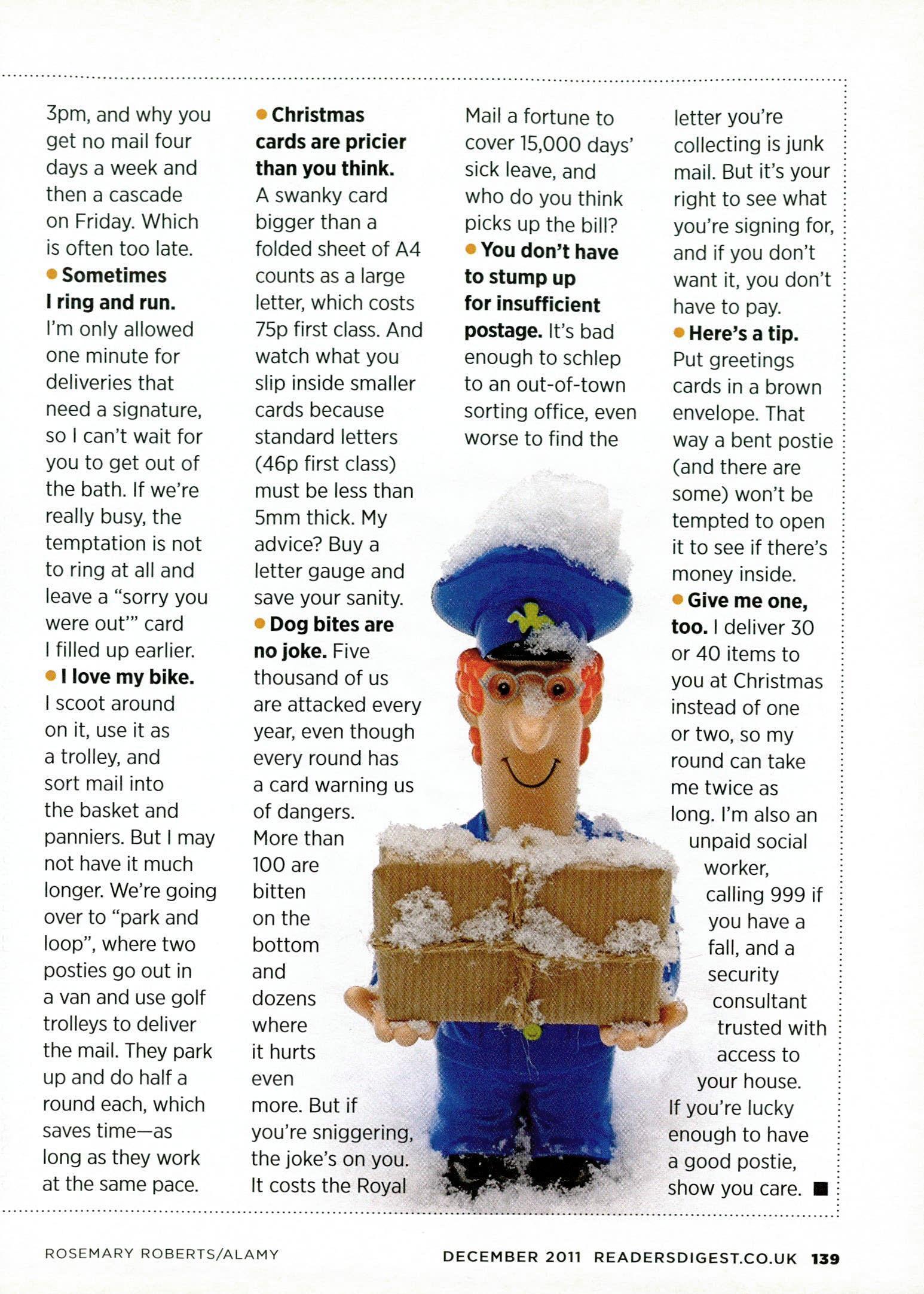
letter you're collecting is junk mail. But it's your right to see what you're signing for, and if you don't want it, you don't have to pay.
• Here's a tip. Put greetings cards in a brown envelope. That way a bent postie (and there are some) won't be tempted to open it to see if there's money inside.
• Give me one, too. I deliver 30 or 40 items to you at Christmas instead of one or two, so my round can take me twice as long. I'm also an unpaid social worker, calling 999 if you have a fall, and a security consultant trusted with access to your house. If you're lucky enough to have a good postie, show you care. ■
At this time of year, it's what you can do for others that really counts
"It's Paul McCartney!" my mum suddenly blurted out as she sat bolt upright in the hairdresser's chair. I looked at the man standing a few feet away talking to Brendan, her hairdresser.
"He's standing behind me. I could practically touch him," she continued, before letting out a squeal of delight as she stared at him in the mirror. She was behaving like a teenager, and I was dying of embarrassment.
Brendan turned back to us and Sir Paul walked off. Mum was speechless. She clearly wanted to mention that she'd just been within groping distance of her heart-throb, but knew it was bad form.

Instead, she sat silently texting most of the populace of the Home Counties to tell them who she'd just seen.
Meanwhile, I started talking to Brendan. He's one of the best hairdressers in London and works in one of the best salons. My mum doesn't normally inhabit this sort of world. After my parents divorced, my sister and I insisted that every few months she take off her wellies and come to London for a few hours of pampering. It's done her self-esteem the world of good—I wish I could say the same for my bank balance.
I asked Brendan what he was doing for Christmas. "Oh, not much," he said. "I'll see my mum on Christmas morning, and then I'll go to the local hospital on Christmas afternoon and Boxing Day," he said.
"Why?" I asked, puzzled.
"I go around the wards doing the ladies' hair. It's such fun. I do it every year," he explained with a smile.
I had an image of Brendan milling around a grotty NHS ward, giving old ladies a free cut that would normally cost them several weeks' pension. But what impressed me most was his selflessness at a time notorious for overindulgence. Brendan looked at me, embarrassed.
"Well, it's nothing compared with what
Ordinary people can often help in ways that a doctor or nurse can't
you do," he said. I shook my head. Certainly, doctors and nurses help people—but that's their job. When it's done voluntarily, isn't it worthy of more respect? The season of goodwill reminds us that we can derive great pleasure from helping others. In fact, ordinary people can often help in ways that a doctor or nurse can't. For those unfortunate enough to have to spend Christmas in hospital, no tablet can be prescribed that would help in the way that Brendan does.
And should Sir Paul feel like doing any charitable work this Christmas, I know a 65-year-old woman who can make herself available at very short notice.

Max Pemberton is a hospital doctor, and the Mind Journalist of the Year 2010.
Max's new book The Doctor Will See You Now is out now
This is a small organ in men, located just below the bladder surrounding the urethra—the tube we urinate from. It's often described as being the size of a walnut, but in fact is typically bigger—about the size of a kiwi fruit.
Most men don't ever think about their prostate until they reach a certain age and it starts to make itself known to them.
The word prostate comes from the Greek prostates, meaning to protect or guard. Unfortunately, it can become a little too protective. As men age, it's common for their prostate to enlarge. This can cause problems as it can begin to restrict the urethra. It's a bit like standing on a hosepipe, and means that men can find it difficult to urinate or that the flow of their urine is reduced. This condition is called benign prostatic hypertrophy and the symptoms can be helped by medication—which shrinks the
prostate—or surgical procedures, where part of the portion of the prostate that's pressing into the urethra is removed.
The prostate has one main function—to produce seminal fluid. This is a milky, alkaline substance that is mixed with sperm and some fluid from the testicles. The seminal fluid is designed to provide the right environment for sperm to survive as long as possible outside of the body. It contains enzymes and sugars that help to protect and nourish the sperm and is controlled by the hormone testosterone, which is produced by the testes.
Prostate cancer is one of the most common cancers affecting older men in developed countries. A doctor can feel the prostate through the wall of the rectum and this can help detect any abnormal growths. There's also a test for the PSA (prostate-specific antigen) level in the blood—it is raised if cancer is present. ■
NEXT MONTH: the muscles
It's not easy watching the units with all that festive partying to be done—how many of us have any idea how much we're really drinking? To try and find out, I went along to Digest Towers and asked 20 willing victims to pour what they thought was a standard 125m1 measure of wine—a small glass in a pub. Only two Digesters were spot on, and 55 per cent were over—in some cases way over. Step forward the 33-year-old male employee who poured a generous 190m1, saying, "I could easily polish off a
In a Reader's Digest spot survey, only 10% of people accurately poured a 125m1 glass of wine
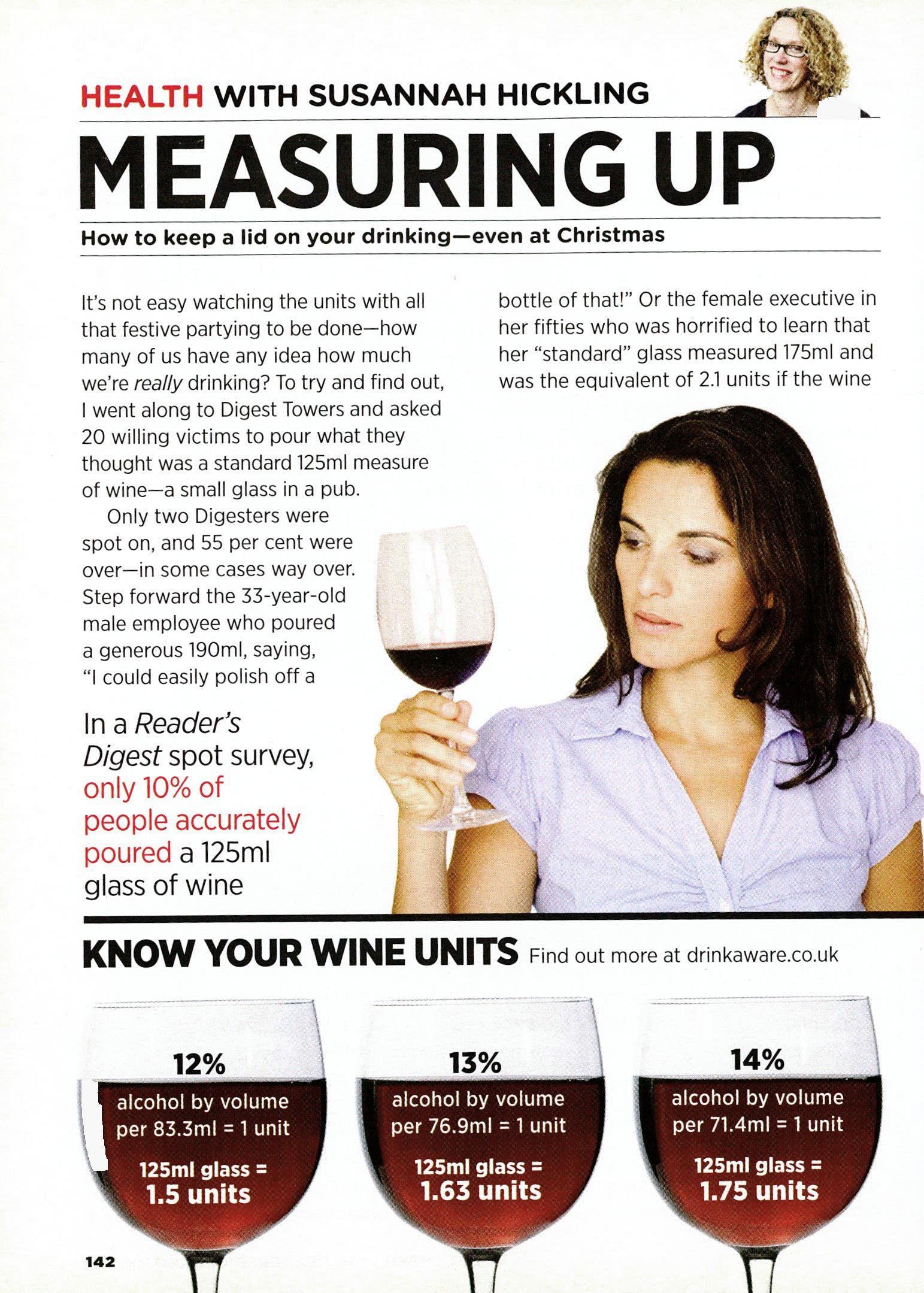
bottle of that!" Or the female executive in her fifties who was horrified to learn that her "standard" glass measured 175m1 and was the equivalent of 2.1 units if the wine
was 12% alcohol by volume. (A lot of wines are more than that.) "My God," she said. "That's what I'd pour at home!"
Lots of people blamed the size of the glass but, hey, we all drink from big glasses now—and some bars serve a 250m1 glass as standard. That's a third of a bottle, and a full three units at 12%. When you consider that drinking more than two units a day raises your risk of a host of nasties—including liver damage, cancer, obesity, osteoporosis and cardiovascular disease—it's enough to make you cancel Christmas.
But if you don't want to do that, try to make sure you alternate your glass of wine with a glass of water—and don't allow people to top up your glass at parties!
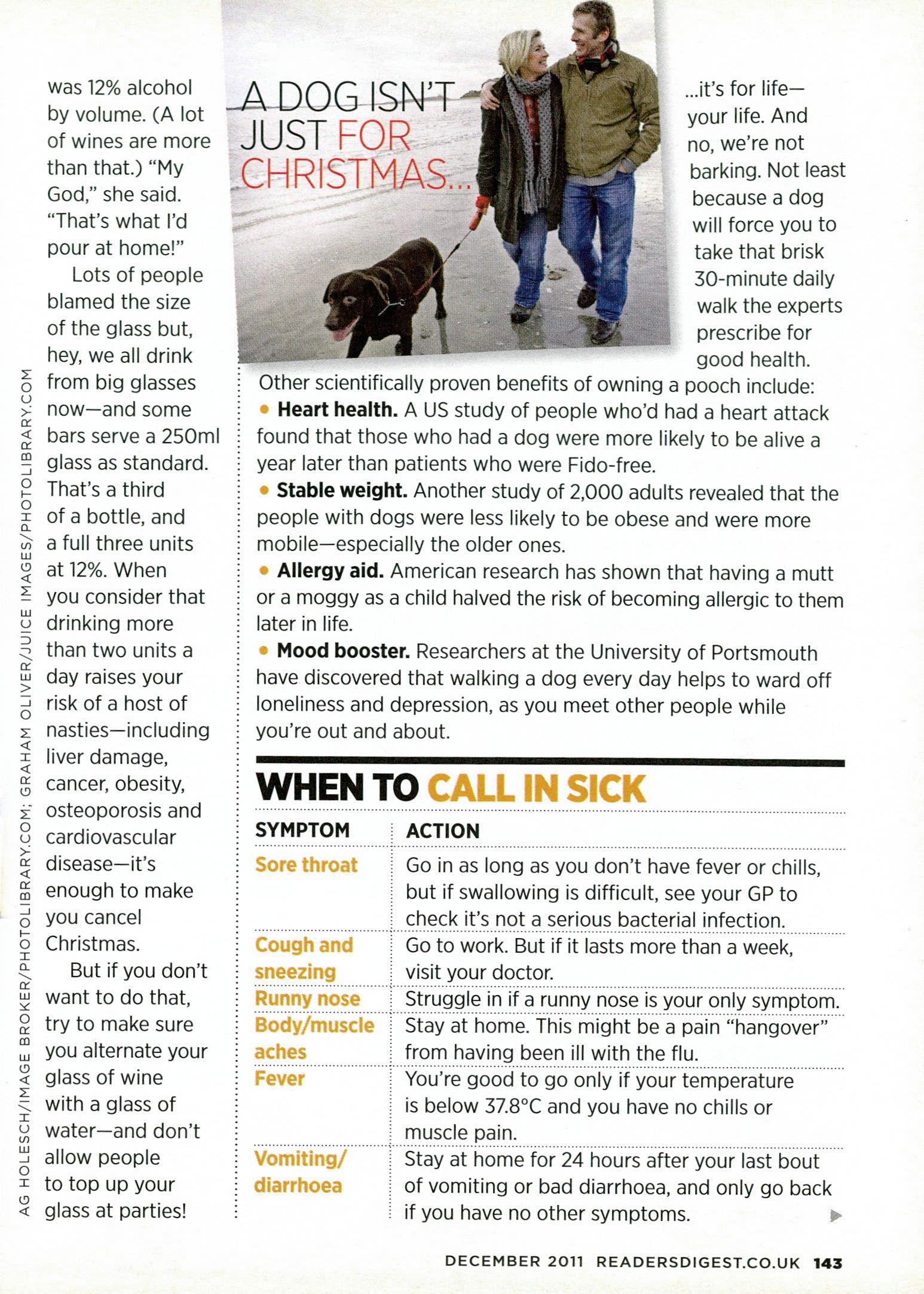
your life And
no, we're not barking. Not least because a dog will force you to take that brisk 30-minute daily walk the experts prescribe for good health.
Other scientifically proven benefits of owning a pooch include:
• Heart health. A US study of people who'd had a heart attack found that those who had a dog were more likely to be alive a year later than patients who were Fido-free.
• Stable weight. Another study of 2,000 adults revealed that the people with dogs were less likely to be obese and were more mobile—especially the older ones.
• Allergy aid. American research has shown that having a mutt or a moggy as a child halved the risk of becoming allergic to them later in life.
• Mood booster. Researchers at the University of Portsmouth have discovered that walking a dog every day helps to ward off loneliness and depression, as you meet other people while you're out and about.
SYMPTOM ACTION
Sore throat
Cough and sneezing
Runny nose
Go in as long as you don't have fever or chills, but if swallowing is difficult, see your GP to check it's not a serious bacterial infection.
Go to work. But if it lasts more than a week, visit your doctor.
Struggle in if a runny nose is your only symptom. Body/muscle Stay at home. This might be a pain "hangover" aches from having been ill with the flu.
Fever
Vomiting/ diarrhoea
You're good to go only if your temperature is below 37.8°C and you have no chills or muscle pain.
Stay at home for 24 hours after your last bout of vomiting or bad diarrhoea, and only go back if you have no other symptoms.
 Dr David Ashton of Healthier Weight
Dr David Ashton of Healthier Weight
Almost anyone who's tried to lose weight knows how frustrating it can be when the weight loss slows and eventually reaches a plateau. There's a lot of misunderstanding as to why this happens, most of which stems from a confused idea of what the term "metabolic rate" means. So let's try and clear up the confusion.
The term "resting metabolic rate" (RMR) simply refers to the number of calories a day you need to maintain your current body weight. Various factors can influence RMR, including age and gender—but body weight is the most important. In short, the heavier you are, the more calories you need to maintain your weight.
Now we can understand the plateau effect. Suppose that at
1.Eat more fibre. Fruit, veg, whole grains and legumes all aid digestion.
your present weight you have an RMR of 2,500 calories, and you then start a 1,000-calories-a-day diet. This means you save 1,500 calories each day—which is what we call the energy deficit. A daily energy deficit of 1,500 calories is 10,500 a week and because a pound of fat equates to 3,500 calories, it leads to a weekly weight loss of three pounds.
But of course, as you lose weight, there will be a corresponding reduction in your RMR. Assume that, as a result of your weight loss, your RMR has fallen to 1,500. If you stay on the 1,000-calories diet, you now have an energy deficit of only 500 a day (or 3,500 per week) which equates to a weekly loss of a pound. Then, if you lose more weight and your RMR falls to 1,250, your energy deficit is just 250 calories, or half a pound of fat a week. The initial weight loss of three pounds per week has fallen to half a pound. So, how do you get over it? The trick is to increase physical activity as your weight comes down: the additional calorie expenditure will compensate for the narrowing of the energy deficit. It's the bit that most people forget, but it's crucial to getting rid of those last few stubborn pounds—and keeping them off.
2. Buy probiotics. These ensure that you have plenty of "good" bacteria in your gut to help digest those big Christmas meals. Find probiotics in yogurts with live cultures—look for
Lactobacillus reuteri or L. acidophilus.
3. Chew gum. Who'd have thought it? Research has shown that gum neutralises the acids in stomach backwash. ■
The hearing aid that thousands have wanted is now available. SoundLens is the world's first totally invisible hearing aid when worn. With SoundLens, nobody can see it because it fits snugly and comfortably right inside your ear canal.
OUT
SoundLens fits snugly in the second bend of your ear canal and uses the ear's acoustics for natural sound quality. But the best bit is nobody can see it.
SoundLens is a completely new concept in hearing help and compensates for your individual hearing loss. Everything works automatically too. There are no controls to worry about so there's no need to keep fiddling about and adjusting settings. You can start enjoying life again as you concentrate on hearing, rather than thinking about your hearing aid.
When speech and conversation sounds are detected the sound is automatically increased at different frequencies so you hear and understand it clearly. Even in background noise.
SoundLens continuously analyses incoming sounds and adapts to each individual situation so you always get the best hearing possible. You get all the benefits you want in a digital hearing aid without the visual stigma that comes with one.
WORLD LEADER
Manufactured exclusively by Starkey, a world leader in hearing aid technology, this special system is now available in the United Kingdom. SoundLens comes packed with Starkey's best feedback canceller and their smartest noise reduction and speech preservation system ever developed.
To learn for yourself about this super new concept for invisible hearing simply complete the coupon or call the freephone number below for further helpful information and free illustrated booklet.
✓ World's first invisible-in-the-canal hearing aid ✓ Custom designed for your ear
✓ Virtually no whistling or buzzing
✓ Works great on the phone
✓
sounding V Completely digital

Mr/Mrs/Miss
Cosmetic "collectibles" are irresistible and make perfect Christmas gifts
Many special-edition make-up items now look so gorgeous, they're like mini works of art—one of my friends, who specially loves Christian Dior creations, places her favourites in a display case.
Every year since 1963, Estee Lauder has introduced limited-edition solid perfumes and refillable powder compacts. In fact, the complete collection travels the world as a museum-style exhibition. "For compact collectors, the annual editions are a very big deal," says Mrs Evelyn H Lauder, senior corporate vice-president, The Estee Lauder Companies. "There are collectors' societies, and many of their members buy three of a type—one to use, one to show in their cabinet and one they keep in the original box as an archival piece." Exclusive to Harrods in the UK, they can sell out in a flash. But if you're looking for a lush, flaunt-me piece for Christmas, the Golden Alligator compact, £36, from the main line, is a classic stunner.
My own weakness is for compacts where the powder itself is embossed with a pattern—I still can't bring

myself to smudge a Christian Dior Tailleur Bar Palette from last summer—it's decorated with an original 1947 illustration by Rene Gruau of a woman wearing a classic Dior suit. This season's Guerlain Parure de Nuit Pressed Powder & Blush (1), £41, is beautifully embossed with a feather motif —and, if you dip into it, is a great complexion enhancer.
I also love Bobbi Brown's Party Shimmer Brick (2), £32.50, a gold-and-silver powder embellished with the outline of a martini glass and shaker. Her inspiration? "Memories of my mum carefully applying her strong white eyeshadow and thick black liner for a party...I thought she was so glamorous." Andrea Garland specialises in reusing vintage tins and compacts for various beauty balms (andreagarland.co.uk). Another cute idea is her retro jewellery with a compartment that opens up to reveal a pot of lip balm. I love the Shelley Necklace (3), fashioned as a small evening bag, and the Archimedes Brooch in the shape of an owl, both £29.50; refills, £5. And for swanky glam, Elizabeth
Arden has encased its famous Eight Hour Cream Lip
Protectant Stick SPF 15 (4), £19, in a gleaming limitededition case (at Harrods you can find it embellished with Swarovski crystals). And look out for festive treats that double as decorations. Paul & Joe's Ornamental Holiday Collection has Self Select Eye Colours in colourful boxes with ribboned hooks, £12 (from Fenwick and Harrods). And Aromatherapy Associates Little Star (5), £10, is a decoration containing their Deep Relax Bath & Shower Oil blend (aromatherapy associates.com). A silent night at last.
Recently, I've been putting the skin on my body (knees, neck) under more scrutiny than my face. Noella Gabriel, director of product and treatment development at Elemis, isn't surprised. "Bodycare is as important as facial skincare, and more women are realising this as the demand to look and feel younger increases," she says. Which is why Elemis has just launched new Pro-Collagen Body Cream, £49, to sit alongside other anti-ageing products in their range. It contains a trio of exotic oils to nourish and hydrate, and laminaria brown seaweed used in micro-lattice technology to create a "body stocking" effect. It plumps—in a good way. And it's one of my winter faves.

There's an image-edit feature on my Mac's iPhoto called De-noise, which makes beauty blips appear to smooth out —similar to what these pore-minimising products are designed to do in real life. Try: • New nanoblur, £19.99, from Boots—it uses optical prism technology to "blur" lines, flaws and pores.
• BeneFit the Porefessional, £23.50, a silky primer that also mattifies—good for touch-ups too.
• Clinique Pore Refining Solutions Instant Perfector, £18, a real smooth-focus finish for pores. •
"Do you realise that every time you lie, a fairy loses its wings," my wife admonishes my four-year-old daughter whenever she's a little economical with the actuante.
Luckily, this might not be true. But if it were, any fairies unwise enough to hang around department stores would soon find themselves flightless.
There are, for a start, the porkies told by customers returning goods —as I've recently been hearing from sales staff.
"Honest, it hasn't ever been used," an assistant at one store was told as milk dripped down the breast pump brought back by a hopeful punter. "I haven't taken it out of the wrapping."
Another customer tried the same "neverbeen-used" line on a shop manager, despite visible clumps of carpet fluff clinging to the sides of the transparent vacuum cleaner.
But there are also the lies told to us by some of the retailers themselves: lies designed to make

us feel better—or, to be more accurate, thinner. This is the world of "vanity sizing", where retailers and manufacturers label bigger sizes as smaller with the aim of boosting our self-esteem.
So it is that a size-14 woman is delighted to slip into a "size 10". A bloke who usually struggles to fit into a 36-inch waist is now a loose-fit 34—and feeling a bit smug about it.
As someone who's put on 20 pounds while my wife is pregnant (I call it empathy weight gain), I feel compelled to excuse these little inexactitudes—as long, of course, as no fairies are around.
In fact, as I hit the scales every morning, I understand that there are lies, damn lies and sizes—it's just a matter of good manners. As that great philosopher Homer Simpson once said: "It takes two to lie —one to lie and one to listen."
Donal answers your questions. Please email queries to excerpts @readers digest. co.uk
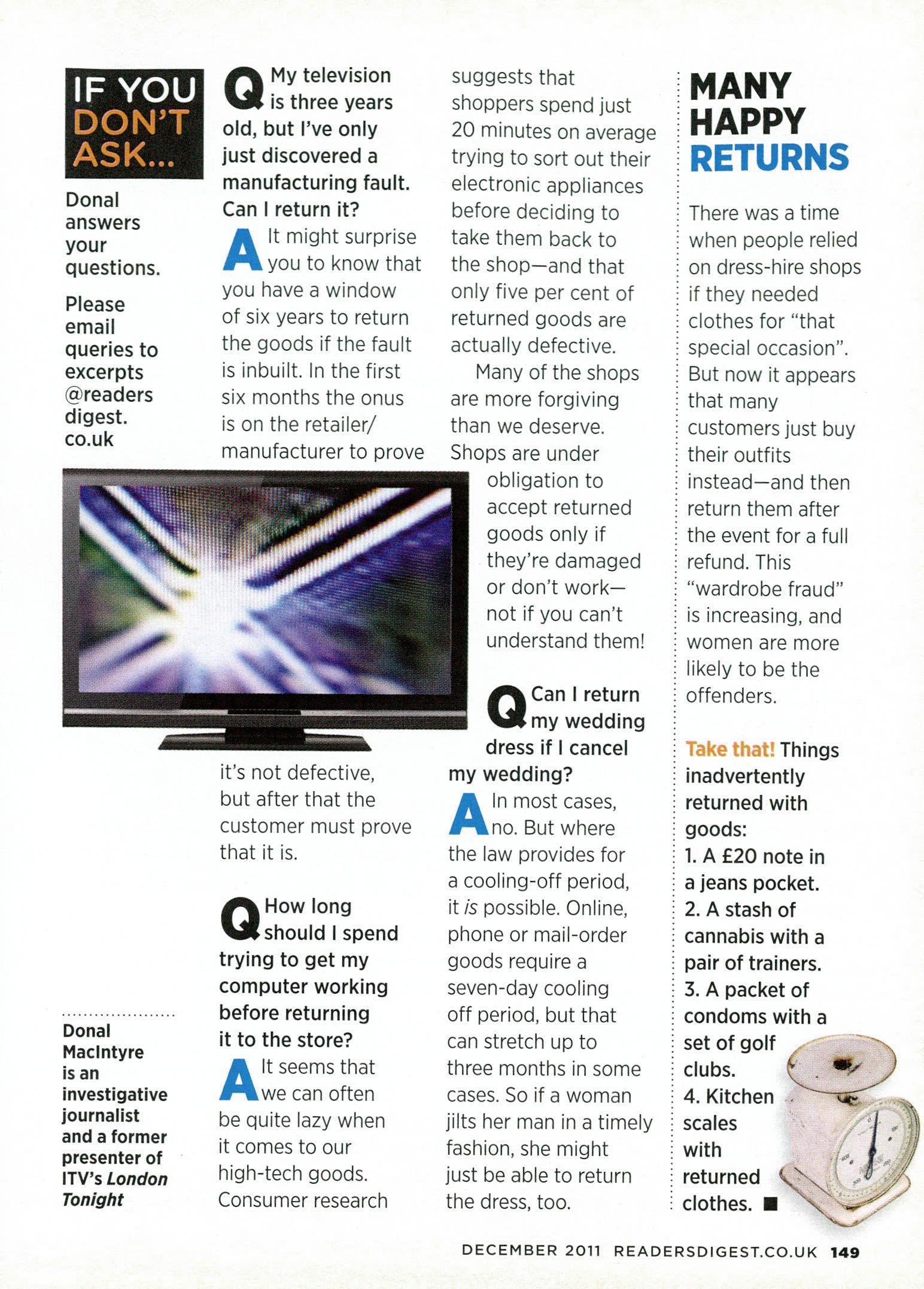
Donal Maclntyre is an investigative journalist and a former presenter of ITV's London Tonight
My television is three years old, but I've only just discovered a manufacturing fault. Can I return it?
AIt might surprise you to know that you have a window of six years to return the goods if the fault is inbuilt. In the first six months the onus is on the retailer/ manufacturer to prove
suggests that shoppers spend just 20 minutes on average trying to sort out their electronic appliances before deciding to take them back to the shop—and that only five per cent of returned goods are actually defective. Many of the shops are more forgiving than we deserve. Shops are under obligation to accept returned goods only if they're damaged or don't work— not if you can't understand them!
it's not defective, but after that the customer must prove that it is.
fit How long Wshould I spend trying to get my computer working before returning it to the store?
Alt seems that we can often be quite lazy when it comes to our high-tech goods. Consumer research
d%Can I return Wig my wedding dress if I cancel my wedding?
A In most cases, /wino. But where the law provides for a cooling-off period, it is possible. Online, phone or mail-order goods require a seven-day cooling off period, but that can stretch up to three months in some cases. So if a woman jilts her man in a timely fashion, she might just be able to return the dress, too.
There was a time when people relied on dress-hire shops if they needed clothes for "that special occasion". But now it appears that many customers just buy their outfits instead—and then return them after the event for a full refund. This "wardrobe fraud" is increasing, and women are more likely to be the offenders.
Take that Things inadvertently returned with goods:
1.A £20 note in a jeans pocket.
2. A stash of cannabis with a pair of trainers.
3. A packet of condoms with a set of golf clubs.
4. Kitchen scales with returned clothes. •
We'd all like to make money without working—but which ways work best?
If you're retired, or wanting to sit back a little and let your investments pay for your lifestyle, then you should be investing in products that give you a regular income. Don't just pick one type, though. As with all investing, it's a good idea to spread your bets. These are some of the options:

My amazing, lovely, beautiful, retirement income supplement plan"
Annuities Generally, people buy an annuity with the money in their pension pot. The idea is that an insurance company takes the money and promises to pay you a fixed amount every year until you die, whether that's in three years or 30. If you live a long time it can be a good bet, but unless you get an index-linked annuity, you'll find the value of your income eroded by inflation. Also, recent problems with the economy and the increase in longevity have meant that annuity rates have gone down significantly. It's very important not just to go for the annuity your pension company offers. Shop around, because there are many on the market—and get some professional advice if you're unsure.
Savings bonds Savings rates are pretty dismal right now, and likely to stay so until the economy strengthens and interest rates go up. On the whole, the best rates can be had with savings bonds —essentially fixed-rate savings accounts. You put a lump of money in for a fixed amount of time (usually one to five years) and the bank promises to pay you a fixed rate of interest for that period. The advantages are that savings accounts are safe (so long as you put less than £85,000 into any one institution), and that you're guaranteed a certain amount of interest. The disadvantages are that your money is tied up, so you can't move it to something better—and, because it's safe, the returns aren't as high as with other products.
Gilts These are government bonds—ie, loans to governments. You buy them at a certain price and at a fixed future date sell them for either more or less than you bought them. While you own the gilt, you're also paid a fixed rate of interest each year. Short-term gifts can last for a year or two; long-term ones for as long as 25 or 30 years—although you can sell them on during that time. The advantage is that gilts are pretty safe, so long as you're lending to a solid Western government. Again, though, because they're safe, the income is usually only about 3-4%.
Rental property Receiving rent from property can be a good option—but it's risky. You may have months when you can't find tenants; and when you do, they may trash the place or refuse to pay. Inevitably, there'll also be problems with the property that need to be fixed quickly— either causing you nuisance or costing you a lot of money. In London, rents are still very high, but elsewhere they generally give a very small yield on investment. One possibility is to try the Barratt Show Homes plan, where you buy a show home and for the first few years rent to Barratt Homes themselves—who say you can get up to seven per cent on your investment.
High-dividend shares This is the most risky option but has the most potential for inflationbeating returns. Companies pay "dividends", or a share of the profits, to their shareholders twice a year, and if you pick shares in companies that offer good dividends, you can make a healthy income each year. While the stock market is in the doldrums, even some high-dividend shares are priced low, so you could get a particularly good return by buying now—but it takes thought and knowledge of a company's history and present state to choose wisely. The website fool.co.uk has a useful "high yield" discussion board where you can talk with other investors about which companies are good to invest in.

In these tough times it's even more important to give to good causes, because charities face the same rising costs as we do.
Before you donate, however, here's some advice on how to make your gift go further...
■ Payroll Giving (payrollgiving. co.uk) deducts donations before tax—so for those in the basic tax bracket, every £1 pledged costs 80p; and for those in the higher band, 60p. The taxman then pays the rest. What's more, the scheme also gives employers the chance to match their employees' donations.
■ Gift Aid allows charities to reclaim the basic-rate tax from HM Revenue & Customs once you've donated money. Gift Aid can also be applied to things you give to charity shops. ■ Charity Bank (charitybank.org) loans the money that you deposit to good causes-050m in all to charities and community projects since its launch in 2002. The savings account rates aren't great, but their best-rate Isa account is alright at 2.5% AER, and you can open that with £250.
■ Charity credit cards are, on the whole, to be avoided. They're a good idea in principle: when you open your account, the provider makes a contribution and from then on you ►
4 donate as you spend. However, most cards give less than 1% of your spend to charity, and their interest rates tend to be in double figures. A better alternative is to take out a cashback credit card and donate the money you receive to your chosen charity. Another option is to shop online at the cashback site giveortake.com, which has goods from most highstreet retailers— and where you can choose to give your cash to charity.
■ Street fundraisers, or "chuggers"—the ones who approach you with a clipboard —should be ignored. The firms employing them receive commission for everyone who signs up, and from every payment you make to the charity. Instead, ensure that all your money goes to your chosen charity simply by donating direct.
Get 40% off the Hi-Life restaurant card, which gives you huge discounts at bars and restaurants all over the country. Usually it's £49.95 for a year, but go to readersdigest.
co.uk/magazine and you can get it for just £29.95.

According to the Halifax, last year the average Briton spent £348 on Christmas presents, buying an average of 18 gifts. That's just under £20 per gift. (The average American spent $638, or roughly £380.) But we can expect these figures to drop this year—a recent poll found that 40% of Brits aim to spend less than usual.
There are currently more than 2.5 million people unemployed in the UK, and joblessness in all its forms is a threat to many of us. It's therefore crucial to protect yourself and your family now in case the worst should happen. Here are my tips on protecting your income:
Set up a savings safety net This is essential, as it gives you something to fall back on. You'll need an easy-access savings account with the best interest rate you can find. Then start a monthly standing order from your current to your savings account until you can cover your living costs for three to six months. Make sure the money is transferred the day your salary is paid, so the extra cash isn't sitting in your current account tempting you to fritter it away.
Income-protection insurance (IPI) replaces a portion of your salary in the event of illness or accident, and pays out until you go back to work. Unless you want to pay a higher premium, you'll have to wait around three months to start receiving money.
Unfortunately, IPI does not guard against redundancy.
Take out critical-illness
insurance Although critical illness is something none of us wants to think about, being insured against it gives you peace of mind should your health fail. Many companies offer critical-illness cover as part of an employee's package, so it's worth checking with your HR department before taking it out. Some policies pay out the same lump sum at any point, but are more expensive than those that reduce the amount over time. (This is designed to be in sync with decreasing mortgage payments.)
Get mortgage payment protection insurance If you don't have enough money saved up to cover your
mortgage payments in the event of unemployment or ill health, consider mortgagepayment-protection insurance (MPPI). Don't use your mortgage lender for MPPI if you can help it, as they charge up to three times as much as independent providers. Be mindful, too, that many MPPIs exclude stress and back problems—which are two of the most common reasons for claims.
Why redundancy insurance is not worth having The trouble with redundancy insurance is that it pays out only for compulsory redundancy rather than if you take voluntary. There's also a qualifying period of 120 days, which means that if you're made redundant within that time, you won't be able to claim.

"Hi there, I wonder how quickly I can set up a life insurance policy?"
...order your travel money in advance if you're going away over Christmas. You can get a lot more for your money if you shop around early. Generally, the best rates are found online. I use moneycorp.com, as they tend to give the best rates of all. They also offer free next-day delivery, or you can pick the cash up for free at the airport. Try to use credit cards as little as possible when abroad. Not only is it far too easy to be a victim of fraud, but banks charge at least 2.75% per transaction. The safest way is to use cash or a prepaid card specialising in foreign currency. ■
Jasmine Birtles is a personal finance writer and the founder of moneymagpie.com
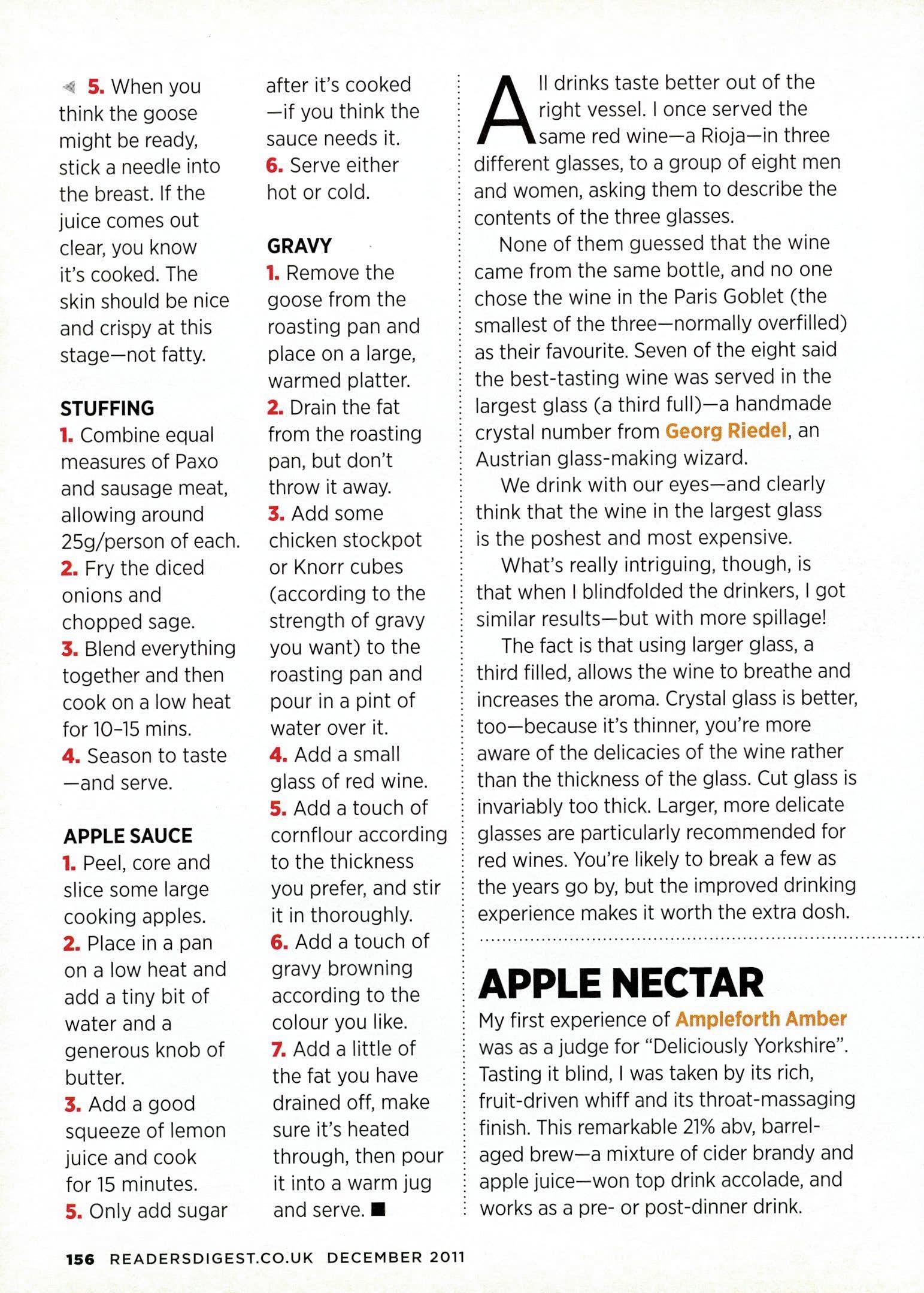
4 5. When you think the goose might be ready, stick a needle into the breast. If the juice comes out clear, you know it's cooked. The skin should be nice and crispy at this stage—not fatty.
1. Combine equal measures of Paxo and sausage meat, allowing around 25g/person of each.
2. Fry the diced onions and chopped sage.
3. Blend everything together and then cook on a low heat for 10-15 mins.
4. Season to taste —and serve.
1.Peel, core and slice some large cooking apples.
2. Place in a pan on a low heat and add a tiny bit of water and a generous knob of butter.
3. Add a good squeeze of lemon juice and cook for 15 minutes.
5. Only add sugar
after it's cooked —if you think the sauce needs it.
6. Serve either hot or cold.
1.Remove the goose from the roasting pan and place on a large, warmed platter.
2. Drain the fat from the roasting pan, but don't throw it away.
3. Add some chicken stockpot or Knorr cubes (according to the strength of gravy you want) to the roasting pan and pour in a pint of water over it.
4. Add a small glass of red wine.
5. Add a touch of cornflour according to the thickness you prefer, and stir it in thoroughly.
6. Add a touch of gravy browning according to the colour you like.
7. Add a little of the fat you have drained off, make sure it's heated through, then pour it into a warm jug and serve. ■
All drinks taste better out of the right vessel. I once served the same red wine—a Rioja—in three different glasses, to a group of eight men and women, asking them to describe the contents of the three glasses.
None of them guessed that the wine came from the same bottle, and no one chose the wine in the Paris Goblet (the smallest of the three—normally overfilled) as their favourite. Seven of the eight said the best-tasting wine was served in the largest glass (a third full)—a handmade crystal number from Georg Riedel, an Austrian glass-making wizard.
We drink with our eyes—and clearly think that the wine in the largest glass is the poshest and most expensive.
What's really intriguing, though, is that when I blindfolded the drinkers, I got similar results—but with more spillage!
The fact is that using larger glass, a third filled, allows the wine to breathe and increases the aroma. Crystal glass is better, too—because it's thinner, you're more aware of the delicacies of the wine rather than the thickness of the glass. Cut glass is invariably too thick. Larger, more delicate glasses are particularly recommended for red wines. You're likely to break a few as the years go by, but the improved drinking experience makes it worth the extra dosh.
My first experience of Ampleforth Amber was as a judge for "Deliciously Yorkshire". Tasting it blind, I was taken by its rich, fruit-driven whiff and its throat-massaging finish. This remarkable 21% abv, barrelaged brew—a mixture of cider brandy and apple juice—won top drink accolade, and works as a pre- or post-dinner drink.
Choose the right glass and your Christmas wine will taste even better!
Choose crystal over thick cut glass
If you're looking for an accompaniment to the Boxing Day turkey butty or curry, then try Sierra

Father Rainer has plans for that apple...
Only fill the glass up one third—it increases the aroma and allows the wine to breathe
A large, delicate glass is especially recommended for reds
It was created by Father Rainer Verborg, a German-born Benedictine monk who trained as a chef and a trauma surgeon before a religious calling led him to the 200-year-old Ampleforth Abbey, which has produced cider for over a century. He distilled the first cider brandy in 2003, and the rest, so they say, is history. Purchase 50c1 for £16.50 at ampleforth.org.uk.
Nevada Pale Ale (£1.74 for a 350m1 bottle). The Meantime Brewery in Greenwich also offers nicely alcoholic barleysugar tipples, like the London Pale Ale (05.99 for a case of 12x330ml bottles). ■
Nigel Barden is the food and drink presenter on Simon Mayo's show on BBC Radio 2, and chairman of the Great Taste Awards.
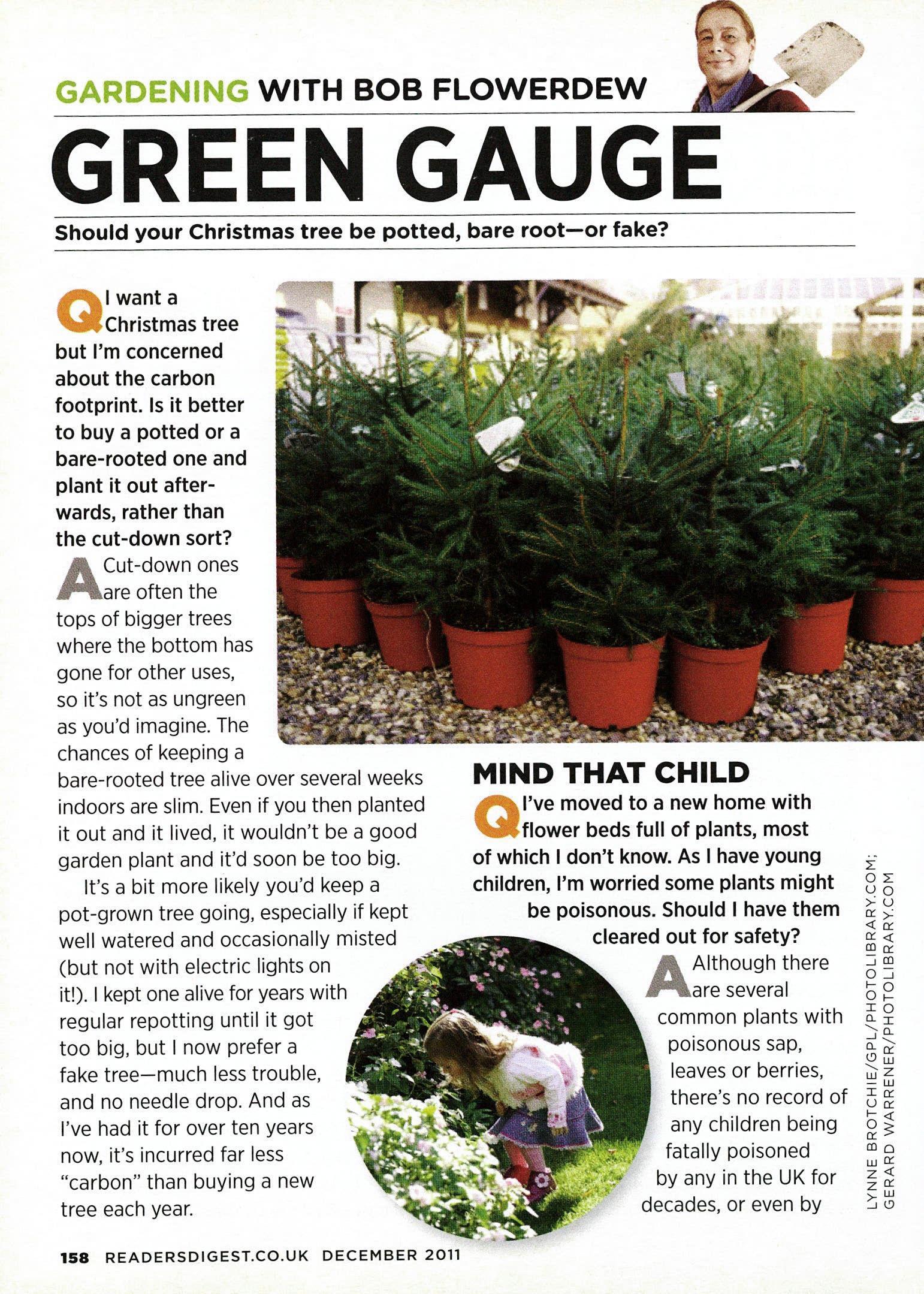
Should your Christmas tree be potted, bare root—or fake?
GI want a Christmas tree but I'm concerned about the carbon footprint. Is it better to buy a potted or a bare-rooted one and plant it out afterwards, rather than the cut-down sort?
ACut-down ones are often the tops of bigger trees where the bottom has gone for other uses, so it's not as ungreen as you'd imagine. The chances of keeping a bare-rooted tree alive over several weeks indoors are slim. Even if you then planted it out and it lived, it wouldn't be a good garden plant and it'd soon be too big.
It's a bit more likely you'd keep a pot-grown tree going, especially if kept well watered and occasionally misted (but not with electric lights on it!). I kept one alive for years with regular repotting until it got too big, but I now prefer a fake tree—much less trouble, and no needle drop. And as I've had it for over ten years now, it's incurred far less "carbon" than buying a new tree each year.
I've moved to a new home with flower beds full of plants, most of which I don't know. As I have young children, I'm worried some plants might be poisonous. Should I have them cleared out for safety?
AAAlthough there .are several common plants with poisonous sap, leaves or berries, there's no record of any children being fatally poisoned by any in the UK for decades, or even by
mushrooms. Of course we must tell them to avoid "attractive" berries, and not to eat, suck, chew or handle any part of any plant unless we give it to them. There is, however, a risk of skin damage or eye injury from plants with irritant sap (often white). And plants with thorns may cause painful wounds and allow infections to get hold. But the most dangerous things are ponds, pools and water butts.
Even so, your children are safer in a garden with all of the above than out on the street, where traffic is much more of a serious threat.
The small lawn in front of my house has got into a terrible state, what with the drought and then weeds moving in. A friend suggests I get rid of it and put gravel down instead to save the effort of mowing. Does this really work? If so, how?
AProvided the weeds are only small, you can simply lay a geo-textile (woven plastic material) over them and then cover with a thick layer of gravel. The lack of light will kill off the grass and most small weeds. A thin layer would allow strong weeds such as thistles to push the textile up into view, so any of these may need eradicating first unless you use a lot of gravel (say two inches).
It'd be better to strip off the turf with any weeds and stack this in a hidden corner under an opaque black plastic sheet, where it'll rot down to make loam for adding to beds and borders or for bulking potting composts.
Bob Flowerdew is an organic gardener and a regular on BBC Radio 4's Gardeners' Question Time. Send your gardening questions to Bob at excerpts@readersdigest.co.uk
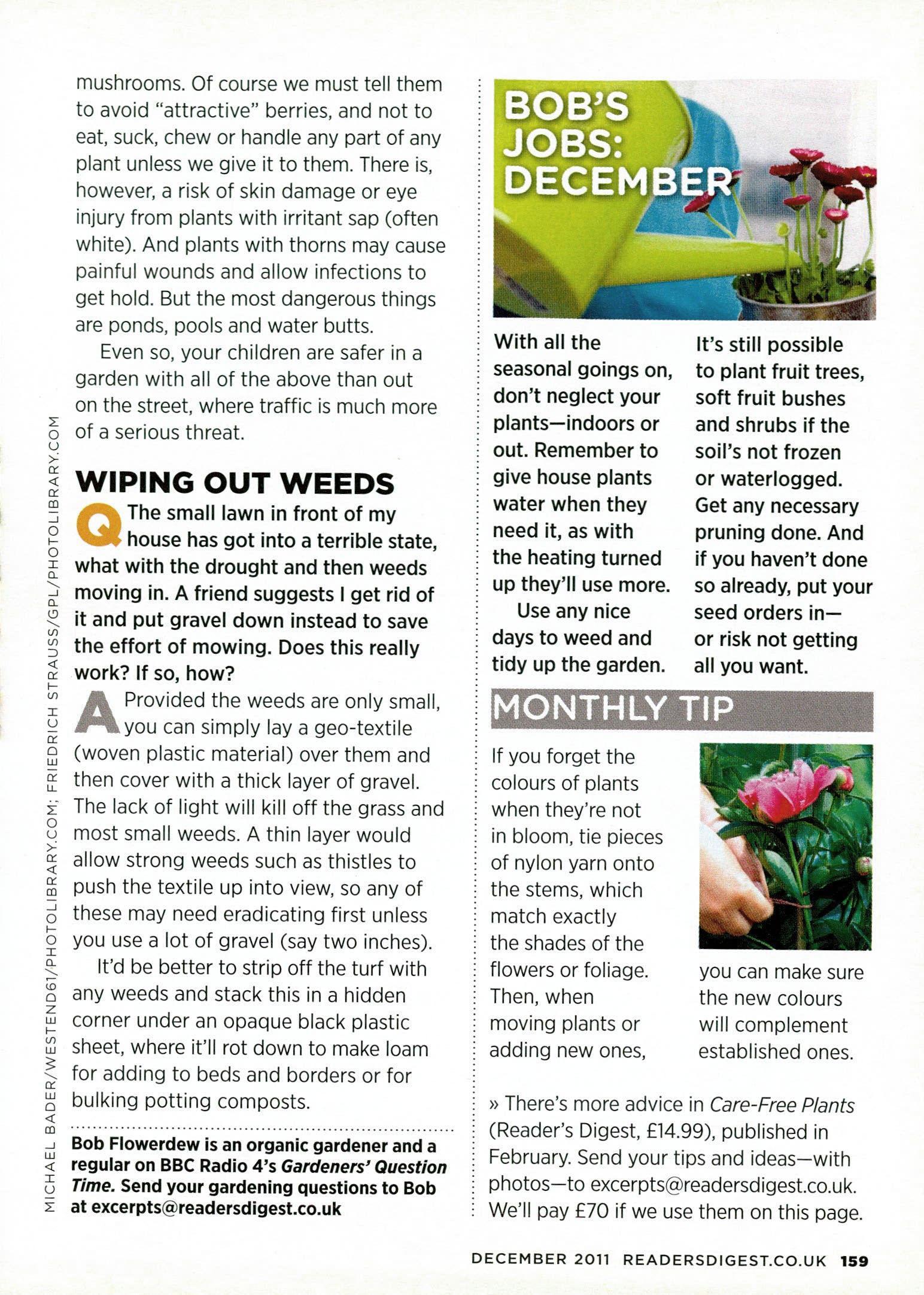
With all the It's still possible seasonal goings on, to plant fruit trees, don't neglect your soft fruit bushes plants—indoors or and shrubs if the out. Remember to soil's not frozen give house plants or waterlogged. water when they Get any necessary need it, as with pruning done. And the heating turned if you haven't done up they'll use more. so already, put your Use any nice seed orders in— days to weed and or risk not getting tidy up the garden. all you want.
If you forget the colours of plants when they're not in bloom, tie pieces of nylon yarn onto the stems, which match exactly the shades of the flowers or foliage. Then, when moving plants or adding new ones,
you can make sure the new colours will complement established ones.
» There's more advice in Care-Free Plants (Reader's Digest, £14.99), published in February. Send your tips and ideas—with photos—to excerpts@readersdigest.co.uk. We'll pay £70 if we use them on this page.
The bird that shows why it's not always wise to be too adaptable
Ever driven around a corner and into a group of pheasants dithering in the road? It's a common experience this time of year—an astonishing 38 million hand-reared pheasants are released every autumn. Around 15 million of them will be shot, and many are simply thrown away.
The pheasant is one of the world's most hunted birds because it's adaptable and breeds well in captivity. Pheasants were originally from Asia but have been in the UK since before the Normans, probably imported by the Romano-British in the tenth century.
My father used to be a keen shot, but
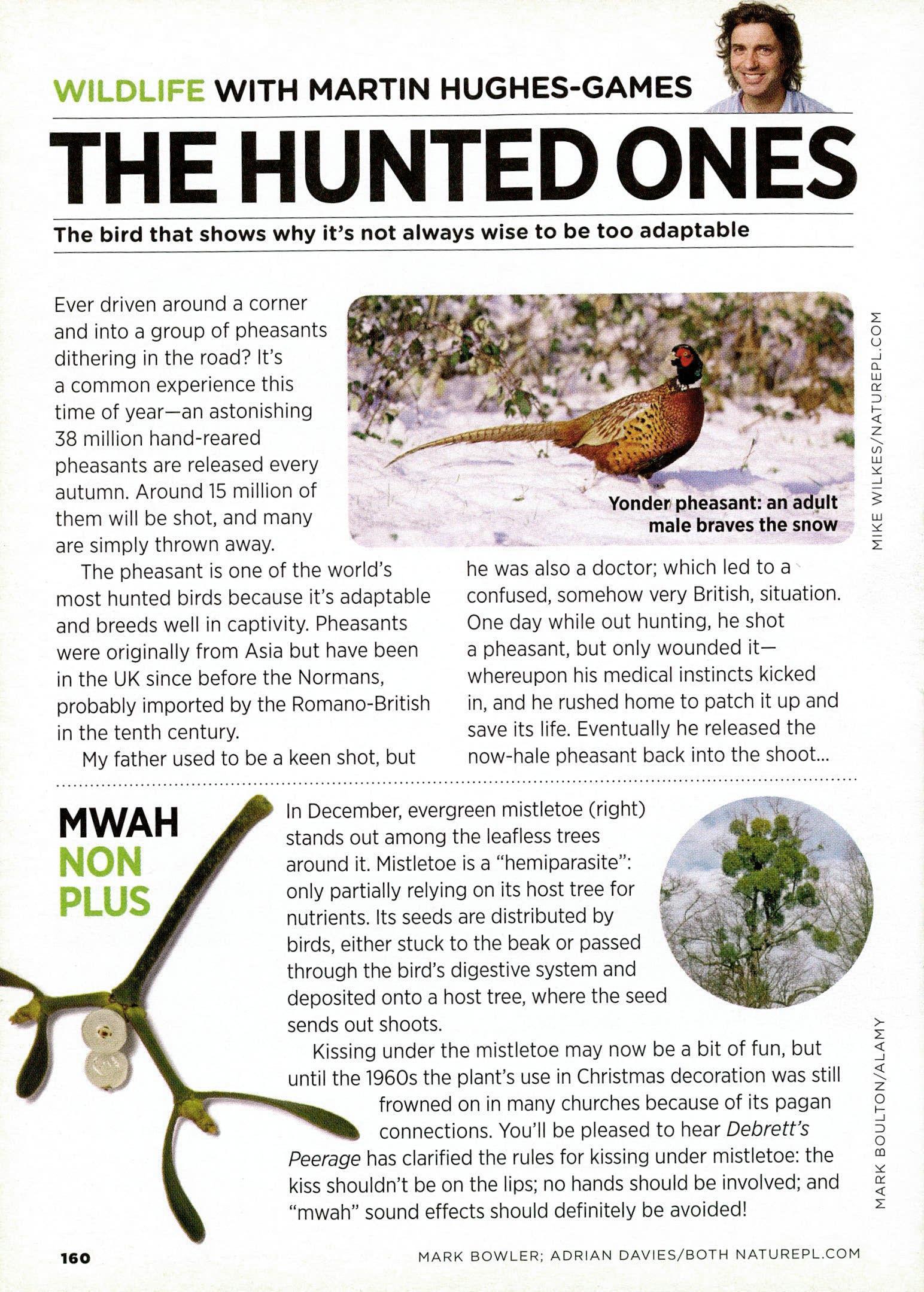
Yonder pheasant: an adult male braves the snow
he was also a doctor; which led to a confused, somehow very British, situation. One day while out hunting, he shot a pheasant, but only wounded it— whereupon his medical instincts kicked in, and he rushed home to patch it up and save its life. Eventually he released the now-hale pheasant back into the shoot...
In December, evergreen mistletoe (right) stands out among the leafless trees around it. Mistletoe is a "hemiparasite": only partially relying on its host tree for nutrients. Its seeds are distributed by birds, either stuck to the beak or passed through the bird's digestive system and deposited onto a host tree, where the seed sends out shoots.
Kissing under the mistletoe may now be a bit of fun, but until the 1960s the plant's use in Christmas decoration was still frowned on in many churches because of its pagan connections. You'll be pleased to hear Debrett's Peerage has clarified the rules for kissing under mistletoe: the kiss shouldn't be on the lips; no hands should be involved; and "mwah" sound effects should definitely be avoided!
POWER inside a badger sett. Badgers live in fairly loosely organised clans—sometimes there's a dominant female (sow) and dominant male (boar); other times they all just rub along together, although breeding sows are always dominant over the males. A sett is usually home to five to eight badgers, but occasionally far more. Badger setts can be vast, with each generation adding to the structure. One I know about had 180 entrances, 880 yards of tunnels, and more than 50 nest chambers—it must have existed for hundreds of years.
Male badgers are largely monogamous, but some females are anything but! One study found that over half of the young in the sett were fathered by boars from other groups. So the females' nightly wanderings are for more than just gathering worms for food. ("I'm just going out for some more worms, dear!")
Badgers will sometimes bury their dead—either in chambers within the sett, which are then sealed off, or outside. This is not proven, but I think it's been seen too often for it to be dismissed. See the Autumnwkch badgers at wildlink.org. •
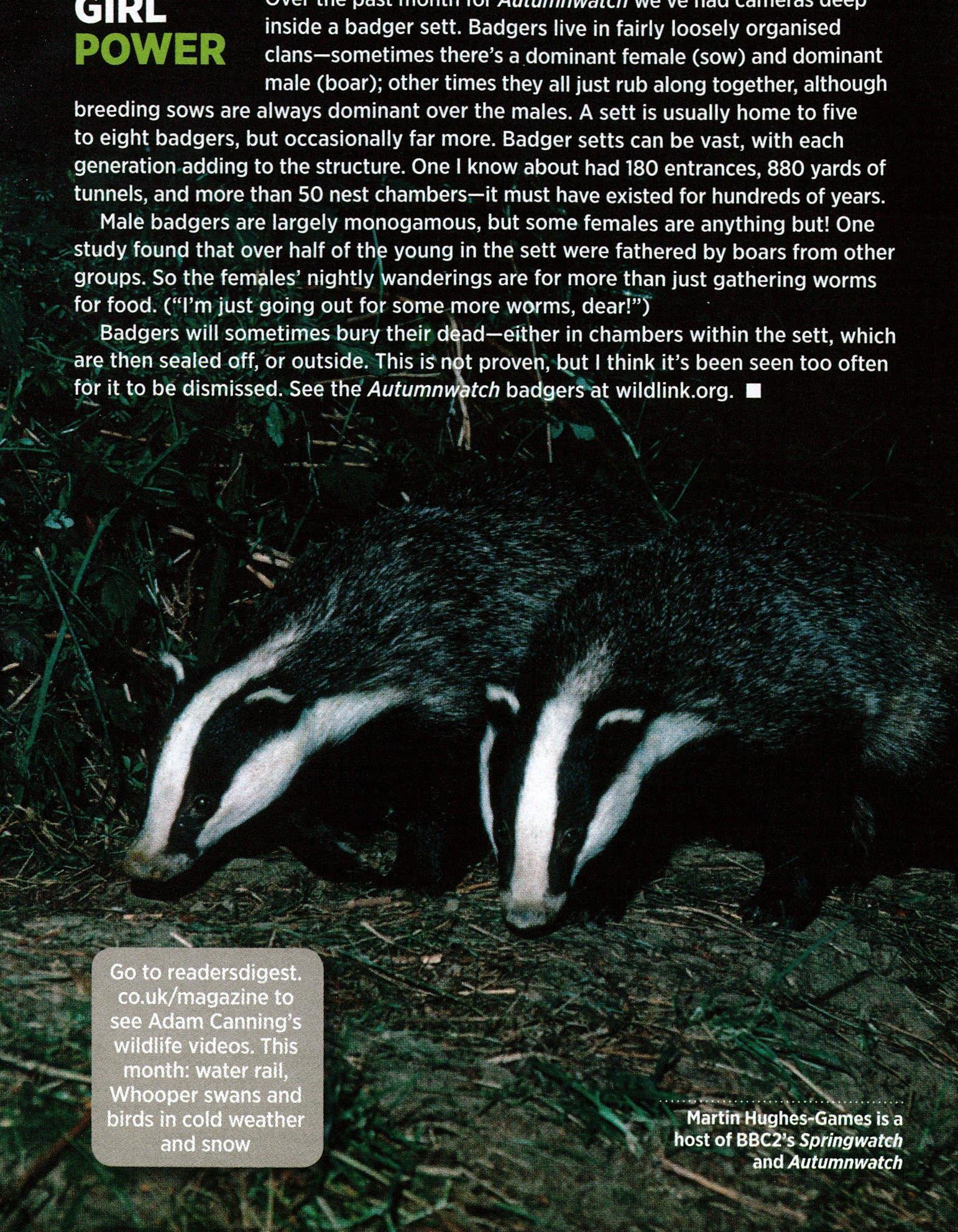
Go to readersdigest. co.uk/magazine to see Adam Canning's wildlife videos. This month: water rail, Whooper swans and birds in cold weather and snow Martin Hughes-Games is a host of BBC2's Springwatch and Autumnwatch
Few business sectors innovate as fast as technology: the frenzied pace of change makes for mind-boggling choices every time you step into a gadget shop. But the good news is that this competition drives down costs. It also means that companies are likely to come out with products that let you modify existing computers. This means that if you're thinking of buying someone a bit of kit for Christmas, it won't necessarily bust your budget.
The Amazon Kindle Fire—E130 and closest rival so far to the iPad—is leading the mass-market charge, but, I have to admit, the gizmo I'm most excited by just now is the new Raspberry Pi. It's a powerful machine that's microscopic (well, the size of a credit card) and you can plug it into a TV or touchscreen to get a tablet. But what's really revolutionary about this wee thing is the price tag. For years, people have been trying to bring out a sub-£100 PC, so Raspberry Pi's £25 price makes it the kind of product that business bods like me label a "gamechanger". The Raspberry Pi Foundation, the charity behind it, is mostly looking at educational and developing-world

markets, but a rash of other interesting applications and rivals is bound to follow.
Meanwhile, in my Race Online 2012 team, we've been working with the big technology companies to ensure that nobody is put off going online by the cost (23% of the 8.7 million in the UK who've never been online say it's the price that's stopping them). Microsoft and PCXUK have both brought out high-quality refurbished PCs set up with Windows 7; Remploy's version comes fitted with open-source software. Go to champions. go-on.co.uk/ways-to-be-a-digitalchampion/buy for the latest deals.

Another bit of ultra-lowcost magic that's recently hit the market and gets my vote is Sugru. This is a squishy, brightly coloured substance that you mould like Play-Doh, but 24 hours later it fixes like superglue. It won't help you get online, but it's incredible at customising or prolonging the lifespan of the gadgets that do. Go to the inventor's websiteher name's Jane—at Sugru. com to see all the amazing ways people are using it— from making teeny digital camera buttons big enough to move, to sculpting little feet for MacBooks so they stay cool, to fixing broken computer keypads, to making plinths to stick cameras or iPhones on your bike—the sky's the limit really. Just £7 for a squidgy packet of endlessly useful fun!
If your DIY tendencies are even more Heath Robinson, take a look at Arduino (right), which lets you make computers to sense and control the world around you, and make really
unlikely physical objects interactive: operate a coffee machine with your Wii; get your electricity monitor to beam your power usage onto Twitter; enable your plants to phone or email you when they need watering. If that sounds exciting, but a bit mindboggling, check out the Technology Will
Save Us site, which runs really fun workshops
Get the party started with the Lucky Voice Party Box
teaching people how to fix, reuse or repurpose the products that surround us.
If you're after something that's a bit more plug-inand-play (and be warned: I'm about to give my Lucky Voice business a shameless plug), then this is one karaoke party box that no home should be without. You get 8,000 karaoke hits on the web, plus microphone and mixer. Just add a home computer and your own dulcet tones! The limited edition, white-assnow Lucky Voice Party Box launches exclusively this Christmas in Selfridges and at shop.luckyvoice. com, £49.95. ■
Martha Lane Fox is the UK's digital champion and founder of race online2012.org
The iconic DeLorean didn't die—it just got better
You might think that the DeLorean sports car is just a dead relic of the 80s. But the truth is the DeLorean is alive and well, and thriving in Texas. It even has a glowing electric future.
The DMC-12 coupe from the DeLorean Motor Company was a style success but a business disaster. The whole operation was the brainchild of the flamboyant highflying motor executive John DeLorean, who planned to manufacture the Italian-designed cars in Northern Ireland. But the car was underpowered and overpriced, and the whole operation saw low sales and quality issues, collapsing in 1982 amid allegations (later dismissed) of links to drug-trafficking. An appearance by the DMC-12 in the Back to the Future film in 1985 sealed its place in popular culture, and that appeared to be that.
In 1995 a Texas company bought the now: freshly jumble of parts and the rights to minted (above); John DeLorean with the original
the DeLorean name, and a new DeLorean Motor Company was born. Since then, DMC engineers have been churning out new cars, steadily improving the original compromised coupe to the point where you can now get a DMC-12 with 80% original parts and 20% new ones. Modern DeLoreans can come fitted with new, faster engines, and you can even have GPS, Bluetooth and an iPod dock fitted. Want to fulfil a Hollywood dream? A new DeLorean can be yours for around £37,000. Go to DeLorean.com to make it happen.

Except the DeLorean wasn't dead just yet. While only a few thousand cars had been completed and sold, the parts for many thousands more were manufactured.
But that's not the end of it. The DeLorean Motor Company has recently revealed an electric prototype DeLorean called the DMCEV. With this innovation, the DeLorean looks set to survive well into the 21st century.

Audi Q3 2.0 TDI SE 177PS S-tronic (E28,610)
I've covered the exciting new Range Rover Evoque already, but this mini-SUV is a keen new rival to that car. It's neat, almost cute, on the exterior but properly dramatic and beautiful inside. This higher-powered diesel is the pick of the bunch, and it'll deliver you an urgent, practical and stylish allrounder. A contender, indeed.
Mini's assault on the world continues with this feisty little thing, which is hitting the roads now. Looking rather like a standard Mini that's seen the wrong end of a chainsaw, the distinctive lowered roof is meant to resemble a baseball cap on backwards. It's a bagful of fun, and this Cooper S model is the best of them all.
Rolls-Royce Ghost 6.6 V12 EWB (U30,000)
The Rolls-Royce Ghost—the slightly more realistic sibling to their massive Phantom— has been a huge success for the company, with over 2,000 sold so far. This new EWB (Expanded Wheelbase) version has more room in the back, so you can stretch out even more as you swig your bubbles. This is the car you buy when you've won the EuroMillions but don't want to look silly. Well, not too silly at least.
The rubber on standard summer tyres starts to harden at temperatures below 7°C, reducing the car's ability to brake. Winter tyres are made from a different kind of rubber and have more grooves to displace water from wet roads. Winter tyres also grip more in the snow. If you can afford the initial investment, buying this second set of tyres will save you money in the long run because the wear will be less overall. Car and tyre companies will now even store your other set for you, ready to swap them when the seasons change. •
Conor McNicholas is the former editor of BBC Top Gear Magazine.Kelly Wickham from West Sussex fell for Venice despite the British weather
As I wandered through the alley, listening to the waves lapping against the brightly painted houses, I wondered if I was dreaming. I was lost. Not just in Venice, but in a fantasy.
As I approached yet another rickety wooden bridge, I examined my weather-beaten map—soggy and torn in the rain. As far as I could see, I was now leaving Dorsoduro.
I wasn't sure if I was right or not—nor did I care. The wind was howling and the rain was pouring down, so I sought shelter in a little restaurant called Gino's.
I took a table by the window and ordered cannelloni. It was good to get out of the rain for a while and warm up amid the cosy bustle of the restaurant. After the last sip of rosé, I checked my watch: it was 11.30pm. I quickly ordered the bill, threw down some screwed-up euros, and dashed out of the restaurant. The last bus to mainland Italy was in three minutes. If I missed it, the taxi would be an expensive ride home.
The next morning it was raining hard
Reader Kelly Wickham looks out over the "Floating City"
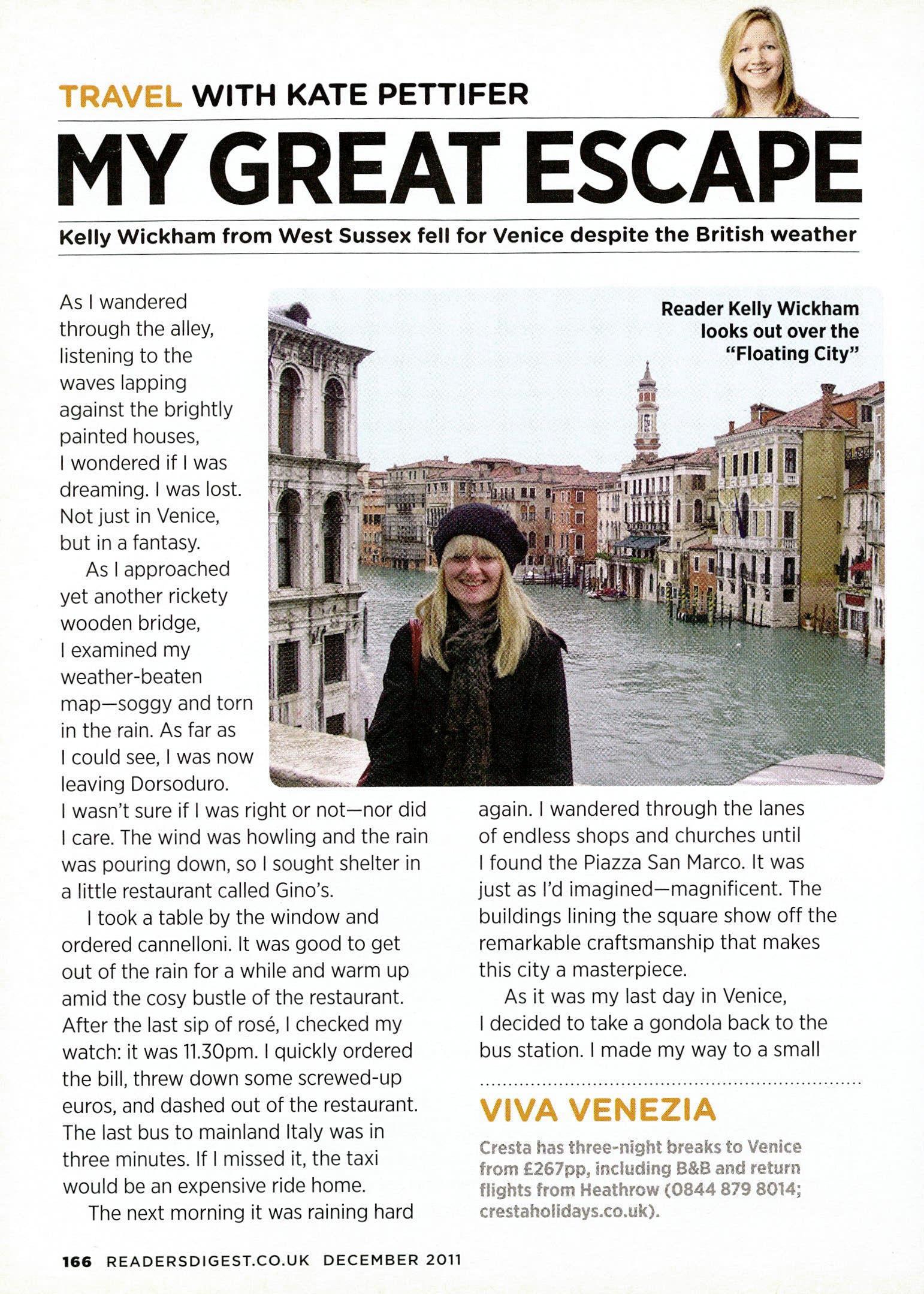
again. I wandered through the lanes of endless shops and churches until I found the Piazza San Marco. It was just as I'd imagined—magnificent. The buildings lining the square show off the remarkable craftsmanship that makes this city a masterpiece.
As it was my last day in Venice, I decided to take a gondola back to the bus station. I made my way to a small
Cresta has three-night breaks to Venice from £267pp, including B&B and return flights from Heathrow (0844 879 8014; crestaholidays.co.uk).
hut, tilting into the Grand Canal. The men standing there were in beautiful straw hats, all eager to make some money from the quieter winter trade. I bartered for less than a minute and was escorted into an empty boat. The rain had stopped and the wind was calming. They say Paris is the most romantic city in the world. But, as I sat in the gondola, dipping under fabulous bridges and weaving around the magical, crumbling buildings, I had to disagree.
Send us a photo of your favourite holiday, tell us briefly what made it so special, and if we include it on this page we'll pay you £70. See address on p5.

From December until the end of February, you can enjoy a spot of winter sun and five-star comforts for less at the Columbia Beach Resort in Pissouri Bay, Cyprus. Stay seven nights and pay around £128 a night for a Junior Suite Garden View. This is the standard low-season b&b rate, but they'll also throw in dinner each evening and a half-hour spa treatment (some dates excluded; +375 25 833 333 000; columbia-hotels.com).
Why walk to Santa's grotto when you can take a steam train in a restored Victorian carriage? The Isle of Wight Steam Railway is running the Santa Express on dates throughout December, shuttling little ones to meet Father Christmas at Havenstreet Station, where there's also a winter wonderland mood-setter. Tickets, including ferry crossings with Wightlink, cost £22.50 for adults, £14.50 per child (01983 882204; iwsteamrailway.co.uk).
Guimaraes in Portugal is a 2012 European Capital of Culture, making it a hot ticket for long weekends next year. The fortified town is home to two pousadas (luxury hotels), including an impressive converted convent. Book for April onwards, when temperatures are in the 20s. Keytel (020 7953 3020; keytel.co.uk) has flexible "Pousada Passports" with five nights' accommodation and five days' car hire from £270pp (based on two sharing).
9flats.com With 20,000 houses, apartments and boats everywhere from Singapore to Brazil listed on 9flats.com, it's a great online matchmaker for those in search of a more personalised stay overseas, or those looking to rent out their homes. The site collates feedback both for properties and for guests, manages the payments and lets you list your home for free, making its living from 15% commission on each booking. ■
AU HIEN VIC
DucAnoNAL
I FAIN RSI 1p IN SCI I0Ot S
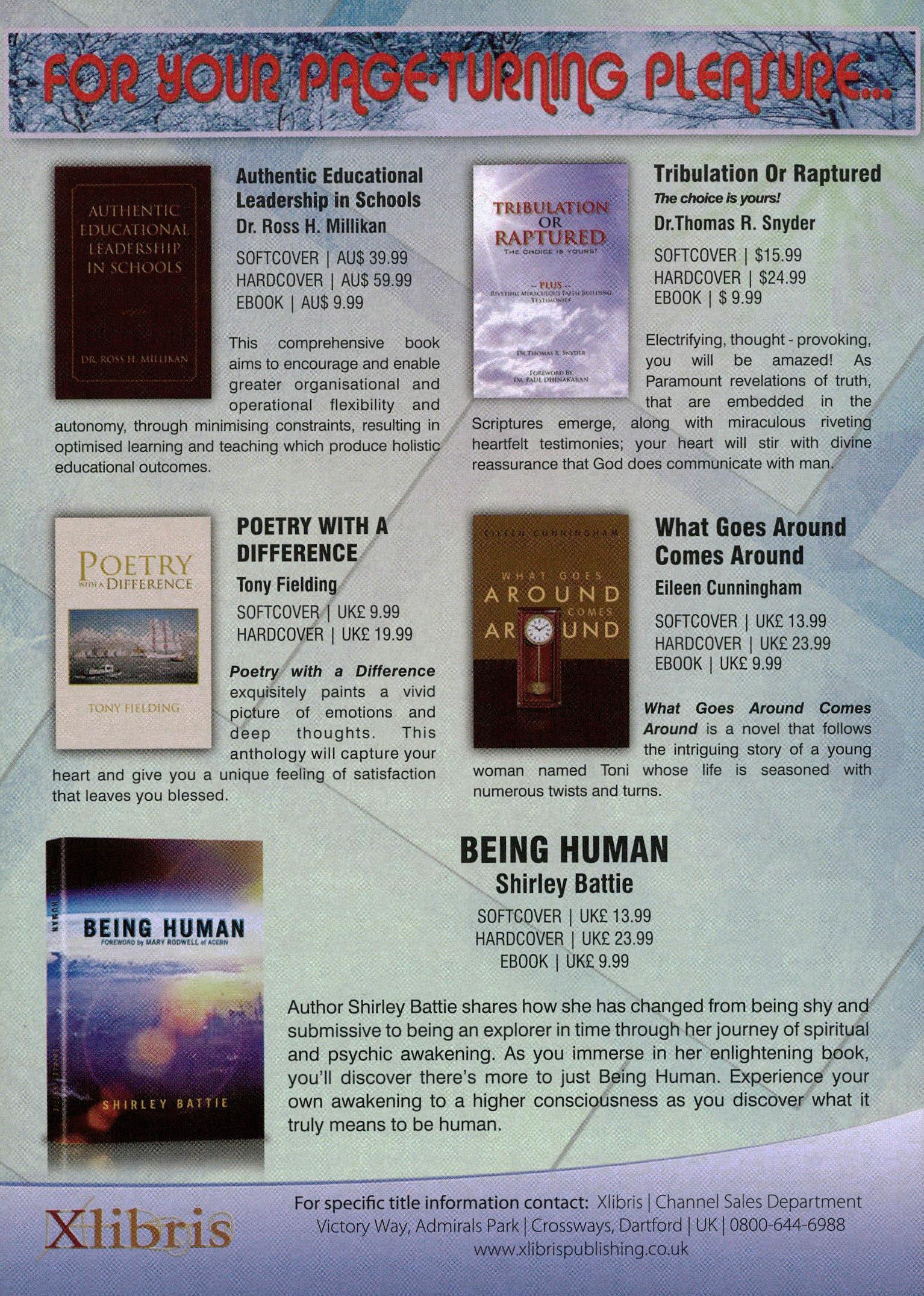
Authentic Educational Leadership in Schools
Dr. Ross H. Millikan
SOFTCOVER 1 AU$ 39.99
HARDCOVER 1 AU$ 59.99
EBOOK 1 AU$ 9.99
This comprehensive book aims to encourage and enable greater organisational and operational flexibility and autonomy, through minimising constraints, resulting in optimised learning and teaching which produce holistic educational outcomes.
Tony Fielding
SOFTCOVER 1 UK£ 9.99
HARDCOVER 1 UK£ 19.99
Poetry with a Difference exquisitely paints a vivid picture of emotions and deep thoughts. This anthology will capture your heart and give you a unique feeling of satisfaction that leaves you blessed.
I rtiBot OR RAL'ttlU.l L)
Tribulation Or Raptured
The choice is yours!
Dr.Thomas R. Snyder
SOFTCOVER 1 $15.99
HARDCOVER 1 $24.99
EBOOK 1 $ 9.99
Electrifying, thought - provoking, you will be amazed! As Paramount revelations of truth, that are embedded in the Scriptures emerge, along with miraculous riveting heartfelt testimonies; your heart will stir with divine reassurance that God does communicate with man.
Eileen Cunningham
SOFTCOVER UK£ 13.99
HARDCOVER 1 UK£ 23.99
EBOOK 1 UK£ 9.99
What Goes Around Comes Around is a novel that follows the intriguing story of a young woman named Toni whose life is seasoned with numerous twists and turns.
Shirley Battle
SOFTCOVER 1 UK£ 13.99
HARDCOVER 1 UK£ 23.99
EBOOK I UKE 9.99
Author Shirley Battie shares how she has changed from being shy and submissive to being an explorer in time through her journey of spiritual and psychic awakening. As you immerse in her enlightening book, you'll discover there's more to just Being Human. Experience your own awakening to a higher consciousness as you discover what it truly means to be human.

BOOKS FOR CHRISTMAS BY A
N WILSONEXTRACTS FROM OUR FAVOURITE NEW RELEASES DAVID HOCKNEY: FROM BRADFORD TO CALIFORNIA AND THE VEGETABLES THAT SAVED THE WORLD BOOKS THAT CHANGED MY LIFE:
PATRICIA CORNWELL• As so often, there's an array of beautifully illustrated books for the very young. But, of course, you need to choose with care—because if the nipper likes a book, you're going to have to read it hundreds of times! If I had to pick just one from this year, it would have to be I Want My Hat Back (Walker, £11.99) by Jon Klassen (below), about a bear who loses his nice red hat and is too distracted, or too thick, to notice it on the head of a neighbouring rabbit. The illustrations are lovely, the wit is dry, and I'm pretty sure the book will survive

almost endless repetition. Highly recommended.
• Shirley Hughes's All about Alfie (Bodley Head, £10.99) is another of her lovely Alfie books for the slightly older child. This is one that could be read to five- or six-year-olds, but that the sevenyear-old could also enjoy reading alone. And there's the rub. We can all read to our younger children, and there are few pleasures in life to match that experience. But then comes the crucial moment: is your child going to become a reader, or will the lure of the PlayStation prove too strong? Which brings me to...
■ Many fastidious parents groan at the mention of Jacqueline Wilson because her Tracy Beaker IF stories appear to be an ir ersatz introduction to the
A N Wilson on what to buy book-lovers of all ages this Christmas
supposed real world of one-parent families, marital break-up and dysfunctional kids. But I happen to like the Beaker books and, to my mind, that's why Wilson was put on this planet: she hits the spot for tens of thousands of 11-13-year-olds who would otherwise give up on reading altogether. Hetty Feather, from 2009, was a reminder that there were dysfunctional children without parents in 1876. Now, Sapphire Battersea (Doubleday, £12.99) continues her Victorian adventures. Yes, it's all very PC. Yes—as with Dickens— you can see the puppetmistress pulling the strings of your heart. Even so, I still blubbed. And before you sneer, just give your 11-13-year-old a copy and watch them leave the computer as—wonder of wonders—they settle down with a book.
But if you'd rather let your children buy Jacqueline Wilson with
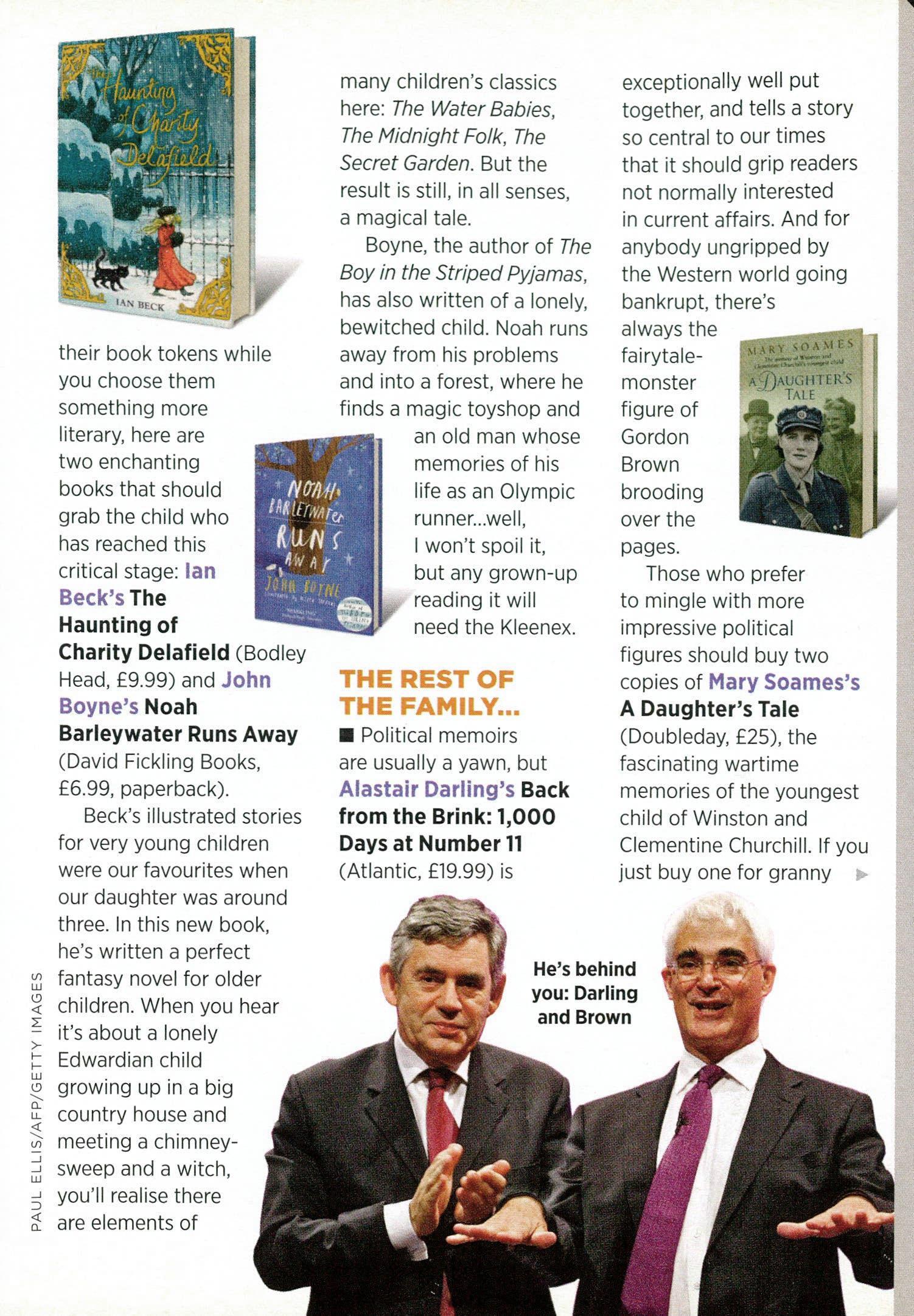
their book tokens while you choose them something more literary, here are two enchanting books that should grab the child who has reached this critical stage: Ian Beck's The Haunting of Charity Delafield (Bodley Head, £9.99) and John Boyne's Noah Barleywater Runs Away (David Fickling Books, £6.99, paperback).
Beck's illustrated stories for very young children were our favourites when our daughter was around three. In this new book, he's written a perfect fantasy novel for older children. When you hear it's about a lonely Edwardian child growing up in a big country house and meeting a chimneysweep and a witch, you'll realise there are elements of
many children's classics here: The Water Babies, The Midnight Folk, The Secret Garden. But the result is still, in all senses, a magical tale.
Boyne, the author of The Boy in the Striped Pyjamas, has also written of a lonely, bewitched child. Noah runs away from his problems and into a forest, where he finds a magic toyshop and an old man whose memories of his life as an Olympic runner...well, I won't spoil it, but any grown-up reading it will need the Kleenex.
■ Political memoirs are usually a yawn, but Alastair Darling's Back from the Brink:1,000 Days at Number 11 (Atlantic, £19.99) is
exceptionally well put together, and tells a story so central to our times that it should grip readers not normally interested in current affairs. And for anybody ungripped by the Western world going bankrupt, there's always the fairytalemonster figure of Gordon Brown brooding over the pages. Those who prefer to mingle with more impressive political figures should buy two copies of Mary Soames's A Daughter's Tale (Doubleday, £25), the fascinating wartime memories of the youngest child of Winston and Clementine Churchill. If you just buy one for granny
He's behind you: Darling and Brown
because she remembers the war, you'll find everyone else in the family wants to read it, too.

1'41yd Snoff
The work of serious history that's impressed me more than any other this year is Maya Jasanoff's Liberty's Exiles: the Loss of America and the Remaking of the British Empire (HarperPress, £30). This is about the appalling aftermath of the American War of Independence, and the fate of the black, American Indian and white refugees. It's the cuttingedge history of a littleknown set of events—and beautifully written.
Best travelhistory book of the year? Matthew Sturgis's When in Rome: 2,000 Years of Roman Sightseeing (Francis Lincoln, £20). The perfect book to take when visiting the Italian capital, it reveals chapter by chapter which sights have been most popular through the ages.
To bring a smile to your mum and dad's face, buy
them Pam Ayres's memoir
The Necessary Aptitude (Ebury, £20). Her Berkshire upbringing in Austerity Britain, the era of the Dusty Springfield beehive, life in the WRAF—it's all so well written, so funny and so touching.
A book telling the same story, in a way, but with the elegiac voice of a poethistorian, is Roy Strong's Visions of England (Bodley Head, £17.99), a lovely picture of what England was when the squire was still in the manor house and the Church of England hadn't gone bonkers and ditched its old Prayer Book services.
• I've not left myself nearly enough room for this category—especially as it's been such a bumper year (although you wouldn't have guessed it from the
Man Booker shortlist!)
Aravind Adiga's Last Man in Tower (Atlantic, £17.99) is one of the best novels I've ever read. Set in modern Mumbai, it's in the league of giants like Balzac, with its broad sweep, its huge sympathies and its biting satire.
For fans of sci-fi, try China Mieville's Embassytown (Macmillan, £17.99), a book that changes your outlook on life as you read. It's about a planet whose inhabitants cannot tell a lie— and how they're corrupted when Earth-visitors teach them what we call language. Deep, wise and very interesting. Jason Goodwin's larky, suspenseful thrillers set in 1840s Istanbul—with court
Pam with tea set in 1975eunuch Yashim as the detective— gather pace. There are four to date, and An Evil Eye (Faber, £14.99) is the most exciting yet. Get the Goodwin habit now before they're all made into films—you can say you were there before the millions.
Another historical thriller I heartily recommend is Stella Tillyard's Tides of War (Chatto & Windus, £12.99), set in Regency London and the Spain of the Peninsular War. Every detail counts in this compelling page-turner. Meanwhile, with the death of TV's dear old Inspector Wexford (actor George Baker), somebody you know will surely want to read the latest Ruth Rendell. The Vault (Hutchinson, £12.99)
does not disappoint, as a 25-year-old case brings Wexford out of retirement. A lovely, gentle novel —what a pity Baker did not live to act it.
■ ...one of the oddest, funniest books I have ever come across. Structured like a daisy chain, Craig Brown's One on One (Fourth Estate, £16.99) starts with Hitler being run
The meeting between Khrushchev and Marilyn— as Khrushchev might have hoped it happened
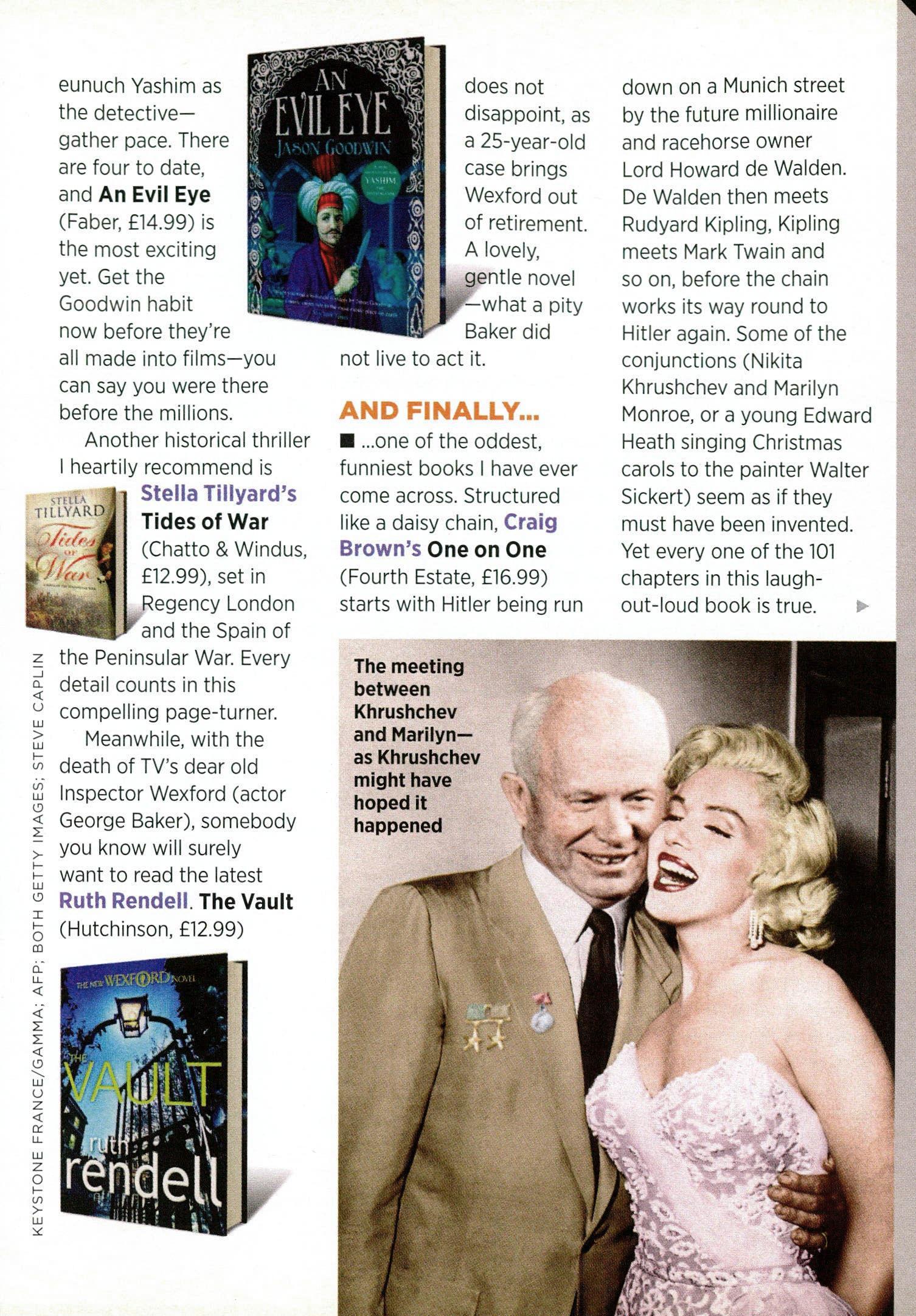
down on a Munich street by the future millionaire and racehorse owner Lord Howard de Walden. De Walden then meets Rudyard Kipling, Kipling meets Mark Twain and so on, before the chain works its way round to Hitler again. Some of the conjunctions (Nikita Khrushchev and Marilyn Monroe, or a young Edward Heath singing Christmas carols to the painter Walter Sickert) seem as if they must have been invented. Yet every one of the 101 chapters in this laughout-loud book is true. Is-
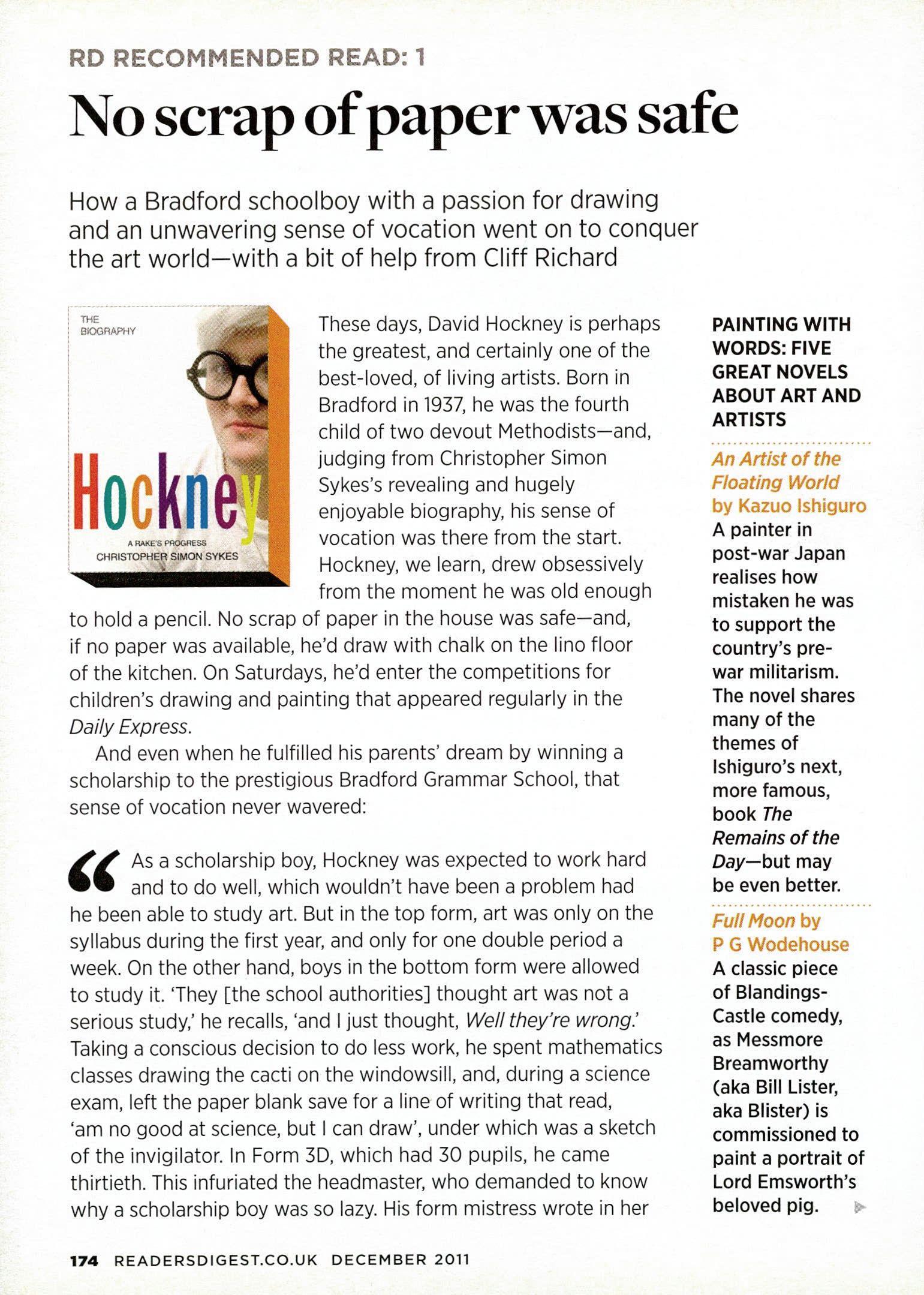
How a Bradford schoolboy with a passion for drawing and an unwavering sense of vocation went on to conquer the art world—with a bit of help from Cliff Richard
These days, David Hockney is perhaps the greatest, and certainly one of the best-loved, of living artists. Born in Bradford in 1937, he was the fourth child of two devout Methodists—and, judging from Christopher Simon Sykes's revealing and hugely enjoyable biography, his sense of vocation was there from the start. Hockney, we learn, drew obsessively from the moment he was old enough to hold a pencil. No scrap of paper in the house was safe—and, if no paper was available, he'd draw with chalk on the lino floor of the kitchen. On Saturdays, he'd enter the competitions for children's drawing and painting that appeared regularly in the Daily Express.
And even when he fulfilled his parents' dream by winning a scholarship to the prestigious Bradford Grammar School, that sense of vocation never wavered:
((As a scholarship boy, Hockney was expected to work hard 111 and to do well, which wouldn't have been a problem had he been able to study art. But in the top form, art was only on the syllabus during the first year, and only for one double period a week. On the other hand, boys in the bottom form were allowed to study it. 'They [the school authorities] thought art was not a serious study,' he recalls, 'and I just thought, Well they're wrong.' Taking a conscious decision to do less work, he spent mathematics classes drawing the cacti on the windowsill, and, during a science exam, left the paper blank save for a line of writing that read, 'am no good at science, but I can draw', under which was a sketch of the invigilator. In Form 3D, which had 30 pupils, he came thirtieth. This infuriated the headmaster, who demanded to know why a scholarship boy was so lazy. His form mistress wrote in her
An Arti ,f the Floating World by Kazuo Ishiguro
A painter in post-war Japan realises how mistaken he was to support the country's prewar militarism. The novel shares many of the themes of Ishiguro's next, more famous, book The Remains of the Day—but may be even better.
Full Moon by P G Wodehouse
A classic piece of BlandingsCastle comedy, as Messmore Breamworthy (aka Bill Lister, aka Blister) is commissioned to paint a portrait of Lord Emsworth's beloved pig. o•
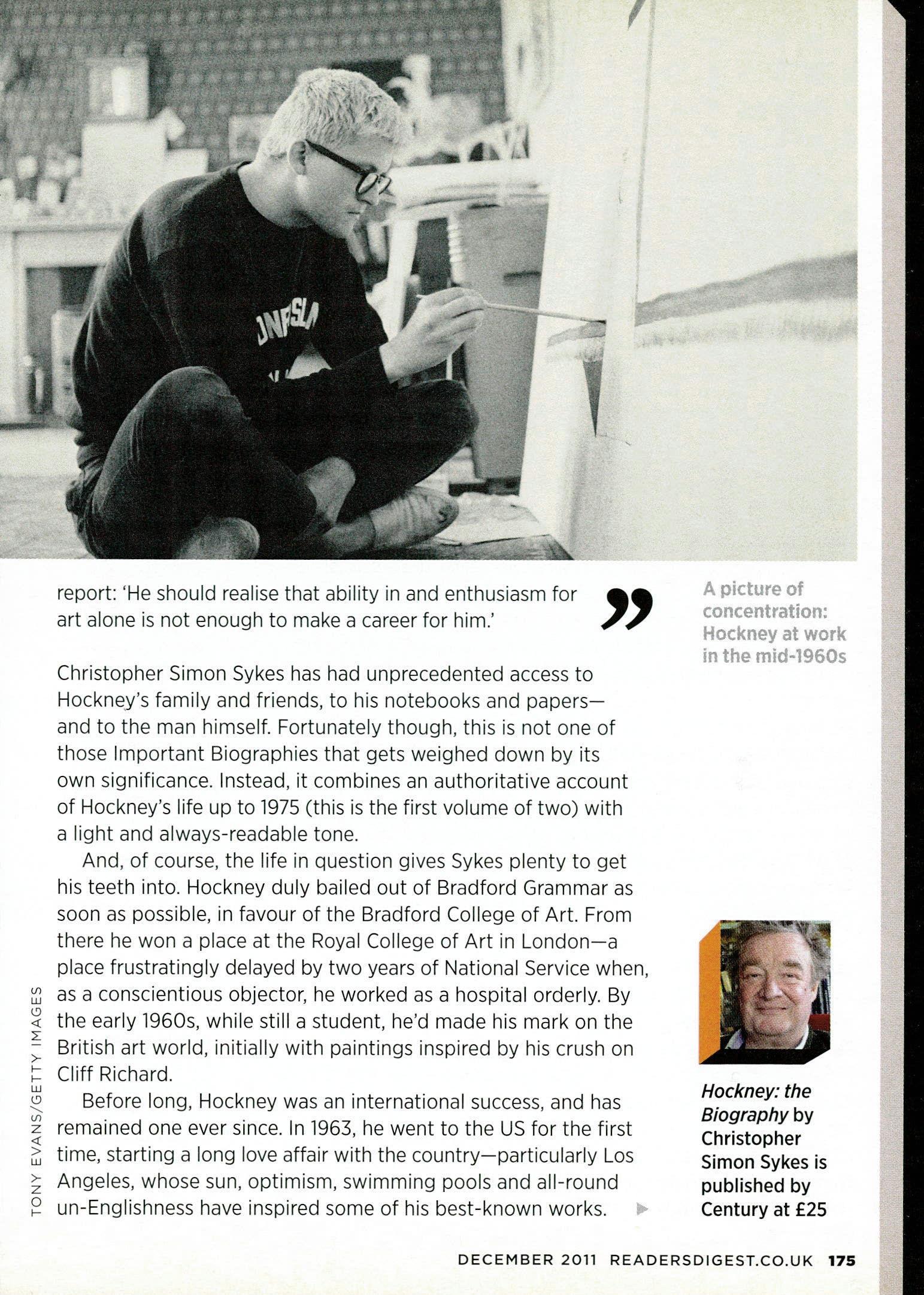
report: 'He should realise that ability in and enthusiasm for jojp art alone is not enough to make a career for him.'
Christopher Simon Sykes has had unprecedented access to Hockney's family and friends, to his notebooks and papers— and to the man himself. Fortunately though, this is not one of those Important Biographies that gets weighed down by its own significance. Instead, it combines an authoritative account of Hockney's life up to 1975 (this is the first volume of two) with a light and always-readable tone.
And, of course, the life in question gives Sykes plenty to get his teeth into. Hockney duly bailed out of Bradford Grammar as soon as possible, in favour of the Bradford College of Art. From there he won a place at the Royal College of Art in London—a place frustratingly delayed by two years of National Service when, as a conscientious objector, he worked as a hospital orderly. By the early 1960s, while still a student, he'd made his mark on the British art world, initially with paintings inspired by his crush on Cliff Richard.
Before long, Hockney was an international success, and has remained one ever since. In 1963, he went to the US for the first time, starting a long love affair with the country—particularly Los Angeles, whose sun, optimism, swimming pools and all-round un-Englishness have inspired some of his best-known works. 0.
-41 Here, for instance, is how, in mid-Sixties California, he came to paint possibly the best-known of them all...
The more closely Hockney observed water, the more fascinated he became. While leafing through a book about swimming pools, he came across a photograph of a splash, and immediately thought what a good subject it would be for a painting. 'What amused me was the fact that the splash only lasts a very, very short time,' Hockney recalls, 'and a photograph can freeze it, but that's not what it's like. When you paint it, you can make it flow.' The first painting of this series, The Little Splash, was tiny, and painted in a couple of days. It was followed by The Splash, which was a bit bigger and more fully realised. In hindsight, Hockney decided this version was too fussy, with the background, in which you can see the landscape, detracting from the subject, so he now chose to paint an even bigger, eight-footsquare version, using a simpler building and very strong light.
A Bigger Splash turned out to be one of Hockney's most enduring images, a painting securely established as one of the masterpieces of 20th-century art. On a hot, still, cloudless day, with the heat at its most intense and the surface of the water millpond-calm, a diver has leapt from the board and disappeared into the depths of the pool, his existence marked only by a violent eruption of water that's in complete contrast to the ongoing stillness of the scene. To emphasise this contrast, Hockney put the paint on using rollers, except for the splash. 'The splash itself is painted with small brushes and little lines,' he wrote. 'It took me about two weeks. I loved the idea of painting like Leonardo, all his studies of water, swirling things. And I loved the idea of painting this thing that lasts for two seconds...the effect of it as it got bigger was more stunning.'
"I loved the idea of painting this thing that lasts for two seconds": David Hockney with A Bigger Splash in 2009
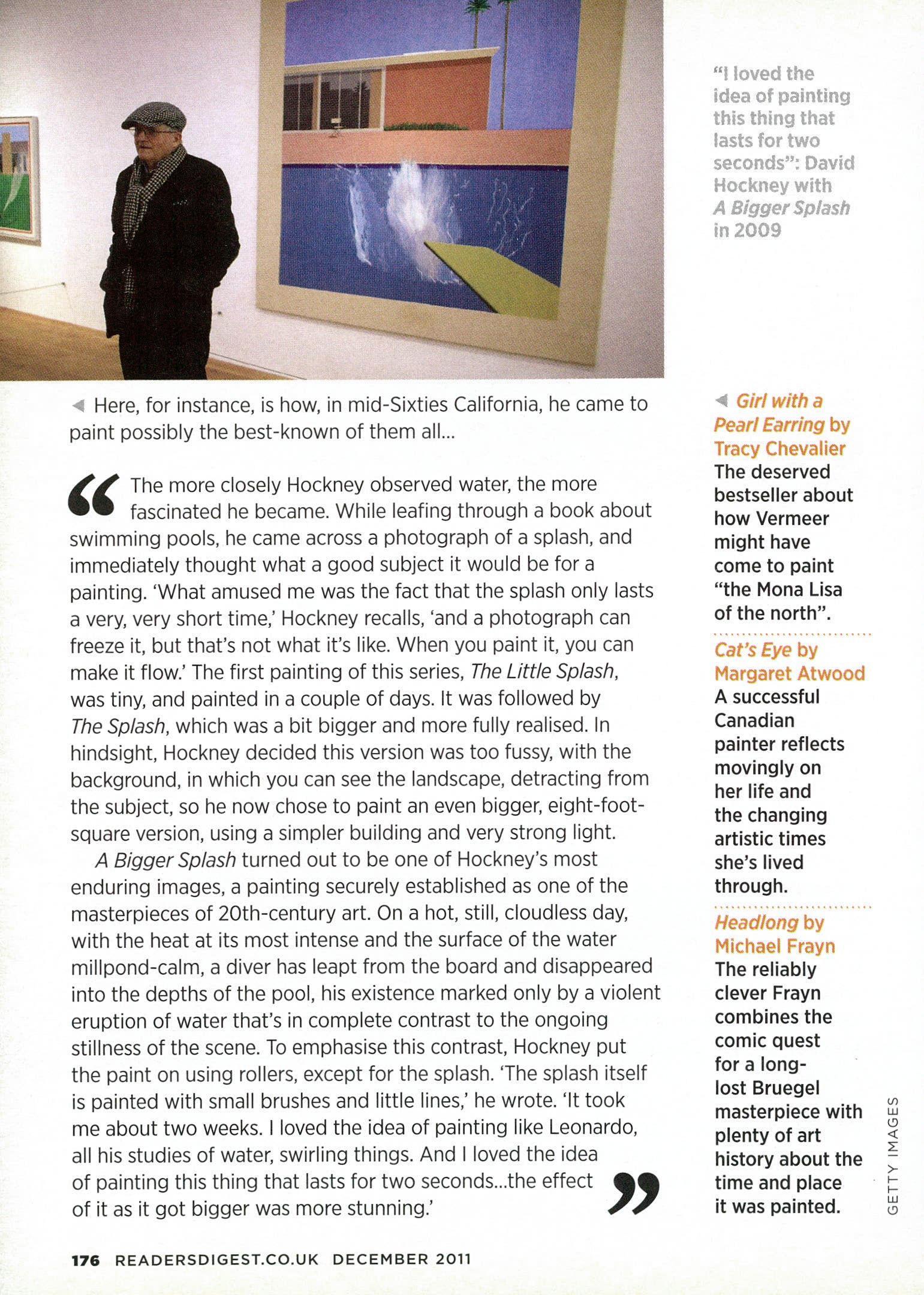
41 Girl with a Pearl Earring by Tracy Chevalier
The deserved bestseller about how Vermeer might have come to paint "the Mona Lisa of the north".
, Margaret Atwood
A successful Canadian painter reflects movingly on her life and the changing artistic times she's lived through. Headlong by Michael Frayn
The reliably clever Frayn combines the comic quest for a longlost Bruegel masterpiece with plenty of art history about the time and place it was painted.
It may not convince your children, but eating our greens was once the key to human survival
You might not realise it—and they certainly don't—but in historical terms, this is a golden age for vegetables. As Rebecca Rupp points out in her introduction to this fascinating, if mildly eccentric, book, "For a substantial chunk of human history, people have turned their noses up at vegetables—unflatteringly dubbed 'rude herbs and roots'." The medieval rich, for example, "feasted carnivorously on swan, crane, peacock and piglet draped in daffodils".
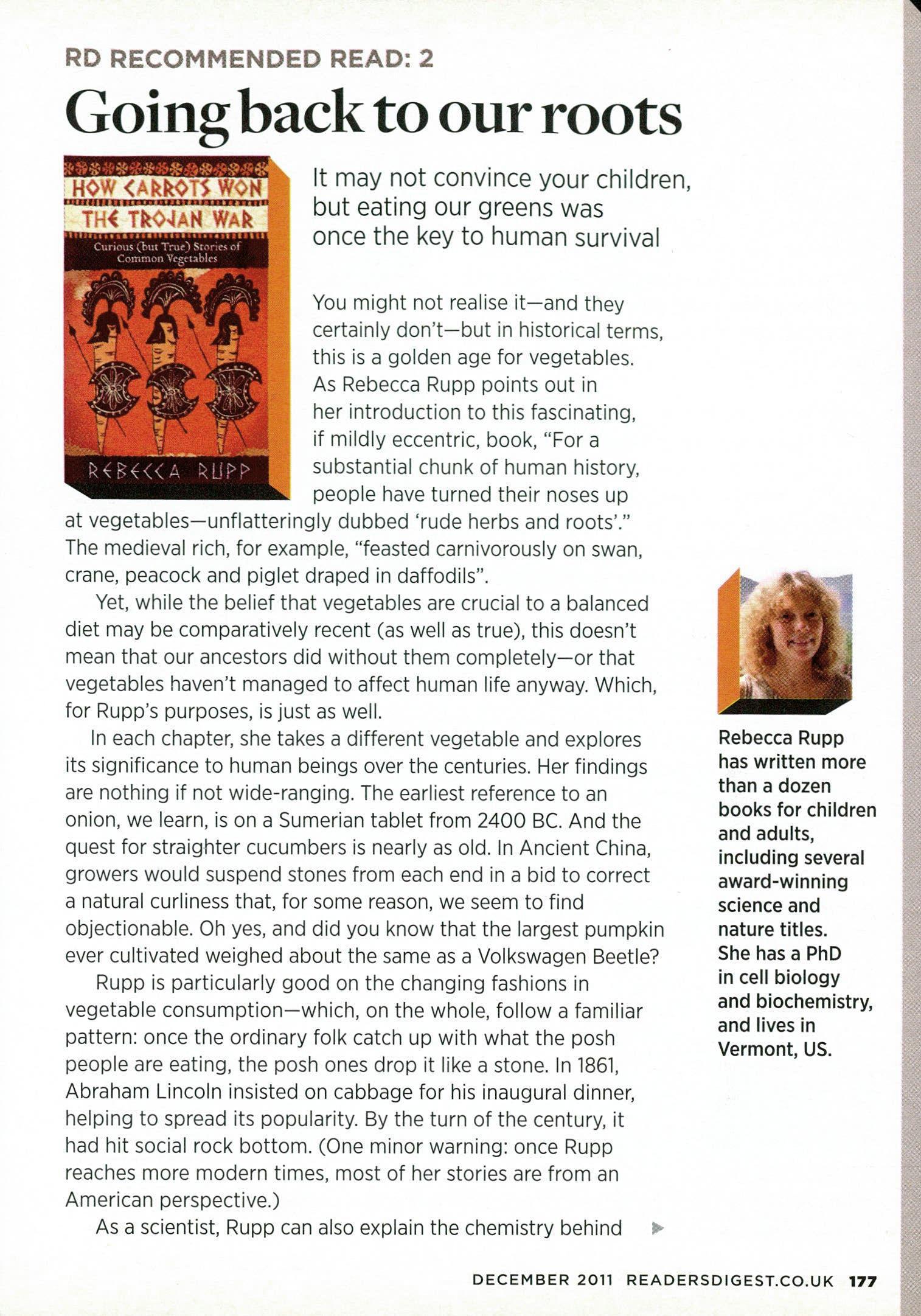
Yet, while the belief that vegetables are crucial to a balanced diet may be comparatively recent (as well as true), this doesn't mean that our ancestors did without them completely—or that vegetables haven't managed to affect human life anyway. Which, for Rupp's purposes, is just as well.
In each chapter, she takes a different vegetable and explores its significance to human beings over the centuries. Her findings are nothing if not wide-ranging. The earliest reference to an onion, we learn, is on a Sumerian tablet from 2400 BC. And the quest for straighter cucumbers is nearly as old. In Ancient China, growers would suspend stones from each end in a bid to correct a natural curliness that, for some reason, we seem to find objectionable. Oh yes, and did you know that the largest pumpkin ever cultivated weighed about the same as a Volkswagen Beetle?
Rupp is particularly good on the changing fashions in vegetable consumption—which, on the whole, follow a familiar pattern: once the ordinary folk catch up with what the posh people are eating, the posh ones drop it like a stone. In 1861, Abraham Lincoln insisted on cabbage for his inaugural dinner, helping to spread its popularity. By the turn of the century, it had hit social rock bottom. (One minor warning: once Rupp reaches more modern times, most of her stories are from an American perspective.)
As a scientist, Rupp can also explain the chemistry behind 1^,
Rebecca Rupp has written more than a dozen books for children and adults, including several award-winning science and nature titles. She has a PhD in cell biology and biochemistry, and lives in Vermont, US.
4 such vegetable-related phenomena as onion breath—although, sadly, she's unable to offer a cure: "The only truly effective solution is not to eat onions." Throughout the book, she vividly reminds us how much the vegetables we now know—and sometimes love—owe to human intervention. Left to their own devices, for example, carrots would still be small and purple, and peas more or less inedible.
But for now, let's hear how beans saved civilisation...
The Italian scholar and author Umberto Eco, in fact, hypothesises that Europeans emerged from the Dark Ages—the bleak and impoverished period extending from the fall of Rome to the end of the first millennium— because of the broad bean.
The evidence for the redemptive role of the bean comes from babies. Though numerical estimates vary, it's clear that a population boom began as Europe entered the tenth century. In the seventh—possibly the nadir of the Dark Ages—the population of Europe had sunk to a hungry and disease-ridden 14 million. By the year 1000, however, it had more than doubled; by the 14th century, it had doubled—even tripled—again. Eco argues that the upswing in population size, energy, intellect and the economy all derived from a new crop. It was in the tenth century that Europeans began the widespread cultivation of beans.
Nicknamed "the poor man's meat", beans and peas contain 17 to 25 per cent protein—two to three times that of cereal crops. The influx of protein into the previously parsimonious Dark Age diet made for stronger, healthier people, who lived longer and had more children. The quality of daily life improved, countries grew richer, and the expanding and better-fed population was able to support the specialisation of labour, the growth of cities, the burgeoning of the arts, the emergence of science and the launching of ships II to the New World.
COVER STAR
TOM HOLLANDER'S favourite book? -- —"I completely loved David rts„ Nicholls's One Day. I read it over the summer : and I couldn't face the film after I'd loved it so much."

After the world was saved: medieval peasants work the land
How Carrots
Won the Trojan War: Curious (but True)
Stories of Common Vegetables by Rebecca Rupp is published by Storey at £9.99. To order the book at a reduced price of £8.99, please go to readersdigest. co.uk/magazine. THE

Marvel at the inner workings of God through this compelling, provocative and inspirational book that will move g:rr) WVIIOCK your spirit and shake you to your core.
During chaotic and troublesome times, Come Walk with Me to Glory shows just how powerful, eternal, and universal God's love is. Like an endless fountain that pours forth the essential gift of life, this literary prose is intended to enhance human faith amidst the storms of life, encouraging the readers to keep their trust in God.
Whether it is losing a beloved husband to Alzheimer's disease or a son to AIDS, Dian illustrates the power of keeping your focus upon God. Come Walk with Me to Glory offers a whole new perspective which motivates and challenges its readers to firmly establish their relationship with Him.
Like a breath of fresh air that permeates any barrier, accessing the life of one who battles through difficulties, this book shares a journey of profound experiences and consequences, with a sense of positivity and goodness. Whatever crisis you may be going through, the useful and sublime insights presented here will walk you through to victory.
Patricia Cornwell is an internationally bestselling, multi-award-winning American writer, most famous for her novels about forensic pathologist Kay Scarpetta. The 19th book in the series, Red Mist, is out now.
With this frightening true story of a quadruple murder, written as a novel, Capote bridged the gap between journalism and fiction and changed crime writing forever. It's packed full of facts, but you also feel the emotional journey Capote went through—he spent a lot of time with the story's two killers and ultimately witnessed their hangings.
Like him, I do a lot of research in morgues and labs, and observe the aftermaths of many tragedies. I try to be an appropriate steward of the information and also deal with my principles. I couldn't make Scarpetta compelling if I didn't understand what she feels, but sometimes I have to ask, "Is it really OK to be part of this situation? Where do the moral boundaries lie?"
Writers tend to be quite isolated. We don't have much camaraderie with each other and miss out on a great gift of life—comparing notes on the frustrations and joys of our chosen career. In Hemingway's memoir, you get a sense of his
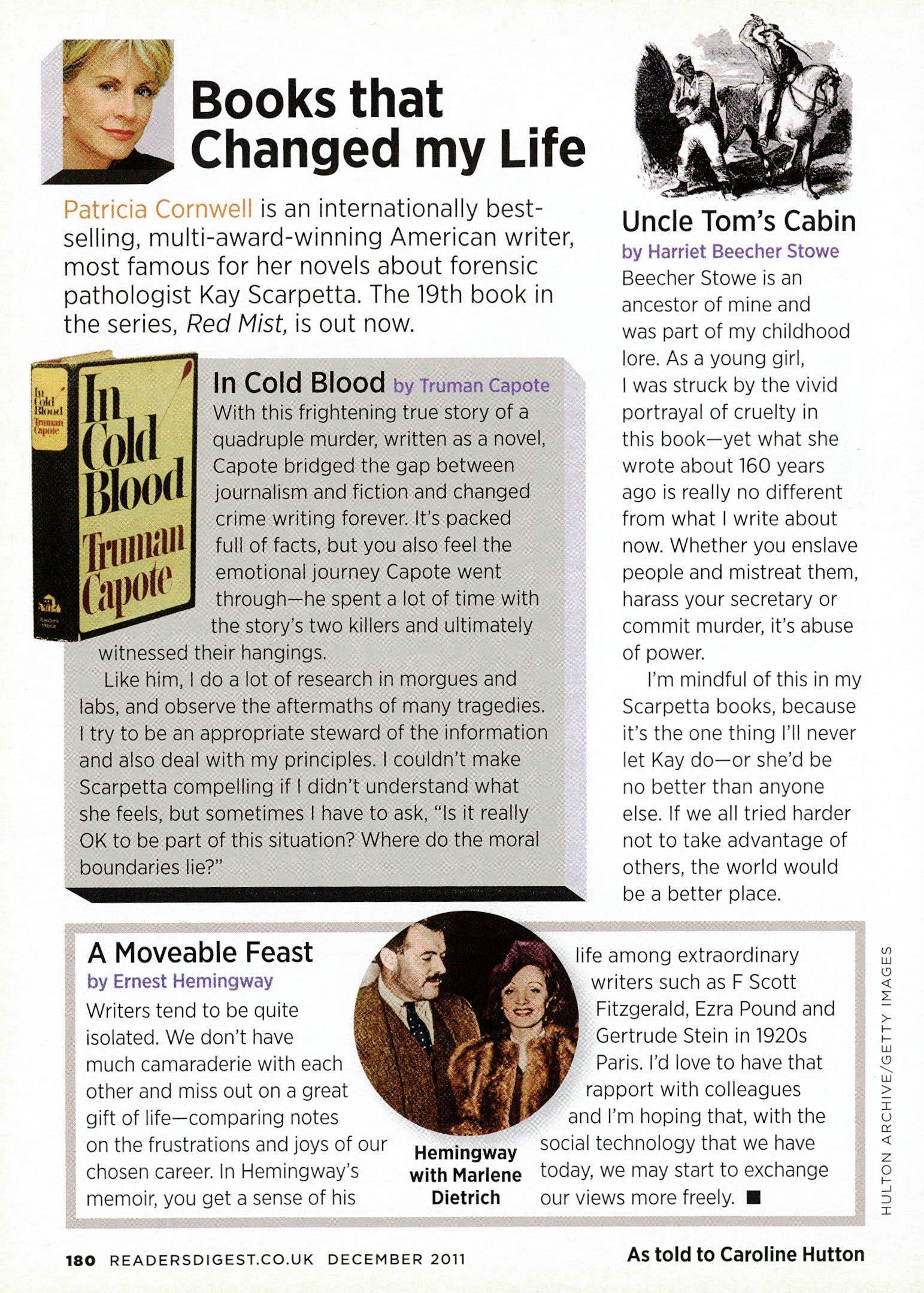
by Harriet Beecher Stowe Beecher Stowe is an ancestor of mine and was part of my childhood lore. As a young girl, I was struck by the vivid portrayal of cruelty in this book—yet what she wrote about 160 years ago is really no different from what I write about now. Whether you enslave people and mistreat them, harass your secretary or commit murder, it's abuse of power.
I'm mindful of this in my Scarpetta books, because it's the one thing I'll never let Kay do—or she'd be no better than anyone else. If we all tried harder not to take advantage of others, the world would be a better place.
life among extraordinary writers such as F Scott Fitzgerald, Ezra Pound and Gertrude Stein in 1920s Paris. I'd love to have that rapport with colleagues and I'm hoping that, with the social technology that we have today, we may start to exchange our views more freely. ■
Hemingway with Marlene Dietrich

Established in 1995, Sanctuary Care is a professional, financially sou organisation — care horn' ndltome ca across the cou
• Both sides of the

•
• Children
Drop the cracker and get your brain in gear! These five questions only take the Puzzleman 20 minutes to answer. How about you?
1 Candles are being burned through Advent. A stub remains from each candle, and these can be remoulded into new candles. Seven stubs are required for each new candle. If there are 55 candle stubs, how many new candles can possibly be made?
2 On each row, place a word beginning with W to fit the clue given. When completed, a word will be read down the shaded column. What is it?
3 Add the same two letters to each of the following groups and arrange the letters to give a word. All six words are associated with Christmas. What are they?
EN ADHIY HLY GD EEIMSTT AEFKNSSW
4 In a restaurant, three times as many diners ordered the turkey as ordered the pork. Sixteen more people ordered monkfish than pork, and four fewer people ordered aubergine than monkfish. If 22 diners chose aubergine, how many chose each of the other dishes?
Type of biscuit
A cereal
Use carelessly Halloween character
A kitchen utensil
Interlaced
A destroyed vehicle
5 A ship is sailing against the tide to get back to shore for Christmas. It uses four gallons of fuel every hour and sails at 14mph in still conditions. The ship is 23 miles from safety and the flow against it is 6mph. The ship only has 12 gallons of fuel remaining. How much fuel will remain when it reaches safety?
So how did you score: A point for every correct answer. Here's the Puzzleman's verdict:
0-2 "A double helping of Brussels sprouts."
3-4 "Christmas pud, but lacking the brandy butter."
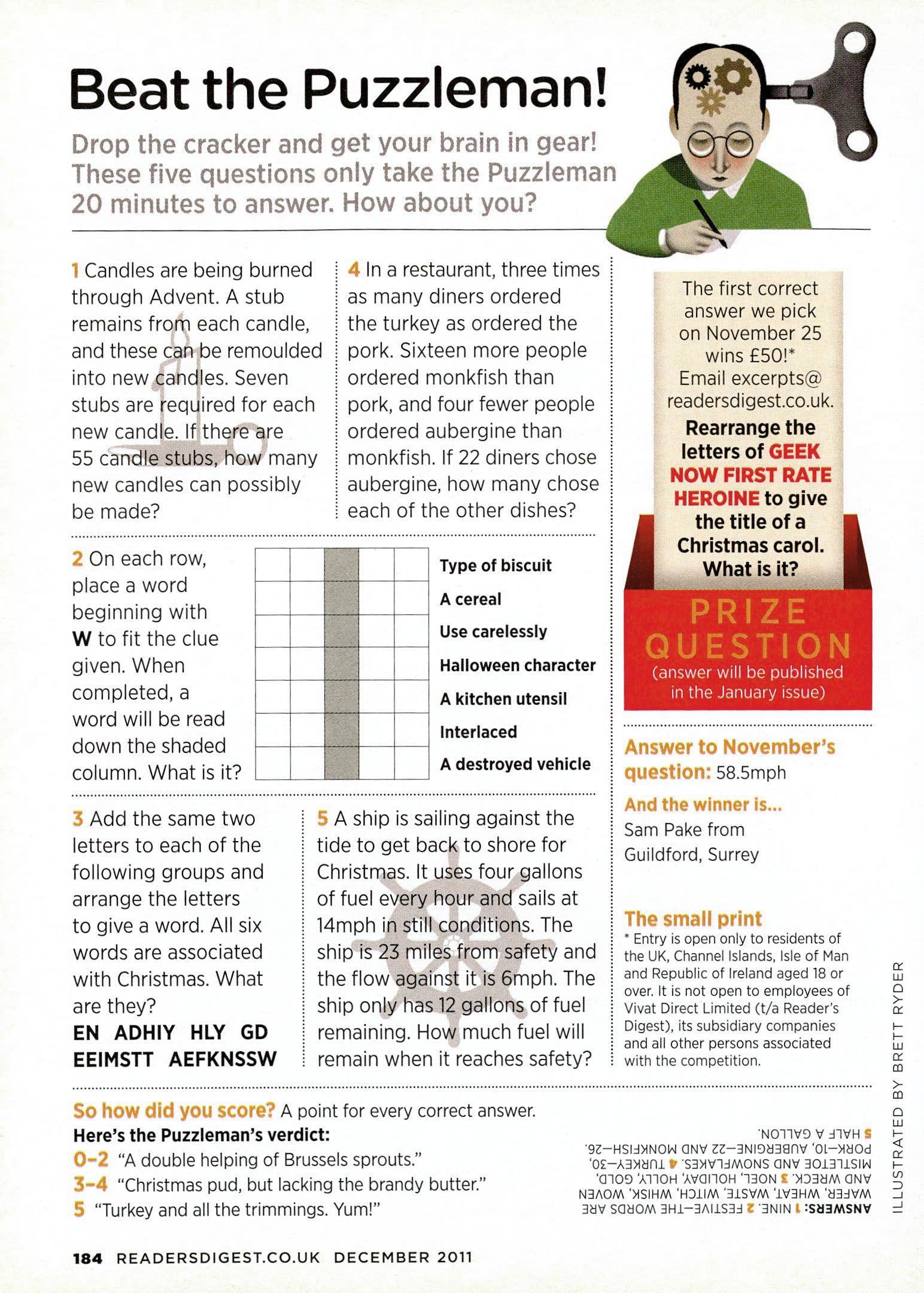
The first correct answer we pick on November 25 wins £50!*
Email excerpts@ readersdigest.co.uk.
Rearrange the letters of GEEK NOW FIRST RATE
HEROINE to give the title of a Christmas carol. What is it? PRIZE )1! 77.Tin!,' (answer will be published in the January issue)
Answer to November's question: 58.5mph
And the winner is... Sam Pake from Guildford, Surrey
The small print Entry is open only to residents of the UK, Channel Islands, Isle of Man and Republic of Ireland aged 18 or over. It is not open to employees of Vivat Direct Limited (t/a Reader's Digest), its subsidiary companies and all other persons associated with the competition.
5 "Turkey and all the trimmings. Yum!" 'N011V9 V JIVH S '9Z—HSId5NOW GNV Z5-3N198380V '01-580d '0E—A35801 V '83)1V-IJMONS GNV 301311SIW '0109 'AVOI1OH '130N I '>0321M ONV N3AOM '31SVM '1V3HM '83JVM 38V 8080M 3H1-3A1153d '3NIN 1:S2I3MSNV
Extremely quick (4)
Grave (4)
Discontinue (5) 10 Brazilian port, ___ de Janeiro (3) 11 Serialised TV programme (4,5)
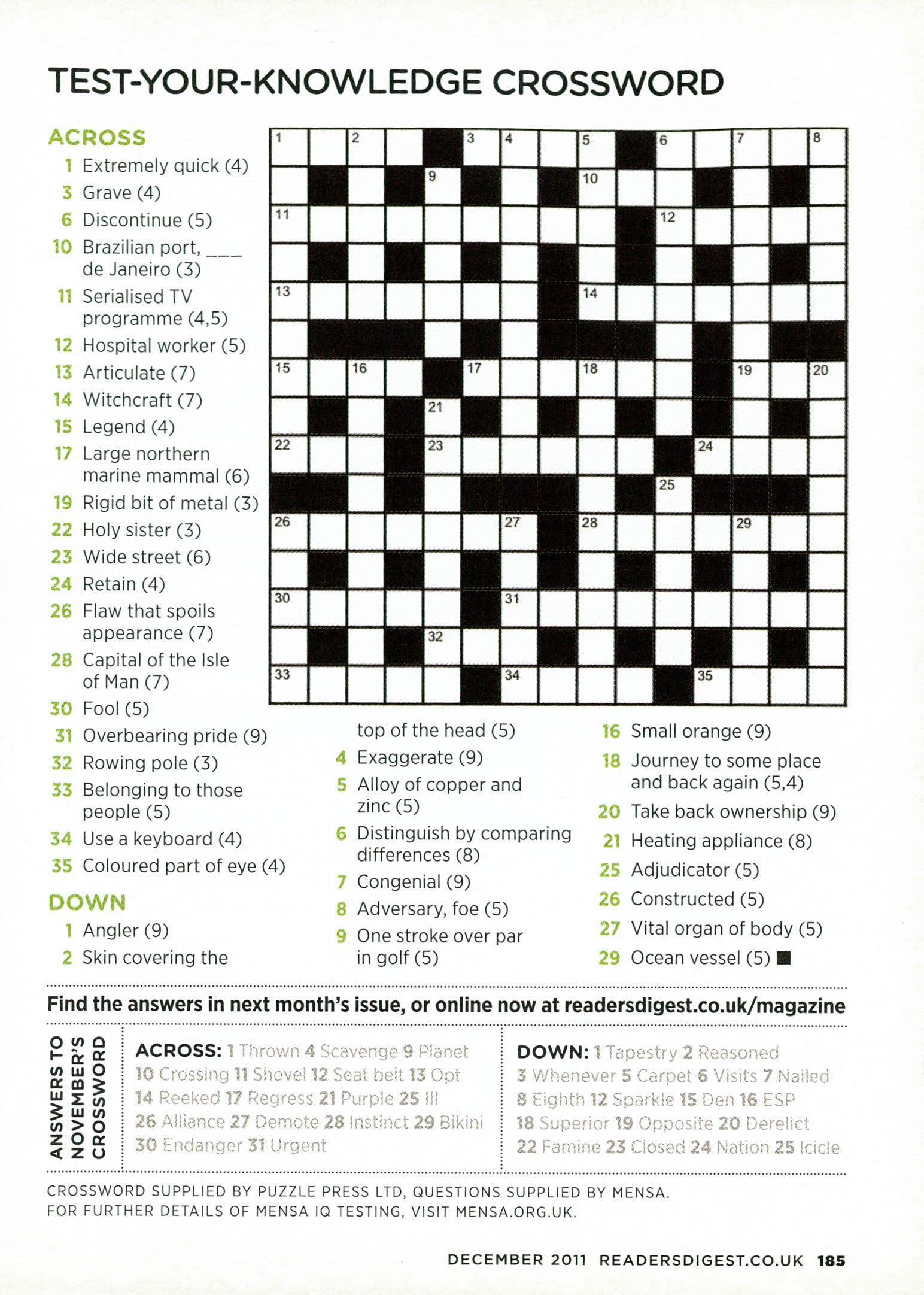
top of the head (5)
4 Exaggerate (9)
5 Alloy of copper and zinc (5)
6 Distinguish by comparing differences (8) 7 Congenial (9) 8 Adversary, foe (5) 9 One stroke over par in golf (5)
u Small orange (9) 18 Journey to some place and back again (5,4)
20 Take back ownership (9) 21 Heating appliance (8) 25 Adjudicator (5)
26 Constructed (5) 27 Vital organ of body (5) 29 Ocean vessel (5) ■ ACROSS:
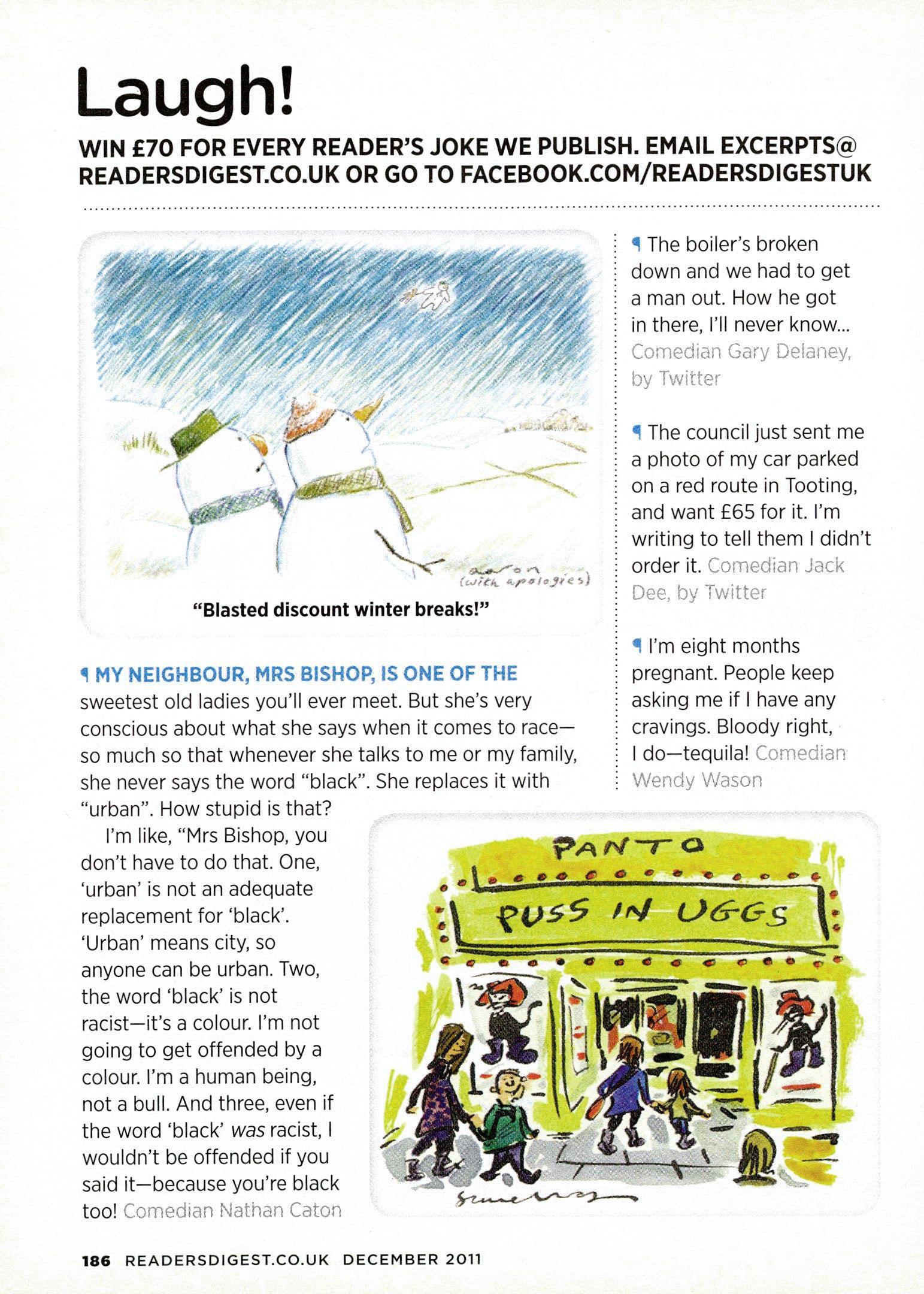
"Blasted discount winter breaks!"
1 MY NEIGHBOUR, MRS BISHOP, IS ONE OF THE sweetest old ladies you'll ever meet. But she's very conscious about what she says when it comes to race— so much so that whenever she talks to me or my family, she never says the word "black". She replaces it with "urban". How stupid is that?
I'm like, "Mrs Bishop, you don't have to do that. One, 'urban' is not an adequate replacement for 'black'. 'Urban' means city, so anyone can be urban. Two, the word 'black' is not racist—it's a colour. I'm not going to get offended by a colour. I'm a human being, not a bull. And three, even if the word 'black' was racist, I wouldn't be offended if you said it—because you're black too! Comedian Nathan Caton
1 The boiler's broken down and we had to get a man out. How he got in there, I'll never know... Comedian Gary Delaney, by Twitter
1 The council just sent me a photo of my car parked on a red route in Tooting, and want £65 for it. I'm writing to tell them I didn't order it. Comedian Jack Dee, by Twitter
1 I'm eight months pregnant. People keep asking me if I have any cravings. Bloody right, I do—tequila! Comedian Wendy Wason
11
A man goes to his GP and says, "I've been having terrible stomach pains."
The doctor says, "OK. Strip off and walk along that yellow line to the window, then stick your tongue out."
The man replies, "But why, doctor?"
The doctor says, "I don't like that bloke across the road."
_
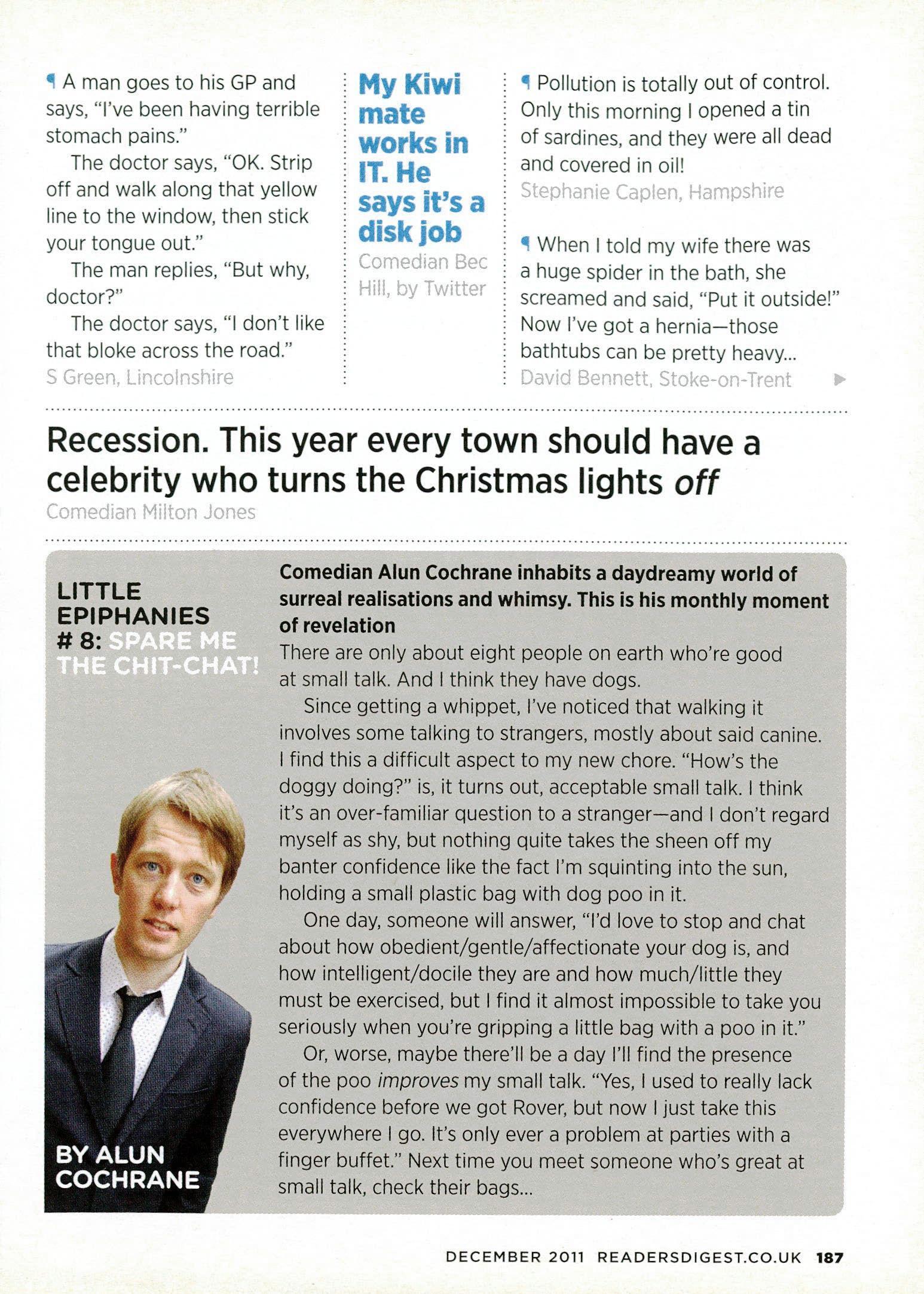
My Kiwi mate works in IT. He says it's a disk jobComedian
Bec
Hill,by Twitter
41 Pollution is totally out of control. Only this morning I opened a tin of sardines, and they were all dead and covered in oil!
Stephanie Caplen, Hampshire
I When I told my wife there was a huge spider in the bath, she screamed and said, "Put it outside!"
Now I've got a hernia—those bathtubs can be pretty heavy...
David Bennett, Stoke-on-Trent
Recession. This year every town should have a celebrity who turns the Christmas lights off
comedian Milton Jones
LITTLE EPIPHANIES
# 8:
BY ALUN COCHRANEComedian Alun Cochrane inhabits a daydreamy world of surreal realisations and whimsy. This is his monthly moment of revelation
There are only about eight people on earth who're good at small talk. And I think they have dogs.
Since getting a whippet, I've noticed that walking it involves some talking to strangers, mostly about said canine. I find this a difficult aspect to my new chore. "How's the doggy doing?" is, it turns out, acceptable small talk. I think it's an over-familiar question to a stranger—and I don't regard myself as shy, but nothing quite takes the sheen off my banter confidence like the fact I'm squinting into the sun, holding a small plastic bag with dog poo in it.
One day, someone will answer, "I'd love to stop and chat about how obedient/gentle/affectionate your dog is, and how intelligent/docile they are and how much/little they must be exercised, but I find it almost impossible to take you seriously when you're gripping a little bag with a poo in it."
Or, worse, maybe there'll be a day I'll find the presence of the poo improves my small talk. "Yes, I used to really lack confidence before we got Rover, but now I just take this everywhere I go. It's only ever a problem at parties with a finger buffet." Next time you meet someone who's great at small talk, check their bags...
0: How many waiters does it take to change a light bulb?
A: None—even a burntout bulb can't catch a waiter's eye.
A: One.
0: How many psychics does it take to change a light bulb?
0: How many monkeys does it take to change a light bulb?
A: Two. One to do it and one to scratch his bum.
0: How many mutants does it take to change a light bulb?
A: Two thirds.
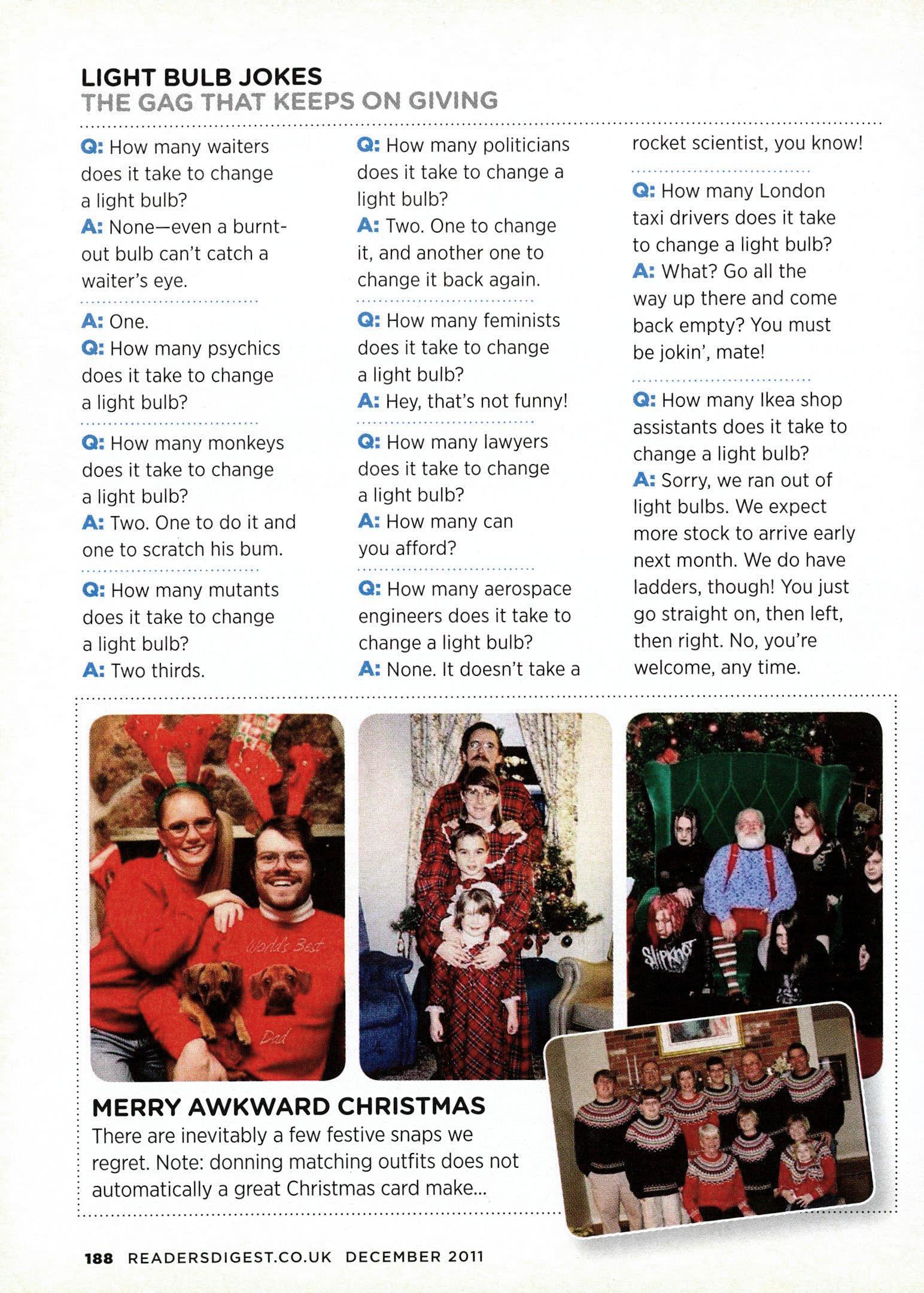
0: How many politicians does it take to change a light bulb?
A: Two. One to change it, and another one to change it back again.
0: How many feminists does it take to change a light bulb?
A: Hey, that's not funny!
0: How many lawyers does it take to change a light bulb?
A: How many can you afford?
0: How many aerospace engineers does it take to change a light bulb?
A: None. It doesn't take a
rocket scientist, you know!
0: How many London taxi drivers does it take to change a light bulb?
A: What? Go all the way up there and come back empty? You must be jokin', mate!
0: How many Ikea shop assistants does it take to change a light bulb?
A: Sorry, we ran out of light bulbs. We expect more stock to arrive early next month. We do have ladders, though! You just go straight on, then left, then right. No, you're welcome, any time.
There are inevitably a few festive snaps we regret. Note: donning matching outfits does not automatically a great Christmas card make...
1 As I left work today, my boss said to me, "I know your hours are nine 'til five, but can you work an hour later tomorrow?"
I said, "Yeah, sure. See you at 10."
Seen on the Internet
1 I'd just like to say to any women out there having trouble keeping their hair out of their eyes: get a grip. Tony Cowards, by Twitter
I Sean Connery would often complain that he hadn't found his niche. Turns out he was looking for his brother's daughter. Comedian Theo Bandera
I Conflicts in the Wild West could have been completely avoided if cowboy architects had only made their towns big enough for everyone. Seen on the internet
Ladies and gentlemen, please welcome Seann Walsh
FAVOURITE JOKE?
"You find your keys and go out to the car, and your wife says, 'Funny, they're always in the last ' place you look!' Well yeah, I wouldn't find them and then keep looking, would I!' "—Lee Evans
FAVOURITE OF YOUR OWN JOKES?
I was in a supermarket queue, in a rush. The tannoy said, "Cashier number four, please!" The person in front of me didn't realise, then said, "Oh, sorry, I was miles away!" And I went, "Yeah? Well I need to be, so hurry up!"
FUNNIEST THING THAT'S EVER HAPPENED TO YOU?

1 The trouble with learning how to play the violin is that it's a bit fiddly. Comedian Gary Delaney
Seann Walsh is in Argumental, on satellite channel Dave every Thursday at 10pm
A fortnight ago, I went to American Apparel and tried on some trousers. I took off my jeans and leaned on the door. Unfortunately, the doors in there are only held closed by magnets, so I fell straight out onto the shop floor. My boxers weren't even properly on, and four girls were staring at me half-naked! It was unbelievable.
FAVOURITE TV COMEDY?
Friends. I still love it, because it's nostalgic. The funniest bit is when Ross has a breakdown in Season Five, after he breaks up with Emily and he's on medication. Every time he takes his pills, he says, "I need my medication," in this really funny voice. There's nothing better than watching someone else having a breakdown.
FINALLY, WHO'S YOUR COMEDY INSPIRATION?
Jack Dee, because he was someone I identified with. Especially when you're a young teenager, you feel very isolated from the world, so you watch a comedian like him on TV and go, "Oh, that's me!" It's very personal. I'm a moaner, like Dee—that's what I've always wanted to do. I've no shame about it. ■
BUTYOUNEED TOENTERNOW... LINESCLOSEAT MIDNIGHT ON THURSDAY DECEMBER 15TH

£150,000 ALREADY
Some of our recent Big CASH Winners simply picked up the phone and entered their answers! Why not make YOUR call now... It could be you! Remember, you have to be in it to win it, so make that call RIGHT NOW and register your answers for your chance to claim our BIG £3500 CASH PRIZE.
A.Seward from Cambridgeshire Won £8500
Hurry! Lines close at midnight on Thursday December 15th so call today for your chance to win our BIG MOD CASH
We've decided to give away another £3500 cash! This is your chance to scoop another bumper payout of £3500, but only for a limited time. We have restricted the time for entries TO MAXIMISE YOUR CHANCE OF WINNING!
That's right, you only have a short time left before the phone lines close. Don't miss out on your chance to scoop a whopping £3500! Enough for a round-the world trip, a new set of wheels or just to clear
**
Here is just a small selection of recent winners: J. Devenney, Mountsandel; E. Rowley, Felinwynt; Mrs Whitewinchester, Maidstone; S. Roberts, Holywell; J. Woodman, Swindon; A. Bishop, Gloucester; P Maniyka, Sutton; M. Cully, Craigavon; J. Vile, Dagenham; and H. Kerr, Newcastle.
your debts and start enjoying your wage packet once more! So pick up the phone and make that call RIGHT NOW!
HOW
It takes less than 3 minutes to register your answers on our Correct Answer Hotline. Call before Midnight on December 15th with your three missing words. You will be told on the phone if your entry has been accepted.
You will also be given the opportunity to register an answer to the Mystery Word Cash Prize Competition to win an additional prize of £1000 cash! All you have to do is find the mystery word that has been hidden in the grid, but is NOT listed in any of the three wordlists.
You have to be in it to win it, so make that call RIGHT NOW and register your chance to claim £3500 just in time for Christmas!
"In my professional capacity as an accountant, and from having inspected the company's records, can verify that all prizes are awarded fairly and in strict accordance with the competition rules., have also inspected over 100 letters written by grateful prize recipients."

